
Project Gutenberg's The Pageant of British History, by J. Edward Parrott This eBook is for the use of anyone anywhere in the United States and most other parts of the world at no cost and with almost no restrictions whatsoever. You may copy it, give it away or re-use it under the terms of the Project Gutenberg License included with this eBook or online at www.gutenberg.org. If you are not located in the United States, you'll have to check the laws of the country where you are located before using this ebook. Title: The Pageant of British History Author: J. Edward Parrott Release Date: October 19, 2019 [EBook #60524] Language: English Character set encoding: UTF-8 *** START OF THIS PROJECT GUTENBERG EBOOK THE PAGEANT OF BRITISH HISTORY *** Produced by Al Haines, Cindy Beyer & the online Distributed Proofreaders Canada team at http://www.pgdpcanada.net
* A Distributed Proofreaders Canada eBook *
This ebook is made available at no cost and with very few restrictions. These restrictions apply only if (1) you make a change in the ebook (other than alteration for different display devices), or (2) you are making commercial use of the ebook. If either of these conditions applies, please contact a FP administrator before proceeding.
This work is in the Canadian public domain, but may be under copyright in some countries. If you live outside Canada, check your country's copyright laws. IF THE BOOK IS UNDER COPYRIGHT IN YOUR COUNTRY, DO NOT DOWNLOAD OR REDISTRIBUTE THIS FILE.
Title: The Pageant of British History
Date of first publication: 1908
Author: Sir (James) Edward Parrott (1863-1921)
Date first posted: Sep. 11, 2018
Date last updated: Sep. 11, 2018
Faded Page eBook #20180916
This ebook was produced by: Al Haines, Cindy Beyer & the online Distributed Proofreaders Canada team at http://www.pgdpcanada.net

“History is a pageant,
and not a philosophy.”
Augustine Birrell.
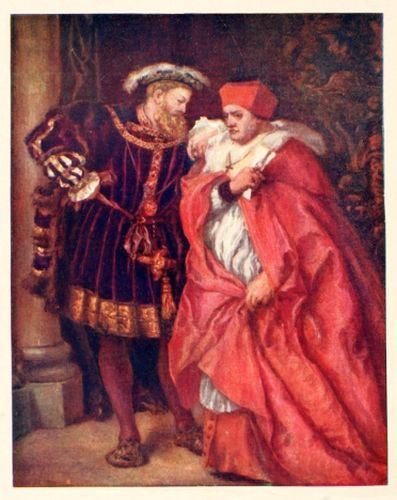
Henry the Eighth and Cardinal Wolsey.
(From the picture by Sir John Gilbert, R.A., in the Guildhall Art Gallery, London.)
THE PAGEANT OF
BRITISH HISTORY
DESCRIBED BY
J. EDWARD PARROTT, M.A., LL.D.,
AND DEPICTED BY
THE FOLLOWING GREAT ARTISTS
J. M. W. Turner, G. F. Watts, Benjamin West, Lord Leighton,
Sir John Gilbert, Daniel Maclise, C. W. Cope, John Opie,
William Dyce, Sir L. Alma-Tadema, Sir John Millais,
Paul Delaroche, W. Q. Orchardson, E. M. Ward,
Stanhope Forbes, F. Goodall, Seymour Lucas,
Ford Madox Brown, W. F. Yeames,
Clarkson Stanfield,
etc., etc.

THOMAS NELSON AND SONS
London, Edinburgh, Dublin, and New York
1908
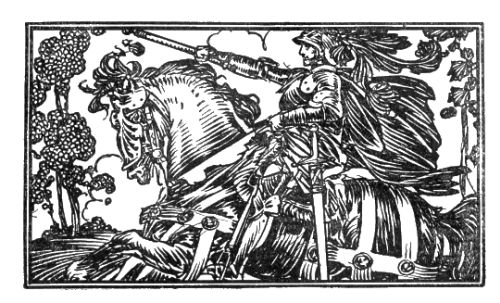
FOREWORD.
The Master of the Pageant spurs into the arena; he waves his baton, and the trumpets sound. In the distance you see a long procession begin to wind its way across the greensward, and as it draws nearer and nearer you recognize the form and fashion of men and women whose names are writ large in the annals of our land. Here they come—king and queen, statesman and priest, warrior and merchant, poet and man of law, shipman and craftsman, yeoman and peasant—a motley throng, all sorts and conditions of men and women, high and low, rich and poor, gentle and simple, noble and base, hero and craven; yet each in his or her several degree a maker of history. These are the “counterfeit presentments” of the men and women who through twice a thousand years have made us what we are, and our glorious land what it is.
As they troop by, let a humble chronicler—who prays that he may not be considered intrusive—recall the story of their heroisms, their trials, their sufferings, their glories, or, it may be, their failures, their treacheries, and their shames. Perchance ’twill be a twice-told tale, “familiar as household words” yet it is a recital that can never lack hearers while men love the land that bore them, and would fain find example and warning, inspiration and guidance, from the story of the past. The chronicler pretends to no philosophy save this—that since we have, under Providence, been created a “noble and puissant nation” and entrusted with a heritage without peer in the history of the world, we should be false to our sires, false to ourselves, and false to our destiny were we, by selfishness, sloth, or ignorance, to neglect to be great through “craven fears of being great.” And since the best and only true foundation of patriotism is knowledge, he would fain hope that these sketches may stimulate in some who are growing towards manhood and womanhood a humble pride in the greatness of their land and a fervent desire so to play their part that Britain may be what she was meant to be—the Vicegerent of the Almighty in the uplifting and ennoblement of the world. In this belief he echoes the prayer of the poet:—
“Land of Hope and Glory, Mother of the Free,
How shall we extol thee, who are born of thee?
Wider still, and wider, shall thy bounds be set;
God, who made thee mighty, make thee mightier yet.”
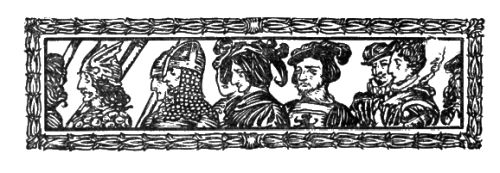
| CONTENTS. | |||
| ——••—— | |||
| I. | Britain before the Roman Conquest. | ||
| The Phœnicians | 9 | ||
| The Ancient Britons | 12 | ||
| The Druids | 17 | ||
| The Coming of Cæsar | 20 | ||
| II. | The Shadow of Rome. | ||
| Caractacus | 27 | ||
| A Warrior Queen | 30 | ||
| The Iron Hand | 33 | ||
| III. | The Coming of the English. | ||
| King Arthur and the Knights of the Round Table | 41 | ||
| Hengist and Horsa | 46 | ||
| Ethelbert and Bertha | 50 | ||
| The Singer of the First English Song | 55 | ||
| IV. | The Viking Invasions. | ||
| The Coming of the Sea-Kings | 57 | ||
| Alfred the Great | 60 | ||
| King Canute | 69 | ||
| V. | The Coming of the Normans. | ||
| Harold of England and William of Normandy | 74 | ||
| The Eve of the Invasion | 79 | ||
| The Battle of Hastings | 83 | ||
| Hereward the Wake | 91 | ||
| VI. | England under the Normans. | ||
| William the Red | 96 | ||
| Matilda, “Lady” of England | 100 | ||
| The Great Archbishop | 106 | ||
| Strongbow | 113 | ||
| Richard of the Lion Heart | 118 | ||
| King John and Magna Charta | 127 | ||
| VII. | The Three Edwards. | ||
| The First Prince of Wales | 135 | ||
| William Wallace | 140 | ||
| Robert the Bruce | 149 | ||
| Merciful Queen | 157 | ||
| The Black Prince | 163 | ||
| VIII. | On French Fields. | ||
| King Harry the Fifth | 169 | ||
| Joan, the Maid | 176 | ||
| IX. | The Wars of the Roses. | ||
| The King-Maker | 184 | ||
| The Little Princes in the Tower | 191 | ||
| X. | Tudor Times. | ||
| John and Sebastian Cabot | 195 | ||
| King and Cardinal | 200 | ||
| The New Worship | 207 | ||
| XI. | A Tragic Story. | ||
| Mary Queen of Scots | 210 | ||
| XII. | In the Spacious Days. | ||
| The Spanish Armada | 224 | ||
| Sir Walter Raleigh | 232 | ||
| XIII. | The Great Rebellion. | ||
| Charles the First | 242 | ||
| Oliver Cromwell | 252 | ||
| Robert Blake | 258 | ||
| XIV. | From the Restoration to the Revolution. | ||
| The Restoration of Charles the Second | 268 | ||
| James, Duke of Monmouth | 278 | ||
| XV. | After the Revolution. | ||
| William the Third | 292 | ||
| The Great Duke of Marlborough | 297 | ||
| XVI. | Bonnie Prince Charlie. | 310 | |
| XVII. | Makers of Empire. | ||
| Robert Clive, the Daring in War | 323 | ||
| James Wolfe, Conqueror of Canada | 335 | ||
| XVIII. | Nelson of the Nile. | 347 | |
| XIX. | Wellington. | 363 | |
| XX. | Victoria the Good. | 376 | |
| XXI. | Edward the Peacemaker. | 383 | |
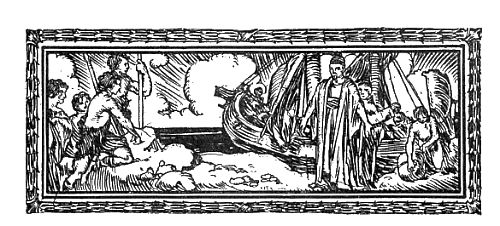
“The bond of commerce was designed
To associate all the branches of mankind;
And if a boundless plenty be the robe,
Trade is the golden girdle of the globe.”
 HE procession advances. Who, you ask, are these
swarthy, Jewish-looking men leading the way? They
are Phœnicians, the first visitors from civilized shores
to our island. These restless wanderers are keen traders,
who have sped their barks from distant Tyre or Carthage
in quest of merchandise. One of them, urging his ship
northward towards this fabled happy land of the western
ocean, has sighted through the clearing mists the distant
line of an unknown shore. He has landed and come into
touch with the natives. Spreading out his tempting treasures
of purple cloth, glittering trinkets, and gleaming glass
to the astonished gaze of the Britons, he has begun to
barter his wares for the native products of the isle.
HE procession advances. Who, you ask, are these
swarthy, Jewish-looking men leading the way? They
are Phœnicians, the first visitors from civilized shores
to our island. These restless wanderers are keen traders,
who have sped their barks from distant Tyre or Carthage
in quest of merchandise. One of them, urging his ship
northward towards this fabled happy land of the western
ocean, has sighted through the clearing mists the distant
line of an unknown shore. He has landed and come into
touch with the natives. Spreading out his tempting treasures
of purple cloth, glittering trinkets, and gleaming glass
to the astonished gaze of the Britons, he has begun to
barter his wares for the native products of the isle.
His keen eyes soon discover that the Britons possess something far more precious than the furs which they proffer. Tin, the most precious metal of the ancient world, abounds here. The Phœnician’s eyes gleam as he makes the discovery; visions of untold wealth flash before him. Tin to him is the most desirable of all metals. In due proportion it will transform soft, yielding copper into bronze, which makes the best weapons of the age. The art of tempering iron is still unknown, and swords and spear-heads of bronze still decide the battles of the ancient world. Alike in peace or war, tin is sought and prized as gold is to-day. The statues of the temples, the urns that hold the ashes of the dead, the ornaments with which men and women delight to adorn themselves, owe their beauty and value to tin. All this the Phœnician knows full well; he has discovered a Klondyke which will make him rich beyond the dreams of avarice.
Again and again he visits this land of Britain, and every voyage he grows richer and richer. He takes infinite precautions lest his secret treasure-house should be discovered. He comes and goes mysteriously. Other traders, greedy for similar gains, follow in his wake and closely beset him; he even runs his ship on a foaming reef, and escapes by swimming, rather than betray the source of his wealth. But all in vain; his secret is discovered, and other barks in quick succession steer for the Tin Islands. An important trade springs up between Britain and Southern Europe. Thus, by means of those mineral treasures which have made Britain what she is, our land becomes known to the civilized world.
Some three hundred years before Christ, an explorer from Marseilles pays the island a visit, and on his return writes a brief account of what he has seen. He tells us of the Kentish farms, with their granaries piled high with golden grain; and he describes the mead of honey and wheat which the islanders drink. More than two long centuries pass away before another explorer arrives to lift the veil still further. He pushes into the interior and makes acquaintance with the rustic Britons, rough and uncouth, the hunters and graziers of the island. He visits the mines of Cornwall, and tells us that the tin is found in earthy veins in the rocks; that it is extracted, ground down, smelted and purified, and exported in knuckle-shaped slabs. Packed into wagons, it is carried during ebb-tide to a neighbouring island, which may be St. Michael’s Mount or the Isle of Wight, and there sold and shipped to Gaul, whence it is carried overland on the backs of pack-horses to Marseilles.
Pass on, ye Phœnicians! We salute you as the fathers of that vast British commerce which has built up the mighty Empire in which we rejoice to-day. Our busy hives of industry with their great factories and roaring looms; our myriad ships that carry, over every sea to every land, the woven fabrics of our workshops, the coal of our mines, and the iron and steel of our furnaces and forges, all owe their beginnings to you who first set ajar for us the golden gates of trade.
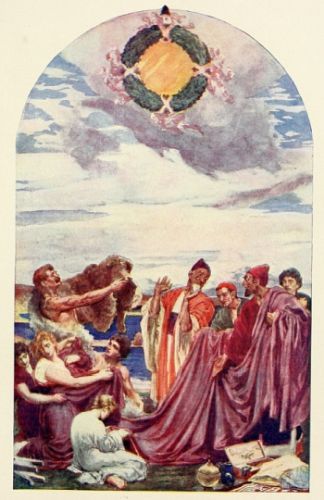
Hunters and Traders.
(From the painting by Lord Leighton, P.R.A., in the Royal Exchange, London.
By permission of Mr. Matthews.)
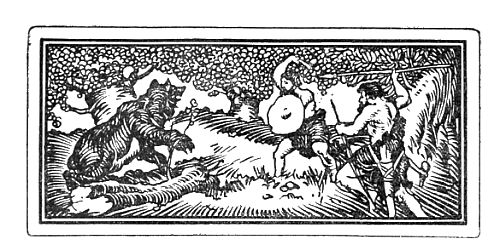
“Where the maned bison and the wolf did roam,
The ancient Briton reared his wattled home;
Paddled his coracle across the mere;
In the dim forest chased the antlered deer;
Pastured his herds within the open glade;
Played with his ‘young barbarians’ in the shade;
And when the new moon o’er the high hills broke,
Worshipped his heathen gods beneath the sacred oak.”
Here come your first Britons, tall, blue-eyed, fair-haired, long of limb, and ruddy of countenance. Some, from the dense forest interior, are clad in the skins of the bears and other wild animals which they have slain; others wear garments of the rough cloth which they have woven on their own rude looms, or have obtained by barter from traders of distant and more civilized lands. None of them are mere yelling savages, bedaubed with blue war-paint; they have long passed that stage. They are all warriors born and bred, fierce in fight but sociable and friendly in peace. They live in tribes under their “kings;” they graze their cattle, till the land, and search the gravels of the rivers for tin.
Let us visit a British “town” of Kent, a century or so before the coming of the Romans, and learn something of the old British mode of life. We plunge into the dark shades of the forest, and follow a narrow track that winds hither and thither through the dense undergrowth. We are armed, for in the thickets and in the caves of the rocky hillocks lurk the gray wolf, the fierce boar, the black bear, and the wild cat. Now and then a startled deer gazes at us for a moment, and bounds away into safety. In the stream which we ford herons are fishing and beavers are building. Overhead the hawks are sailing by, and from a neighbouring marsh comes the boom of a bittern.
On we go, and at length reach a great cleared space. The trees have been felled, and some of the land is under tillage. Horses, sheep, oxen, and swine are quietly feeding, and here and there are strips of grain and barley. Half a mile away is the town. All round it is a moat, with an earthen wall topped by a stockade of oak logs. As we approach the narrow entrance, we see the pointed roofs of many huts, from which thin lines of blue smoke are curling up into the summer air.
We enter the town by a zigzag road, and pass the homesteads, square or round in shape, and built of unhewn or roughly hewn trees placed on end, with roofs of interlaced boughs thatched with rushes or covered with turf. Each homestead consists of one room, large enough to contain the whole family. The floor is of earth, or perhaps covered with thin slates. In the middle of it is the family fire, which continues to burn night and day all the year round; when it dies out, the home is deserted. The smoke escapes by a hole in the roof. Round the fire, along the sides of the room, is a bed made of rushes and covered with hides or coarse rugs. On this the members of the family sit at meals, and sleep at night with their feet towards the fire. The rushes and green grass which are placed between the family fire and the family bed serve as a table, and on this at meal times are placed large platters containing oatmeal cakes, meat, and broth.
In front of the entrance to one of the homesteads a blue-eyed, fair-haired woman, in a tunic of dark-blue cloth, sits grinding corn with a quern or handmill. Little boys, clad in strips of bear-skin, engage in a wrestling match hard by. Sturdy little lads they are, for their rearing has been of a Spartan character; they were plunged into the water of the stream at birth, and they received their first taste of food on the point of their father’s sword. Yonder old woman is boiling water by making pebbles red-hot in the fire and dropping them into an earthen water-pot.
Passing on, we reach a long, low dwelling, which by its size indicates the superior condition of its owner. It is, indeed, the home of the chieftain of the tribe. Big mastiffs and wolf-hounds growl over their bones at the door. Within, the walls are covered with skins. Round shields of hide with shining metal bosses and rims of iron, spears with bronze or iron heads, and bows with quivers of reed arrows tipped with flint adorn the walls. One sword in particular holds the place of honour as a rare prize; it is of iron, with a sheath of bronze studded with red coral.
The chieftain comes forward to welcome us—a tall, well-made man, blue of eye, with long, fair hair and a tawny moustache of which he is vastly proud. Over his flame-red blouse, which is belted at the waist, is a twisted torque of gold, cunningly fashioned and adorned with beautiful tracery; across his blouse is thrown a tartan plaid fastened at the shoulder by a brooch of polished boar tusk. His trousers fit closely to the ankles, and are so characteristic an article of his attire that he is known as “wearer of breeches” in distant Rome. Where his skin is bare, we notice that it is painted with patterns of blue. He greets us heartily, and a slave at his direction hands us a great silver-rimmed horn filled with mead.
His wife shares in the welcome. She is a robust, healthy matron, fit mother of her stalwart sons, who she prays may grow up as heroes, and do ere long some doughty deed which shall entitle them to the heroic names which they have yet to possess. When the day’s work is done, she will gather them about her knees and recite the wild legends of their sires, whose mighty feats of war still inspire young Britons to the fray. She wears a tunic with a scarf of red-striped plaid fastened by a pin of bronze. A string of dusky pearls hangs about her neck, and spiral rings of silver adorn her fingers. The ivory bracelets and the amber beads which she proudly wears have been brought from afar by the traders who visit the town from time to time.
The wife is mistress of the home. She has the management not only of all household affairs, but, as she is the wife of a warrior, the care and direction of the whole concerns of the family both indoors and out. She and her sisters spin, knit, weave, dye, sow, cook, grind corn, and milk the cows—indeed do most of the hard work that is done. Her husband considers field-labour and farm-work entirely beneath his dignity. War and hunting are his work, and right well does he excel in both. Probably safely housed in a hut hard by is his precious scythe-wheeled chariot, in which he goes forth to war when the horn is sounded, the shield is struck, and the cran-tara—the “fiery cross”—is sent through the tribe as a call to arms. He and his fellow-warriors spend much time in their warlike exercises; the slaves, the weaklings, and the old men tend the flocks and herds and conduct the tillage.
Let us continue our tour of the town. Here is a man cleverly weaving baskets of wicker-work; yonder is a fisherman returning from the river, his broad back bearing a coracle, such as you may see on the Dee at Llangollen or on the rivers of South Wales to-day. Not far away is the metal-worker’s hut, where the craftsman is busy mixing his bronze, and moulding it into axes, lance-heads, and sword-blades. Another worker is busy chipping flints brought from the quarry in yonder chalk hills. The potter who labours close at hand kneads out his yellow clay and fashions his pots by hand, ornamenting them by pressing a notched stick or braid against the wet clay. Such is a British town in the most civilized part of the land a century or so before the coming of the Romans.

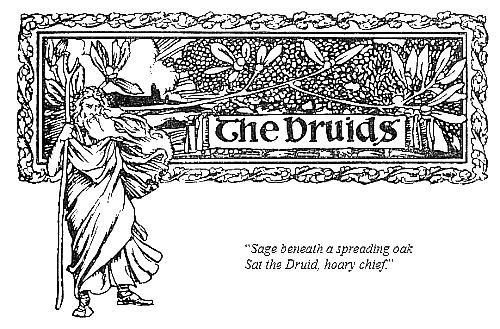
Room for the Druids! Their solemn progress, their patriarchal beards, their white robes of office, and the chaplets of oak leaves on their brows proclaim them at once. Priests, judges, magicians, and instructors of youth, they rule the Britons with a rod of iron. Their altars and idols are set deep in the gloomy shades of dense forests amidst the gnarled and twisted stems of aged oaks. The secrets of their cruel creed are close locked in their bosoms, and over all their words and works they cast a dread mystery that chills the heart of the boldest Briton in the land. Their word is law, their curse is death. Their richest treasures go unguarded save for the awe which they inspire. Deep in their forest shades they offer their mysterious sacrifices; sometimes human beings, imprisoned in huge wicker-work images, are burnt to death to appease the angry gods. The Druids claim to hold sway even over the spirits of the departed, and the Briton trembles as he hears the voices of tormented souls wailing in the night wind. Every shadow is a terror; every flying cloud is an omen of good or ill; every spring, river, and fountain has its guardian deity. Fire is the element which the Druids hold in the highest reverence; the sacred flame on their altars never dies.
Four times a year solemn festivals are held. On Midsummer Eve, New Year’s Day, May Day, and Hallowe’en the great Beltane fires are lighted, and Britons from near and far assemble for worship. The mistletoe growing on an oak is held sacred in the highest degree, and on the sixth day of the moon a feast is prepared beneath the hallowed branches. White bulls are dragged to the tree, and their broad foreheads are bound to its stem, their loud bellowings mingling with the strain of the wild anthem which the worshippers raise. When the beasts have been slaughtered as sacrifices, the chief Druid, clad in his flowing white robes, his golden collar and bracelets, ascends the oak, treading on the backs and broad shoulders of blindfolded slaves. With a golden pruning-knife he severs the mistletoe, and beneath him attendant Druids receive it on a white linen cloth. It is then distributed to the awed and expectant multitude, who carry home and carefully preserve a sprig of the all-healing plant. The Christmas mistletoe beneath which youths and maidens now make merry at the most sacred season of the Christian year annually recalls this heathenish rite.
Much of the Druids’ lore is imposture, but they have wrested from Nature some of her secrets. They know the stars in their courses; they are skilled in the lore of plants and the healing properties of herbs and simples. They practise the arts of public speaking and poesy. Their bards sing the songs of heroes, and inflame warriors with the lust of battle. But over all broods the cruel shadow of death, and men tremble as they pray.
Dread and mighty as these Druids are, the day of their doom is coming. Even now the Roman galleys are on the sea, and their prows are rising and falling as they furrow the heaving waters towards the white cliffs of Albion. Centuries will elapse before the gospel of love and mercy sweeps away the blood-stained rites of the Druids’ creed. The gods of Rome will destroy the deities of the isle. Jupiter and Mars will dethrone them; and in their train, how or when we know not, the message of Christianity will be whispered, until at length the daystar rises, never to set, on the forests of Britain.
Gone are the Druids, but their name still survives in the mountains and valleys of Wales, where the ancient Britons found their refuge in a later age. Our modern Druids love letters and music, and the other beautiful arts which touch and kindle souls. Theirs it is to encourage men and women to build the lofty rhyme, to weave the golden strands of melody, and to limn the loveliness of earth and sea and sky. Thus transformed, the Druid is a prophet of sweetness and light, not an enslaver of souls.

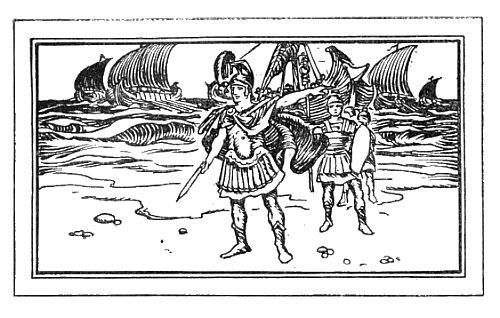
“The foremost man of all the world.”
A king amongst men now draws near. As he strides by, a proud and majestic figure, you know that you are in the presence of one of the world’s greatest men. He bears himself like a conqueror, yet he is far more than a mere victorious general. Scholar, statesman, writer, orator, and architect, he is the “noblest Roman of them all.” Look at his stern, powerful face, his eagle-like nose, his thin, firm-set lips, his lofty brow, and his massive head crowned with a wreath of laurel. “Cæsar!” you cry, and it is none other than he.
He has subdued Gaul, and now he looks across the narrow strait towards the white, gleaming cliffs of Dover. A new arena opens before him, a land untrodden by Roman feet, an island of fabled wealth of pearl and tin, of waving cornfields and rich pastures, peopled by sturdy warriors worthy to cross swords even with him. He remembers the fiery charge of the British on many a Gaulish battlefield, and his wrath rekindles as he thinks of the havoc they have wrought amongst his legions, and of the welcome and shelter they have afforded his flying foes in their unconquered island only a few leagues away. Right well do they deserve to feel the weight of the Roman hand. He has received invitations, too. The tribes on yonder coveted island are ever at war with each other; ambitious chiefs are ever seeking to subdue their weaker neighbours. Refugees have fled to him beseeching his assistance against their enemies. Ambition, revenge, and the prospect of easy victory over a disunited foe, all urge him on to the new enterprise now shaping itself in his busy brain. “The die is cast.” He will invade and conquer Britain, and add another laurel to his wreath of fame.
He consults the chief merchants of the Gallic coast, and endeavours to learn the military strength, the resources, the landing-places of the island; but they are dumb, and only find their tongues when they secretly and hurriedly send off messengers to warn the islanders of the threatened invasion. Envoys from Britain speedily arrive, eager to appease the wrath of great Cæsar by humbly offering to submit. They are too late. “The die is cast.”
A Roman galley pushes out to survey the British coast and to fix upon a suitable landing-place. Meanwhile Cæsar masses his legions and hies him to Portus Itius, where his transports lie. The return of the scout is the signal for embarkation, and on the morning of August 26, in the year 55 B.C., anchors are weighed and the galleys stream out of the harbour. By ten o’clock they are under the cliffs of the British shore, and then they perceive that no easy victory awaits them. Heavy fighting must be done ere the legions form up on the British shore. The cliffs are black with warriors, chariots, and horsemen ready to oppose their landing.
With a favouring breeze and the tide in his favour, Cæsar skirts the shore eastward, until a shelving strand somewhere near Romney Marsh promises him convenient landing. As his galleys move eastward, the British on the cliffs move eastward too. There is a long pause; the transports containing the cavalry are still miles away. They have not appeared at three in the afternoon; the day is wearing on, and Cæsar determines to attempt a landing without them.
With difficulty his ships approach the shallow shore, only to find the full force of the island-army, with horsemen and chariots, drawn up in battle-array to receive him. The British horsemen spur their steeds into the waves; and many a half-naked footman, with sharp javelin, heavy club, or rough-hewn war-hatchet, presses on towards the galleys. For a few minutes the Roman soldiers are dismayed and dare not leap from their ships. Then Cæsar orders up his warships and stations them on the flank of the enemy. Slings and catapults open fire, and the Britons, assailed as they have never been assailed before, draw back in confusion. Still the Romans hesitate, but the situation is saved by the standard-bearer of the famous Tenth Legion. “Leap, fellow-soldiers,” he cries, “unless you wish to betray your Eagle to the enemy. I at least will do my duty to the Republic and to my general.” Roused by his example, the Romans leap from their ships, and immediately a fierce fight rages in the water.
The waves are red with blood; mailed Roman and naked Briton hack and hew at each other in confused combat; and slowly but surely the invaders gain the beach. There they form into ranks, shoulder to shoulder, and against that solid wall of disciplined valour nothing can stand. The scythe-wheeled chariots thunder towards the Roman array, the evening sun glinting from their outstretched blades; but the fiery horses are impaled on the iron points of the Roman spears. Step by step the Britons are forced from the strand; fainter and fainter sound the voices of the Druids singing their frenzied war-chants; and ere darkness has settled down the islanders have retreated, and the Roman victors remain on the beach which they have so hardly won.
Next day come chiefs with offers of submission; but four days later, when Cæsar’s cavalry transports are nearing the coast, a great storm arises. The anchored galleys are wrecked; the newcomers are driven back to Gaul. Cæsar is in perilous plight. He has no provisions for his soldiers, no materials with which to repair his shattered ships. The autumn storms have begun, and he is on a treacherous coast, harassed by a fierce, unrelenting foe.
These disasters give new hope to the Britons. They rapidly muster their men, and form an ambush in an uncut field of grain not far from the Roman camp. When the Seventh Legion comes out to reap the corn it is suddenly beset on all sides by a host of horsemen and charioteers. The cloud of dust raised by the chariot wheels betrays the fight to the sentinels of the camp. Cæsar hurries to the spot, and just manages to save the reapers from utter destruction and convey them back to his stronghold. The Britons follow, and make the grievous mistake of attacking the Romans in their trenches. Beaten back time after time, they again retreat to their fastnesses in the woods, and once more offer submission.
Cæsar is quite ready for peace. His troops are weary, for they have been seventeen or eighteen days on the island, and the struggle has never ceased. His twelve thousand men are all too few to overcome the obstinate Britons. He does not wait even to receive the promised hostages, but, taking advantage of the first fair wind that blows, he returns to Gaul, baffled and beaten, without a single token of conquest.
Next year he comes again. The warm spring days that bring the swallows bring the Roman galleys once more. This time he does not despise his enemy. Twenty-five thousand foot and two thousand horse, embarked on eight hundred ships, speed towards the threatened shore. He lands without striking a blow, and stray prisoners inform him that his advance is to be challenged at a ford on the Stour twelve miles away. He is determined not to lose an hour. Through the night his legions tramp over the unknown country, and in the cold gray of the early dawn they find themselves on the bank of a reedy river, with the foe drawn up on the opposite side.
The charge is sounded, and the Roman cavalry dash into the river with the utmost impetuosity. They break through and through the ranks of the British infantry, their bronze swords being no match for the tempered iron of the Roman brands and javelins. Again the Britons give way, and betake themselves to their woodland fortresses barricaded with the trunks of felled trees. Here Cassivellaunus, behind his stockade, holds out stoutly. But his fortifications are carried at last, and the four “kings” of Kent, who have failed in an attack on the Roman camp, come once more in humble guise to offer their submission. Cæsar is again ready for peace. Forest fighting is too perilous for his taste. Amidst the mazes of the woodland the Roman formations are broken up, and in hand-to-hand combats the Britons are the equals of his best and most highly-trained soldiers. So he yields to the inevitable. He receives hostages and empty promises of annual tribute. Again he departs, leaving nothing to mark his so-called conquest but the earthworks of his deserted camps.
Once more he has failed. He may not describe his campaign as he does a later victory—“I came, I saw, I conquered.” He is fain to confess that his usual good fortune has deserted the “eagles” in Britain. A few hostages, a girdle of British pearls for Venus, and a lordly triumph in Rome—these are the only fruits which Cæsar reaps from his toils and perils on this side of the Channel. He vanishes from the pageant to win plentiful laurels on other fields. He has failed in Britain, but elsewhere he becomes unchallenged master of the Roman world. Ten years later, having attained the very summit of his ambition, he falls beneath the daggers of his erstwhile friends.
Cæsar vanishes, and with his departure twilight once more settles down on the land. For nearly a hundred years no Roman soldier sets foot on the island. Nevertheless, Britain is nearer to the masterful city on the Tiber than she has been before. Roman gossips talk of the island in their streets. Adventurous Romans and equally adventurous Britons exchange visits. Trade increases between the far-off island and the heart of the world. Roman huntsmen prize their British hounds, and British slaves are fashionable in the patrician homes of Rome. Britain moves onward in the march of civilization, and ere the century of peace comes to an end she is a real prize of conquest—a laurel worthy of the imperial brow itself.
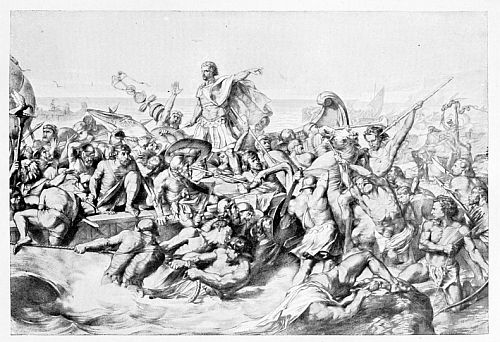
THE FIRST INVASION OF BRITAIN BY JULIUS CÆSAR.
(From the cartoon by Edward Armitage, R.A.)
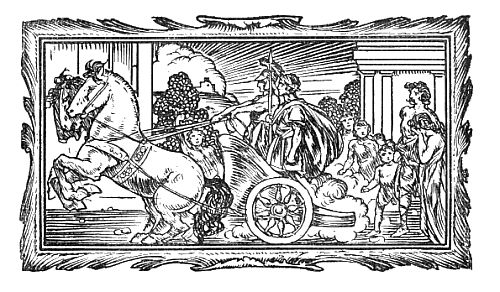
“What though the field be lost?
All is not lost.”
 HE real conqueror of Britain now approaches. We
know that British “kings” in distress more than
once appealed to Augustus, and that he seriously
thought of invading the island. The real conqueror,
however, was the Emperor Claudius, who in 43 A.D.
sent an army under a trusted leader. On the road to
Britain the troops mutinied. Where Cæsar had failed, how
could they hope to succeed? Besides, the Britons were now
united under Caractacus, a valiant and skilful warrior. The
mutiny, however, was crushed, and again the Romans
landed without opposition. They pushed across the
Medway to the Thames, which was forded, and thence to
the capital of Caractacus, deep in the Essex woods. The
Roman legions stormed the British stronghold, and, flushed
with victory, the Emperor Claudius proudly dubbed himself
Britannicus. But the work of conquest had only begun.
Britain was far from subdued, and probably she would never
have been the prey of the forty thousand or fifty thousand
Romans who accomplished the task had the Britons fully
understood that “union is strength.” Their divisions were
worth many legions to the Romans, who met and conquered
various bands of islanders, and never met a united army.
One Roman general is said to have fought three-and-thirty
battles south of the Thames, and to have captured more
than twenty stockaded towns. The gallant Caractacus could
make no headway against his foes, and leaving a brother
dead among the Essex swamps, he sought refuge in the
trackless mountains of South Wales.
HE real conqueror of Britain now approaches. We
know that British “kings” in distress more than
once appealed to Augustus, and that he seriously
thought of invading the island. The real conqueror,
however, was the Emperor Claudius, who in 43 A.D.
sent an army under a trusted leader. On the road to
Britain the troops mutinied. Where Cæsar had failed, how
could they hope to succeed? Besides, the Britons were now
united under Caractacus, a valiant and skilful warrior. The
mutiny, however, was crushed, and again the Romans
landed without opposition. They pushed across the
Medway to the Thames, which was forded, and thence to
the capital of Caractacus, deep in the Essex woods. The
Roman legions stormed the British stronghold, and, flushed
with victory, the Emperor Claudius proudly dubbed himself
Britannicus. But the work of conquest had only begun.
Britain was far from subdued, and probably she would never
have been the prey of the forty thousand or fifty thousand
Romans who accomplished the task had the Britons fully
understood that “union is strength.” Their divisions were
worth many legions to the Romans, who met and conquered
various bands of islanders, and never met a united army.
One Roman general is said to have fought three-and-thirty
battles south of the Thames, and to have captured more
than twenty stockaded towns. The gallant Caractacus could
make no headway against his foes, and leaving a brother
dead among the Essex swamps, he sought refuge in the
trackless mountains of South Wales.
Here Caractacus rallied the broken tribes for a last stand. He chose his ground with great skill in the centre of steep and difficult hills, and raised ramparts of massive stones where an ascent was possible, while between his army and the road by which the Romans must approach there flowed a river deep and wide. As the terrible Romans drew near Caractacus addressed his men, bidding them remember how their sires had driven back great Cæsar himself, and encouraging them to strike for home and freedom. The Britons, however, were again conquered. Roman discipline, Roman armour, and Roman swords were too much for them. Caractacus escaped, and fled to the court of his step-mother, Cartismandua, who to her eternal shame basely betrayed him to the foe against whom he had waged an unceasing struggle for nine years. Roman chains fettered the limbs of the British champion, and his capture was a triumph. To Rome he must go, where his exploits were well known, and the citizens were agog to see him.
With his wife, brother, and child he “graced the chariot wheels” of the Roman general. Through the majestic city he strode, noble in his simple dignity, and still unconquered. While his companions in fear begged for mercy, he, proudly erect, and his eye, which had never quailed before a Roman brand, boldly bright, recked not of death, deeming honour a greater prize than life itself. As the triumphal procession passed along the Sacred Way he saw the stately temples, the massive arches, the beautiful statues, and the luxurious dwellings of the great city, and asked, “Why should these Romans, with all their grandeur, covet my poor hut at home?”
Brought before Claudius, he made a noble defence and a proud appeal for clemency. Claudius was moved. He bade his lictors strike off the Briton’s chains and set him free. His after-career is unknown. In his noblest hour he vanishes from the pages of history.
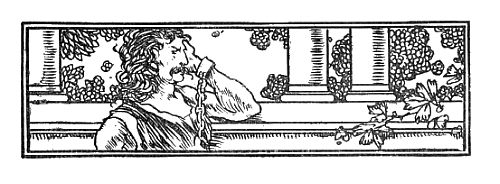
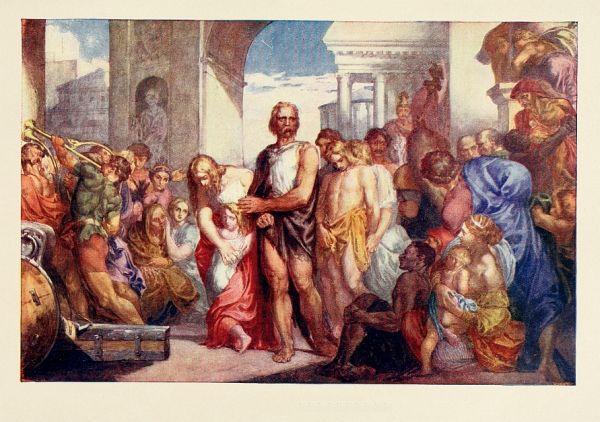
Caractacus in Rome.
(From the drawing by G. F. Watts, R.A.)
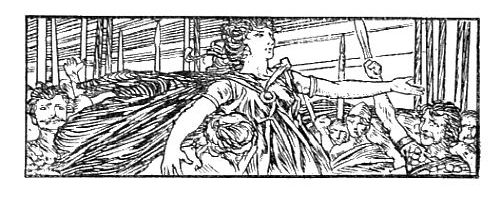
“Me they seized and me they tortured, me they lashed and humiliated;
Me the sport of ribald veterans, mine of ruffian violators.”
Now move we on. Roman arms triumph in the field, but there is no peace in the land while the Druids, amidst the shadowy groves of Mona (Anglesea), cease not to stir the Britons to “mutiny and rage.”
Suetonius Paulinus determines to extirpate them root and branch. He marches to the shores of Menai Strait, and at nightfall his men essay to cross in flat-bottomed boats. As they near the other side an awe-inspiring scene meets their eyes. The Britons are drawn up in dense array. To and fro run black-robed women, brandishing torches, “fierce as the Furies,” their long hair streaming in the sea breeze. Behind them the assembled Druids are lifting their hands to high heaven and calling down terrible curses on the invaders. Huge fires crackle and blaze, as though impatient of their victims. The frantic women, the cursing priests, the flaming torches, the roaring flames paralyze the Romans. They shudder at the sight, and hesitate to land. But discipline prevails; they answer to the appeals of their general, and sweep forward in resistless attack. The carnage is dreadful; the sacred groves are fired; the Druids perish in their own flames; and the setting sun sinks on a scene of desolation and death. As the gray embers die out, Druidism perishes.
But elsewhere the flame of freedom still burns in many a British breast. While Suetonius is slaughtering the Druids, Boadicea, Queen of the Iceni, is rousing her followers to fury by the tale of her terrible wrongs. Her dying husband, to appease his conquerors, bequeathed half his wealth to them, in the hope that his wife and daughters might enjoy the rest in peace. He reckoned without his hosts. They seize the whole of the treasure; they scourge Boadicea with rods; they shamefully wrong her children, and goad her to madness.
See her now in her war-chariot, her long yellow hair unbound, and falling below the golden girdle that encircles her waist, her eyes flashing vengeance as she pours forth burning words and pleads for revenge. Her men arm themselves, and almost every hut on the wide plain east of the Chilterns sends forth its warrior sworn to vengeance. They swoop upon the feebly garrisoned town of Camulodunum, and every Roman in it—man, woman, and helpless infant—is put to the sword. The Ninth Legion, coming to the rescue, is cut to pieces, and the whole East of England is in a blaze of rebellion. London falls before the conquering tribes, and seventy thousand Romans are butchered by the bloodthirsty victors. At last it seems that the yoke of Rome is broken, and Britain is once more free.
The dread news at last reaches Suetonius. By forced marches he hastens to London. Too late to save the city, he turns north, and takes up a strong position, with woods and the sea behind and the open plain in front. The Britons are eager for the fight. So sure of victory are they that they have brought their women to the field as spectators, and have placed them in a row of wagons in the rear, so that their shrill cries of encouragement shall ring in their ears as they charge down on the foe.
Boadicea, spear in hand, her daughters by her side, hurries from tribe to tribe in her chariot, exhorting her followers to conquer or die. “This,” she cries, “is a woman’s resolve; as for men, they may live to be slaves.” Maddened by her words, the Britons charge the foe, only to be repulsed with awful slaughter. They recoil from the brazen wall, and the legions carve their way through the disordered ranks, while the masterless steeds of the chariots, dashing hither and thither, add to the slaughter. The Romans are pitiless; they spare not even the women.
The battle is over; Rome has triumphed, and Boadicea, heart-broken and hopeless, flies from the scene, and in shuddering horror at the fate which awaits her, ends her life and that of her children with poison. Cowper, in his well-known poem, represents a Druid in the hour of her death prophesying the fall of the Roman Empire and the far-off greatness of her stricken land,—
“Ruffians, pitiless as proud,
Heaven awards the vengeance due:
Empire is on us bestowed,
Shame and ruin wait for you.”
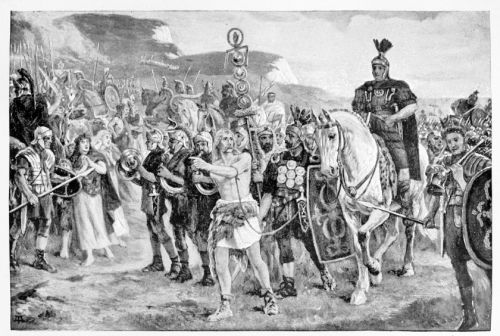
THE INVASION OF THE EMPEROR CLAUDIUS.
(From the painting by Thomas Davidson.)
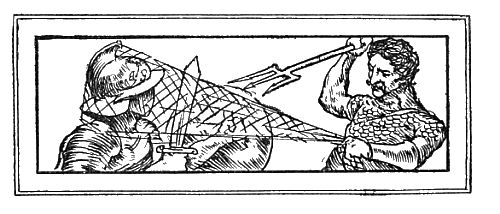
“Rome was the whole world, and all the world was Rome.”
The next figure in our pageant to attract attention is again a Roman, but a man cast in a very different mould from the harsh and tyrannical Suetonius. In distant Rome the emperor has taken to heart the moral of the terrible rising led by Boadicea. He now knows that the Britons will never yield to severity. Consequently Agricola, the new governor, is a firm, just man, who strives by every means in his power to make the Roman yoke press as lightly as possible on British shoulders. He rules Britain much as a British Viceroy governs our Indian Empire to-day. He fosters the peaceful arts; he introduces the British nobles and their sons to the pastimes, the dress, the luxuries, and the manners of Rome. In course of time Britain sullenly submits to her bondage, though she is still held down by force of arms. The art and practice of war are now forbidden to the Britons, except to the flower of the youth, who are drafted into legions which garrison lands far from the call of home and kindred. The fiery Briton no longer wields the claymore; he becomes a skilled craftsman, a patient farmer, a delver in the mines.
Still, Agricola has his share of fighting. The Britons of North Wales are subdued in the first year of his governorship. In the second year several tribes in North Britain feel the weight of his hand; and in the succeeding year he pushes into Caledonia, and carries his “eagles” to the Tay. During the following summer he builds a chain of forts from the Clyde to the Firth of Forth, vainly hoping that by this means he will pen the fierce Caledonians in their northern fastnesses. His greatest campaign is undertaken in the year 84 A.D., when he pushes into what is now Forfarshire and inflicts a terrible defeat on a host of Caledonians under their doughty chief Galgacus.
Meanwhile his galleys are creeping northward along the coast. They touch at the Orkneys, they round Cape Wrath, run down the western coast with its maze of islands, see the Irish hills on the starboard, and follow the shores of South Britain until they espy Land’s End, and find themselves once more in the familiar waters of the Channel. This voyage proves without a doubt that Britain is an island.
Agricola’s government, wise, firm, and prosperous, comes to an untimely end. The emperor is jealous of him, and recalls him to Rome on a trumped-up charge. What befalls him we do not know, but probably he comes to a violent end. At all events, he fades out of our history, leaving behind him a fame which emperors cannot dim nor unjust tribunals take away. Farewell, Agricola! We salute thee as the greatest governor which Britain ever knew while Rome held sway.
And now the land is happy in having little history to record. A generation comes and goes, and all the time Rome is building up her government, carrying out her great military works, and bowing the neck of the enfeebled Briton to her yoke.
What, you ask, is the appearance of Britain during the long years when the Roman peace has settled down on the land? Let us suppose that we are suddenly planted down in the island during the period Britain is part and parcel of the Roman Empire. Our first impression is that a great change has taken place in the appearance of the country. In many places the dense woods have disappeared; broad fields have been carved out of the forests, and are being carefully tilled by gangs of British slaves. Britain has become one of the great granaries of the Empire. Cattle and sheep by the hundred feed on the hillsides; and in Rome they speak of this land as Britannia Felix, “Britain the Happy.”
With the disappearance of the forests the weather has improved. No longer is the island wrapped in steaming mists; no longer is the sky always clouded. Many of the rivers which formerly lost themselves in reedy marshes are carefully banked in, and now flow on as broad, fair streams. The morasses are crossed by causeways, the fens are drained, the rivers are bridged, the fords are easy, and the Britons loudly complain that their hands and bodies are worn out in the toilsome work.
Look at the road beneath your feet. Broad and straight, it runs over hill and valley, across stream and moor and bog. British labourers, under the eye of Roman road-engineers—never surpassed before or since—have dug down to the rocky crust, and upon this have built three or four layers of squared or broken stones mixed with gravel, lime, and clay. The upper surface is closely paved, especially in the middle, with large flag-stones. This is one of the military highways, all spreading out, as our modern railways do, from London, and enabling the legions to pass with speed through the length and breadth of the province. Watling Street, Fosse Way, Hermen Street, Ikenild Street—the chief military roads of the island—may still be traced, and in parts are used to-day.
While we are examining the road, we hear the tramp of armed men, and a legion swings by. Swarthy Italian, yellow-haired German, and dusky Moor march side by side armed with brazen shield, heavy javelin, and short, thick sword. In the midst is the glittering “eagle,” which the Roman would rather die than yield to a foe.
Let us follow the legion towards yonder city. On we go, traversing the broad, white road, now crossing a stream by a bridge, now wading waist-deep through the ford of a broad river. Here and there amidst the trees we see the white buildings of a villa, the residence of some Roman official. Notice the beautiful garden as you pass, and admire the orchards of apples, plums, pears, and cherries, and the south wall where the clustering grapes are ripening in the sun. Anon we skirt the fringe of a cemetery with its mounds of earth marking the hollow graves, each with its urn of dark clay containing the ashes of the dead.
On and on we march, swinging to the right or left as some mounted messenger bearing dispatches for his general spurs by. At last the roofs of the city are seen. Round about it is a great rampart of stone; and here and there we see a sentinel, who leans on his javelin and shades his eyes as he peers across the plain. We enter through one of the four gates, pass the guard, and are at once met with a civilization such as the Briton of old never dreamt of. We pass by rows of private dwellings of stone and coloured tiles, glorious with pavements and columns. Here we see the fluted or leaf-crowned pillars of a temple to Neptune; there a stately shrine to Minerva. Yonder are the public baths, with their marble halls and inlaid pavements—unequalled in design and workmanship outside Rome. Within these heated chambers the chilly Roman official may recall the comforting warmth of his Southern home, and dream of the day when he shall see the beloved City once more. Yonder is the court-house, and in front of it senators in flowing robes, with parchment scrolls in their hands, pace to and fro.
Make way for the governor! Before him march his lictors with the axe in its bundle of rods, and behind him follows a guard of honour. Now a gang of slaves is driven by; and here comes a shock-headed British chieftain who has been captured in border warfare, and anon will face the judgment seat.
Hard by is the amphitheatre, where the townsfolk throng to see plays performed, or better still to see the trained gladiators who fight to the death “to make a Roman holiday.” Here on the seats, tier above tier, sit the wealthier Britons of the town, aping their masters in dress, speech, and manner. No longer do they delight in the battle and the chase; they love the pleasures of the town. Their golden locks are shorn and their beards are trimmed in the Roman fashion; they vie with each other in the fold of a toga and the fit of a sandal; their days are spent in a weary quest of amusement. They bathe; they drink their wine; they feast; they dice; they go to the shows; and consider themselves fine fellows indeed, because they can lisp the tongue of their masters.
The gleaming marble portico of the governor’s residence invites us. Within, the ladies of his household sew and spin, while their lord directs the affairs of his town and sits on the judgment seat. On their dressing-tables are mirrors of polished steel, combs of boxwood, and pins of bone for their long tresses. They gird up their robes with brooches of gold and silver; they wear jewelled bracelets on their arms and dainty shoes of silk on their feet. Supper is at three. Then the gentlemen will join them, and they will recline on the couches and feast on the dainties of the island, which they will wash down with a favourite wine trodden out in the presses of the distant home-land.
Then we pass on to the “poor quarter,” where the workshops of the multifarious workers are situated and the huts of the humblest part of the population abound. Here there are squalor and misery in plenty, but still a touch of Roman manners.
Such is the life of a Brito-Roman town in the palmy days of the Romans in Britain.
And now let the pageant move on to the closing scenes of Roman sway. Rome is sinking fast. Within, her citizens have lost their old courage and genius for government. Without, the fierce Goths and Vandals are assailing her provinces. Rome’s grip on her Empire is being loosened more and more every day, and the wild hordes on her frontiers grow bolder and bolder as the Roman garrisons are withdrawn to defend the great city itself. So it is in Britain, where the Caledonians swarm over Hadrian’s Wall and fall upon the Britons of the south. The Roman troops mutiny, and set up their general as emperor, and even follow him to Gaul, where stout-hearted Severus, who now appears on the scene, makes short work of them and their leader.
Meanwhile the ravages of the Caledonians increase, and to save the province old Severus, now sixty-two years of age and racked with the gout, crosses the Channel, and, carried in a litter before his army, sets his face for the border, in the hope of teaching the northern tribes a terrible lesson. Through the trackless swamps, the woods, the moorlands, and the wild mountains beyond the Wall, the old general hews his way until he reaches the shores of the Moray Firth, where the tribes make peace. Severus has accomplished nothing. His victory is a disaster; a few more such victories and he will have no army left. When the watchers on the Wall greet his approach with shouts of welcome, the bleaching bones of fifty thousand Romans mark his long line of march. He repairs the Wall, and then, grievously sick, retreats to York, where, on his deathbed, he plans a new campaign which will never be made.
His death is the beginning of the end. Two hundred years of misery and constant strife set in. General after general makes himself emperor; they come and go in blood; and all the time Britain, despoiled of her youth to rot on foreign fields, is the prey of a pitiless foe. The Caledonians, who are now known as Picts and Scots, actually march on London and carry off its citizens as slaves. A new and even more dreaded foe, the terrible Saxon pirate, has also appeared; there are desperate attempts at defence, but they are one and all in vain. The hour of doom has struck, alike for Empire and Province. The Goth is thundering at the very gates of Rome. All the available troops of the Empire, wherever stationed, are called in to defend the city.
The last of the legions leaves British shores in the year 407 amidst the sighs and tears of the defenceless inhabitants, who are now as sheep without a shepherd. Pitiful appeals—“the groans of the Britons”—are sent to Rome; but the weak and indolent emperor merely pauses in the absorbing pastime of feeding his pigeons to tell the despairing islanders that they must provide for their own safety. Thus Britain is left to her fate, and for two long centuries darkness closes round her.
“The eagles have flown.” Their glory has departed, and they disappear from the pageant of our history. Rome found the natives warlike, though untrained; she left them helpless and feeble. True, she gave them the benefits of peace; she taught them arts and crafts; she gave them education, and a measure of comfort and prosperity. But she did not teach them how to defend themselves, and so, when overwhelmed by hardier foes, they perished miserably by fire and sword.
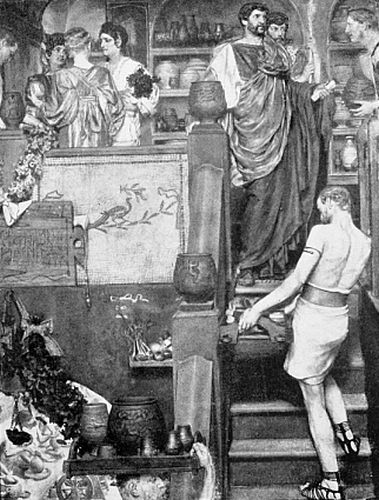
THE EMPEROR HADRIAN VISITING A POTTERY IN BRITAIN.
(From the picture by Sir Lawrence Alma-Tadema, R.A. By kind permission of the Artist.)
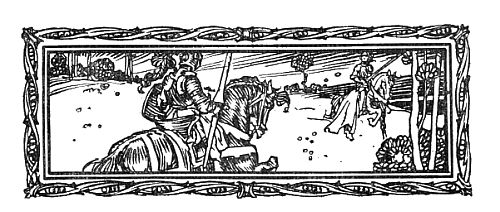
“In twelve great battles overcame
The heathen hordes, and made a realm and reigned.”
 HE light burns low on our pageant, and the scene
grows dim and confused; yet we know only too
well that a desperate struggle is going on. The
battle-cries of warriors and the shrieks of the wounded are
ever in our ears. The glare of blazing roof-trees lights
up for a moment the ghastly scene, and reveals the pitiless
work of slaughter. As it flickers out all is gloom and
silence; it is the only peace that the stricken land knows.
HE light burns low on our pageant, and the scene
grows dim and confused; yet we know only too
well that a desperate struggle is going on. The
battle-cries of warriors and the shrieks of the wounded are
ever in our ears. The glare of blazing roof-trees lights
up for a moment the ghastly scene, and reveals the pitiless
work of slaughter. As it flickers out all is gloom and
silence; it is the only peace that the stricken land knows.
The scene shifts, but the drama is ever the same. There seems to be no end to the hordes of attackers. They come by sea and they come by land; most terrible of all are they whose serpent-headed ships are now seen faintly on the strand. The tide of war sets in their favour, though they are beaten back from time to time before the despairing onset of the Britons.
Now you see amidst the press the noble form of that gallant British prince who is the very soul of the island defence. Arthur, the peerless knight, steps before us, “every inch a king.” He shines like a star in the gloom. Legend, song, and story have so woven themselves about his name and fame, so many fables have been told about him, so many wondrous deeds and miracles have been ascribed to him, that historians dispute his very existence.
What do the old chroniclers tell us of him? They tell us that he was the son of Uther Pendragon, a valiant British king, who kept the Saxons at bay through many hard-fought years. Arthur’s birth had been kept a secret, and the child had been placed by the great wizard Merlin in the care of a knight named Sir Ector, who brought him up as his son. The ruin of the country seemed to be at hand, when Merlin induced the Archbishop of Canterbury to summon a meeting of all the great barons and nobles in London on Christmas Eve, in order that a king might be chosen. To this meeting came Sir Ector, his son Sir Kay, and Arthur.
While they were at prayers a huge block of marble uprose in the churchyard. On the top of it was an anvil of solid steel, in which was embedded by the point a sword of marvellous brightness, bearing on its jewelled hilt these words, “Whoso pulleth me out of this stone and anvil is rightwise king born of England.” In vain did ambitious knights and squires, day after day, strive to draw forth the magic sword. All failed, and men despaired of discovering the rightful king. Now it chanced that on New Year’s Day a tournament was held, and amongst the knights who rode to take part therein was Sir Kay, who was accompanied by Arthur as his squire. As they rode towards the field, Sir Kay discovered that he had left his sword behind him at his lodging. He prayed Arthur to ride back for his sword, and Arthur, as a dutiful squire, obeyed. When, however, he came to the lodging he found it closed, for all who dwelt there had gone to the jousting.
On his way Arthur had passed the churchyard where the sword was upstanding in the anvil. Thither he rode, and, seizing the sword, easily pulled it out and carried it to Sir Kay, who did many warlike feats with it. Then he showed it to his father, who knew the secret of Arthur’s birth, and guessed what had taken place. The sword was replaced, but Arthur drew it forth as easily as before. On this the old knight and his son knelt before Arthur, and acknowledged him as “rightwise king born of England.”
On Twelfth Day, in the presence of all the kings and lords of the land, Arthur again drew the sword from the anvil, though no one else could move it. Still the great lords were loath to recognize the boy as king; and Merlin, seeing that Arthur’s right would not be admitted without bloodshed, gathered as many as he could of the best knights of the realm, and used all his magic arts to aid the good cause. On one occasion the kings and barons besieged Arthur in a strong tower, but when he was in the direst peril he sallied forth and attacked his besiegers. His horse was slain under him, and he was at the mercy of his foes. Then he drew the magic sword which he had taken from the anvil, and the fortune of war instantly turned in his favour. His sword—the far-famed Excalibur—gleamed like the radiance of thirty torches. Its flashing beams half-blinded Arthur’s foes—they could not see to strike; and so he vanquished them, and gained his first victory.
Battle after battle was fought before Arthur was acknowledged as king by all men in the land, but at length the hour arrived when no one dared to dispute his title to supremacy. Then he wedded the beauteous but false Guinevere, and set up again the Round Table which his father Uther had founded. Around it were a hundred and fifty seats, and on the seats sat Arthur’s knights, all of equal degree, none first and none last. The chronicle of their deeds is too long to tell: many were the brave deeds they did together, many were the battles they fought, many were the distressed ladies they succoured, and great was the fame and glory that enshrined them. “Britain for the Britons” was their cry, and they haughtily sang:——
“Blow trumpet, for the world is white with May;
Blow trumpet, the long night hath rolled away!
Blow through the living world. Let the king reign!
“Shall Rome or heathen rule in Arthur’s realm?
Flash brand and lance, fall battle-axe on helm;
Fall battle-axe and flash brand! Let the king reign!”
So Arthur leads on the Britons, with the image of the Virgin on his shield, and points his sword Excalibur towards the swarming foe. Twelve great battles he fights with the English, and for a time holds them at bay. Then some of his followers desert to the enemy, and he is sore beset. One by one his knights fall around him, and then he, too, is stricken to the ground. Sore wounded, Arthur calls the last of his knights, and bids him throw Excalibur into a lake. The sword is flung high into the air, and as it falls, lo, a hand comes out of the water and catches the magic brand by the hilt. Three times it is brandished, and then it vanishes for ever beneath the waves.
“Alas!” cries Arthur, “my end draws near. Carry me to the edge of the water.” The knight does so, and there, awaiting the dying king, is a black barge, his destined bier. On the deck are three queens, with black hoods and crowns of gold. “Now, put me in the barge,” says Arthur; and when this is done, the queens receive him with great mourning and wailing, and one of them cries, “Ah, my dear brother, why hast thou tarried so long?” Then Arthur bids the knight farewell, and the barge slowly moves across the water. Sad and lonely, the knight watches it disappear
“Down that long water, opening on the deep,
Somewhere far off, pass on and on, and go
From less to less, and vanish into light,
And the new sun rose bringing the new year.”
So fades Arthur from our view, a dim and mystical figure in life, a vision of undying splendour in death. Let the historians say what they will, men will still believe in him; they will still see the wearer of his mantle in every true knight, and still hold him a shining example to all who “bear without abuse the grand old name of gentleman.”
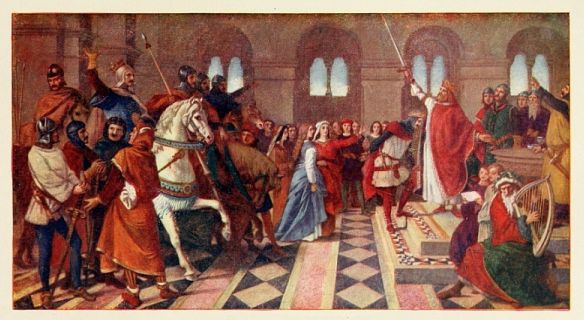
Sir Tristram at the Court of Arthur.
(From the fresco by William Dyer, R.A., in the King’s Robing-Room in the Houses of Parliament.)
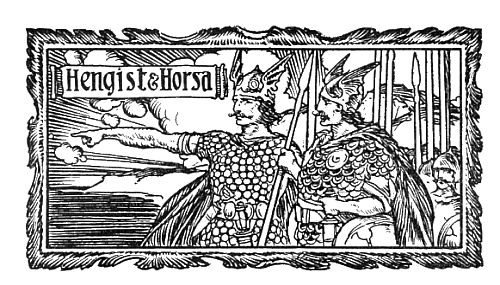
“The blue-eyed race
Whose force rough-handed should renew the world.”
What warriors be these who now pass by? Tall, big-boned, blue-eyed men they are, with long yellow hair falling upon their shoulders from beneath their winged helmets.
Their home is a sad, barren, overcrowded country, and their poverty drives them to a life of plunder on the seas and to the shores of more favoured lands. They love fighting as the breath of their nostrils; and now, in their long ships, these dreaded pirates harry Britain at a hundred points. Death frights them not, for he who falls gloriously in battle rides Odin’s horse to Valhalla, where his days will be spent in cleaving the helmets and hacking the limbs of like heroes with himself, and his nights in feasting on a great boar whose flesh never grows less and in drinking great draughts of mead out of the skulls of his enemies. For the “niddering” coward who dies ingloriously in his bed these English pirates have nothing but scorn and contempt. To avoid the shame of a peaceful death they will hurl themselves from the cliffs, or push out in a frail craft into tempestuous seas, and perishing amidst the wind and the waves, win the right to enter Odin’s halls. A Roman poet says of them: “Fierce are they beyond other foes; the sea is their school of war and the storm their friend; they are sea-wolves that live on the plunder of the world.” Such are the foes against whom Arthur fights and falls.
The warriors whom we now greet are Hengist and Horsa, the two English chiefs who first won a foothold for themselves on the soil of Britain. An old legend tells us that they were scouring the coasts of Kent what time Vortigern, the British king, was sore beset by the Picts and Scots. Half beside himself with terror at their raids, he calls on these adventurers to aid him. If they will drive back the northern barbarians, they shall have food and pay for their services. The bargain is struck. Hengist and Horsa beach their keels on the gravel spit at Ebbsfleet and land their warriors. The Picts and Scots are driven back, and the victorious English return from the fray. Then they ask a whimsical boon—namely, as much land as a bull’s hide can encompass. The request is granted, and Hengist cuts his bull’s hide into long strips, and with them engirdles a rocky place, whereon he erects a fortress. Thus the English secure their first foothold in Britain.
The news is wafted across the sea, and a new swarm of “sea-wolves” appears. They come in seventeen ships, and on the stern of the leading vessel the banner of the White Horse waves in the breeze. With the newcomers arrives a new conqueror, wearing no helmet and carrying no battle-axe, but armed only with a pair of beautiful blue eyes and a face of surpassing loveliness. She is Hengist’s fair daughter Rowena, the English princess who is destined to win more British acres by her bright glances than the “sea-wolves” have won by their swords and numberless forays. Vortigern feasts with her father, and she hands him the cup of greeting which she has kissed, and bids him “Waes hael.” He falls a willing victim to her charms; he woos and wins her, and as a marriage gift Vortigern bestows upon her brothers a large part of his kingdom.
Bitterly resenting this gift, the jealous Britons gather in arms and attack the English. Horsa is slain at the battle of the Fort-of-the-Eagles, and for a time the banner of the White Horse is trailed in the dust. Hengist, driven to his ships, returns with reinforcements, offering peace to the British chiefs, whom he invites to a feast. Both sides are to come unarmed to the hospitable board; but Hengist orders his followers to conceal their swords beneath their garments, and when the wine-cup has gone round, the fatal signal is given, and they fall upon their guests and slaughter every Briton present save Vortigern. The legends vary, but the truth remains that the English mastered the Britons on the south and east coasts, and established large settlements. Hengist’s success was the signal for a host of other English adventurers to put their fortune to the test. They swarmed across the North Sea, and the work of conquest and settlement began.
Little boots it to tell of the savage and gory strife that raged in this island during the century and a half which followed. “Some of the Britons,” says an old chronicler, “were caught in the hills and slaughtered; others were worn out with hunger, and yielded to a life-long slavery. Some passed across the sea; others trusted their lives to the clefts of the mountains, to the forests, and to the rocks of the sea.” One hundred and fifty years after Hengist and Horsa landed on the Isle of Thanet the English ruled in this land from the North Sea to the Severn, and from the English Channel to the Firth of Forth.
Britain had become England. No longer was it the land of the Britons but the land of the English. In the wild, rugged western part of the island the Britons alone remained independent. Gradually their land was shorn from them till only the hills and valleys of Wales were left to them. There they remain to this day, speaking the speech of Arthur, and singing the lays of those far-off ages when the whole fair land of Britain was theirs from sea to sea.
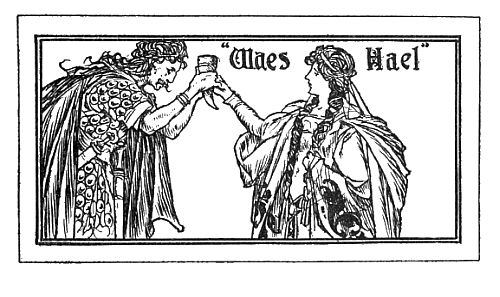
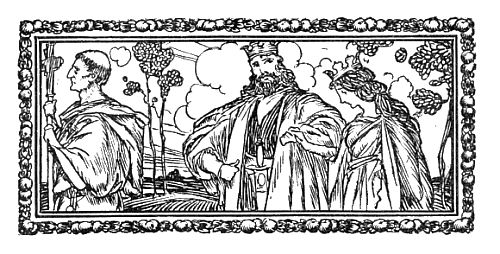
“Our clock strikes when there is a change from hour to hour; but no hammer in the Horologe of Time peals through the Universe when there is a change from Era to Era.”
Hand in hand a king and queen pass by, linked in wedded love and in undying fame. She is a sweet Frankish princess, with the light of tender affection in her eye, and the sweet serenity of an uplifting faith on her brow. He is a tall, bearded Saxon, with the martial air of one who has fought battles from his youth up; yet withal he is calm and reflective, equally at home on the battlefield, in the council chamber, and on the judgment seat. He is a pagan and she is a Christian; he bows before Odin, she before Christ.
Well-nigh a century and a half have gone since Hengist and Horsa sped their keels to these shores as the advance-guard of those great invasions which planted a new race on the soil. Generations of English men and women have come and gone since their sires with battle-axe and brand reft the land from its old inhabitants. No longer do the English war with the Britons, the remnant of whom dwell safely in the wild mountains and valleys of the west, or serve their new masters as slaves. They now war with each other. Ambitious kings strive to make themselves supreme in the land, and many a fierce fight is fought between the rivals. Now and then a powerful king reduces his fellow-kings to obedience, but frequently the conqueror of one month is the hunted fugitive of the next. Ethelbert, the king who now passes by with Bertha his wife, has made himself overlord of all the land except Northumbria. With this exception, his sceptre is supreme from the Forth to the English Channel.
Rome, once the proud and ruthless “mistress of the world,” has lost for ever her ancient sway. No longer does the wide world stand in awe of her. But on the ruins of her lost dominion a new, a merciful, and a blessed power is springing up. She has become the centre of the Christian religion, and ere long she stretches out her missionary arms to the isles of the west. St. Patrick is commissioned as the ambassador of God to convert the Scots in Ireland to the new faith. Devoted men in skin-clad boats of wicker-work cross the channel from the Emerald Isle to carry the good news to the natives of south-west Scotland. Amongst them is the great Columba of Donegal, prince in the eyes of his fellows, but in his own a meek bondsman of Christ. With his twelve companions he steers for the rising sun, and his barks run ashore on the little bare island of Iona, where he lands and builds his wattled church and the rude huts of his infant monastery. From this retreat, which has become one of the most sacred spots on earth, Columba’s friends go fearlessly through the land into the wildest glens and the remotest clachans, preaching the gospel, and slowly and surely winning the Picts and Scots to Christianity.
But England is still in her pagan darkness; she knows nothing except by vague rumour of the new faith which is slowly transforming the world. The English still worship their fierce old deities; still swear by oak, thorn, and ash; still look to Valhalla as the meed of the warrior who dies in hard-fought battle. Men of kindred blood still struggle for mastery under their kings, and the vanquished are still found in the slave-markets of the Continent.
It is the sight of English lads exposed for sale in Rome which touches the heart of a young deacon, and stirs him to cherish the conversion of these islanders as the great ideal of his life. He sees the white limbs, the fair faces, the blue eyes, and the yellow hair of the lads, and asks the merchant whence they come. “From Britain,” is the answer. “Are they Christians or pagans?” is his next question; and when he learns that they are pagans, he sighs heavily and exclaims, “Ah! grief of griefs that the prince of darkness should lay claim to beings of such fair form; that there should be so much grace in the countenance, yet none in the soul.”
When he learns that they are of the race of Angles, his propensity to pun—ever the weakness of the scholar—finds a rare opportunity. “The Angles,” cried he, “should be angels. From Deira come they? They shall be snatched de ira Dei—from the wrath of God. And their king, say you, is Ella? Hallelujah shall be sung in Ella’s land.” Thus out of his infinite pity for the afflicted and distressed, Gregory’s heart begins to yearn towards the far-off islanders still in heathen bondage. The old stories tell us that he purchased the slaves, clothed them and taught them, and sent them back to England. Several times he begs to be allowed to visit England in order to realize his old wish, but Rome cannot spare him. In the fullness of time he becomes Pope, and though the triple crown is on his head and he is surrounded with the splendour of a sovereign, he does not forget the beautiful barbarians in their island home, and he only waits a favourable opportunity to send a mission to them.
The long-looked-for opportunity soon arrives. Ethelred of Kent weds the fair daughter of the King of the Franks, and the marriage contract guarantees the Christian princess the right to exercise her religion unmolested. She brings in her train a single priest, and in the little church of St. Martin’s, Canterbury—built in Roman times, and still remaining as the oldest Christian church in the land—she kneels before the altar, and prays oft and earnestly that the land of her adoption may be won for Christ. She pleads with her noble-minded husband to forsake his gods and embrace the new faith. He hears, and he ponders, and at length, in answer to her prayers, sends a message to Rome, inviting Gregory to send the mission which he has long contemplated.
And now let the pageant proceed. Splendid and imposing it is. Somewhere on the Isle of Thanet, where Cæsar’s legions had landed, and Hengist and Horsa had drawn their keels ashore, a double throne is set up beneath the open sky. Ethelbert and his chiefs will meet the monks under no roof, lest witchcraft should prevail. Beneath the canopy of heaven king and queen—he willing to be convinced, but withal calmly critical; she, prayerfully expectant—seat themselves. They have hardly done so before the voices of the monks chanting a psalm are borne on the breeze. Louder and louder it swells as the procession draws near, headed by a picture of the Saviour and a silver crucifix.
Halting at the foot of the throne, the head of the mission, Augustine, begins to declare with all the fervour of his nature the blessings and hopes of the new faith, and earnestly beseeches the king to forswear his gods. Ethelbert listens, but the hour of his conversion is not yet. His answer reveals his clear judgment and his open mind. “Your promises are fair, but new and uncertain. I cannot abandon the rites which my people have hitherto observed, but I will hold you harmless and treat you hospitably. Nor will I forbid any one whom you can convince to join in your faith.” No fairer answer can be expected, and Augustine begins his labours under happy auspices. Ere long Ethelbert is baptized with ten thousand of his subjects, and Augustine has done his greatest and most enduring work; he has won a kingdom for his Master.
Pass on, Ethelbert and Bertha, linked in wedded love and in undying fame! It is your blessed privilege to plant the cross of Christ in the southern shires of this our England. Long and sore will be the struggle ere its beams irradiate the whole land, but it will conquer at last, and in the long roll of saints and martyrs who have striven valiantly in the divine work your twin names shall stand proud and high.
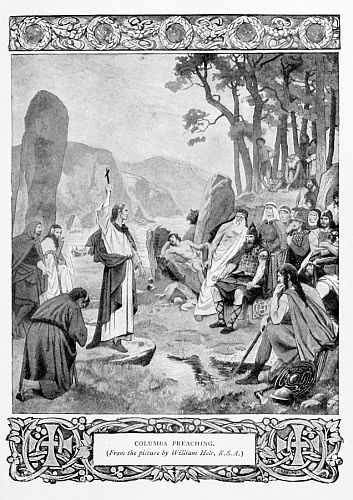
COLUMBA PREACHING.
(From the picture by William Hole, R.S.A.)
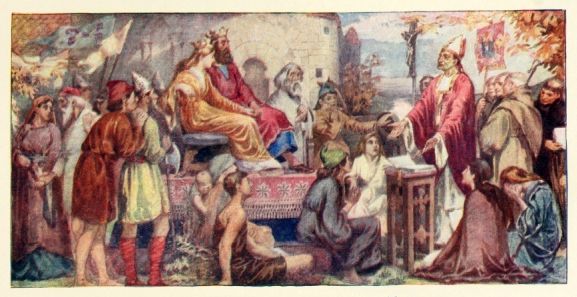
Augustine preaching to Ethelbert and Bertha.
(From the picture by Stephen B. Carlill.)
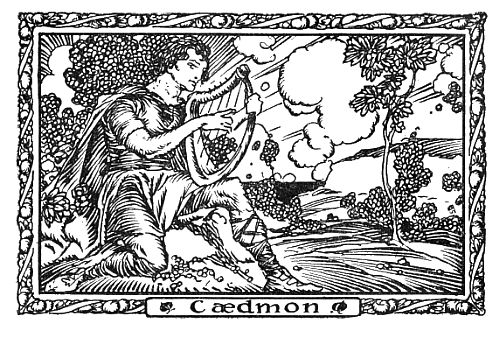
“Then felt I like some watcher of the skies
When a new planet swims into his ken.”
Who comes hither? A simple, shy monk, half-withdrawing from the gaze of the bystanders, and unwitting that it is he whom men greet with such resounding acclaim. Kings and knights have flaunted their plumed helms and storied banners before us; but here is a conqueror in the realm of peace, a paladin of the mind and heart. His home was in the abbey which royal Hilda had founded on the wind-swept east cliff of Whitby. Not always did he wear the cowl of the monk. When the divine gift which placed him first in the muster-roll of English poets descended upon him he was an obscure cowherd who tended the cattle and slept in the byre. When the day’s work was done, and the servants of the abbey feasted together, he was wont to flee abashed as the harp came towards him and his turn arrived to tune the simple lay for the entertainment of his fellows.
Once when he had risen from the feast and crept quietly to his shed, he fell asleep and dreamed that One came to him and said, “Cædmon, sing Me something.” “I know not how to sing,” replied the man; “and for this cause left I the feast.” “Yet,” said the Vision, “you must sing to Me.” “What shall I sing?” he asked. “Sing,” the Vision said, “about the beginning of created things.” At once Cædmon began a hymn in praise of the Creator of the world. Beautiful images flashed into his mind, noble words flew to his lips. He had won a victory far beyond that of any conqueror in any age; he had marshalled in triumph the legions that most surely sway the hearts and inspire the deeds of his countrymen; he had composed the first great English song.
We salute thee, Cædmon. Thy name will ever be dear to those who cherish their noble English tongue, and rejoice in the majestic literature which has glorified it for all time.
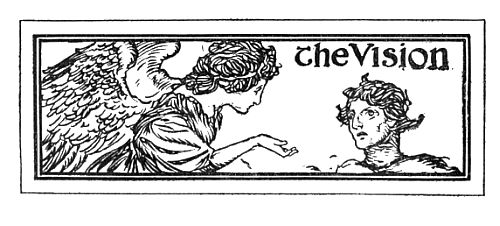

“What sea-worn barks are those which throw
The light spray from each rushing prow?
Their frozen sails, the low, pale sun
Of Thule’s night has shone upon.”
 OOM for the Vikings! the sons of the creek, the
bluff, stalwart rovers who love the salt sea with
a consuming passion, and shout with glee as the
waves foam beneath them and tempest roars about them.
Mighty warriors are they, wild and untamed as the
element they love, swift as the falcon, remorseless as the
vulture, fierce as the wolf. From the shores of the Baltic
they come, swarming out of their barren homelands, and
descending with fire and sword upon all the coasts of
Western Europe. Every champion amongst them ardently
desires to be a Berserk, and thus to be regarded as the
bravest of the brave, utterly contemptuous of death.
These Berserks within sight of the foe are wont to lash
themselves into a frenzy, so that they bite their shields and
rush to the fray, wielding club or battle-axe with almost
superhuman strength.
OOM for the Vikings! the sons of the creek, the
bluff, stalwart rovers who love the salt sea with
a consuming passion, and shout with glee as the
waves foam beneath them and tempest roars about them.
Mighty warriors are they, wild and untamed as the
element they love, swift as the falcon, remorseless as the
vulture, fierce as the wolf. From the shores of the Baltic
they come, swarming out of their barren homelands, and
descending with fire and sword upon all the coasts of
Western Europe. Every champion amongst them ardently
desires to be a Berserk, and thus to be regarded as the
bravest of the brave, utterly contemptuous of death.
These Berserks within sight of the foe are wont to lash
themselves into a frenzy, so that they bite their shields and
rush to the fray, wielding club or battle-axe with almost
superhuman strength.
No Christian message of peace and brotherhood has touched their hearts; they still swear by the Asir, and still glory in their descent from the grim gods of their dark and hopeless creed. They lust for blood, and their fiercest loathing is reserved for them who have abandoned Odin and Thor for the mild faith of the “White Christ.” They shed with unholy joy the blood of priests; they glory in the plunder and the burning of churches. They are a scourge, not only to England, Scotland, and Ireland, but to the whole of Europe; and men pray in their churches, “From the fury of the Northmen, good Lord, deliver us.”
Never in the whole history of the world have men “followed the sea” with such fearlessness and keen delight as these Vikings. The sea is their “swan road,” their “Viking path,” their “land of the keel,” their “glittering home.” Their ships are “deer of the surf” and “horses of the sea.” Frail barks they seem to us, small and not very seaworthy; but the men who man them are consummate sailors, and they make astounding voyages with nothing but a thin plank between them and destruction. The Orkneys know them; they have seen Hecla shoot out its fiery lava in remote Iceland; they have even trodden the icy shores of Greenland, far across the dreaded Western Ocean.
A Viking fleet is even now heading for our shores. Look at the long black ships, with their high prows curved in the semblance of a serpent. The sun glints on the bright shields which protect their bulwarks, on the mail which the warriors wear, and on the battle-axes and spears which they wield. The great sails flaunt painted devices—the eagle, the bear, the wolf, and the raven. Fierce are these creatures, but fiercer still the men who now come to harry these shores.
Yonder little village is happy and peaceful in the morning sunshine. The cosy farmhouses and the smiling fields with their rich promise of harvest tell the tale of comfort and contentment. Alas! the scene will change when these sea-wolves arrive. They will sail up the river-mouth, throw up stockaded earthworks to secure their retreat, and then begin the congenial work of pillage and slaughter. Men, women, and innocent babes will be slain, cattle will be driven off, and the smoke of burning roof-trees will darken the sky. Yonder minster, where the frightened monks are trembling before the altar, will be raided; its treasures, the gifts of generations of pious souls, will be seized; the gilded cross will be torn down and trampled upon, and blood-eagles will be carved on the backs of the hated priests. Then torch and flame will do their work; and the Vikings, having devastated the countryside like locusts, will retire to their ships glutted with blood and laden with booty.
Again and again they will return, bolder and bolder, and at length they will covet the fair land as their home. They will come in such force that they will reave half the land from the English, and then a Viking will rule the realm. Ay, and Englishmen will come to honour and love him. Then the Viking settlers will disappear, absorbed into the mass of the nation, and endowing the national character with a new strain of courage, daring, and adventure. But before that happy day dawns the land will run red with blood, many homes will be ruined, many patriotic hearts will break, and the star of England will seem to have set for ever.
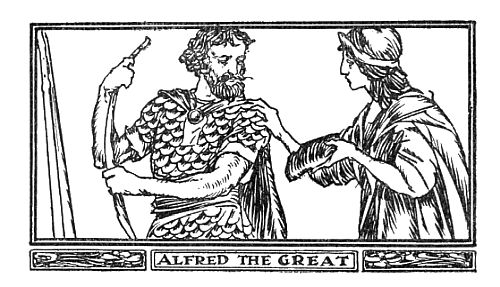
“Behold a pupil of the monkish gown,
The pious Alfred, king to Justice dear;
Lord of the harp and liberating spear,
Mirror of princes!”
Now, amidst the gloom, the greatest of all our kings appears. “England’s Darling,” and “Truth-Teller,” men called him in his lifetime, and these proud titles well attest the affection and esteem in which the men of his own age justly held him. Nor has his glory faded with the passing of centuries. The more his career is studied, the greater he grows and the brighter shines his peerless fame. His nature was a beautiful blend of courage and tenderness, perseverance and patience. He loved justice and mercy, and he lived and died for his people. Warrior, statesman, scholar, lawgiver, and true patriot, he stands for all time as the type and model of the perfect king. A thousand years have sped since his pure spirit departed, but still he is one of the greatest glories of our land. His life was one long struggle against fierce foes, against the darkness of ignorance, against the desolation of ruin and the cruel pangs of bodily pain, but he triumphed over all—
“Not making his high place the lawless perch
Of wing’d ambitions, nor a vantage-ground
For pleasure; but through all this tract of years
Wearing the white flower of a blameless life.”
And now for his story, which writers have loved to dwell upon in every succeeding age. Born in royal Wantage, where his statue now stands, he was but three years of age when the Vikings made their first settlement in England. In that year a great army of Danes, with three hundred and fifty ships, swept up the Thames, sacked London and Canterbury, and put to flight an English army. Two years later, Alfred’s father, Ethelwulf, and his elder brother, Ethelbald, met them in battle, and after a stubborn fight won a great victory. Such a desperate struggle had not taken place in England for many years, and more than half the Danish army perished on the field. Another victory followed, and for a time the Danes were checked. So far, their coming had been but the low mutterings of the fierce storm which was soon to burst in all its fury. Alfred was cradled in an hour of terrible anxiety and ever-present danger.
Almost the first incident which his biographer recounts is the pretty story of how his mother sought to encourage her sons to learn to read. Showing the lads a beautifully-illuminated volume of English verse, and reading aloud some of its contents, she promised the volume to the first of them who could read it for himself. Fired by the desire to possess the volume, and also to learn something more of its wondrous pages, Alfred sought out a tutor, and ere long was able to claim it as his own. The love of letters, thus early demonstrated, grew with the years. In his later and more peaceful days he surrounded himself with scholars, and loved their company and converse better than aught else. Asser, the Welsh monk, who was his devoted friend, tells us that as “Alfred advanced through the years of infancy and youth, he appeared more comely in person than his brothers, and his countenance, speech, and manners were more pleasing than theirs. His noble birth and noble nature implanted in him from his cradle a love of wisdom above all things.”
In his twentieth year Alfred married a noble Mercian lady named Mercill. Meanwhile, the Danes, growing bolder and bolder, had become a grievous peril to the land. In the year of Alfred’s marriage they marched on York, and capturing it, pushed into Mercia and wintered at Nottingham. In the twenty-second year of Alfred’s life they triumphed over Edmund, King of the East Angles. Him they dragged forth and bound to a tree. Then with fiendish glee they shot arrows into his limbs, and at length, unable to break his proud and confident spirit, they struck off his devoted head. They parted his realm amongst themselves, and placed their chief, Guthrum, on his throne.
Next year King Ethelred and Alfred were overcome by the Danes at Reading. Roused by grief and shame at the loss of this battle, the English mustered in force and advanced against their foes at Ashdown. While Ethelred remained in his tent at prayer, Alfred led his men to the fight, and “with the rush of a wild boar,” charged up the slopes on which the Danes had stationed themselves. Long and fierce was the fray, but at nightfall victory rested with the English.
Their joy was short-lived; a fortnight later the Danes were again victorious, and soon another Viking army from across the sea joined them. In the same year died Ethelred of his wounds, and Alfred was crowned king of a realm which was little more than a name. A month later his small army was overcome, and black indeed was the outlook. “Let no one be surprised,” says Asser, “that the English had but a small number of men, for they had been all but worn out by eight battles in this self-same year; in the which there died one king, nine chieftains, and innumerable troops of soldiers.”
Two years of desperate fighting followed, and the Danes were victorious almost everywhere. At length Alfred was forced to withdraw with the little band which still followed him to the marshes of Somersetshire. Here, in the midst of a vast morass where the Tone and the Parret join their waters, lay a low lift of ground some two acres in extent, girded in by almost impassable fen-lands. This was the island of Athelney, and here Alfred threw up a fort, and waited and longed for happier days. It was about this time that the fugitive king, flying from his foes, entered the hut of a cowherd and begged for shelter. In the hut occurred that incident which is so familiar to every reader of English history. Asser tells the story, and doubtless he had it from Alfred’s own lips. It happened that on a certain day the wife of the cowherd prepared to bake her bread. The king, sitting near the hearth, was making ready his bows and arrows and other warlike implements, when the rough countrywoman beheld her loaves burning at the fire. She ran forward and hastily removed them, scolding the king for his inattention and carelessness:—
“Casn’t thee mind the ca-akes, man, and doossen zee ’em burn?
I’m bound thee’s eat ’em vast enough, zo zoon as ’tis thee turn.”
“The unlucky woman,” continues Asser, “little thought that she was addressing the King Alfred.” We can readily imagine the momentary anger of the king as he heard the shrill clamour of the angry housewife, and the good-natured smile that almost immediately followed when he recognized the justice of the reproof. Legend, which has been very busy with this period of eclipse in Alfred’s career, tells us that he persuaded his host to study, and that in after and happier years the cowherd held high office in the Church.
Though apparently at his last extremity, Alfred did not abandon the struggle. Scarcely a day passed but he sallied forth at the head of his little band, to assail such forces of the enemy as approached his neighbourhood. In this guerilla warfare, amidst the swamps whose secret paths were quite unknown to the stranger, Alfred schooled himself in the arts of surprise, rapid onset, and equally rapid retreat. Patriotic Englishmen joined him in his fastness, and day by day his forces grew.
At length the dark night passed away, and the dawn of a new day began to flash the horizon. The hour of deliverance had arrived.
The Danes had established themselves in a strongly fortified camp at Chippenham, in Wiltshire. The hill which they occupied is still pointed out, and from the neighbouring plain it still appears rugged, abrupt, and difficult of ascent. The English forces were too few to venture on an unpremeditated attack; therefore Alfred arrayed himself as a wandering minstrel, and, harp in hand, approached the enemy’s outposts. The scald would be right welcome, for the Danes ever loved a song, and camp life was dull. Alfred sang and played to the Danes, and was led even to the tent of Guthrum, the chief. As he struck the chords and trolled the lay, his keen eyes were busy photographing the defences of the camp on the sensitive plate of his memory. Dismissed with praise and gifts from the Danish entrenchments, he hastened to his island retreat, and there matured his plan of attack. The naked sword and the war-arrow were borne by loyal hands through the length and breadth of the south-western counties, and soon all was ready for the fateful battle.
Alfred drew up his forces on the plain, and Guthrum marshalled his men in front, with Bratton Hill, crowned by its strong encampment, as a secure retreat in the rear. Massing his men in a close shield-wall, the English king gave the signal for battle. His soldiers rushed on the enemy; they broke the Danish ranks, and a fierce hand-to-hand fight raged on the plain. Furious was the mêlée of sweeping sword, crashing battle-axe, and sharp javelin, and slowly the Danes began to gain ground, when a storm of arrows suddenly fell upon them, followed by an impetuous charge of English spearmen. The Danes were swept to earth; and through the island ranks ran the inspiring rumour that a renowned English saint had joined the fray, and that angelic hosts were fighting for the stricken land. The English had fought stoutly before; now they were irresistible. The Danes fell before their onslaught like corn before the reaper’s sickle. All was over; the shattered remnant of the Vikings turned and fled to their hill-top camp, leaving the field strewn with their dead and dying.
Then Alfred girdled the hill with his forces, and for fourteen days closely besieged the Danes. Hunger, cold, fear, and despair gradually undermined the resolution of the besieged, and every day Alfred’s triumphant army was swelled by new recruits. On the fourteenth day Guthrum yielded, and humbly sued for peace. “They engaged to give the king as many hostages as he pleased, and to receive none from him in return—in which manner they had never before made peace with any one.”
“The king took pity on them, and received from them hostages, as many as he would. Thereupon the Danes swore that they would straightway leave the kingdom, and their king, Guthrum, promised to embrace Christianity and receive baptism.” Alfred himself was Guthrum’s sponsor at the ceremony, “receiving him as a son by adoption, and raising him up from the holy font of baptism. After this he remained twelve days with the king, who, together with all his companions, gave him rich gifts.”
In the year 879 the Danes left Chippenham, and after a time retired into East Anglia and settled down quietly in the Danelaw, according to the solemn treaty which the two kings had made. Again and again Viking fleets assailed Alfred, but he was more than a match for them. He no longer awaited their onsets, but built ships stronger and swifter than those of his foes, and thus was enabled to meet them on their own element. Alfred built the first English navy, and inaugurated that policy of naval defence which Britons of every succeeding age have recognized as the wisest and best. The foe who threatens our island shores must be met and vanquished on the encircling sea.
Right nobly did Alfred bestir himself during the few years of life remaining to him. He restored the towns, he founded monasteries, he gathered learned men about him, and laboured to build up England anew. Studious from his early years, he endeavoured to enrich his own mind and to encourage his people to learn the arts of reading and writing. Into the homely language understanded of the people he translated the best and most useful works of the Latin writers of his time, and founded schools, that the sons of his nobles might not grow up unlettered as their fathers. He gave the best of his attention to the four greatest things of national life—law, justice, religion, and education. He collected and studied the old laws of the nation: what was good he retained, what was bad he rejected. Never was king more eager to advance learning and make new discoveries. He sent embassies to the remotest parts of the then known world, and our earliest accounts of Arctic exploration are from his pen.
Method and order were the rule of his life. One portion of his income he allotted to his warriors and attendants; another to the buildings which his architects from beyond the seas erected for him; a third for the relief of foreigners; and the remainder for the Church, the schools, and the poor. His time, too, was methodically bestowed on good works. Eight hours each day were devoted to rest and refreshment; another eight hours to affairs of state; the remaining eight hours to study and religious exercises. To enable him rightly to apportion the time which he deemed so precious, he fashioned wax candles, six of which, burned in succession, marked the lapse of twenty-four hours. To guard against the irregularities caused by draughts, he enclosed his candles in lanterns of thin, transparent horn. Thus he measured his time, zealous that the golden sands should not run out unheeded, and that no day should pass without its tale of duty done, opportunities seized, and benefits conferred.
And now we must bid farewell to this peerless king. A thousand summers have come and gone since his countrymen bore him to his tomb, deeming that the light of their land had been extinguished. They loved and honoured him, and we revere his memory as that of probably the most perfect character in history. He remains as the mirror of monarchs in which they may perceive the elements of true majesty, and an inspiring example to all of triumphant devotion, fortitude, and faith.
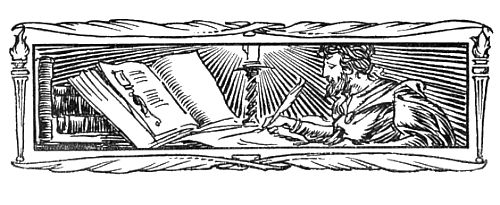
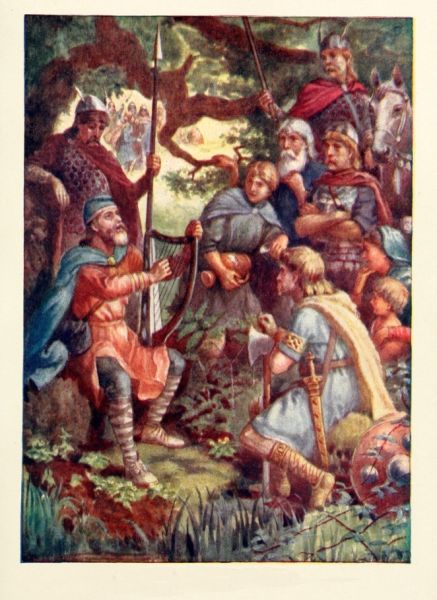
Alfred in the Camp of the Danes.
(From the design by H. A. Bone. By permission of Antony Gibbs, Esq.)
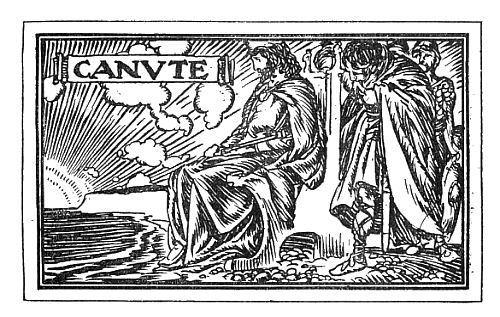
“Canute o’ercame the race of Ethelred, and Danes wielded the dear realm of Angle-land, eight-and-twenty of winters numbered.”
No saint he who now strides by—a thrice-crowned king, with the Viking blood surging tumultuously in his veins. England, Norway, and Denmark own his sway; but though Denmark is the land of his birth, England is the land of his love and pride. Dane he is in form and feature, but his lust of strife and fierce Berserk rage are controlled by cool judgment and the generous instincts of a good but wayward heart, so that in his later days he grows wise and temperate. His father, Sweyn, “lighting his war-beacons in blazing homestead and town,” has harried the realm of England in revenge for a cruel massacre of his kinsmen by a weak and ruthless king, and Canute, ere his beard has grown, has entered into a glorious heritage.
Not without fierce strife has this kingdom of England come to him. He has met his match in Edmund Ironside, true hero and true Englishman. But Edmund is dead, and the young Dane is unchallenged master of the land. And now, secure in the possession of three kingdoms, he sets himself to win the confidence of his new subjects. The armed bands with which he has conquered his new realm are sent home, save for a stalwart bodyguard. He will trust his Englishmen, and will link his fortunes with theirs. He marries the beautiful widow of the late king, and labours to hold the balance even between Dane and native. As the years go by his new subjects come to be his best supporters, and England is England still, though a Dane sits on the throne.
A pagan born, he nevertheless becomes a zealous Christian, and many a fair monastery is reared and endowed by him. He strives to do justice to all men, and he pledges himself to rule according to the old and cherished law of the realm. One day, however, the fierce spirit within him suddenly flames up, and he slays with his own hand a soldier of his guard. When his wrath has died down he bitterly repents of the deed, and deplores the evil example which he has set to others. Then he descends from his throne and bids the Witan judge him and punish him, regardless of his rank and power. Flinging himself prostrate on the ground, he awaits the verdict which his judges dare not give, despite his promise of free pardon. They bid him appoint his own judgment. The fine for slaying a man is forty talents of silver. Canute sentences himself to pay nine times the sum, and nine talents of gold in addition. Some see in this act a mere theatrical display, a crafty method of re-enforcing the law which he, the lawgiver, had violated. Let us be charitable, and believe that he was sincere and honest in desiring to atone for his crime.
Better known is the story of the rebuke which he administered to the flattering courtiers who crowded round his throne. They, recounting his mighty deeds of valour, his conquests, his glories, were not ashamed to say, “Great lord, even the sea obeys you. The rising tide dare not wet the hem of your garment.” On the seashore Canute set up his throne, and as the waters rolled in and splashed about his feet he cried, “Confess ye now how frivolous and vain is the might of an earthly king compared with the Great Power who rules the elements, and can say unto the ocean, ‘Thus far shalt thou go, and no farther.’ ”
“And he strongly bade them never more to kneel to human clay,
But alone to praise and worship that which earth and seas obey;
And his golden crown of empire never wore he from that day.
King Canute is dead and gone; parasites exist alway.”
An old chronicler tells us a pleasing story of his love of minstrelsy. It was on the eve of a feast which he desired to keep in the abbey at Ely. As his barge sped through the maze of waters by which the island was approached, the voices of the chanting monks were borne faintly on the breeze. Bidding the rowers cease their work, Canute listened with unfeigned delight to the strain, rendered all the more harmonious by distance and the intervening waters. Then as the boat shot forward once more he composed the following verse, keeping time with the beat of the oars:——
“Merrily sang the monks of Ely,
As Cnut the king rowed by;
Row, knights, near the land,
And let us hear these good monks sing.”
In Rome, the heart of Christendom, the Viking was still regarded as a heathen pirate, a deadly enemy alike of civilization and true religion. Canute was eager to remove this impression, and to bring his empire into union with the greatest spiritual power of the world. He therefore undertook a pilgrimage to Rome. West Saxon kings for three hundred years past had visited the Pope and the tombs of the saints, but now, for the first time, a Dane set out on the pious journey. A long train of attendants accompanied him, but he himself wore a pilgrim’s robe and carried a pilgrim’s staff in his hand. As he journeyed along the pilgrims’ route, he bethought him of those who should hereafter follow him, and made treaties with the masters of the Alpine passes, so that his subjects should come and go unmolested. Arrived in Rome, he prayed before the altars, placed rich gifts on every shrine, and purchased relics for the churches at home.
From Rome he wrote to the Witan a letter which reveals him in a most favourable light. Ere Canute passes by and our pageant knows him no more, let us extract one passage from the message which he sent to his people: “I would have you know that I have made a vow to Almighty God to regulate my life by the dictates of virtue, and to govern my people with judgment. If during the rashness of youth I have done anything contrary to justice, I will for the future, with the help of God, amend this to the best of my power. Wherefore I require and command all my counsellors to lend themselves to no injustice, either in fear of me or to favour the powerful. I recommend them, if they prize my friendship and their own lives, to do no harm or violence to any man, rich or poor. Let every one, in his place, enjoy that which he possesses, and not be disturbed in that enjoyment, either in the king’s name or in the name of any other person, nor under pretext of levying money for my treasury, for I need no money obtained by unjust means.”
Truly a kingly resolve! Looking down the long avenue of time, we recognize Canute as a “conscious creator of England’s greatness.” His empire was destined to fall to pieces at his death, and ere seven years had sped his line was extinct. A brief space more, and another tide of conquest swept over his beloved England. Another king of Viking breed held the sceptre which had fallen from his hand. Once more the English bowed their necks to a foreign lord; but Canute’s work was never undone, and the England of to-day acclaims him as her benefactor.
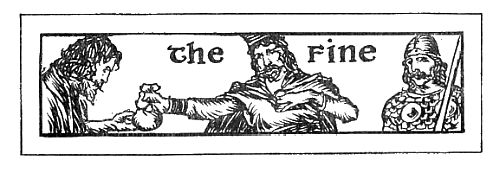
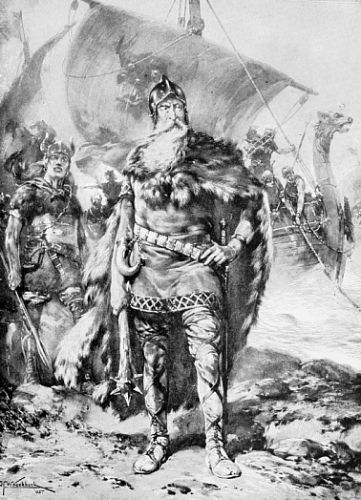
A GREAT VIKING.
(From the picture by H. W. Koekkoek.)
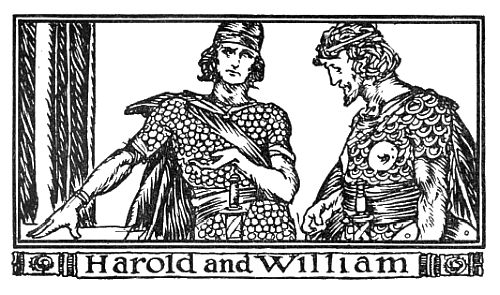
“Yet shall a third both these and thine subdue;
There shall a lion from the sea-bord wood
Of Neustria come roring, with a crew
Of hungry whelpes.”
 OW a remarkable scene diversifies our pageant.
You see before you the great hall of the Norman
castle of Bayeux. Baron, knight, bishop, and
priest fill up the background, and you perceive at once
that an important crisis has arrived. Your eye instantly
fastens on the two chief actors in the scene; and you do
well to study them closely, for rarely in the history of
our land have two such notable men stood face to face.
OW a remarkable scene diversifies our pageant.
You see before you the great hall of the Norman
castle of Bayeux. Baron, knight, bishop, and
priest fill up the background, and you perceive at once
that an important crisis has arrived. Your eye instantly
fastens on the two chief actors in the scene; and you do
well to study them closely, for rarely in the history of
our land have two such notable men stood face to face.
The one, albeit he betrays some signs of anxiety, claims, at first sight, your admiration and sympathy. He is tall and comely, with the blue eyes and the golden beard and flowing locks of the Saxon. You picture him as a bluff, good-humoured Englishman, proud of his strength of arm, his prowess in the chase, his skill in warfare, and his sense of fair play. You can readily believe him to be winning and courteous in public life, calm and cool in the hour of danger, easy and sociable when the fight is over. He is Harold of England, the most gifted of the sons of old Earl Godwin, that dogged earl who, in his lifetime, was the champion of Englishmen at the court of the feeble but pious King Edward, now reigning in England. Edward loves the Norman and despises the Englishman, and his court swarms with aliens, on whom he lavishes land and wealth. Men say he has bequeathed his sceptre to a Norman, but his subjects will have none of it. Yonder fair-haired Englishman is their pride and choice, and him they will seat on the throne when Edward is dead. King Edward is now fast sinking into his grave, his last hours disquieted by the appearance of a comet which the priests assure him betokens ruin for his country.
Now turn your attention to the other chief actor in the scene. You know at a glance that he is a great man, and that he is destined to make history. He is a giant in stature; no man living but he can bend his mighty bow. Rough and hard has been his upbringing, and rough and hard is his temper. He, too, is of Viking blood. His ancestor was that fierce outlaw Rollo, so long of leg and so heavy of frame that no horse could carry him. This fierce and crafty Viking had wrested a province from the imbecile King of France, on condition of doing homage to the poor simpleton. But Rollo would bow the knee to none save the rugged gods of his fierce Northern creed, nor would any of his chieftains so demean themselves. A common soldier was Rollo’s deputy, and even he disdained to bow, but seized the foot of the king and in bringing it to his mouth jerked the poor monarch off his throne!
Rollo lives again in William, this mighty Norman duke at whom you are now gazing. His father’s nature is well set forth in the nickname which his followers gave him—Robert the Devil. William’s mother was a tanner’s daughter, and his haughty nobles once sneered at his base origin. They dare not do so now, for they know full well the weight of his mighty arm. As a boy he was heir to the most turbulent dukedom in Europe, but while in his teens he curbed the wild lawlessness of the barons and put a hook in their proud nostrils. Full well they remember the fate of those townsmen of Alençon who insulted his mother’s memory by hanging hides from their walls as a fitting welcome to “the tanner.” They will not soon forget how, in his wrath, he lopped off the feet and hands of his prisoners, and bade his slingers hurl the ghastly trophies into the town. Watchful, patient, cunning, ruthless, yet withal clear and sure of vision, he stands before you as by far the greatest warrior and statesman of his time.
What manner of man this masterful Norman duke is, you may learn from the story of his wooing. He did not seek his wife with smiles and honeyed words, nor did he deign to display his best graces to win her heart. That is not his way. When Matilda, daughter of the Earl of Flanders, rejected his suit, both on account of his birth and because she loved another, he was not daunted—not he. He waited for her in the streets of Bruges, and forthwith rolled her in the dirt and soundly cuffed her ears. Strange to say, his new mode of wooing was successful. Matilda went home, changed her attire, put ointment on her bruises, and when next her lover presented himself declared that “the marriage pleased her well.”
And now his mind is bent on quite another conquest, but the same masterful method will prevail. He has visited England. He has embraced the old king, who owes a debt of gratitude to Normandy; for was it not in that civilized land that he found shelter, succour, and education when Sweyn the Dane drove him as a callow boy into exile? William sees with his own eyes that the poor old king is not long for this world; and he notes with satisfaction that Normans surround his throne, tend him at table, and administer to him the rites of the Church. William has willing allies now, and he will have helpers, he thinks, when the time comes. So he returns to Normandy, and announces that Edward has named him as successor to the English throne.
But how come William and Harold, these rivals for a throne, to be under the same roof? Sooth to tell, the one is the captive of the other. Harold’s bonds are very real, though not apparent. Some months ago he was cruising in the Channel, when an unlucky storm drove him on the Norman shore. The neighbouring baron seized him, and rejoiced at the prospect of a heavy ransom; but William claimed him, and welcomed him to his court with a show of cordiality. Together they have waged war on the Bretons, and Harold has done prodigies of valour. They have shared the same tent and have fed at the same table. To the outward eye they are brothers.
But why does Harold’s countenance betray signs of anxiety? William has deemed the hour ripe for displaying the iron hand beneath the velvet glove. He now declares that Edward has bequeathed him the English crown, and bids Harold swear to assist him in securing it. The Englishman knows not what to do. An oath will be demanded, and this he must give, or death or life-long imprisonment will be his fate. Yet he knows full well that once in England he will forswear the oath, and ascend the throne which his countrymen deem him worthy to fill. The oath, he argues, can be of none effect, for he must swear or perish.
His decision is made. A crucifix lies on a cloth of gold, and Harold is bidden to place his hand on it and swear to aid his captor to obtain the kingdom of England after the death of Edward. Reluctantly he does so, and then the cloth of gold is removed, and beneath it are discovered all the sacred relics which William has collected from a score of churches. Harold grows pale at the sight; his strong limbs tremble, and his heart fails him. He has sworn to befriend the Norman duke by an oath of the most terrible solemnity. Even the Normans standing by cry, “God help him.”
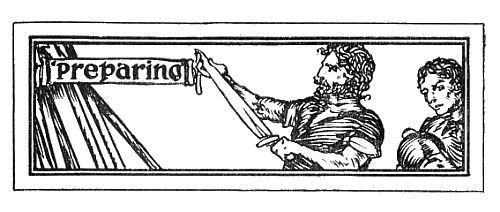
Homeward speeds Harold, and as he crosses the Channel his terror gives way to wrath at the knavery practised upon him. Speedily he banishes the hateful memory of his enforced oath; he must be up and doing, for the aged king lies on his deathbed. With his dying breath Edward declares that Harold is the most worthy to reign, and the chiefs of the land concur in his choice. Edward is buried with the utmost solemnity in his great new church at Westminster, where you may see his shrine to this day. Then, amidst the loud shouts of the English nobles who throng the minster, Harold is elected king. Forthwith he takes up the reins of office, and his subjects rejoice daily in his wisdom, justice, and unsparing devotion to the good of his country.
But what of William, the rejected candidate for the throne? He is in his park near Rouen when the trembling messenger breaks the news. His face grows clouded; he strings and unstrings his bow. Suddenly he hands it to an attendant, and hurries to his castle. In the great hall he strides to and fro, sits down and rises again, unable to remain still in any place, none daring to approach him lest the tempest of his rage should burst on them. At length a privileged baron addresses the brooding duke. “Sire,” says he, “why should you conceal from us your news? It is commonly reported that the King of England is dead, and that Harold, breaking faith with you, has seized the kingdom.” “They say true,” replies the duke; “my grief and anger are caused by Edward’s death and Harold’s wrong.” “Sire,” returns the courtier, “for Edward’s death there is no remedy, but for Harold’s wrong there is. Strike boldly; well begun is half done.”
At once William made his resolve, and began to battle with the myriad difficulties which beset him. He interviewed his barons, and wrung from them their reluctant consent to the enterprise and their grudging promises of aid, and persuaded the Pope to send him a consecrated banner and a bull recognizing him King of England. Then far and wide he published his proclamation of war, promising liberal pay and the plunder of England to all who would strike in his cause. Forthwith from every part of France knights, spearmen, and cross-bowmen flocked to him. The bulk of them were hardy adventurers, actuated by every kind of greed and covetousness. During the autumn of 1065 and the spring of the following year Normandy was as busy as a hive of bees. The woodmen felled the forests; the shipwrights wrought at the seaports; every armourer’s shop rang with the blows of artisans fashioning coats of mail, spears, and swords. Speedily all was ready for the invasion of England.
Meanwhile, what was happening in that threatened land? While the great armament of the Norman was wind-bound in port, a vast Viking host under Harold Hardrada, King of Norway, and Tostig, the English king’s brother, had doubled Spurn Head, and was sailing up the Humber and into the Ouse, bound for York. Why, you ask, should Harold’s own brother take arms against him when William of Normandy was arraying a mighty host for his undoing? Tostig had been Earl of Northumbria, and had ruled his earldom with harshness and injustice. He had forced peace on a land of feuds and outrages by taking life and by maiming limb. Loud had been the outcry against him, and Tostig had been driven from Northumbria by his incensed subjects. Harold had supported the claim of a rival; and now Tostig, at the instigation of his brother-in-law, Duke William, had persuaded the Norse king to join him in a descent upon North England. Harold, whom he had not forgiven, was to be taken between two fires, and victory seemed sure.
Harold had mustered his forces on the southern shore, and during the summer lay in wait for the coming of the Norman. Summer passed, and autumn arrived when the news reached him that the Vikings were in the Ouse. Believing that William would not sail until the spring, Harold set out for York to smite the Northern host before the Norman was ready to attack. With wonderful speed his troops marched northward, and York was reached on the fourth day after his departure from London.
The Norsemen were taken by surprise. It was inconceivable that Harold could be nigh, and so they advanced to York, which had promised surrender, leaving their coats of mail on board their ships in the river. As they marched towards the gates, which were to be flung wide at their approach, they beheld a cloud of dust and the glitter of arms in the distance. “Who are these advancing towards us?” asked Hardrada. “Only Englishmen craving pardon and beseeching friendship,” answered Tostig; but the words had scarcely been uttered before the dust-cloud resolved itself into an army, headed by King Harold himself. “The enemy!—the enemy!” muttered the Norwegians. They formed in line of battle, ready for the fray.
Harold feared not the issue, but he was loath to shed his brother’s blood, and sent forward a messenger to offer Tostig his old earldom—one-third of the kingdom—if he would yield. “And what,” asked Tostig, “will he give my faithful ally, the King of Norway?” “He,” replied the English messenger, “shall have seven feet of ground for a grave, or, as he is a very tall man, perhaps a little more.” Tostig bade the messenger depart, and battle was joined.
Hardly had the fray begun before Hardrada fell with a random arrow in his throat. The fury of the English onset could not be resisted. The Norwegians fell back and crossed the Derwent by Stamford Bridge, and the English followed. For a time a gigantic Norseman, like Horatius of old, “kept the bridge;” but he was slain at last, and the English swarmed after the retreating foe. At nightfall the Norsemen were overthrown, the raven banner of the Vikings was taken, and Tostig and most of his captains were dead. Harold had triumphed. His foes came in three hundred ships; they fled in twenty-four.
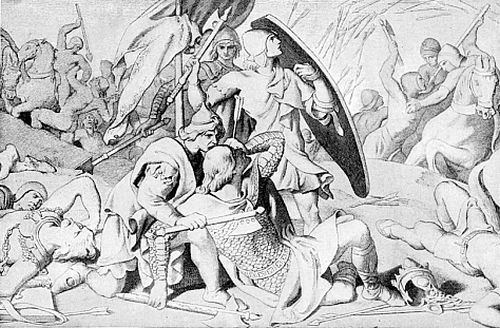
THE DEATH OF HAROLD.
(From the drawing by Daniel Maclise, R.A. By permission of the Art Union of London.)
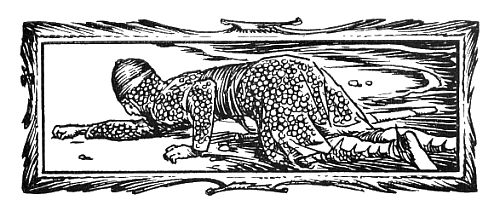
“Norman saw on English oak,
On English neck a Norman yoke,
Norman spoon in English dish,
And England ruled as Normans wish;
Blithe world in England never will be more,
Till England’s rid of all the four.”
And now, in mimic strife, let that great battle which gave England for the last time to foreign foes be fought again. The first act of the drama which we are about to witness takes place on the Sussex shore near Pevensey, on the spot where Roman and Saxon alike landed when they too coveted the possession of our isle.
It is the twenty-ninth day of September, in the year of grace 1066. The wind that is even now fluttering the victorious banners of Harold at York is wafting to our coast an even more terrible foe. You see the vast armada of the Norman approaching the beach. Amidst the crowd of vessels which cover the sea you discern a ship with the prow fashioned like a brazen child loosing an arrow from a bended bow. That ship bears Duke William and his fortunes. Speedily the vessels run aground, planks are thrust ashore, and the work of landing begins.
“Out archers!” is the cry, and the shaven and shorn cross-bowmen in their short habits spring ashore and form up on the beach. They scour the neighbourhood, but no armed foe is in sight. Now the knights, clad in hauberk, helmet, and shining cuirass, with their shields slung round their necks, step ashore, and their bustling squires, with many a tug and strain and muttered curse, lead their high-mettled chargers down the creaking gangways. In a trice the knights are mounted, their swords girded on, and their lances in hand. You see their glittering ranks form and wheel upon the shore.
Here come the carpenters, with their axes, planes, and adzes, seeking a suitable spot for the erection of a castle, which was completely fashioned in Normandy, and now only needs fitting together. Great frames are carried ashore, and like magic a wooden fortress is deftly reared on the strand. Ere set of sun the stores are landed and safely bestowed within its walls. The guards are set, and the evening meal is served.
Last of all to tread the soil of the land that is soon to be his comes Duke William. As he steps ashore he stumbles, and falls upon his face. A cry of consternation runs through the superstitious host. “God preserve us! this is a bad sign.”—“Nay,” he shouts lustily, and with that readiness of retort which never fails him; “see, my lords, I have taken possession of England with both my hands! It is now mine, and what is mine is yours.”
At dawn he marches along the seashore to Hastings, where other wooden castles are erected, and every precaution is taken against surprise. The foragers are busy in every neighbouring village, and as they appear the unarmed English flee, driving their cattle before them to secret places of safety. Mounted scouts push far into the country, and fall back on the main body as the English army draws near.
Now the scene changes, and you see Harold’s footmen hurrying forward in the vain hope of smiting the Norman ere he has made good his landing. But the surprise of Stamford Bridge is not to be repeated, and Harold halts seven miles from Hastings and sends forward his spies. Speedily they return with the astonishing news that there are more priests in William’s camp than fighting-men. They are mistaken; they do not know the Norman custom of shaving the beard and cropping the poll. Harold smiles at their report. “Those whom you have seen in such numbers,” says he, “are not priests but good soldiers, who will make us feel what they are.” Now a council of war is held, and several of his captains, with rare good sense, advise the English king to avoid a battle and retreat towards London, leaving a desert behind him. “No,” says the chivalrous Harold. “Ravage the country which has been committed to my care! Never! I will try the chances of battle with the few men I have, and trust to their courage and the goodness of my cause.”
But here comes a Norman monk, big with a message from his duke, bidding Harold do one of three things—resign his kingdom in favour of William, yield it to the Pope for his award, or determine the issue by single combat. “Tell your master,” says Harold abruptly, “I will not resign my title, I will not refer it to the Pope, nor will I accept the single combat.” Again William tempts him by the promise of all the land north of the Humber; but Harold is proof against the bribe, and his captains swear a unanimous oath to make neither peace, truce, nor treaty with the invader, but to drive away the Norman, or perish in the attempt.
Now the scene shifts once more. On a spur of the South Downs, where Battle Abbey now stands, you see the embattled array of the English. The hill of Senlac, on which they have posted themselves, slopes steeply in front, less steeply on the right, and gently on the left. On the summit of the hill the host of the English is thickly gathered behind a rough trench and a stockade. There is marshy ground on the right, but the left is the weakest part of the position, and here are mustered Harold’s stout hus-carles, doughty warriors in full armour, wielding huge axes. Here, too, are the banners of the king—the Golden Dragon of Wessex and the Fighting Man. The rest of the ground is occupied by the half-armed rustics who have flocked to Harold, and are bent on striking a good blow against the invader.
Out from the Norman host spurs the minstrel Taillefer, singing the song of Roland, and Oliver, and the peers who died at Roncesvalles. As he sings he tosses his sword into the air and juggles with it famously. Then he puts his horse to the gallop, and strikes his lance through an English breast. He smites another with his sword, shouting challenges to the foe. The English close round him, and the first Norman has fallen on the fatal field.
A shower of arrows from the archers begins the fray, and then the footmen and the Norman knights, to the loud braying of horns, charge up the slopes, crying, “God be our help!” The charge breaks vainly on the stockade and shield-wall, behind which the English ply axe and javelin with fierce shouts of “Out! out!” Back go the footmen and back go the knights, leaving dead and wounded before that fatal barrier. Again and again the duke rallies them; the fury of fight surges in his veins, and with headlong valour he spurs up the slopes to the fierce attack. No breach can be made in that wall. His Bretons, entangled in the marshy ground, break into disorder, and panic seizes his army as the cry goes round that the duke is slain. William bars the way and checks the flight of the fugitives with savage blows. He tears off his helmet. “I am alive,” he shouts, “and by God’s will I will conquer yet.”
Maddened by another repulse, he spurs right into the thick of the fight. His horse goes down beneath him, but his terrible mace circles in the air, and his assailants are felled, never to rise again. Again he mounts, again he is unhorsed, and a blow of his hand hurls to the ground an unmannerly rider who will not lend him a steed. William’s terrible onslaughts have dispelled the panic, but the issue of the battle still hangs in the balance.
It is three in the afternoon, and the English shield-wall is yet unbroken. Frontal attacks having failed, William will now try what the cunning of strategy can accomplish. Hitherto his archers have done but little mischief. With their great shields the English ward off the arrows that beat upon them like hail. “Shoot upwards,” he commands, “that your arrows may fall on their heads.” The archers obey, and with shields raised aloft to protect their faces, the English are at a manifest disadvantage in their encounters with the Norman knights. Almost the first to suffer in that iron storm is Harold himself. An arrow pierces his right eye. In agony he plucks it out, snaps it in two, and flings it from him; but the pain is so great that he leans heavily upon his shield.
Meanwhile another stratagem is equally successful. William orders a thousand horse to advance, and then to turn and flee. At the sight, the English behind their stockade leap forward and set off in wild pursuit, their axes suspended from their necks. When they are well away from their defences, the fleeing Normans wheel about, and the pursuers find themselves assailed on all sides with spear and sword. They are cut to pieces, and William speedily makes himself master of the position which they have abandoned. On either flank his horsemen also make good their ascent, and now a fierce hand-to-hand combat rages on the crest of the hill. Loud is the clamour, great is the slaughter, and the mêlée is thickest round the standard where the hus-carles encircle the body of their king with a wall of living valour. One by one they fall, the rest betake themselves to flight, and the night falls on a stricken and wailing England.
Now see the torches flit about the field as the conquerors rifle the dead. Duke William’s tent is pitched on the spot where the fight has raged fiercest. Amidst the grisly mounds of slain he gives thanks for his victory, and eats and drinks and rests himself. The Sabbath morning dawns, and mournful parties of noble ladies, clad in the black robes of mourning, search the field for the bodies of their fathers, sons, husbands, or brothers. Two monks from the Abbey of Waltham, which Harold has founded, approach the conqueror and humbly offer him ten marks of gold for leave to carry away the remains of their benefactor. William grants them permission, and to and fro they go, anxiously and vainly searching the field for the body of the dead king. At length they call upon the “swan-necked Edith,” who loved him well, to assist in the search. She is more successful than they, and the mangled and disfigured corpse is given hurried burial beneath the high altar of Waltham Abbey.
While the conqueror plans a memorial fane on the blood-sodden ground, and marshals his forces for the march on London, the English are sunk in the depths of bitterness and despair. “England, what shall I say of thee?” wails the monkish scribe. “Thou hast lost thy national king, and sinkest under the foreigner, bathed in the blood of thy defenders!” The conqueror marches in triumph to London without striking a blow, and on Christmas Day an English archbishop places the crown upon his head in the Abbey of Westminster. There is bloodshed even on that day. When, according to the old English custom, Stigand, the archbishop, asks the assembled thanes if they will have the Norman for their king, loud shouts of assent are raised. The Norman guards surrounding the minster mistake the shouting within the abbey for the noise of strife, and immediately fire the neighbouring houses and slay the innocent spectators.
Hard and heavy will be the hand of the conqueror; harsh and cruel, but withal not unjust, will be his rule. Now that he has won the kingdom, he will strive to reign as a lawful king. Heavy fines will be exacted from the large landowners who have resisted him, but otherwise he will endeavour to rule as the rightful successor to Alfred and Edward the Confessor. But he will soon discover that England is yet unconquered. Revolts will spring up in all parts of the land, and there will be hard fighting, and harrying, and burning and slaying for many a year ere he is acknowledged king from the Cheviots to the Channel. After every revolt the lands of the insurgents will change hands, and Norman knights will gradually secure the fairest estates in the country. Grim castles of stone will spring up, and where they arise the Norman will rule as lord. The discontented amongst William’s followers will goad the English whose lands they covet into rebellion. They will treat the highspirited English to every insult and outrage which they can conceive, and when the maddened thanes lie stricken on the field they will be rewarded with their possessions. Thus the Norman will enter into the land to possess it.
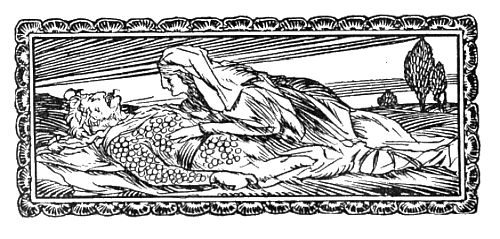
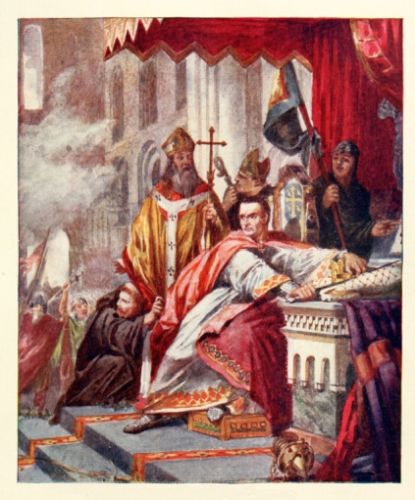
Coronation of William the Conqueror.
(From the picture by John Cross.)
When William was being crowned in Westminster Abbey, the archbishop, according to the old custom, asked the Norman and English nobles if they would have William for their king. They replied with loud shouts. The Norman soldiers outside the abbey thought that William was being attacked. They therefore fell on the people and set fire to the neighbouring houses. The picture shows the scene of alarm within the abbey. After a time order was restored, and the archbishop placed the crown on William’s head.
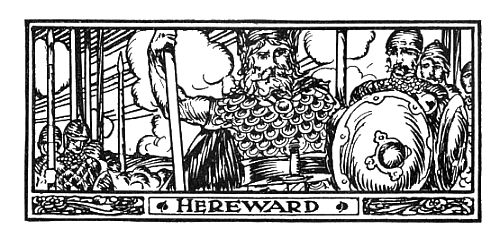
“Such is the patriot’s boast, where’er we roam,
His first, best country ever is at home.”
This burly Englishman, with his long, flowing locks, his mighty thews and sinews, his undaunted heart, his craft and skill in warfare, needs no introduction. His name and fame are enshrined in every English heart, thanks to the splendid romance which Charles Kingsley has woven about his heroisms. Legend and tradition, song and story, have cast their spell about him, and none can read his thrilling adventures without a tribute of admiration and esteem. Wild and wayward he ever was, but mingled with the ferocity and craftiness of his nature was a childlike simplicity which endeared him to all. As a guerilla leader he was the keenest thorn in William’s side. “Were there but three men in England such as he,” said a chronicler, “William would never have won the land.”
The old stories describe him as a self-willed, boisterous lad, who caused his mother many a heartache and his father many an embarrassment, until at length he was outlawed and driven across the seas, where his mighty deeds of daring won him great renown. He may have been present at Hastings, though the chroniclers are silent on this point; but soon after the battle he was in Flanders, and only returned home when he learnt that his ancestral lands at Bourne in Lincolnshire had been granted to one Taillebois, who was even then in possession of them. Taillebois, by his insolence and cruelty, had made himself bitterly hated, and the men of the Fens were only waiting for a leader to rise in rebellion and thrust him out. Hereward suddenly arrived amongst them, and, so the story goes, swept his home clean of Frenchmen with his single sword. Eagerly the Fen men flocked to him, and acclaimed him as their leader. Soon the terror of his name spread far and wide, and the wild Fenland became a camp of refuge for those who would not bow the neck to the Norman yoke.
No part of England was better adapted for the purpose. It was a vast, low-lying wilderness of slow-moving rivers, spreading meres, and treacherous swamps, whose secret paths were known only to the natives. Here and there “islands” of firmer ground arose, and on these the towns and abbeys of Fenland were built. One of these “islands” was Ely, a matchless place of refuge, engirdled by waters and morasses. Here Hereward made his camp, and defied the Normans. Daily his forces grew, and daily he swooped down on his foes, appearing so suddenly and disappearing so magically into his reedy recesses that none could stay him or follow him. William soon perceived that he would never be master of England while the bold and watchful Hereward was at large.
Hereward had allied himself with the Danes, who swarmed into Fenland, and having burnt the “golden borough” of Peterborough, retired across the North Sea laden with its wondrous treasures—the gold crucifixes, the jewelled vessels, the costly vestments—which were the pride and glory of the abbey. Now that Hereward had rid himself of his troublesome allies, William determined to strike his blow.
Forthwith he marched an army to Cambridge, and invested the island of Ely on every side. The besieged built a great fortress of turf, collected food, and prepared to resist to the death. William determined to storm the island from Aldreth, between which place and Ely lay half a mile of reedy swamp. Collecting all the peasants of the countryside, he busied them in making a floating bridge, over which his army might pass to the capture of the beleaguered isle. Tradition tells us that Hereward, with his golden locks shorn and his beard shaved, laboured at the task, and that every night before he departed he set fire to the day’s work. At length, however, the bridge was finished, and William’s army began to march across it. The besieged watched the vast array crowd upon the frail bridge. Suddenly they saw it give way, and thousands were hurled into the thick slime, which speedily engulfed them. The first attack had hopelessly failed, and William himself had barely escaped destruction.
He was not daunted. With that wonderful perseverance and dogged determination which bore down every obstacle in his path, he built his bridge anew, profiting by his former experience. A huge floating sow protected the Ely end of the bridge, and was pushed forward as the work proceeded. Slowly but surely it grew until the sow was but fifty yards from Hereward’s fortress. A high wooden tower was erected at the farther end of the great work, and on this William planted a witch, who yelled and gibbered foul curses at the English as the Normans advanced.
The bridge was speedily covered with armed men. The front of the sow was let down, and gave footing to within a dozen yards of the wall of Hereward’s fort. As the Normans swarmed out with their scaling-ladders, the besieged hurled heavy stones upon them, and shot them down by scores, until the ditch was full of dead bodies. The besiegers planted their ladders on the corpses of the slain, and proceeded to mount them, but only one knight ever entered the fort.
Afar off a puff of smoke and a thin wisp of yellow flame were seen. Hereward had fired the reeds. “On came the flame, leaping and crackling, laughing and shrieking like a live fiend. The archers and slingers in the boats cowered before it, and fell, scorched corpses, as it swept on. It reached the causeway, surged up, recoiled from the mass of human beings, then sprang over their heads and passed onwards, girding them with flame. The reeds were burning around them; the timbers of the bridge caught fire; the peat and fagots smouldered beneath their feet. They sprang from the burning footway, and plunged into the fathomless bog, covering their faces and eyes with scorched hands, and then sank in the black, gurgling slime.”
Taillebois dragged William back, regardless of curses and prayers from his soldiery; and they reached the shore just in time to see between them and the water a long black, smouldering, writhing line; the morass to right and left, which had been a minute before deep reed, an open smutty pool, dotted with boats full of shrieking and cursing men; and at the causeway end, the tower with the flame climbing up its posts, and the witch of Brandon throwing herself desperately from the top, and falling dead upon the embers, a motionless heap of rags. “Fool that thou art! Fool that I was!” cried the great king, as he rolled off his horse at his tent door, cursing with rage and pain.
But he was not yet beaten. The lion in William having been defeated, the fox had his day. What force could not accomplish, craft and cunning might. No longer did he attempt to capture the island. He would starve it into submission, and meanwhile test the temper of the timorous monks who trembled in their cells. With lavish promises for their own safety and the possession of their abbey and its lands, they were beguiled, and at length they revealed the secret paths that led to the isle. One by one his friends deserted him, until at length the day arrived when Hereward too was forced to come in to the king—the last Englishman in the land to submit to the Norman. William received him gladly, for his heart ever warmed to a brave foe.
What the actual end of Hereward was we do not know, but we can readily believe that he died fighting, overborne by the number of his treacherous foes, and in his dying struggle doing miracles of valour. So he fades out of our pageant, but his memory will ever be dear to all Britons who love the gallant and brave, and deem the pure patriot the glory of his land.
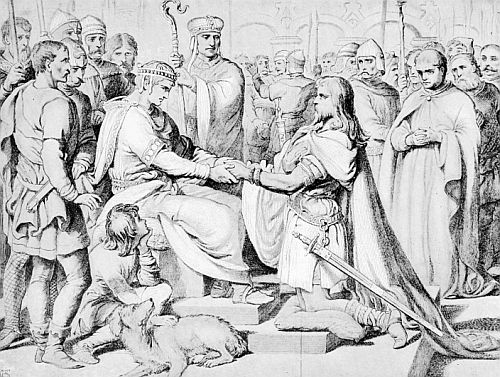
HEREWARD YIELDING TO WILLIAM.
(From the drawing by H. C. Selous. By permission of the Art Union of London.)
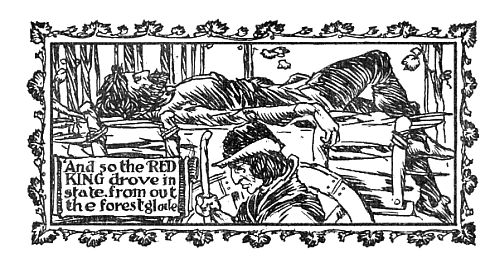
“There is no peace, saith the Lord, unto the wicked.”
 OOK upon the scene which now unfolds itself. You
are gazing into the depths of that Hampshire forest
which the Conqueror set apart for his kingly sport.
It is cursed to his line by reason of the cruelties which he
wreaked upon the forest dwellers when he burnt their roof-trees
over their heads, and scattered them afar, to make a
solitude for his deer. Two scions of his house have already
perished in its glades.
OOK upon the scene which now unfolds itself. You
are gazing into the depths of that Hampshire forest
which the Conqueror set apart for his kingly sport.
It is cursed to his line by reason of the cruelties which he
wreaked upon the forest dwellers when he burnt their roof-trees
over their heads, and scattered them afar, to make a
solitude for his deer. Two scions of his house have already
perished in its glades.
The forest is silent. It is late afternoon, and the setting sun is even now gilding the upper branches of the spreading trees. Suddenly the silence is dispelled. You hear the sound of horns, the baying of dogs, the shouts of hunters, and a lordly stag flies past you. Now a pair of horsemen gallop up, and your eye is instantly arrested by the Red King. You recognize him instantly as a son of the Conqueror, though he seems but a caricature of his father.
Of middle stature, he is square and heavy of frame, with a restless eye, and a stammering tongue that can, nevertheless, rap out ready witticisms and biting sarcasms on occasion. Evil living and unbridled passion have left their marks on his ruddy and bloated countenance. He fears neither God nor man. His crafty ministers wring heavy fines from his barons, and he does not even spare the Church. Archbishop Anselm, that tender-hearted poet-dreamer, who showed the courage of a lion when fraud and wrong were brewing, alone held him in check. Now that Anselm is in exile, there is no wickedness that he will not do. Vicious, vain, boastful, and puffed up with pride, he has not an honest friend in the land.
Men hate him and mock him. With what gibes and sneers they tell that story of the chamberlain and the boots! Once his chamberlain brought him a pair of boots, saying that they had cost but three shillings. “Take them away,” roared the vainglorious fool, “they are not worthy of a king’s foot. Bring a pair that costs a mark of silver.” The cunning chamberlain, thereupon, brings a worse pair, and these the Red King pronounces worthy of his majesty. What a king! Ay, but far worse remains behind. There is no baseness, no cruelty, no injustice which he has not practised. Even now the revenues of bishops and abbots are flowing into his pocket, while “the hungry flock look up, and are not fed.” When disease attacks him he repents; when he recovers he is himself again.
But withal he is no craven. He fights like a man, and reveals much of the Conqueror’s skill and cunning. Fear he knows not. Men tell with wonder of the day when he set forth to subdue Normandy in the teeth of a storm. His mariners trembled, but not he. “Kings never drown, ye varlets!” he cried, and forthwith hove out on the tempestuous waters of the Channel.
Watch him closely. Behind his reckless air of gaiety there is an anxious foreboding. Last night he tossed on his couch and dreamed an ugly dream. He thought he was in a gorgeous minster hung with velvet and purple. All around were the shrines of the saints gleaming with gold and gems and ivory. Such riches even he, the despoiler of churches, had never looked upon, and his hands itched to clutch them. But when he tried to seize them they vanished, and an altar rose before him, whereon was lying a naked man. A lust to feed on the man’s flesh overcame him, and he ate of the body that lay before him. At length the victim spoke in accents stern beyond words, “Is it not enough that thou hast thus far grieved me with so many wrongs? Henceforth thou shalt eat of me no more.”
The horror of the dream is still at the back of his mind, though he has quaffed the wine-cup until the disquieting vision no longer terrifies him. His counsellors have besought him not to venture into the forest to-day; but no man save Anselm, and he is beyond the seas, ever turned him from his purpose. Such is the man who now rides into the forest glade.
While he jokes and jests with his companion, a startled stag springs out of the brushwood. Rufus slips from his horse and fits an arrow to his bow. He shoots, and the quarrel strikes the prey and wounds it slightly. “Shoot, man; shoot!” he shouts to his companion, shading his eyes with his hand to see the effect of another shot. The second bow twangs, and down goes the king with an arrow in his heart. What has happened no man can say. Some tell you that his companion’s shaft has glanced from a tree and has found its billet in the Red King’s breast. Some speak of an Englishman, cowering in the undergrowth, who has seized the moment to let fly the arrow of retribution. Some even aver that the deadly missile was sped by his own brother’s hand.
No one knows, and no one cares. It is enough for all that a king whose life has been that of a wild beast perishes like a beast among the beasts. His companion, horrified at the sight of the dying king, and fearing that he will be accused of the crime, spurs his horse out of the forest, and does not check his steed till he is on the seashore, with a bark at hand to carry him to a foreign strand.
There lies the king, the red blood ebbing from his false heart. “That arrow, by whomsoever shot, set England free from oppression such as she never felt before or after at the hand of a single man.”
“Then a creaking cart came slowly, which a charcoal-burner drove;
He found the dead man lying, a ghastly treasure-trove.
He raised the corpse for charity, and on his wagon laid,
And so the Red King drove in state from out the forest glade.”
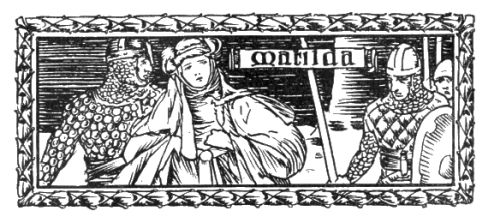
“Old, unhappy, far-off things,
And battles long ago.”
Now you shall witness a striking scene. You are gazing at the castle of Oxford, that stands up grim and square in the midst of its encircling waters. Oxford is already renowned as the abode of quiet scholars and learned men; for “Beauclerc,” who has now gone to his rest, made it an academy and a sanctuary of letters. He it was who built this grim castle, in which to sojourn when he came to Oxford to enjoy the converse of the bookish men who dwelt beneath its shadow. It is, however, no learned concourse of scholars, no peaceful trial of wits, which we are about to witness, but an incident of stern warfare.
The castle is undergoing a siege, which has already lasted three months. An iron girdle of armed men forbids entrance or exit. You see, however, no great engines for hurling missiles into the fortress; you perceive no battering-rams; no pent-houses for undermining its walls; no scaling-ladders and towers for assault. Hunger and cold are the weapons of the besiegers; within, starvation and disease are fighting their battle. It is early morning of the vigil of St. Thomas, a cold, gray day, with a sharp frost in the air. In the camp of the besiegers a white flag is raised in token of truce, and presently you see a stalwart knight clad in full armour bestride his charger. Behind him assembles a train of abbots and priests bearing Church banners and crucifixes. Slowly they wend their way over the powdery snow to the edge of the castle moat, and presently the loud blast of a trumpet startles the ear. Now you see on the battlements of the castle a warder appear and inquire the meaning of the summons. “Say to thy mistress that I beseech a parley,” cries the knight, and the warder disappears.
There is a pause, and presently on the battlements you see a woman, pale and gaunt, but proud and haughty as angry Juno. You notice her flashing eye, her hard, resolute look, and you know that she will never yield to mortal man. “Why come ye?” she asks in imperious tones, and the Lord Abbot of Reading answers her. He bids her yield the castle, and he promises, in the name of the king, that no harm shall befall her or any that are with her. She shall have honourable escort to the coast, lands and money shall be hers, and no vengeance of any kind shall be wreaked on her adherents. “Gracious lady,” he concludes, “I implore thee to yield and end this cruel war, which is a reproach to Christendom and ruin to the people of England. Thy famishing state is well known, and all hope of escape is gone.”
“Who told thee, thou meddling monk, that I thought of escape?” she answers. “Wherefore should I escape? My brother, Earl Robert, is at hand, and ye wot well how the foul usurper was forced to yield to him at Lincoln. The like will happen again here at Oxenford, so let the false recreant begone. I will not throw open my gates nor quit these walls until thy perjured master is in chains, pleading at my feet for the life I have once too often granted him.”
“Madam, madam, I beseech thee,” begins the abbot in reproof, but the wrathful figure on the wall waves him away. “Get thee gone!” she screams in a fierce passion, “or I will remember to hang thee on the gate of thy abbey when this rebellion is over.” So the knight and the churchman depart, and anon you see the former riding from post to post urging his men to keep closer watch on the besieged, and doubling the guards that lie in wait near every exit from the castle.
The early dusk arrives, and the snow begins to fall, and you can scarce see the dark mass of the fortress. The cold wind drives the falling snow into the eyes of the sentinels; they grow numb and drowsy, and their vigilance is relaxed. Now, strain your eyes, and watch the postern of yonder tower. Slowly the door opens, and dimly you perceive five white-clad figures flit out and descend into the moat. You see their ghost-like forms reappear and make all speed for the river. Across its ice-bound surface they hasten, and as they draw near you perceive that one of them is a woman. Now they plunge into the snowdrifts on the other side, and struggle on towards Abingdon. There they will find friends and horses, and speedily they will make for the coast and hie them to the shores of friendly France.
What is the meaning of the incidents which you have witnessed? The woman who has just escaped is Matilda, sole surviving child of Beauclerc. When Henry’s only son went down in the White Ship, she alone remained as heir to the realm. Forthwith Henry called his barons together, and bade them swear fealty to his daughter as “Lady” of England. They did his bidding reluctantly, for they scorned to be ruled by a woman. Amongst the knights who swore the oath was Henry’s nephew Stephen, he whom you saw directing the siege of Oxford. He is handsome, tall, strong, and one of the most renowned knights in all Christendom. Even while the barons obeyed the king’s behest, many of them deemed Stephen far worthier to rule them than the haughty, passionate Dame Matilda.
Ere Henry died, many of the barons had determined to forswear their oath and throw in their lot with Stephen. They knew him as easy-going, soft-hearted, “unstable as water,” and, as such, he was the very king for them. With Stephen on the throne, every baron might be king in his own domain, free to raid and harry and fight as he listed. So when the old king was carried to his tomb, Stephen seized the crown, and, after the fashion of usurpers, strove to win friends to his side. He scattered Henry’s treasure in lavish bribes, he promised men all they asked, he hired foreign soldiers, and was crowned king. Right well pleased were the barons, and right soon they built them those strong castles which they had not dared to rear while Henry was alive. Then they quarrelled and fought, and robbed, and tortured, and hanged to their hearts’ content.
Sad indeed was the condition of England at that time. Turn to the old Chronicle and read:—“They put the wretched country folk to sore toil with their castle-building; and when the castles were made, they filled them with devils and evil men. Then they took all those that they deemed had any goods, both by night and by day, men and women alike, and put them in prison to get their gold and silver, and tortured them with tortures unspeakable, for never were martyrs so tortured as they were. . . . All this lasted nineteen winters while Stephen was king, and ever it was worse and worse. Thou mightest easily fare a whole day’s journey, and shouldest never find a man living in a village nor land tilled. Then was corn dear, and flesh and cheese, for there was none in the land. Wretched men starved for hunger, and some were begging alms that were once rich men, and some fled out of the land.”
And to add to all this horror, Matilda, aided by her noble half-brother, Robert of Gloucester, and her kinsman, David of Scotland, waged war against the usurper. The fortune of battle wavered, now to this side, now to that. Sometimes Stephen was victor, sometimes Matilda. You remember how she taunted Stephen from the battlements of Oxford Castle about the affair at Lincoln. The story is worth telling. Stephen was besieging Lincoln Castle when a superior force of his foes assailed him. With only three faithful followers he fought like a lion at bay, disdaining either to fly or yield. At length his sword-blade snapped; but one of his companions handed him a two-handed Danish axe, with which he did terrible execution. Then the axe-helve splintered in his hand; but all feared to seize him until he was hurled to the ground by a stone thrown by an unknown hand. A knight, greatly daring, ran up and laid hands on the fallen king; but Stephen shook him off, and it was only to Robert of Gloucester that he would deign to surrender. Stephen was put in ward at Bristol, and a great Council elected Matilda queen in his stead.
Ere long her haughty behaviour, her self-will, her revengeful spirit, and the injustice with which she treated the Londoners, disgusted even her best friends. One day, while she was sitting at dinner, the city bells rang out a call to arms, and the Londoners, “like angry wasps from their comb,” swarmed into her palace. She had barely time to escape on a swift steed to Winchester. Then the Londoners arrayed themselves under Stephen’s brave queen and laid siege to Matilda. She was forced to retreat, and in the strife that followed the King of Scots and Robert of Gloucester were captured. Matilda fled on horseback to Devizes; but enemies thronged about her, and her friends only got her safely out of the town by covering her with grave-clothes and carrying her forth on a bier. Robert was now exchanged for Stephen, and once more the tide of war turned in his favour. This brings us up to the incidents which we have just witnessed in front of Oxford Castle.
Little remains to be said. Robert died, and Matilda found that she had lost her best and most gallant champion. Her son Henry, however, was now of an age to take his part in the strife. Strong, able, and rich, he sailed from France with an army, but was too wise to fight a pitched battle. He could afford to wait; and so he made peace with Stephen, who was to reign in England until his death, when Henry was to succeed him. A year later Stephen died, and all good men rejoiced. Peace was coming to the distracted realm, and the old days of “war, wickedness, and waste” were over, men fondly hoped, never to return.
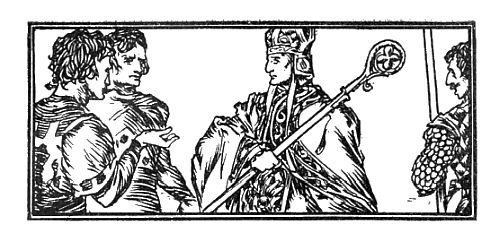
“Fame’s loudest trump upon the ear of Time
Leaves but a dying echo; they alone
Are held in everlasting memory
Whose deeds partake of heaven.”
Once more the scene changes. We are standing in the High Street of Canterbury watching a notable procession pass by. Listen to the clanging bells, and when they cease, hear the organ rolling forth its waves of harmony from the cathedral. The old timbered houses are decked with streamers and garlands; groups of priests with banners are threading the street towards the ancient gate. It is very evident that some great personage is about to visit the city. Is it the king? Not so; it is some one even greater than the king—it is the archbishop, Thomas Becket. You wonder that an archbishop should be more powerful than a king, but in these early days the Church is the greatest power on earth. Even kings must submit to its decrees.
Now the trumpets blow, and a long procession winds its way towards the cathedral. As the archbishop comes in sight loud shouts of welcome rend the air. Look at him as he sits his charger, prouder than the boldest knight in the land. There was a time when he could joust and use sword and lance with the most skilful warrior in the kingdom. Ah! he was a boon companion of the king’s then. What merry jests, what jovial days and nights they spent together! They were Jonathan and David in their friendship. Becket was the king’s right-hand man in all affairs of State. Clever and learned, he seconded the king in all his strenuous endeavours to rid the land of lawlessness and misery. In return, Henry heaped riches and honours upon his chancellor.
What state and ceremony he loved in those days! His palace was far grander than the king’s; a hundred and forty knights followed in his train. None wore such magnificent robes as he; none made so brave a display. As for the king, he cared nothing for those things in which Becket’s soul delighted. Often when the chancellor sat down to feast with his followers, Henry would gallop up to the door of the palace, toss his bridle to a groom, stride into the great hall, vault the table, and in his rough riding-dress take his place by the side of his gorgeous chancellor.
What stories they tell of the pranks these two used to play! One winter day, when the pair were riding through the streets of London, the king saw an old man shivering in his rags. “Look at that poor beggar,” said he. “Would it not be a kind act to give him a good warm coat?”
“Certainly, sire,” replied Becket; “and you are a good Christian to bethink yourself of such a generous deed.”
“Then give him yours,” laughed the king, and seized the rich robe which the chancellor was wearing. Becket was loath to bestow his rich crimson coat on a beggar man; but the king would have his way, and a pretty tussle ensued between them. At last the chancellor’s cloak was pulled from his shoulders, and Henry handed it to the astonished beggar. How hugely he laughed all the way home at the wry face which Becket pulled!
But all this has suffered a “sea-change” long ago. When the king had quelled the robber barons and had pulled down their strongholds about their ears, he found that there was lawlessness in the Church needing his grave attention. The Conqueror had given the bishops the right to hold courts, in which they alone could try the clergy, no matter what crimes they committed. In course of time the bishops claimed jurisdiction, not only over priests, but over all clerks—that is, persons who could read. But who cared for the bishop and his judgments? He could not imprison or hang; he could simply drive a man out of the Church. Many a bold rogue has saved his neck by pulling out a writing from his pocket and gravely reading a certain verse from the Psalms, mayhap while he held the scroll upside down.
Since Henry has sat on the throne more than a hundred murders have been committed by clerks, and not one of the murderers has graced the gallows. This is intolerable; Henry will brook this state of things no longer. He will have justice and order in his land, come what may. Ah! but to meddle with the rights of the Church is no light matter, as he is ere long to discover to his cost. He cannot even make a beginning of reform unless the head of the Church in England is in sympathy with his plans. Good thought! he will make Becket archbishop, and then all will be well.
But when the consecration is over, Henry finds to his dismay that Becket is another man. He dismisses his gay followers; he throws off his costly robes; he abandons his feasting, his gold plate, his tapestries, and his jewels. He mortifies himself with the coarsest food, drinks bitter water, wears sackcloth next his skin, and has himself flogged for his sins. A little cell is his home, and every day, to emulate the meekness of his Master, he washes the feet of thirteen beggars. All the world wonders, and Henry grows angry. His anger increases when Becket resigns the chancellorship, and lets it be known that he now lives for Mother Church, and Mother Church alone.
Henry now tries to carry out his reforms, and make all men, priest and layman alike, answerable for their crimes to the king’s court. For a moment Becket wavers; the king shall have his wish. But a day’s reflection convinces him that in yielding he is betraying the Church. Then his resolution stiffens. He prays the Pope to release him from his promise, and when he is absolved he boldly defies the king. Picture Henry’s rage. You must know the man to imagine the fury of it. When thwarted, he is wont to fling himself on the floor and bite the rushes with which it is strewn.
Becket has made many enemies by his arrogance in the old days, and now they take care to fan the king’s wrath. Some one accuses him of having denied justice, and forthwith he is found guilty and heavily fined. Other punishments are in store for him; but he sweeps into the Council chamber in full robes, with his crosier in his hand, and dares them to pass sentence upon him. He and the Church, he says, are in the keeping of God, and the Pope, and none other, shall judge him. Angry indeed are the king’s friends at these bold words. One of them shouts “Traitor!” and others take up the rushes from the floor and fling them at him. Turning to one of his assailants, he fiercely cries, “If I might bear arms, I would quickly prove on you that you lied!” With this he leaves the hall.
Full well he knows that there is no safety for him in England, so, disguised as a simple monk, and calling himself “Brother Dearman,” he hastens from the kingdom, and for seven long years he dwells abroad. Discontented nobles in Henry’s wide French dominions—he is lord from the Pyrenees to the Tweed—threaten to take up arms in Becket’s cause, and at length a kind of peace is patched up between archbishop and king.
But ere Becket can return home, Henry does a deed which again angers the proud archbishop and rouses all the old enmity between them. Following the French fashion, Henry desires to have his son crowned king in his lifetime. The Archbishop of York is persuaded to undertake the ceremony. Now, the crowning of the king is the privilege of the Archbishop of Canterbury, and of him alone. Becket’s anger flames up at the slight, and he crosses to England in a bitter frame of mind.
And now you stand in the streets of Canterbury watching his return. The people welcome him gladly, for they remember his old kindnesses to them. The nobles, however, stand aloof; they dread his reappearance, and rightly believe that it means trouble to the realm. Becket passes on to his cathedral, and in solemn tones excommunicates the Archbishop of York and the bishops who have crowned the young prince.
Henry is in Normandy, but the news speedily reaches him, and then his passion knows no bounds. “Here,” he shouts to the knights about him, “here is a man that has eaten my bread, a pitiful fellow that came to my court on a sorry hackney, and owes all he has to me, lifting his hand against me, and insulting my kingdom and my kindred, and not one of the cowardly, sluggish knaves I feed and pay so well has the heart to avenge me!”
Fatal words! Four of the knights who listen to the king’s bitter reproof steal away from his court and hurry to Canterbury. While cool reflection has brought wiser counsels to the king, they are bursting into the archbishop’s chamber at Canterbury, and are commanding him to absolve the bishops without delay. He argues with them, and they threaten him, but he is obdurate. “Then we will do more than threaten,” they say, and outside they go to don their coats of mail. Meanwhile the frightened monks run to the archbishop and beg him to take shelter in the cathedral. He laughs at their fears. “Methinks,” he says, “all you monks are cowards.” Not a step will he stir till the bell summons him to vespers. Then he walks serenely to the cathedral.
Soon the knights are thundering at the barred door. “Unbolt the door,” cries Becket; “I will not have God’s house made a fortress for me.” The timid monks dare not obey him, and he flings back the bolt himself. Then the knights enter, and one of them attempts to drag him outside, so that the murderer’s work may not be done within consecrated walls. Becket clings to the great pillar, and Grim, the only brave monk in the chapter, holds him fast. “Strike! strike!” shouts one of the knights, and the sword descends. The devoted Grim catches the blade on his arm, and falls back wounded. Then the blows fall thick and fast, and the archbishop sinks to the ground, crying out that he dies for the cause of God and the Church. And here we leave him in the gloom and silence of his cathedral.
Becket is dead; but though he goes hence and is no more seen, he is mightier in death than he was in life. He conquers as his heart’s blood drips from him.
All Christendom stands aghast at the murder. Henry is horrified when he learns the news, and his grief is real and profound. He instantly sends explanations to the Pope, and, fearing that his enemies will unite against him, embarks for Ireland. In due course he returns to Normandy, and swears that he had no foreknowledge of the archbishop’s death. There is no more talk of curbing the Church; it has proved far too strong for him.
“O’er the rough stones that pave the ancient way,
Barefoot, a king in penitent array,
Crawls humbly to the canonizèd bones.
Doffing his state, he eagerly atones,
Performs the penance haughty priests decide,
And stills the throbbings of rebellious pride.
Prostrate, he feels the stroke of chastening rod,
And cleansed, he rises, reconciled with God.”
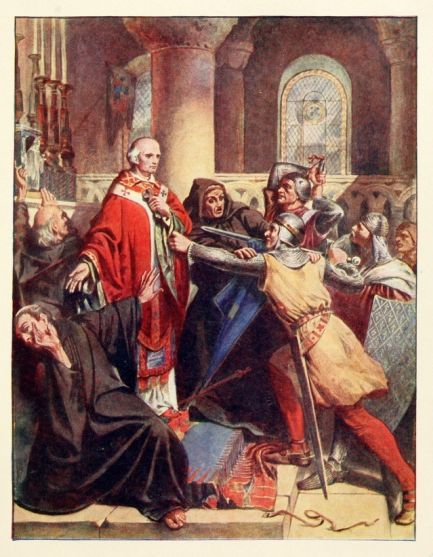
Death of Becket.
(After the painting by John Cross, in Canterbury Cathedral.)
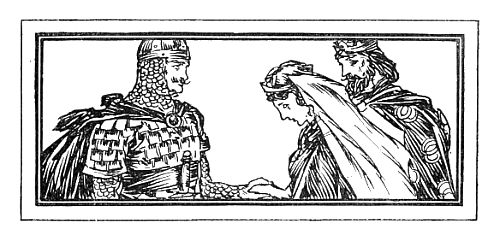
“The lovely and the lonely bride
Whom we have wedded but have never won.”
Now, for the first time, let Ireland figure in our pageant. So far England has never intruded upon this “green isle of the west.” Centuries have come and gone since the Kelts first crossed into Erin and subdued the primitive inhabitants by force of arms. Legends, many and wondrously beautiful, still remain of those early times, and men read them to-day with a new and kindling interest. A strange dreamland it is of gods and wizards, heroes and beauteous ladies.
“The isle is full of noises,
Sounds and sweet airs, that give delight and hurt not.”
We do not, however, tread the solid ground of history until the coming of St. Patrick, who “preached, baptized, and prayed; from the praise of God he ceased not.” In the days of his successors Ireland became the Isle of Saints, and sent forth her missionaries to less favoured lands. At length invaders arrived; the Vikings descended with fire and sword, and after terrible conflicts settled in certain coastwise towns of the eastern shore. Bold Brian Boru, however, clipped their wings at Clontarf, and Ireland still remained unsubdued. When, however, King Henry of England began to meditate on the conquest of the sister isle, Ireland had long fallen from her high estate. All that St. Patrick and his successors had done to civilize the island had disappeared during the long and desperate struggle with the Danes. Ireland was a sad, despairing land, where peace never reigned and men never ceased from foray and slaughter.
Now, turn your eyes to the historic figures who pass us by. Foremost among them you see a dark-visaged “king,” with his collar of gold and his mantle of fur. He is Diarmid, King of Leinster, though his kingdom is shadowy enough at present; for he has been driven out of Ireland by the high-king and a chief whom he has grievously wronged. This Diarmid, smitten by the charms of Devorgilla, wife of the one-eyed chief of Breffni, has carried off the lady, and now he is suffering for his gallantry. He has posted to King Henry, offering him homage in return for assistance in recovering his throne. Henry has other business on hand just now, and he cannot entertain the enterprise in person. He gives the errant king, however, letters-patent permitting all liegemen of the English crown to assist him in recovering his territory.
So Diarmid hies him to Bristol, the great western seaport, and there meets with the second figure in the group now passing before us. Look well at this tall, ruddy, gray-eyed Norman knight, for he is the first to set up English rule in Ireland. He is Richard Strongbow of Clare, Earl of Pembroke, a “landless resolute,” a man of no very good character, but warlike, and with the courage and cunning of his race. You would not think so to speak with him. His voice is soft and gentle, his manner is courteous, but behind it all there is unmistakable determination and daring. Strongbow agrees to throw in his lot with Diarmid, and the price of his assistance is the fair maiden who walks by her father’s side. Eva is nothing loath to accept the debonair Norman knight as her husband, so all goes well.
The buds are bursting into leaf on the Irish trees when the advance-guard of the invaders see the blue hills of Wicklow before them. After some dubious fighting, they seize Wexford, and begin to harry the surrounding country. Raymond the Fat, Strongbow’s nephew, a stout, rosy, valiant knight, arrives in May with reinforcements, and several hard-fought successes are gained. Then comes Strongbow with the main force, and a combined attack is made on Waterford, which is, in sooth, a hard nut to crack. It is Raymond who perceives the means of shelling the kernel. In his reconnoitring he observes a small wooden house built on props and clinging with its timbers to the stones of the walls. His men hew down the posts which support it, and as the building falls it reveals a gap in the wall, through which the besiegers enter. The town is seized, a pitiless slaughter follows, and the dead lie in heaps in the streets.
Strongbow and Eva are forthwith wedded. And now begins a period of fierce strife amidst the woods and bogs, where the Irish can strike shrewd blows at the invader and vanish into security by secret paths. When, emboldened by success, they leave the broken ground and meet the enemy on the plain, they are crushed and scattered by the whirlwind charge of the mailed horsemen. Slowly but surely the newcomers gain ground, and at length Dublin falls. Then Diarmid, “the traitor,” sinks into his grave. His work is done, and no longer will his hoarse voice urge on the enemies of his country. Strongbow is his heir, and he now calls himself King of Leinster.
By this time Henry is alarmed, for Strongbow bids fair ere long to be King of Ireland. He issues a proclamation forbidding Englishmen to engage in warfare in the distracted isle, and Strongbow soon perceives that Henry will brook no vassal of his building up a rival kingdom. Raymond the Fat is at once dispatched with a humble letter of homage; but Henry receives the messenger coldly, and disdains to reply.
Henry himself now prepares to invade Ireland. The month of October, in the year 1171, sees his great fleet of four hundred ships laden with soldiers set sail from Milford Haven. The fame of this fierce, bullet-headed king with the bloodshot eyes and the dark red hair has preceded him, and at his landing all Ireland hastens to do him homage. In a wicker-work hall with walls of peeled osiers, Henry holds his court in Dublin during one of the stormiest winters ever known. He feasts the Irish chieftains on dainty Norman dishes; he grants charters bestowing all the soil of Ireland on ten of his leading knights, and, leaving Strongbow out in the cold, invests Hugh de Lacy with cap and sword as the first governor of Dublin. When the April showers begin to fall, the royal Plantagenet embarks his host and returns to England.
But what of Strongbow? Conscious of the royal displeasure, he joins Henry in Normandy, and fights bravely against the king’s rebel sons. Then once more the sun of royalty deigns to smile on him, and at length he is rewarded with the long-coveted governorship of Dublin. In Ireland he discovers that Raymond the Fat is most popular with the soldiery, and is likely to prove a troublesome rival. A marriage is arranged between Strongbow’s sister and the popular knight, and Strongbow feels that he has staved off a disaster. The wedding festivities are rudely interrupted by news of native risings, and away goes Raymond to the congenial work of quelling the revolting chieftains. He gains success after success. The soldiers will have no other leader but him; and all the while Strongbow jealously intrigues against him. One day when Raymond is in the south he receives this message from his wife: “Be it known unto your sincere love that the great jaw-tooth which used to give me such uneasiness has fallen out. If you have any care or regard for me or yourself, return with all speed.”
The “great jaw-tooth” is none other than Strongbow, who has just died from the effects of an ulcer in his foot. So passes the man who ushers the English race into Ireland. He came to bring not peace but a sword, and with his advent began five long centuries of battle and murder, oppression, confiscation, rebellion, famine, crime, and misery unspeakable.
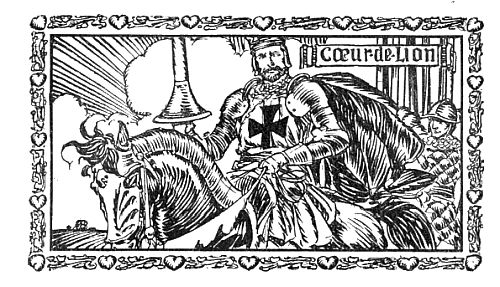
“The knight’s bones are dust,
And his good sword rust;
His soul is with the saints, I trust!”
Almost the best-known character in all our pageant now makes his appearance. Clad in coat of mail, his shield blazoned with the leopards of England, his surcoat broidered with the Red Cross, he is the very beau-ideal of a knight. Tall, stalwart, handsome, fair-haired, and blue-eyed, the gaze of all men lingers admiringly on him. A good general, a skilful engineer, a wise judge of men, he might have been a renowned king; but, alas, his lust for war, his thirst for adventure, his fierce delight in conflict made him a mere soldier—the foremost of his time, it is true, but nevertheless a killer of men, and not a builder of states or a benefactor of his land. Still, he shines beyond all other English kings as the hero of song and story, and as the mirror of the knighthood which prevailed in his day.
Richard figures in history as the outstanding hero of the third Crusade. Well-nigh a century before he was crowned king at Westminster, Peter the Hermit had harrowed men’s hearts by a recital of the infamies done by the Saracen to Christian pilgrims in the Holy Land. With frenzied words he bade his hearers, “Go, deliver the sepulchre of the Lord;” and everywhere arose the answering cry, “God wills it!” A tumultuary horde, burning with enthusiasm, plundered its way to the East, but perished without touching Asiatic shores. Behind it came an organized army, which suffered terribly on the burning sands of Syria, but nevertheless achieved its object, and set up a Latin kingdom in the Holy Land. Half a century went by, and the Crescent was once more in the ascendant. Again a Crusade was preached, and again an immense army set forth to deliver the tomb of our Lord from the infidel. It had to fight against treachery of the worst type, and its career was inglorious in the extreme.
Sixteen years ago a new conqueror arose in the East, the great Sultan Saladin, a knight worthy to cross swords with Richard himself. Jerusalem was now in his hands, and pious Christians felt a deep pang of shame that it should be so. Once more a Crusade was preached, and once more the good and the bad, the pious and the impious, the just and the unjust of Christendom swore to drive the Saracen from the holy soil which his foot polluted. Religious enthusiasm blazed up fiercely, and its first-fruits in England was an awful massacre of Jews on the coronation day of Richard. “Down with the foes of the Lord!” shouted the mob, and thousands of innocent Israelites were murdered in cold blood. At Lincoln the brave Jews defended themselves in the castle until all hope was gone. Then they slew their women and children, lest a worse fate should befall them, and perished by their own hands rather than surrender to their Christian foes.
But all this was forgotten in the bustle and tumult of warlike preparation. Never was Richard so busy, never was he in higher spirits. He worked all day, snatching an hour or two in the evening to spend with his loved troubadours. In the August of the year 1189 his galley Trenche-mer set sail from Marseilles, and spread its sails for Messina, where Richard and Philip of France were to forgather. Winter was to be spent peacefully under Sicilian skies; but trouble was not long in brewing. The townsfolk having beaten and insulted his men, Richard forthwith stormed their city. As a notable squire of dames, he then took up the cause of his widowed sister Joan, who had been despoiled of her dowry by her brother-in-law, the new king. Restitution was made perforce, and Richard by his gallantry and lavish bounty soon became the theme of all tongues. Philip of France, as proud and haughty as Richard himself, looked on sullenly, and a passionate jealousy of the English king began to take possession of him.
At last Richard sailed for Cyprus, where he proposed to land and await the coming of his bride, the fair Berengaria of Navarre. But a storm overtook his fleet, and two of his vessels were driven ashore. Isaac Comnenus, the churlish ruler of the island, little guessing with whom he had to deal, seized the cargoes and imprisoned the crews. This was intolerable, and Richard’s hot blood boiled with rage. To avenge the insult, he pounced upon the capital of the island and captured it. Then, to crown his triumph, came Berengaria, and, amidst scenes of splendour, his marriage was celebrated. He spent his honeymoon in conquering the rest of the island, nor did he rest until Isaac, loaded with silver chains, was sent into banishment.
Twice he had fought and conquered since leaving Marseilles, and yet a third adventure awaited him before the real business of his enterprise began. During the voyage to Acre a big merchant ship was sighted flying false colours. Speedily she was discovered to be a Saracen vessel striving to run the blockade of Acre, now besieged by the Crusaders. Forthwith Richard mustered his crew. “I will hang every mother’s son of you if you let yonder dromond go,” was the burden of his speech, and having thus heartened his men, he bore down on the foe. The Saracens let fly a shower of arrows and threw Greek fire aboard the Trenche-mer, but, nothing daunted, Richard rammed the Saracen vessel with the sharp prow of his galley. Through the gaping rent in the dromond’s side the sea poured in, and down she went with all her rich cargo and most of her crew.
There were no more adventures before Acre was reached. The ancient town was closely beleaguered by the Crusaders, but little progress had been made. A change came over the spirit of the attackers when Cœur de Lion arrived. Up rose a great wooden castle to top the walls; here and there huge catapults hurled missiles into the town; while beneath the pent-houses was heard the sound of pick and spade as the sappers undermined the walls. Now ague seized the king, but his ardent spirit would not let him rest. Carried in a litter to the trenches, he himself pulled a bow against the Saracens on the ramparts, and by example, stirring words, and promises of reward encouraged his soldiers to press the siege with all possible vigour.
Early in July the town was yielded, and in the first moment of success bickerings began amongst the Christian leaders.
When the Crusaders entered the city, Richard perceived Leopold of Austria’s flag planted side by side with his own on St. George’s Mount. “Who has dared,” he said, laying his hand upon the Austrian standard, and speaking in a voice like the sound which precedes an earthquake, “who has dared to place this paltry rag beside the banner of England?”
“It was I, Leopold of Austria.”
“Then shall Leopold of Austria presently see the rate at which his banner and his pretensions are held by Richard of England.”
So saying, he pulled up the standard-spear, splintered it to pieces, threw the banner itself on the ground, and placed his foot upon it.
“Thus,” said he, “I trample on the banner of Austria.”
In these words does Sir Walter Scott recount the story. Peace was ultimately made between the two, but Richard had made another foe, who was soon to take ample revenge on the haughty island king.
The fame of Richard dwarfed that of every knight who wore the Cross in Palestine, and the bruit of his valorous deeds made him a terror to every Saracen in the land. For years after, an Arab would cry to the steed that stumbled, “Fool, dost thou think thou sawest King Richard?” But the odds were fearfully against him. Every day disease thinned his ranks, and in the long march from Acre along the coast his men suffered terribly, though they turned in wrath and smote, hip and thigh, the Saracens who harried them. Barely, too, did Richard escape the daggers of the assassins sent to do their murderous work by the Old Man of the Mountain, who dwelt at Lebanon. One of them entered Richard’s tent, and was about to strike when the English king caught up the stool on which he had been sitting, and with it crashed in his assailant’s skull. No wonder men believed that he bore a charmed life.
And now he turned his steps to Jerusalem itself, but the Frenchmen forsook him, lest it should be said that an English king had recovered the Holy Sepulchre. Never was he so cast down as at this defection. Without their aid his little army could not hope to succeed. As he wrestled with his grievous disappointment, a knight begged him to ascend a mount from which he might gaze upon Jerusalem. But the king snapped the switch which he held in his hand, and cast his surcoat over his head, while the angry tears gushed forth. “O Lord God,” he prayed, “suffer not mine eyes to behold Thy holy city, since Thou wilt not grant that I deliver it from the hands of Thy foes!”
Back again over the weary sands of the desert he toiled, sick at heart and sick of body, but not so sick that he could not again drive the enemy before him. But he had failed, though he had done all that man could do. Saladin agreed to a truce of three months, three days, and three hours, and with this poor result Richard was forced to be content. So he left the Holy Land, never to return.
Richard, however, was never long without the adventures which he so ardently sought. On the homeward voyage he landed at Ragusa, on the Adriatic shore, meaning to pass through Germany in disguise. But the gloves in the belt of his page betrayed him as a great personage, and he fell into the hands of his foe, Leopold of Austria, who at length found himself able to pay off old scores. Ultimately Richard was sold to the emperor, who put him in chains, and raked the past for offences wherewith to accuse his royal captive. For a time Richard disappeared entirely from view, but the place of his captivity leaked out at last. An old story tells us that his whereabouts were discovered by the minstrel Blondel, who loved the king, and set out on a weary quest to seek him. From castle to castle he passed, singing under the walls a song which Richard had composed. One day, to his great delight, he heard a voice which he knew full well troll out the second verse of the song from a dungeon cell. Forthwith he hastened to England and told the news. Historians, however, frown upon this pleasing story.
Richard was tried at a Great Council, where he defended himself boldly, and cleared himself of all the charges urged against him. Nevertheless, his captor would not let him go without ransom, which was valued at twenty-seven times the king’s weight, and amounted to the colossal sum for those days of £100,000. Richard wrote home to his ministers and begged them to collect the money as speedily as possible, as he was weary of captivity. While they were raising the ransom, which was a grievous burden even to rich England, Richard whiled away the weary hours by writing ballads, one of which ran thus:——
“Never can captive make a song so fair
As he can make that has no cause for care,
Yet may he strive by song his grief to cheer.
I lack not friends, but sadly lack their gold!
Shamed are they, if unransomed I lie here a second Yule in hold.”
But his people were not “shamed.” The Pope and other Christian powers were indignant at the ill-usage to which the champion of the Cross had been subjected, and the Emperor thought it wise to yield to that public opinion which almost unanimously condemned him. So when three-fourths of the ransom had been paid, Richard was set free, and sailed with all speed for England.
Not even now was peace to be his lot, for his false brother John was in arms against him. John, however, was soon pleading that forgiveness which Richard of the generous heart was always ready to grant. Then he was crowned afresh, to rid him of the stain of his captivity; and now that his kingdom was regained and all was peaceful, he looked about for new battles to fight.
He had not far to look. Philip of France was an old enemy, and he had treacherously supported John in his endeavours to gain the English crown while Richard was “in hold.” An uneasy peace followed a French defeat, but a few years later war broke out again, and once more a truce was proclaimed. Soon after, Richard’s subjects in Poitou were in rebellion, and Richard went south to quell the rising. By chance he learned that one of his vassals had unearthed a rich treasure-trove in the shape of a golden chess-table and men. Richard claimed the prize, but his vassal was unwilling to surrender it, whereupon the king laid siege to his castle of Chaluz.
During the siege an archer in the beleaguered keep shot at the king and hit him in the breast. The wound was not serious, but the doctor who attended him soon made it mortal. Ere long the king knew that he must die. As he lay on his deathbed the keep was taken, and the archer who had shot the fatal arrow was brought before him.
“What have I done to thee, that thou shouldest slay me?” demanded the dying king.
“Thou hast slain my father and my brothers with thine own hand,” replied the man undauntedly. “Torture me as thou wilt, I shall die gladly, since I have slain him who did me so much ill.”
“Well, I forgive thee,” said Richard, always generous to a bold foe. Then he bade his servants give the man money and dismiss him unhurt. Let us ever remember that, with all his faults, all his pride, his love of pleasure, his vainglory, his animal passion for warfare, Richard’s dying request was for mercy to the man who had robbed him of life. When the breath was out of the king’s body his soldiers flayed the bowman alive, but that foul deed may not be laid to Richard’s charge.
So they buried the Lion’s heart at Rouen, and laid his body at Fontevraud, beside that of the father whose gray hairs he had brought down long years ago with sorrow to the grave.
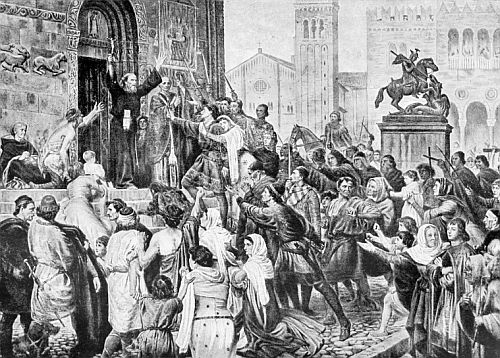
“GOD WILLS IT!”
(From the picture by James Archer, R.S.A. By permission of the Autotype Co.)
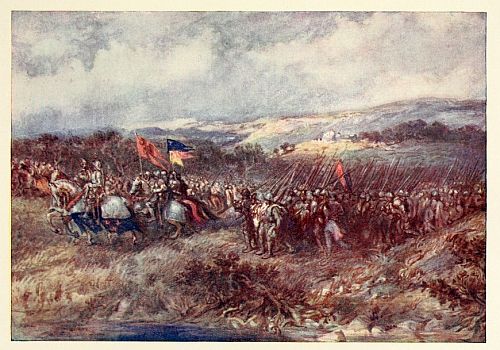
Crusaders on the March.
(From the picture by Sir John Gilbert, R.A., in the South Kensington Museum.)
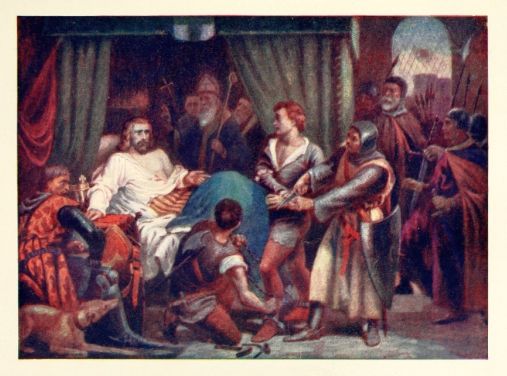
King Richard and the Young Archer.
(From the fresco by John Cross in the Houses of Parliament.)
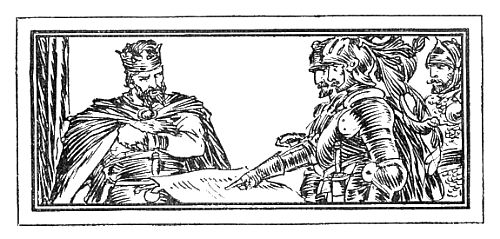
“Magna Charta is such a fellow that he will have no sovereign.”
Runnymede spreads before you, the famous field on which the English people wrested from a tyrannous monarch their great table of laws. You see a green meadow stretching along the marge of “silver-footed Thames,” a pasturage in no degree distinguished from scores of others in that fair valley. Fronting it is a little island, set like an emerald in the shining waters. Meadow and island should enchain your attention, for here a deed is to be done of deep and solemn import, immeasurable in its effects upon the lives and fortunes of generations yet unborn.
Here you shall see the seed sown which is to shoot up into a goodly tree, bearing as its fruits that liberty, civilization, and knowledge in which we rejoice to-day. Long centuries of toil and struggle will elapse before it is deep-rooted in the soil; the weeds of error and wrong will threaten to choke it; the fierce sun of tyranny will scorch it; the piercing winds of privilege will numb it: but the hardy plant will not succumb. It will be tended by devoted hands, and watered with blood and tears, until it spreads its branches far and wide, and is reckoned the glory of the land. New-graffed with every generation, and branching into offshoots which bear little semblance to the parent stock, it still remains, worthy of all our reverence and regard as the sturdy root of the Constitution under which Britons dwell as the freest nation of the world.
Look at the meadow on this side of the Thames. Busy hands are setting up a pavilion of white and gold, for the sojourn of a king. Other pavilions are rising on Runnymede itself, and on the island too, where a canopied throne is set up. Now the actors in the scene begin to arrive. Mail-clad barons armed as for the fray, grim and determined, solemn of port and sober of converse, draw near. An archbishop with his train of priests joins the armed throng. All the magnates of England, spiritual and secular, are here—and they are here to coerce a king.
All is ready, and now the king leaves his bannered pavilion, and crossing the narrow waters to the isle proceeds towards the throne. Watch him closely, for his like has never before worn the English crown, and—please God—never will again. Look at his fierce, dark countenance, over which waves of passion continually spread, like the ripples on yonder waters. He is the scourge of his land, the worst monarch with which England has been cursed—worse even than Rufus. Bad son, bad husband, bad father, bad king, there is scarce a crime in the whole black calendar of which he may not be justly accused. He is cruel, false, greedy, untruthful, and vile; yet out of his wickedness wondrous good shall come.
He has fought his father, he has wronged his brother, and he has murdered the little nephew who stood in his way. The poor child Arthur, heir to the English throne and to England’s wide realms in France, fell into his hands twelve years ago. John offered him terms, but the lad, brimful of the spirit of his race, would strike no bargain with the “shameless king.” He was close pent in a Norman castle, and thither John dispatched his unwilling minister, Hubert de Burgh, to put out the lad’s eyes. But the frenzied appeals of the little prince so moved Hubert’s heart that he forswore his foul commission, preferring to brave the wrath of his ruthless master than to suffer the sting of conscience. But there were others with no bowels of compassion, and by their aid the lad was slain. How he actually died we do not know. Perhaps John inveigled the boy into a boat and there stabbed him and flung his body overboard, or perhaps he compassed his death by subtler means. Shakespeare tells us that, goaded to madness, the little prince leaped from the walls of his prison, crying,—
“O me! my uncle’s spirit is in these stones—
Heaven take my soul, and England keep my bones.”
At any rate, the king you now see approaching has murder on his soul. But this is only the beginning of his villainy. Seven years ago the Archbishop of Canterbury went to his rest, and the monks of the cathedral elected another and sent him to Rome for his pall. John chose for the high office a minion of his own, “a servant of Mammon, and an evil shepherd that devoured his own sheep.” Pope Innocent, the proudest and most powerful man who ever wore the triple crown, set both candidates aside and appointed Stephen Langton, a wise and pious Englishman, against whom no word of scandal could be breathed. But John would have none other but his own nominee. He defied the Pope, and then the thunders of Rome were heard in the land. For the king’s sins a religious boycott was imposed upon the people.
The most dreaded terror in the Papal armoury—an interdict—was placed on the land. The churches were closed, no bell rang for prayers, all rites were withheld from the people, and even the dead lay in unconsecrated ground. But John was not yet brought to his knees; he seized the goods and lands of the Church, and then Innocent in wrath cast him out of its pale. Still John was unsubdued; he plundered the Church even more remorselessly.
He treated the Jews as a money-sucking sponge, squeezing them by every conceivable cruelty until they gave up their wealth. One rich Jew, so the story goes, was forced to disgorge by the simple process of having a tooth drawn every day until he had to choose between his remaining molars and his money bags. Others were starved in cages fastened to castle walls until their spirit of resistance was broken.
Military success did not fail the wicked king at this crisis. He compelled William the Lion of Scotland to do homage and pay heavy tribute, and he did the only really good work of his life in Ireland. From that country, which had been destined as his principality, John had been driven in the lifetime of his father by an onslaught of the Irish chiefs, whom he had abominably insulted and goaded into rebellion. Now he returned, and made short work of them and of the quarrelsome Anglo-Normans. He pacified the distracted land, made good laws, appointed capable officers, and sailed home in triumph. Then he turned his victorious arms against his son-in-law, Llewellyn, and forced the Welsh prince to do homage in the midst of his mountain fastnesses. And all the time John snapped his fingers at the Pope.
Innocent’s patience being now well-nigh exhausted, he sent to England his legate Pandulf, who solemnly declared John’s subjects free of their oath of fealty. But most of the nobles and many of the more worldly clergy still stuck to John, and his hired troops feared neither Pope nor devil. So John still held out, and even began to win the goodwill of his subjects by regulating the seaport trade, and by pardoning offenders against the barbarous forest laws of the time. Now came the Pope’s final sentence—John was to be hurled from the throne, and another and a worthier king should reign in his stead.
Philip of France was chosen to carry out the decree, and speedily he mustered an army for the venture. On all hands foes arose, and though the English barons and people were quite ready to fight for their king, John was for the first time thoroughly frightened. He feared to die outside the Church, and he was terrified by a monkish prophecy that he should lose his crown ere next Ascension Day. So he begged forgiveness of Innocent, knelt before Pandulf, and gave up his kingdom, which he received back on promise of amendment and a yearly tribute as vassal of the Pope. The anger of the English people at this base act knew no bounds. “He has become the Pope’s man,” they sneered; “he is no longer a king, but a slave.” Still more angry did they become when John sent an expedition to France, which, after capturing Philip’s fleet and burning his stores, was hopelessly beaten and driven back to England.
Many of the barons had refused to join this ill-fated expedition, and now John began to punish them. This was the last straw. They met in wrath, and Stephen Langton showed them the charter which Henry the First had granted to his people one hundred years before. The barons, utterly disgusted with John and all his works, now knelt before the high altar of St. Edmund’s minster and swore that they would make the king put his seal to a similar charter, even if they had to plunge the land in civil war. They girded on their armour, and under Robert Fitzwalter, “marshal of the army of God and of holy Church,” marched on London, where the citizens threw open the gates to receive them. “These articles,” cried the king, when they were presented to him, “are pure foolishness. Why do they not ask me for the kingdom at once? I will never give them such freedom as would make me their slave.” Brave words these, but when John perceived that all his knights but seven had deserted him he saw that he had no alternative but to yield.
And now let us turn again to the scene on the little island in the Thames. John has ascended his throne, and, holding the sword of state in his hand, battles hard with the fierce rage that is gnawing in his heart. Now he must repress his feelings, but to-night he will give them full fling. He will throw himself on the ground, gnash his teeth, and in a torrent of rage utter curses loud and deep. But here he must dissemble his wrath. Around him are the barons in full armour, their hearts as hard and their wills as unyielding as the mail which clothes them. A monk reads the charter, but the king is not listening. He is plotting and planning how to make these barons eat dirt for the insult they are putting upon him. By his side is Pandulf, urging him to defy them; but the king knows the resistless might of angry Englishmen better than any foreign churchman. He is in a trap; he must yield, but woe betide those who have made him do so!
The reading of the charter is finished, and John cries reluctantly, “Let it be sealed.” Then the charter is placed on the table in front of him, the wax is melted and placed on the parchment, the seal is screwed down, and the great charter becomes, for all time, the law of the land.
Now, what is this charter which has just been sealed? It is really a treaty of peace between king and people. “We will retain you as king,” they say, “only on condition that you swear to keep the law thus written down.” It is no new thing this law, but the old rights and the old liberties of the people collected together, and for the first time put into black and white. All the freemen of the land have united to extort this charter from the king, and the rights of all classes are laid down in it. Naturally, much of the charter deals with the rights of the barons and the clergy, for they have had the chief hand in securing it, but one-third of it contains promises and guarantees for the people in general. All praise to the barons! Unlike those of some foreign lands, they are not selfish now that they have got the upper hand of the king. Of course they take very good care of themselves, but to their credit be it said that they do not neglect the welfare of the nation at large.
In days to come men will regard this charter as the cure for every kind of royal lawlessness and tyranny. Well-nigh forty times will our kings be forced to sign it, and every time the national faith in the principles laid down in it will grow stronger and stronger. It will be greatly changed in form as the years run by, for new conditions will bring the need for new applications of its provisions. Nevertheless, the three main principles of the charter which you have witnessed in the making have been carried into every land where the British flag waves, and to every shore where the spirit of British freedom has penetrated. Let them be set down here before the scene closes and the pageant moves on:—The people can only be taxed with the consent of their representatives. There shall be justice for all, and it must not be sold, delayed, or refused. No freeman shall be taken, imprisoned, or in any way hurt, unless he be tried by his peers or equals according to the law.
In our days of widespread freedom these priceless principles seem to us the merest commonplaces, yet we must never forget that stout hearts, strong wills, and eternal vigilance were needed before they became the unchallenged possession of all who glory in the name of Briton.
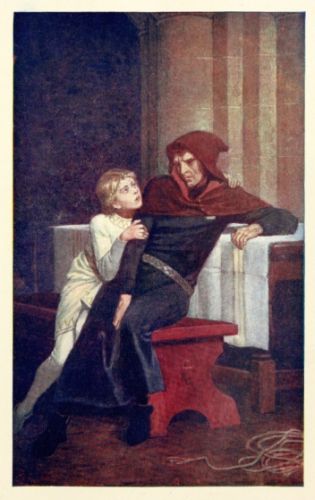
Hubert and Arthur.
(From the picture by William F. Yeames, R.A. By permission of the Corporation of Manchester.)
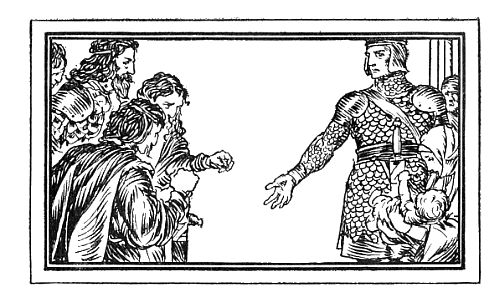
“God bless the Prince of Wales.”
 ND now “gallant little Wales” shall supply a scene
to our pageant. History may not sanction the
subject of it, but it may not be omitted. You
are spectators within the gray walls of Carnarvon Castle,
that grim old fortress which overlooks the fair waters
of Menai Strait. From its soaring towers your eye
takes in the wild mountain region of Snowdonia, a land
of hoary summits and green valleys, in the recesses of
which the old Celtic inhabitants of Britain stubbornly
maintained their independence for more than five long
centuries. You are now to see the nation subdued and
an English king assert his sway. But you will not see it
lose those essential things which mark its nationality—its
language, its literature, its genius. To-day they are still
dear to the Welsh nation, and are more jealously guarded
and fostered than ever. Go to an Eisteddfod and hear
twice a thousand Welsh voices unite in the stirring strains
of Hen Wlad fy Nhadau (“Land of my fathers.”) You will
then understand how ardently the flame of patriotism burns
in the breast of the men and women who have been reared
in this ancient land of beauty and song.
ND now “gallant little Wales” shall supply a scene
to our pageant. History may not sanction the
subject of it, but it may not be omitted. You
are spectators within the gray walls of Carnarvon Castle,
that grim old fortress which overlooks the fair waters
of Menai Strait. From its soaring towers your eye
takes in the wild mountain region of Snowdonia, a land
of hoary summits and green valleys, in the recesses of
which the old Celtic inhabitants of Britain stubbornly
maintained their independence for more than five long
centuries. You are now to see the nation subdued and
an English king assert his sway. But you will not see it
lose those essential things which mark its nationality—its
language, its literature, its genius. To-day they are still
dear to the Welsh nation, and are more jealously guarded
and fostered than ever. Go to an Eisteddfod and hear
twice a thousand Welsh voices unite in the stirring strains
of Hen Wlad fy Nhadau (“Land of my fathers.”) You will
then understand how ardently the flame of patriotism burns
in the breast of the men and women who have been reared
in this ancient land of beauty and song.
As the scene opens, you perceive that the death-knell of the nation’s independence has tolled. You gaze upon an assembly of chieftains—handsome, active men with long hair and moustaches and shaven chins. Their arms, their coats of mail, their helms and shields are laid aside, and they are clad simply in tunic and cloak, bare-kneed, and shod with brogues of hide. All are depressed, all are sorrowful, for they are here to acknowledge the surrender of their land.
As they wait the coming of the English king their minds fly back over the long story of resistance which they and their sires before them have made against their persistent and greedy foes. As they cast their thoughts back they recall the awful slaughter of Roman times, when the Druids of Mona were sacrificed on their own altars; they dimly remember how the deep snow of their hills baffled the haughty Conqueror, who, not to be beaten, planted his barons on their borders, and bade them win the land by never-ceasing strife. It was Griffith ap Rees—was it not?—who made the Norman bite the dust, and taught him to respect the might of the Cymric arm and the fury of the Cymric onset. Then they remember what their bards have told them of the brave days of Owen Gwynedd and the Lord Rees—how these twain drove back the Norman who called himself “Fine Scholar,” and baffled him too. For all his scholarship, he could not add the laurel of Wales to the wreath that encircled his brow.
Then they would think of Llywelyn the Great, and of that golden age which their fathers were never tired of recalling—how that wise and powerful prince strove to unite all Wales, and live on good terms with the Saxon on his borders. ’Twas Llywelyn, they remind one another, who married King John’s daughter, and aided the Saxon barons to make that false sovereign swear to observe the rights of the Cymry and keep their laws inviolate. ’Twas in his day, too, that the monk and the friar came into their land with a blessed ministry to the poor and the outcast. Strange that the great Llywelyn should have begotten so feeble a son as David, he who weakly threw in his lot with the Saxon and sent his patriot brother Griffith in chains to the Tower of London. Ah! it was a sad day when the rope broke by which that gallant prince was trying to escape, and he was killed by the fall!
But his son Llywelyn, their late king, was worthy of his sire, look you! He and the great Simon de Montfort had fought shoulder to shoulder, and the Saxon king had been obliged to recognize Llywelyn as Prince of Wales. And now he has gone too—slain by a foe who knew him not, in a mere skirmish down by Builth. Yes, and the old prophecy has come true—that Llywelyn should ride crowned through London. Crowned he was, in very sooth, but, alas, the crowned head was carried on a spear. Woe worth the day! David, his brother, had been caught too, and had suffered the awful death penalty of a traitor. Even now his head was rotting over Shrewsbury gate. Had Llywelyn but lived, even Edward’s great army might have been driven back, especially as winter was coming on, and the storms and the snows would fight on their side. But with Llywelyn’s death all hope has vanished, and what can they do but submit?
And now Edward, the Saxon king before whom they are to bow, comes on the scene. The chieftains scan him closely. Some of them have never seen him eye to eye before; but his warlike fame has long been familiar to them. As he strides into the courtyard, towering above his attendants, they can readily believe those wonderful stories which they have heard of his mighty prowess and physical strength—how, for example, he slew the assassin in the Holy Land, and how he bore himself at Châlons when the Burgundian knight strove to drag him from his saddle. What a fool the fellow must have looked when Edward clapped spurs to his horse and shook the man to the ground as though he had been a bag of straw! He is pitiful, too, and boasts—does he not?—that no man ever begged his life of him in vain. And what is that device which he bears so proudly on his shield? “Keep faith.” Ah, but will he keep faith with stricken Wales? Has he not slaughtered the very bards, lest their songs should keep the memory of the old free days fresh and green in their hearts?
And now the handsome, stern king with the drooping eyelid begins to speak in deep, vibrant tones, and the interpreter turns his words into the tongue of old Britain. He will give them a prince of their own. “Nay,” they cry out, “we will have no prince but one born in our own land and speaking our own tongue.” Edward turns to the nurse who stands by, takes from her his newly-born son, and holds him aloft to the astonished gaze of the chieftains. “Here is your prince,” he cries; “he was born in Wales, and he knows not a word of the English tongue.”
The humour of it appeals to the assembled throng. Yes, yes, they will swear fealty to him, but he must have a Welsh nurse, and he must learn to speak their language. Edward gladly agrees, and swears on the hilt of his sword to “keep faith.” So the Welsh have once more a prince of their own, and thus it comes about that the eldest son of an English king bears the proud title Prince of Wales.
Now Edward betakes himself to the more serious work of settling the government of the land. Wales is to keep her old customs and laws, and Welshmen are to retain the freedom and the estates which they enjoyed under their own princes. All is done that can be done to make the foreign yoke easy and the burden light; but many a wicked deed will be perpetrated and many an injustice will be wrought before Welshmen are reconciled to the loss of their independence. But the day will come when, secure in their freedom and reinforced by their union with the mightier land on their borders, there will be no more loyal and stauncher hearts in the whole Empire than those which beat in “gallant little Wales.”
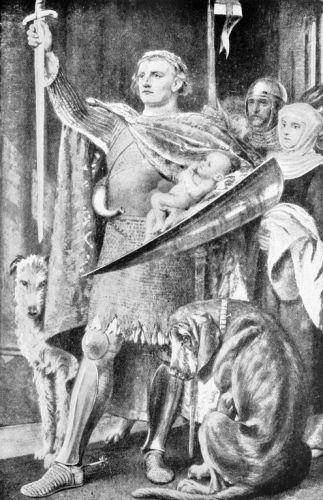
THE FIRST PRINCE OF WALES.
(From the picture by P. R. Morris, A.R.A.)
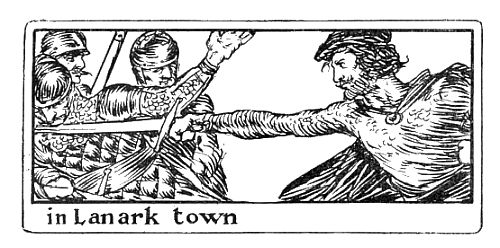
“At Wallace’ name what Scottish blood
But boils up in a spring-time flood.”
Now let the scene shift to Scotland, where the masterful Edward, having subdued Wales, is seeking to lay his hands upon yet another kingdom. Truly the condition of the land invites him to conquest. The Scottish king, on a night ride along the cliffs of the Fifeshire coast, has fallen over the black rocks, and he is no more. The sceptre passes to a frail little grandchild in far-off Norway; but ere she can tread the soil of her kingdom, she too has gone the way of all flesh. The royal line is extinct, and the throne of Scotland is without an heir.
Forthwith a round dozen of eager aspirants set up their claims to the vacant throne. All save two are men of straw, with hardly the colour of a right to the kingship. But Robert Bruce, Lord of Annandale, and John Baliol, Lord of Galloway, both come of the royal stock, and both have their clamorous supporters. Who shall judge betwixt them? Edward seizes the opportunity. He—so he declares—is overlord of Scotland, and he and none other will decide. So chronicles and title-deeds and charters are collected from many a muniment chest, and he and his councillors are soon busy examining them. When all is ready, he arrays an army and marches north to the Border castle of Norham, on the Tweed. To this place come the magnates of Scotland to hear his award. But before it is pronounced he claims that they shall recognize him as lord paramount. Some of the Scottish chiefs demur, but the English king cries, “By St. Edward, whose crown I wear, I will maintain my just right or die in the cause.” Might is right in his case, and the Scottish nobles, in the distracted state of the kingdom, are forced to admit his claim.
And now, having secured the first point in the game, Edward gives judgment in favour of John Baliol, a lamb-like person, the least stalwart and the least Scottish of all the claimants. He is a weak creature, and Edward knows that he will be a pliant tool. So Baliol bows to Edward, and receives the crown of Scotland.
Ere long Baliol begins to feel Edward’s bit gall his mouth. He is continually being pulled up and jerked hither and thither by the strong hand of his rider. Baliol submits time after time, but at length even his sluggish spirit is roused, and one day he throws off his allegiance and declares war. Edward has long been waiting for this turn of fortune’s wheel; he has long been working for this fatal outburst. Speedily he marches north with a great army and sweeps through the country, a ruthless conqueror. None can stand against him, and the “puppet king” least of all.
See Baliol now, about to do public penance for his so-called misdeeds. The English barons are assembled in a churchyard, and thither they lead the king of the Scots mounted on a sorry nag. A herald proclaims his treason. His crown is snatched from his head, the sceptre from his hand, the royal robes from his person. A humble penitent, clad only in his body garments and holding a white rod in his hand, he meekly confesses his fault and acknowledges the justice of his punishment. A few days later he gives up his crown to Edward, and is dispatched a prisoner to the Tower of London. So Edward returns to his kingdom, leaving Scotland beaten to the ground, sore and humiliated, but passionately longing for revenge. With him he carries every token and memorial of Scottish independence—the crown and the sceptre, and the Stone of Destiny, on which Scottish kings have been crowned from time immemorial.
Now let the great patriot hero whom Scotland delights to honour, even after the lapse of six centuries, tread the scene. He is William Wallace of Elderslie, a young knight of some twenty-seven years, massive of build and mighty of thew and sinew, fit foe for Edward himself. His face is long and fair, his hair light-brown, his eye clear and piercing, his expression solemn and sad. A foul outrage has driven him to the hills, where he is nursing his wrath and biding his time. An English officer has encountered him and his nine followers in the streets of Lanark and has taunted him with insulting words. His long sword has leaped from its scabbard and the insulter has been laid low. The alarm has been sounded, and armed men have rushed to the spot; but Wallace has fought his way through them, and has found a refuge in the woods, where the news of a dastardly crime speedily reaches him. His young and dearly-loved wife has been seized and slain by his cruel foes. Terrible indeed is his agony of grief, but tears avail nothing. “Cease,” he cries to his followers, “cease this bootless pain. We cannot bring her back to life, but no man shall ever see me rest till I have avenged the wanton slaughter of her so blithe and bright.”
That very night he slays the slayer of his love, and day after day he swoops down on his foes like a hawk on its quarry. The fame of his daring deeds spreads abroad, and patriots seek him in his retreat and array themselves under his banner. Now it is an English convoy that is despoiled, now an English foraging party that is cut up. Every day brings its exploit, and throughout the south-western counties the English are everywhere harassed and harried by a foe who comes and goes mysteriously, and leaves no token but slaughtered men and burning roof-trees.
Now see him, no longer the lurking outlaw, but the leader of an army, marching proudly at the head of his men, and fearlessly displaying the broad banner of Scotland. The best and bravest of the land are with him. Not a fortress north of the Tay save Dundee is in English hands. Only a year has sped since Edward left Scotland, in the vain belief that the northern kingdom is a cowed and tamed land. Now he perceives that the work must be done all over again. He gathers an army of fifty thousand men, and speeds northward for Stirling, where high on its rock sits the ancient fortress, the key to the centre of Scotland. Wallace hears of the English advance, and marches to Stirling with all speed. On and about the Abbey Craig, where his noble memorial tower now stands, he encamps, and awaits the coming of his foes.
Ere long their banners are seen approaching. The Earl of Surrey, an old man broken in health, is in command, but the real leader is “fat and foolish” Sir Hugh Cressingham, Edward’s Lord-Treasurer in Scotland, a haughty and insolent priest, who wears his corselet with a better grace than his cassock. The English halt on the south side of the river, and are eager for an immediate attack, but wiser counsels prevail. So the watch-fires are lighted, and the two armies lie in sight of each other through the silent night, with the deep and sluggish Forth flowing between.
Now the trumpets sound, and Sir Marmaduke Twenge leads his squadron of mail-clad knights to the bridge across the Forth, while Cressingham follows hard behind. The spearmen of Wallace, posted on the high ground, are in no hurry to attack. They make no sign as the knights cross the bridge and form up on the opposite shore, ready to charge the Scots on the hillside. Half the English army has crossed ere you perceive the trap into which it has fallen. Look yonder at that strong force of Scottish spearmen fetching a wide circuit and keeping near to the river. Now they begin to run towards the bridge. They cut through the line of the advancing English and block the bridge-head with a hedge of bristling steel. They drive back in a tumultuous heap the advancing horsemen on the crowded bridge, and now the moment for which Wallace has so long waited arrives. He charges furiously down the hillside, and hurls back the English squadrons in dire confusion. Horse and foot are inextricably mingled; hundreds go down before the Scottish spears, and vast numbers are driven into the river, which is lashed into foam by the drowning struggles of thousands of men and horses.
Surrey, horror-stricken at the sight, now advances the royal standard of England, and his strong reserve of knights charge the bridge with the cry “For God and St. George.” The bridge is carried, but on the opposite shore there is no room to form, and they only increase the confusion and swell the slaughter. Of all that have crossed that fatal bridge only three return. All is over, and Surrey on the farther shore sets spurs to his horse. Keen and fierce is the pursuit, and terrible is the slaughter. Edward’s proud host is scattered like chaff before the wind, and Scotland is free again.
The victorious Wallace is hailed by his countrymen as Governor of Scotland. But he has not done with the implacable Edward yet. The English king has appeased his revolting nobles, he has made a truce with the French, and has marshalled the might of his realm for another invasion of Scotland. A vast English army rolls northward. Eighty thousand men, including a large array of archers armed with the terrible long-bow which the men of South Wales have taught them to use, follow his banners. They enter the Lowlands, but Wallace has made it a desert. The houses are bare and empty; no cattle are in the fields; the crops have been reaped, the hay and corn stacks have been carried off. Edward’s army “marches on its stomach,” but Wallace has taken good care that there shall be nothing to fill it. By the time Edward draws near to Edinburgh symptoms of mutiny begin to appear amongst his soldiers, and he begins to meditate retreat.
Then come traitors from the Scottish camp telling him that Wallace lies in the forest of Falkirk, and is about to attack his foes that very night. Edward is filled with joy at the tidings. “Thanks be to God!” he cries. “They need not wait for me, for I shall go instantly and meet them.” There is no delay. In an hour’s time his army is in motion. Linlithgow is reached, and he bivouacs for the night on the moor. Every man sleeps in his armour, his horse ready harnessed by his side. The king himself lies down on the bare ground and shares discomfort with his men. In the night his frightened charger kicks out, and its hoofs break two of the king’s ribs. But with the dawn Edward mounts bravely, and leads his army to rising ground beyond Linlithgow. Here the fighting Bishop of Durham says mass, and as the sun rises Edward’s keen eye sees its rays reflected from the spears of the Scots, now taking ground on the slope of a small hill not far from Falkirk.
Wallace has drawn up his spearmen in four schiltrons or circles. Between these schiltrons are his tall, handsome archers from the forests of Selkirk and Ettrick. His small and doubtful force of cavalry is marshalled in the rear. It includes the Scottish knights, many of whom are jealous of Wallace, and only half-hearted in Scotland’s cause. “I have brought you to the ring,” says the Scottish leader, “now dance as you may.”
The trumpets sound, and the English cavalry charge. At the first onset the Scottish horsemen, led by traitor lords, turn bridle and ride from the field. Then the English knights swoop down upon the Scottish archers, and after a terrible struggle slay them to a man. But again and again they recoil from the “dark, impenetrable wood” of the spearmen. The bristling hedge of spears cannot be broken by the shock of horse and man, but there are other and deadlier means available. The English archers are to win the first of those signal victories which will make them the terror of the age. Drawn up in security scarce a hundred paces away, they shoot their cloth-yard shafts with unerring aim. Thick and fast they fall amidst the spearmen, and soon the living walls are breached. The English cavalry charge into the gaps where the dead and dying lie, and an awful slaughter rages. The battle is over; the Scots betake themselves to flight, and Wallace barely escapes into Torwood Forest.
But even this victory has not laid Scotland at Edward’s feet. Everywhere he finds the country devastated, and he must either retreat or starve. Less than a month after the battle of Falkirk he sullenly leads his army, stricken by famine and disease, southward to England. But he withdraws like the panther, only to spring again. Five successive times he leads his army northward, and Scotland, exhausted by her long and heartrending struggles, at length lies at the conqueror’s feet.
Once more Wallace is an outlaw on the hills. Edward has marked him down for death, and there is a price on his head. He lurks in the greenwood, hunted from cover to cover, with scarce a comrade to trust, and none to aid him. His former friend, Sir John Menteith, at length wins the blood-money. Wallace is seized in his sleep, bound with cords, and hurried south. As he enters London the streets swarm with spectators, all eager to see this renowned warrior of the North. His trial is a mockery. Vainly he protests that he is no traitor, for he has never sworn fealty to the English king. But he is doomed already, and all argument is vain. He is condemned of murder, sacrilege, and treason, and suffers the ghastly and revolting death which was meted out to David of Wales twenty-two years before. His head is set up on London Bridge, his right arm at Newcastle, his left at Berwick, one leg at Perth, and the other at Aberdeen.
So perishes the national hero of Scotland, his body dispersed to “every airt” that the wind blows, but his name and fame cherished for ever in the hearts of his countrymen. He rises like a star in the darkness; he sets in gloom, but not before his radiance has rekindled the torch of Scottish patriotism, the flame of which is nevermore to be extinguished. Wallace cannot die; he lives again in every free and unselfish aspiration of unconquered Scotland.
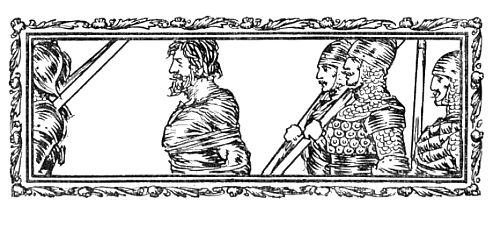
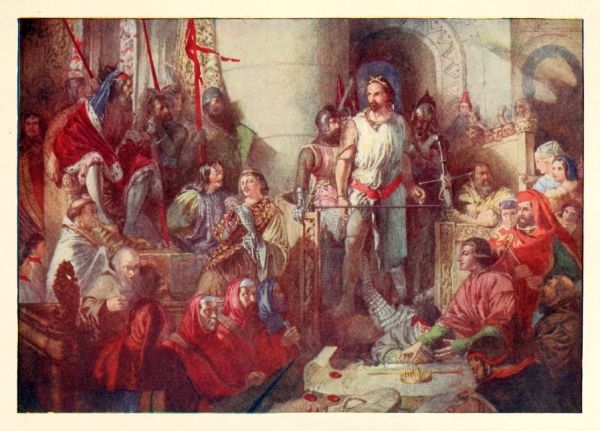
The Trial of Wallace.
(From the picture by Daniel Maclise, R.A., in the Guildhall Art Gallery. By Permission of the Corporation of London.)
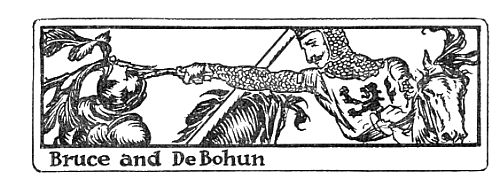
“They thought to die in the mêlée,
Or else to set their country free.”
Not yet may “our stern alarums change for peaceful meetings, our dreadful marches to delightful measures.” Grim-visaged war must still be our portion, if our pageant is to depict the outstanding landmarks in our nation’s story. The victories of peace are for the future; now we must hear again the clash of arms, and share once more the joy of victory and the anguish of defeat.
We are still in Scotland, where a successor to Wallace has arisen even before his scattered limbs have rotted away. The new champion is the grandson of that Bruce whom Edward set aside in favour of Baliol. His father, in the old days, was a friend of “Longshanks,” and young Robert Bruce has been trained in all the arts of war and the exercises of chivalry under the eye of the man whose mortal enemy he is destined to be. He comes upon the scene in the dark days succeeding the judicial murder of Wallace, in those bitter months when England’s iron grip is on Scotland. He sees with deep indignation the wretched condition of his countrymen, and cautiously and secretly lays his plans for throwing off the English yoke. He makes a compact with his friend Comyn, who too has royal blood in his veins; but Comyn is a traitor, and reveals the plot to the English king. Bruce receives warning, and ere long he settles accounts with Comyn. In the church of the Gray Friars at Dumfries the two meet face to face. Angry words pass, and Bruce strikes down his treacherous friend on the very steps of the altar. He rushes outside to his comrades. “I doubt I have slain Comyn!” he cries. “You doubt!” says one of them, “I mak’ siccar;” and entering the church he dispatches the unhappy man with many fierce blows.
And now the Bruce has taken the plunge. There is no turning back; he must go forward to a crown, or suffer the fate of Wallace wight. A few faithful friends stand by him, and he hastens to Scone, the coronation place of Scottish kings. A friendly bishop lends him robes, the abbot provides a chair, and the statue of some saint is temporarily despoiled of its circlet to provide a crown.
The news of the outbreak speedily reaches Edward, and throws him into ungovernable rage. He swears that he will never rest until he has hanged, drawn, and quartered the presumptuous knave who has forsworn his oaths and seized the crown. Edward’s nut-brown hair is snow-white now, and his once mighty arm is weak with age, but his determined spirit burns as fiercely as of yore. An advance-guard is pushed on with all speed, and near Perth it comes into touch with the Bruce, who barely escapes from it.
The Bruce must now follow in the footsteps of Wallace, and wander, a hunted fugitive, over many a league of forest and hill. How true now seem the words of his wife at their hasty and impromptu coronation: “Alas! we are but king and queen of the May, such as boys crown with flowers and rushes in their summer sports.” Deserted and distressed, he lives the life of an outlaw, shooting his own venison and catching his own fish. But he is not sad and gloomy, as Wallace was wont to be. He cheers his little company by many a good-humoured sally and the recital of heroic deeds. Summer passes, and the pageantry of autumn descends upon the woods; but still he is a king without a throne, a wanderer without a home. The wild life of a hunted fugitive may not be borne during the dread winter by the ladies of his company, so he sends them with many a dark foreboding of evil to the care of his brother, and then takes ship for the remote island of Rathlin, off the north Irish coast, where he winters safe from his foes.
Here, in his island retreat, bitter news reaches him. His wife and daughters have been seized and imprisoned in England. His brother and his relatives have been captured and hanged, his estates have been forfeited and given to others, and the Pope has driven him out of the Church for his sacrilege at Dumfries. No wonder the Bruce sits under his juniper tree “steeped to the lips in misery.”
But with the kindly spring he makes another bid for fortune. He sails to the Isle of Arran, and has hardly landed before he well-nigh walks into a trap laid for him. Then begins a fresh period of difficulty and danger, of hairbreadth escapes and desperate deeds. Slowly but surely the tide turns in his favour. The preachers are with him; a prophecy has been discovered which assures him of victory; stout hearts begin to flock to his side; his cause gains ground every day. By the middle of May he is no longer a hunted fugitive but a leader of forces. He has defeated two English earls in the field, and they are shut up in the castle of Ayr, which he is closely besieging.
Now old Edward begins to move. He is too weak and ill to throw his long limbs across a horse, so they carry him on a litter in front of his army. At Carlisle the prospect of the strife he loves so well gives him a slight renewal of strength. He mounts his horse for the last time, and leads the march in the old way. But it is the final flicker of life’s flame, and at Burgh-on-Sands, within sight of the tossing Solway, he yields him to the power that conquers even kings. To his bedside he calls his vain, pleasure-loving son, and bids him swear a solemn oath never to cease from strife until the Scots are thoroughly subdued. “Boil the flesh off my bones,” he is said to have cried, “and keep them safe, and as oft as the Scots assemble their forces, let my bones lead the van.” So he dies, fierce and implacable to the last, and the breath is hardly out of his body ere his degenerate son sighs for his jugglers and minstrels and the careless pleasures of the court he has left behind.
He advances half-heartedly to Ayr; but the Bruce has retreated before him, knowing well the temper of his foe. At the first decent opportunity Edward hies him southward, and Bruce resumes his work of ridding the land of the English. One by one the castles are captured by storm or stratagem; day by day the English power grows weaker and weaker, and the Bruce grows stronger and stronger. At last the flag of England, once to be seen everywhere, flies only over the castle of Stirling. Its stout-hearted defender is almost starved into submission. He will surrender on midsummer day, unless he is relieved before it dawns by an English army.
The new Edward must leave his elegant trifling and bestir himself, unless Scotland is to be hopelessly lost. Hitherto his reign has been singularly inglorious, and his barons have made him, as he says, no longer master in his own house. But he will show them that the spirit of his sire still lives in him. He will invade Scotland, and the Bruce shall feel the weight of his heavy hand. Stirling shall be relieved; he will take up the wager of battle that Scotland has thrown down.
Forthwith he assembles the most powerful army that has ever yet menaced Scotland. Mindful of the archers’ victory at Falkirk, he scours the country for bowmen, and every man of them boasts that he “carries the lives of four-and-twenty Scotsmen at his belt.” Forty thousand mounted men are with him, and a prouder and more confident array never took the field.
Bruce has chosen his ground well. His front and right are defended by the Bannock burn, which winds through two morasses, and at one place has steep, wooded banks. On the left, where the ground is open, he has honeycombed the field with pits that look firm and level to the eye, but are terrible snares for cavalry. Only one way of approach is open, and that is strewn with caltrops to lame the horses.
It is the Sabbath morning of June 23rd, in the year 1314. On comes the English host, with its countless banners, standards, and pennons waving in the breeze. The sun glints from burnished helmet and spear as the dense battalions draw near. To an observer on the castle walls it would seem that they were about to make an immediate attack. The Bruce is arraying his men, clad in full armour, and carrying a battle-axe in his hand, but riding a light palfrey in place of the heavy charger that is to carry him to-morrow. That panoply of armour which he wears hides the real man from you. Were you to see him out of harness, you would mark his strong and powerful frame, his close, curly hair, his full, broad forehead, his high cheek-bones, and the square and massive jaw that tells of determination and dogged courage.
Now the English army halts, and a vainglorious knight, one Sir Henry Bohun, seeing the Bruce so poorly horsed, thinks to do a deed of valorous renown. So he spurs his charger, and levelling his spear bears down upon the Scottish king. As he comes rushing on at full speed, the Bruce twitches his palfrey’s bridle, and the little creature obediently starts aside. Then, as the knight goes rushing by, Bruce rises in his stirrups and smites him fiercely on the helmet with his battle-axe. It crashes through helmet and skull, and the riderless steed gallops wildly away. The first stroke of the great fight has been struck, and the Bruce has won. As he rides back to his lines his knights take him to task for his adventure, reminding him that an accident would have robbed them of their leader. Bruce listens to their chidings, and only replies, “I have broken my good battle-axe.”
Another misfortune befalls the English. Three hundred young horsemen, eager for the fray, see a clear way lying before them to the castle. On they spur towards it, but find their road blocked by a party of Scottish spearmen, who form a deadly circle of bristling steel. In vain the knights spur their horses to the attack; the schiltron remains unbroken, though hidden from sight by the cloud of dust and heat which rises from the plain. Now the spearmen advance and drive back the weary and disheartened horsemen. Grim foreboding this of the great fight to-morrow.
The short summer night falls on the battlefield, and loud sounds of revelry come from the English camp. The Scots sleep in the open, and when the sun has risen Edward sees them massed in schiltrons beneath their banners. “Will yon Scotsmen fight?” he asks of a veteran by his side. “Yea, siccarly, sire,” he replies, and at the moment the Scots bend the knee as the crucifix is borne along their line. “Yon folk kneel for mercy,” says the king; and again the veteran replies, “Yea, sire, but not of you. Yon men will win or die.” “So be it,” cries Edward, and gives the signal for his trumpeters to sound the charge.
On dash the English horsemen with levelled spears, and now you hear the loud crash as lance clangs on shield. Down go men and horses, only to be trodden under foot by the ranks behind. Nothing can break the Scottish ranks.
But where are the archers who wrought such havoc at Falkirk? Now is their time. Alas, they have been badly posted, and are unsupported by men-at-arms. A few hundred Scots horsemen are sufficient to send them flying hither and thither without the hope of ever rallying again.
Meanwhile a great hand-to-hand contest is raging. You hear the shouts and cries of the warriors, the groans of the wounded and dying, the loud clash of meeting weapons, as the vast, dense mass of the English rises and falls like waves of the sea. It is a mob that fights on the narrow field, and not an army. The ground is cumbered with fallen men and horses. Many a good knight has no room to swing his weapon. He cannot advance, and the pressure behind will not let him retreat. But slowly and surely the throng is pushed back by the Scottish spears, and the day looks black for England.
All discipline is now lost, and the battle is a series of individual struggles. Lifting their eyes, the hard-pressed English see a fresh host marching down a neighbouring hill, and hear their slogans peal out above the din and tumult of battle. They are camp followers who have cut down saplings for banner-poles and spread their blankets for standards; but, in sooth, they look a warlike and formidable band in the distance. The hearts of the English fail them at the sight; they waver, and the Scots press on with redoubled vigour. The retreat has begun; it will soon be an utter rout.
The English king gallops to Dunbar without drawing rein. His followers scatter hither and thither. All is over. The great battle is lost and won. The Bannock burn is choked with the dead bodies of the slain; thirty thousand English lie dead on that fatal field. The great task which Wallace had set himself is accomplished. Scotland has won her independence, thanks to the skill of Bruce, the courage of his men, and the incompetence of King Edward. “From the dust and reek of that burning day Scotland emerges a people, firm in a glorious memory.”
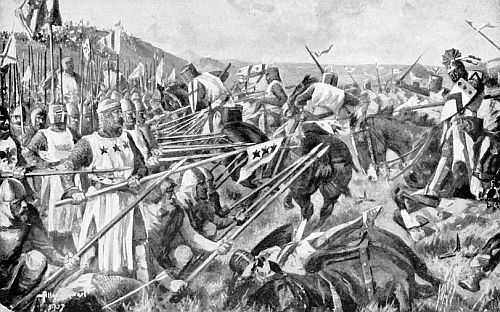
THE BATTLE OF BANNOCKBURN.
(From the picture by Allan Stewart specially painted for this book.)
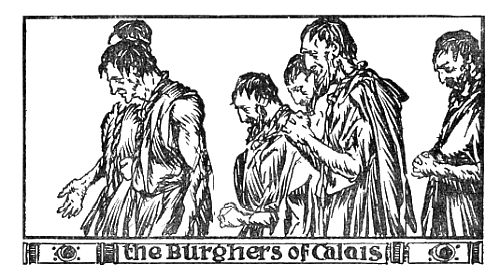
“The quality of mercy is not strain’d,—
It droppeth as the gentle rain from heaven
Upon the place beneath: it is twice blest;
It blesseth him that gives and him that takes:
’Tis mightiest in the mightiest: it becomes
The thronèd monarch better than his crown.”
Now let a tableau lend variety to our pageant. On the dais of a royal pavilion outside the walls of Calais you see a warrior king, his noble countenance transfigured with wrath. Around him are his nobles, and before him kneel six notable citizens of the town, gaunt with long fasting and worn with strife and anxiety. Their heads and feet are bare, and the rope of shame is round their necks. The foremost citizen proffers the keys of the fortress. You are witnessing the surrender of Calais, “the open doorway to France.”
The actual scene which is being re-enacted before you took place more than five and a half centuries ago, and thirty-three years after the battle of Bannockburn. In the interval the English king who fled from that fatal field had been deposed in favour of his young son, who grew up to be one of the most remarkable men of his time. The spirit of the first Edward lived again in Edward the Third, and like a new Alexander he was ever seeking fresh worlds to conquer.
He positively thirsted for martial glory, and above all things he coveted the fair land of France. Through his mother he put forth a claim to the French throne; and though it was scouted by the French lawyers, he meant to see what English bills and bows could do to enforce it. In the year 1345 he shot his bolt, and at Crécy his archers won for him one of the most brilliant victories that ever graced English arms. Then he moved on Calais, and laid close siege to it. Outside the walls he reared a temporary village, which he called Newtown the Bold. It had houses and lodgings roofed with reed and broom, streets, and a market-place where flesh and fish, mercery, cloth, bread, and wine were sold.
Eleven long months the siege endured, and many a time and oft the gallant defenders beheld the approach of French armies coming, as they thought, to their succour. But never did the Frenchmen dare to attack King Edward. They came, they saw, they retreated. Lamentable indeed was the state of the besieged; food failed them, starvation gnawed them, and pestilence swept them away. Then came the hour when all hope departed, and they hauled down the standard which had so long floated above their highest tower.
Shortly afterwards news was brought to the king that the governor was on the battlements, and desired a parley with him. Sir Walter de Mauny and Ralph Lord Bisset were sent to confer with the governor. “Sirs,” said he, “ye be right valiant knights in deeds of arms, and ye know well how the king, my master, hath sent me to keep this town in his behoof. We have done all that lieth in our power. Now our succours have failed us, and we be sore strained; we must all die, or else go mad with famine. I therefore entreat that you will beg your king to have compassion on us, and to have the goodness to let us depart in the state we are in; and that he will be satisfied with having possession of the town and castle, with all that is within them.”
Thereupon the two knights returned to the king and told him all that had passed. But the king heeded them not: the men of Calais should surrender, and he would do with them as he listed. Then Sir Walter braved the royal wrath and told his sovereign that he was setting a very bad example by his severity. All the other nobles who were present pleaded with the king, and at length he yielded in some degree. “Sir Walter,” said he, “you will inform the governor that the only grace he must expect from me is, that six of the principal citizens of Calais march out of the town with bare heads and feet, with ropes round their necks, and the keys of the town and castle in their hands. These six must yield themselves to my will, and to the rest I will show mercy.”
Sir Walter returned to the battlements and told the governor what grace he had been able to obtain from the king. “I beg of you,” said he, “to remain here a little, while I go into the town and tell the townsmen your king’s conditions.” So he went to the market-place, the bell was sounded, and immediately a multitude of men and women gathered in the town hall to hear what he had to say. When they learnt the sad news they began to weep and to show such distress that the hardest heart would have had compassion on them. Even the governor himself was moved to tears.
At last the richest burgess in the town, by name Eustace de St. Pierre, rose up and said, “Sirs, high and low, it would be grievous for so many people to die of famine when there is a means to save them. I think they who should save them from such a pass would have great merit in the eyes of our Lord God. For my part I have so great a trust in Him that I will be the first to offer myself for the rest.” When he had said this, the people rose up and almost worshipped him, many casting themselves at his feet with tears and groans. Then another rich citizen arose and said, “I will keep company with my comrade Eustace.” His name was John Daire. After him, James Wisant, who was also very rich in merchandise, said he would hold company with his two cousins; as also did Peter Wisant, his brother. Then two others offered themselves, and the six citizens, having apparelled themselves as the King of England desired, marched towards the gate.
When Sir Walter Mauny had presented the citizens to the king they fell on their knees and with uplifted hands cried, “Most gallant king, we bring you the keys of the castle and of the town. We surrender ourselves to your absolute will and pleasure, in order to save the remainder of the people of Calais, who have suffered such great pain. Sir, we beseech your grace to have mercy and pity upon us.”
All the barons, knights, and squires that were assembled around wept at the sight. But the king, remembering their piracies, eyed them with angry looks, for he greatly hated the men of Calais. Then he commanded that their heads should be struck off. All present entreated the king that he would be merciful to them, but he would not listen. At last the good Sir Walter made yet another appeal for grace. “Noble king,” he cried, “let me beseech you to restrain your anger. You are rightly famed for greatness of soul; do not tarnish it by such an act as this. Henceforth every man will speak of your great cruelty, if you put to death these burgesses, who have of their own free will offered their lives for their fellow-citizens.”
At this the king scowled and bade them send for the headsman. “These knaves,” said he, “have slain many of my men, and they shall die for it.”
At this moment the good Queen Philippa, who had been weeping bitterly, cast herself upon her knees before her pitiless lord. “Ah! gentle sir,” she cried, “since I have crossed the sea in great peril I have never asked you one favour; now I humbly beg you, in the name of the Son of the Virgin Mary, and for your love of me, that you be merciful to these six men.”
The king looked upon her in silence for a moment, and then replied, “Lady, I would that you had not been here. You have begged of me so earnestly that I cannot refuse you, though it grieves me sore to yield. I give them to you; do with them as you will.”
Joyous and glad was the queen that she had moved the king to pity. She rose from her knees, and bidding the citizens rise too, ordered the ropes to be taken from their necks, and caused them to be new clothed. Then she took them to her own apartments and gave them a plentiful dinner, after which she presented each of them with six nobles and set them at liberty. The town was surrendered, and the English king fed the starving multitudes liberally.
Merciful queen, your generous pity for the stricken foe shall ever be the brightest jewel in your crown. In ages to come men will cherish the fame of your womanly tenderness, and will tell their children in many a tale and song the glorious story of your gracious clemency.
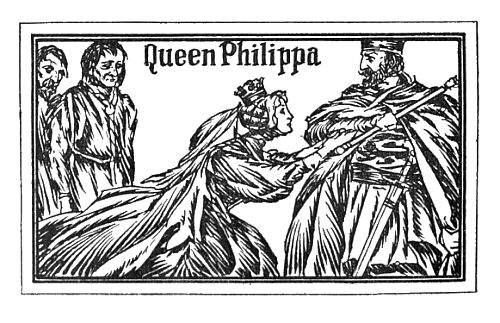
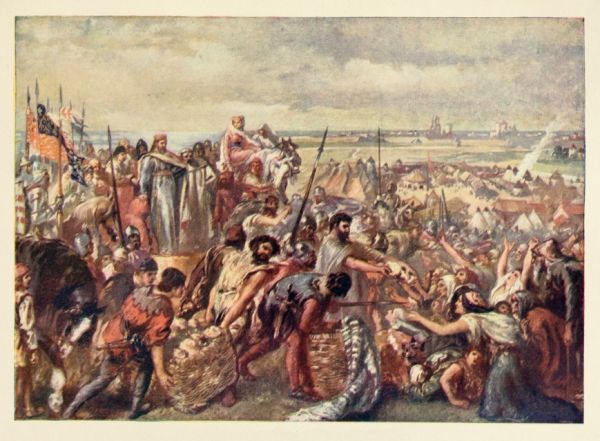
Edward the Third at the Siege of Calais.
(From the painting by Sir John Gilbert, R.A. By permission of the Corporation of London.)
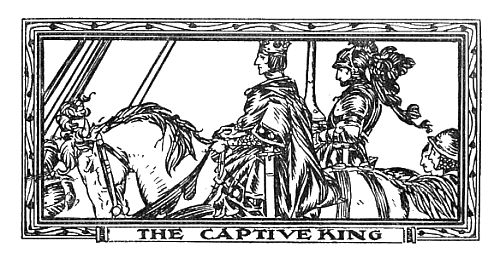
“Witness our too much memorable shame,
When Cressy battle fatally was struck,
And all our princes captived, by the hand
Of that black name, Edward, black prince of Wales.”
Now you are transported to the streets of fourteenth-century London. You stand at the upper window of a lofty timbered house, and from your coign of vantage see the ancient city donning its festive array. There is an air of rejoicing and there is a buzz of expectation everywhere. The houses of the wealthier citizens are hung with gay carpets, rich silks, and fine tapestry. Streamers are flying, garlanded poles are reared, and here and there you see trophies of arms—shields, helmets, breastplates, lances, swords, sheaves of arrows, maces, and battle-axes. Anon you hear the rattle of drum and the blare of trumpet as the City companies, clad in their liveries, take up the places assigned to them. Now a procession of clergy, habited in their richest vestments, winds by. Gay gallants in their blue or green tunics and hoods, their hose of diverse hues, and their Cracow shoes with long, curving toes laced to the knee with silver chains, come and go, and lend colour and vivacity to the scene. Many a fair maiden in a gay kirtle gazes out of her casement with sparkling eyes, and hard by you see no less interested matrons, in all the bravery of their best attire.
Now, afar off, you hear the huzzas of the crowd, and as you watch and wait nearer and nearer come the salvoes of applause. The cannon of the Tower roar out their welcome, trumpets sound, and bells clash from the steeples. Right royally does London greet those whom she delights to honour to-day.
Ah! here come the archers, the pride of England, a goodly array of stalwart yeomen, bronzed and hardened by long campaigning on French fields. Look at them as they swagger along, conscious of their prowess, the rings of conquered knights on their horny hands, and the jewelled baldrics of French nobles across their shoulders. See how they bandy many a merry jest with the maidens on the causeway, and shout their jovial greetings to the citizens, who wave their caps and cheer wildly in response. There is not a lad in London who does not yearn to be an archer. With his six-foot bow in his hand and a sheaf of arrows at his belt, your archer envies neither knight nor king. He has won great fame, and his pouch is filled with rose nobles; and when these are gone, there are plenty more to be won in Poitou and Gascony. And if the Prince—God bless him!—has no more wars on hand, why, there are always the Free Companies ready and willing to welcome a stalwart bowman who can “clap in the clout” at fourscore yards, and use a bill right yeomanly when it comes to handstrokes.
Behind the rollicking archers come the mail-clad knights, a noble and more sedate company, flashing back the May-day sun from their shining armour and their gleaming lance-points. Yonder is Chandos, the wise and watchful general whose keen eye perceived the critical moment in the great fight—he who cried to the Prince, “Now, sir, ride forward, and the day is yours.” And there is Audley, pale and weak from his wounds, but gallant as ever. Was it not he whom the Prince greeted by the glorious name of Preux, and dubbed the best knight on the field? Right proud must he feel to-day. And who be these? In sooth, they are the premier nobles of France, rich prizes of war, though they bear, neither by sign nor by look, the semblance of defeat.
And now the air is rent with still louder shouts as a noble figure on a superb white charger rides by. It is the King of France, bearing himself as a conqueror, yet knowing full well that he is a captive gracing a victor’s triumph. But not for him are the shouts. Look at that simple knight in black armour, quietly riding by his side on a palfrey. He is the hero of the day, the cynosure of all eyes, the praise of all tongues. He would seem to be no more than the French king’s squire; yet he is the victor of Poitiers, a name of terror in France, the idol of his knights, the boast of his archers, the pride of his land.
The stately procession moves on to the great hall at Westminster, where Edward the king waits the coming of his noble captive and his gallant son. With knightly courtesy he rises from his throne and embraces his unfortunate brother of France, and gives him gracious welcome to his court. He bids him be of good cheer; and the French king, who has borne the ordeal with manly fortitude, is right glad that the public parade is over. With gracious tact the English king conceals his triumphant joy; he does everything in his power to play the gracious host to the honoured guest; but nothing that he can do will remove the shame and grief that rack the proud heart of the “Fortune of France.”
Now let us turn to the Black Prince and learn why the Londoners so enthusiastically greet him. He is but twenty-seven years of age, yet he has many a hard-fought campaign to his credit. At thirteen years of age he was made Prince of Wales, and invested with the symbols of his office—the coronet of gold, the ring, and the silver wand. In his honour the king, his royal father, then held a Feast of the Round Table, and from every country of Europe came the most renowned knights to commemorate the fame of King Arthur, and to pledge themselves to emulate his chivalry, his courtesy, and his feats of arms. Never before had there been so splendid a pageant seen as that which King Edward arrayed beneath the ancient walls of Windsor Castle. The Black Prince that day yearned for the hour when he, too, might take spear and shield and break a lance in the tourney as a preparation for winning renown on the battlefield. Long before he was out of his teens he made acquaintance with the dangers and rigours of war in real earnest. In his sixteenth year the longed-for moment arrived. He accompanied his father to France, and as he landed at La Hogue he received the honour of knighthood, though he had yet his “spurs to win.” But forthwith, as the chronicler tells us, he “made a right good beginning” by burning and ravaging the neighbouring country, and by fighting valiantly when Godemar du Fay endeavoured to prevent the English army from crossing the Somme. Then came the never-to-be-forgotten battle of Crécy, in which he won his spurs.
When he rode into London after the battle of Crécy, every man, woman, and child in the great city loved him, and prophesied a wondrous future for him. And they were true prophets, for his fame grew with the years; and now they see him among them once more, victor in his own right, and bringing in his train the “Fortune of France.” What stories of his prowess and gallantry and modesty they tell! Listen to yon burly archer now released from duty. “I mind,” says he, “that after yonder king had yielded himself, the prince led him to his own tent, took off his helmet with his own hands, brought him drink, and gave him comfortable words, and served him at table as he had been a base serving-man and not the heir of Merry England. What think ye of that?”
And now, while all England is singing his praises and he is at the very summit of his fame, let us peep into the future and see what fate has in store for him. Again and again he will harry the fair land of France; and, greedy of warfare, will ally himself with Pedro the Cruel, and win a victory for that bloodthirsty tyrant in distant Spain. And when the victory is won he will beseech Pedro to spare the lives of the conquered. Before long, however, the Spanish king will refuse to pay him the price agreed upon, and will send him on wild-goose errands, until he sees his men fall around him stricken by pestilence, and scarce one in five of them will return with him across the Pyrenees. He, too, will be seized with a painful sickness from which he will never recover.
But still he will go on fighting, and every year his heart will harden within him, until one day he will stain his fair fame by a deed of pitiless cruelty. In his rage at the long defence of Limoges he will order no quarter to be given to the gallant defenders. Piteous appeals will be made to him for mercy; but he will not hearken, and three thousand defenceless men, women, and children will be massacred in the streets. “Pity ’tis, ’tis true.”
His sickness will increase, and he will return home to die, but not before he does something for the people of England in a peaceful and more useful sphere. He will drive from his father’s court the greedy, unscrupulous men who are oppressing the land, and he will strive to better the condition of the people in many ways. Knowing his end is nigh, he will give himself to prayer and good works; his sickness will rack him sore, but he will bear his sufferings patiently and will make “a very noble end, remembering God his Creator in his heart,” and bidding his people pray for him. He will die in his forty-sixth year, to the unbounded grief of the nation. And so he passes, a man of war from his youth up, not untainted by cruelty, not unsullied by martial pride, but, in spite of all, the very mirror of the knighthood of his day.
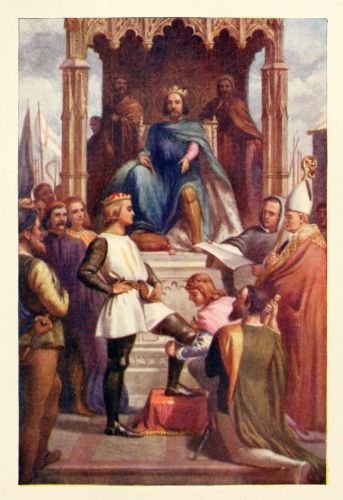
The Black Prince being made a Knight of the Garter.
(From the picture by C. W. Cope, R.A., in Westminster Palace.)
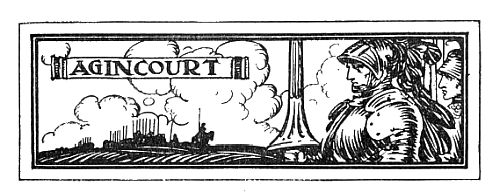
“Now all the youth of England are on fire,
And silken dalliance in the wardrobe lies;
Now thrive the armourers, and honour’s thought
Reigns solely in the breast of every man.”
 OU are gazing upon the death-chamber of a king.
He lies upon his bed in the silent, darkened room,
and sleep comes and goes from his troubled pillow.
Conscience smites him and disease racks his bones. He has
been a man of blood all his days, and many crimes are laid
to his charge. He has murdered the king whose crown he
wears; the blood of an archbishop is upon his head. As
fitful slumber seizes him, you perceive a noble youth enter
the room. Comely is he in face and figure, though he
bears the marks of recent grief. He stands by his father’s
couch, and watches the sufferer. As he does so, his eye
falls on the king’s crown, and he muses on the weight and
cares of majesty. Then he glances again at the prostrate
form on the bed, and a great grief surges into his heart, for,
to all seeming, the king, his father, is dead. He bursts
into tears, and taking up the crown places it on his own
head.
OU are gazing upon the death-chamber of a king.
He lies upon his bed in the silent, darkened room,
and sleep comes and goes from his troubled pillow.
Conscience smites him and disease racks his bones. He has
been a man of blood all his days, and many crimes are laid
to his charge. He has murdered the king whose crown he
wears; the blood of an archbishop is upon his head. As
fitful slumber seizes him, you perceive a noble youth enter
the room. Comely is he in face and figure, though he
bears the marks of recent grief. He stands by his father’s
couch, and watches the sufferer. As he does so, his eye
falls on the king’s crown, and he muses on the weight and
cares of majesty. Then he glances again at the prostrate
form on the bed, and a great grief surges into his heart, for,
to all seeming, the king, his father, is dead. He bursts
into tears, and taking up the crown places it on his own
head.
“My due from thee is this Imperial crown,
Which, as immediate from thy place and blood,
Derives itself to me. Lo! here it sits,
Which God shall guard: and put the world’s whole strength
Into one giant arm, it shall not force
This lineal honour from me: this from thee
Will I to mine leave, as ’tis left to me.”
But while he speaks, the king awakes, and his roving eye sees the crown which his son is even now wearing. “Sire,” cries the young prince, “I never thought to hear thee speak again.” Then the dying king reproves him:——
“Thy wish was father, Harry, to that thought:
I stay too long by thee, I weary thee.
Dost thou so hunger for mine empty chair
That thou wilt needs invest thee with my honours
Before thy hour be ripe? O foolish youth!
Thou seek’st the greatness that will overwhelm thee.
Stay but a little; for my cloud of dignity
Is held from falling with so weak a wind
That it will quickly drop: my day is dim.
Thou hast stolen that which, after some few hours,
Were thine without offence.”
The prince, stricken to the heart by his father’s reproaches, flings himself upon his knees to ask pardon for his presumption, and to assure the king of the innocence of his deed. He swears that no rebel or vain spirit has prompted him to seize the crown.
“Coming to look on you, thinking you dead,——
And dead almost, my liege, to think you were,——
I spake unto this crown as having sense....
Accusing it, I put it on my head,
To try with it, as with an enemy
That had before my face murdered my father,
The quarrel of a true inheritor.”
The dying king gladly accepts his son’s explanation, and blessing him passes away; while the new king, in an agony of grief, swears to throw off the waywardness and wildness of his ways. And so, amidst the loud acclaim of his subjects, the crown is placed for the second time on his head, and he begins to reign. Never king will be better loved; he will give his people their fill of martial glory, and loudly they will boast:——
“Oh, when shall Englishmen
With such acts fill a pen,
Or England breed again
Such a King Harry!”
And now two years have flown, and you see him again following the will o’ the wisp of that French dominion which the third Edward vainly sought. It is easy to pick a quarrel with France; her king has lost his wits, and his selfish kinsmen are tearing the realm in twain with their enmities and quarrels. So with the might of England at his back Harry crosses the Channel, and his great guns begin to thunder before the walls of Harfleur. Before the town falls his army is fearfully wasted by hunger and disease; nevertheless, he does not mean to return without doing a deed that “will dazzle all the eyes of France.” From Harfleur he writes to the Dauphin and offers to fight him man to man for the kingdom, pleading that the quarrel may thus be settled without the shedding of innocent blood. But the sluggish, mean-spirited Dauphin makes no answer, so Harry cries:——
“The game’s afoot;
Follow your spirit, and, upon this charge,
Cry, ‘God for Harry, England, and Saint George.’ ”
It is the evening of October 24th, in the year of grace 1415. Five thousand English bowmen and five thousand men-at-arms, weary, half-starved, wasted, ragged, and footsore, are stumbling on through French fields for Calais, dreaming of the homes they are never likely to see again. Suddenly the news comes in that a huge French army bars the way. Out go the scouts, and one of them, a Welshman, speedily returns with the brave report: “There are enough to be killed, enough to be taken, and enough to run away.” In sooth, there are 60,000 of them, fresh, well-equipped, and in the most confident of spirits; the odds are six to one. “Oh that we now had here but one ten thousand of those men in England who do no work to-day!” cries a noble, but King Harry reproves him,——
“No, my fair cousin:
If we are marked to die, we are enow
To do our country loss; and if to live,
The fewer men, the greater share of honour.”
So the night rolls down, and the English few betake themselves to prayers; while in the French camp the knights are revelling and feasting and dicing for the ransoms of the captives they hope to take on the morrow. The morning sun sees the English army drawn up in a field of freshly-sown corn, face to face with the French host, that stretches across the plain by the hamlet of Agincourt. Every archer carries a five-foot stake as a protection against cavalry; every man of them is stripped to the waist, and has one shoe off, the better to keep firm footing on the slippery ground.
And now the gallant king, in full armour, with a jewelled crown glittering on his helmet, rides along the ranks. He prays aloud for victory, and turning to his men bids them fight boldly, for God is on their side. England, he declares, shall never pay ransom for him; he will conquer, or leave his bones on the field. Then he reminds his archers that their foes have sworn to put out the right eye and cut off the left hand of every bowman whom they capture, so that he shall never loose arrow again. A momentary hush falls on the English as they kneel to commend their souls to high heaven. Then their lips tighten, their thews and sinews become steel, and their hearts bound in expectation of the fray.
“What time is it?” asks the king. “The bells are ringing prime, my lord,” is the reply. “Now is good time,” says he; “England prayeth for us, so let us be of good cheer. Banners advance!”
With a loud shout the English bowmen advance twenty paces, and firmly plant their stakes to form a formidable palisade. On come the heavy-armed cavalry of the enemy in dense masses, thirty deep. The archers step forward a few yards, and slowly and steadily begin to shoot. Not an arrow is wasted; every shaft flies home. To stand still on the French side is to be shot down like a dog; to turn back is impossible with the huge press of soldiery behind. So, as the death-hail falls, the French men-at-arms spur their heavy chargers through the mire of the freshly-ploughed field. The deadly arrows never cease to fall, and down go horse and man until they lie in ghastly heaps two spears high. The French army is a helpless, heaving mass.
“Now’s the day and now’s the hour” for the English archers. They sling their bows on their backs, they leap forward, and throwing themselves on the struggling heaps ply sword and mace, axe and bill, with almost superhuman strength. The living fall on the dead, the dead on the living, and the English climb the horrible, writhing mounds and hew and hack at the high-born French knights. King Harry is in the thickest press. Certain French knights swear to take or slay the English king. They hew their way to him; a shrewd blow slices the crown from his helmet, but it is the last blow ever struck by that arm.
The first line is swept to earth, the second line has fallen like wheat before the reaper’s sickle, and now the third line advances. Taken in flank by the archers, it turns and flees. In three hours the battle is over. Eleven thousand Frenchmen lie dead upon the field, prince and peasant “in one red burial blent.” Agincourt is won, and the English archer has gained a renown that shall not dim its lustre while the name of Britain endures.
Once more King Harry is in France, and again none may stand against him. Rouen, after horrible sufferings, has surrendered; the French princes are busy murdering one another; the young King of Burgundy throws in his lot with the English, and the kingdom is at Henry’s feet. So a treaty is made: Henry is to marry the fair Katherine, daughter of the poor, witless King of France; he is to rule in his father-in-law’s name, and succeed him at his death. So Henry begins his wooing, and right merrily it goes despite his bad French and Katherine’s broken English. On Trinity Sunday in the year 1420 he leads the princess to the high altar of the church at Troyes, and they are married. Then the hero of Agincourt and his bride enter Paris amidst the approving shouts of the populace, many of whom wear the red cross, the badge of England. But a third campaign is necessary before the French and their Scottish allies are beaten and all north France up to the Loire owns Henry’s sway.
And now, in the midst of his splendour, his health fails, and the doctors are mystified at his malady. As he sinks day by day, he learns that a son has been born to him at Windsor. At once an old prophecy flashes into his mind——
“I, Henry, born at Monmouth,
Shall small time reign and much get;
But Henry of Windsor shall long reign and lose all.
But as God wills, so be it.”
His last hour has come. He busies himself with prayer, and the priests sing psalms over him. When they reach the second verse of the 147th Psalm he cries, “Good Lord, Thou knowest that my mind was to build up the walls of Jerusalem.” He speaks no more. His life is done; his comet-like career is over. So he dies, leaving his infant son to reap the bitter harvest that he has sown.
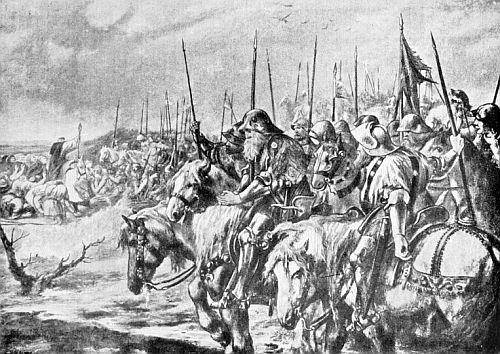
THE MORNING OF AGINCOURT.
(From the picture by Sir John Gilbert, P.R.A.)
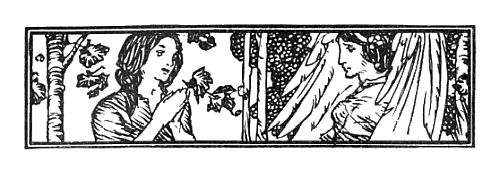
“King of France!”
She cried, “at Chinon, when my gifted eye
Knew thee disguised, what inwardly the spirit
Prompted, I promised, with the sword of God,
To drive from Orleans far the English wolves
And crown thee in the rescued walls of Rheims.
All is accomplished. I have here this day
Fulfilled my mission, and anointed thee
King over this great nation.”
Seven years have sped by, and the scene shifts to the ancient cathedral of Rheims. A great concourse of nobles in glittering armour with pennons and banners fills the nave. Trumpets are sounding, and outside the crowd raises cheer upon cheer. The sun streams in through the painted windows, casting rainbow hues on the exultant throng. Ten thousand candles are burning, and the smoke of incense is ascending. At the high altar, clad in the ermine robe of state, kneels the Dauphin of France. An archbishop, wearing his mitre and the splendid robes of his high office, places the crown upon the prince’s head, and anoints him with the sacred oil out of the ancient flask which the priests say came straight from heaven. The Dauphin is king in very deed, and a great shout of joy echoes and re-echoes from the vaulted roof. And now all eyes turn to the striking figure by the side of the newly-made king. You see a noble maiden, clad in knightly armour, and holding a drawn sword in one hand and a white banner in the other. She kneels at her prince’s feet, and tears of joy fall from her eyes as she greets him “King” for the first time. “Now,” she says, “is the will of God fulfilled.”
Who is this maiden, and why holds she such an honoured place amidst this noble throng? Let the old chroniclers relate her story. It is one of the most wondrous ever told. What Wallace did for Scotland this maid has done for France.
In the year 1429 there was a young girl living in Domremy, a village in the east of France. She was named Joan, and was the daughter of James Darc and Isobel, his wife. Joan was but a country maid that was wont to herd the cattle by day and sew and spin in the evening. She was a strong, handsome girl, nobly formed, with dark hair and lustrous eyes. About her thirteenth year she grew silent and dreamy, and loved to steal away from her companions to the village church, where she knelt for hours together in silent prayer. One day she was standing in her father’s garden when she heard a Voice, and saw a great light. The Voice bade her be diligent in work and prayer, for God had chosen her to save France. She replied that she was but a poor girl who could not ride, or lead soldiers in the wars; but the Voice spoke to her again and again, telling her that she must go. The saints appeared to her, too, and they gave her the same message, and added words of counsel and warning. The Visions and the Voices were with her night and day, and at length she felt that she must do their bidding.
Truly her land was in a piteous condition at the time. King Harry of England was dead, and so was the old French king, his father-in-law, and the English baby born at Windsor had been crowned King of France. His uncle, the Duke of Bedford, the famous Talbot, and many another knight of renown, were leading English armies to and fro, besieging towns, burning villages, and filling the land with slaughter. Woeful tales of death, plunder, and famine found their way to the quiet little village of Domremy, and Joan’s heart was filled with grief at the miseries of her beloved France. The Scots had come to the help of their old friends, the French, and though they managed to win a great victory, they were badly beaten at Verneuil, where the field was dyed with Scottish blood.
As for the Dauphin, the rightful King of France, he only held the country south of the Loire, and did not hold even that securely. His strongest fortress was the city of Orleans, which was even now closely besieged by the English. To make matters worse, the Dauphin was a man of no spirit and enterprise. He was half-hearted in his own cause, and, indeed, was not fully assured that he was the son of the late king, and therefore lawfully entitled to the crown. It is said that he had prayed secretly that a sign might be given to him to prove that he was the rightful heir, and that hitherto no sign had been vouchsafed. He had very little hope of beating the English, for, like the rest of his countrymen, he had lost heart and deemed his foes unconquerable. A handful of English archers by their very presence could send five hundred Frenchmen flying in terror to the woods.
By this time the Voices and the Visions had so wrought upon the Maid that she left home without taking leave of her father and mother (not that she did not hold them in honour and respect, but lest they should hinder her intent), and went to Vaucouleurs hoping for an audience with Robert de Baudricourt, the commander of the town. Now, her uncle lived in the town, and to him she betook herself, and told him how the saints and angels had urged her on her mission, and how the Voices had said, “Daughter of God, go on! We will be with you.” The uncle listened and believed, and led her to the captain, who laughed at her, and bade her uncle chastise her for a foolish maiden.
But again she came to him and told him how a terrible misfortune had happened that very day to the Dauphin’s army near Orleans. As Vaucouleurs was many leagues from Orleans, and even the swiftest runner could not have brought the news so quickly, the captain gave ear to her; and when he knew that she had spoken the truth, he saw that she was no mere hysterical country girl, but one endowed with supernatural gifts. “My lord captain,” she said, “know that for some years back, at divers times, God hath made known to me and commanded me to go to the gentle Dauphin, who should be and is the true King of France, that he may give me men-at-arms, whereby I may raise the siege of Orleans, take him to be anointed at Rheims, win back Paris, and drive the English from the realm.” Robert hearkened to her words, and furnished her with man’s attire. A young knight gave her a horse, which to the surprise of all she rode well; and, dressed in a gray doublet and black hose, she rode away to seek the Dauphin, who was then at Chinon. To test her, the Dauphin dressed one of his knights in his princely attire, and himself, in a plain and sober dress, mingled with his courtiers. But Joan went straight to him, and kneeling on one knee, cried, “Fair sir, you are the Dauphin, to whom I am come.”
“Nay,” said he, “yonder is the Dauphin,” pointing to a richly-dressed knight in the company.
“No, fair sir,” repeated the maid, “it is to you that I am sent.”
The Dauphin was surprised, but he did not yet believe in her. One day she took him aside where nobody could hear and whispered to him the purport of his secret prayer, and assured him that he was the rightful king. Then the Dauphin had faith in her, and when his council and the clergy had examined her straitly, and at last had reported that “to doubt the maid would be to resist the Holy Spirit,” he agreed to send her with a train of provisions which he hoped to be able to get secretly into Orleans. While armour was being made for her, she bade the Dauphin’s servants dig behind the altar of the Chapel of St. Catherine at Fierbois, and there they would find a sword with five crosses on the blade. The sword was found, and she girt herself with it, and taking her banner of white with the image of the Lord and two angels on it, thus she led her small company towards Orleans.
As she lay at Blois she sent a letter to the English captain who was besieging Orleans, bidding him depart in peace, or else she would fall upon him with blows, and “we shall see who hath the better right, God or you.” The English laughed at her words, and threatened to burn her as a witch if they caught her. Nevertheless she advanced, and entered the town, whereat the spirits of the citizens rose and their confidence returned. And now, being strengthened by fresh troops and fresh stores, they no longer acted merely on the defensive, but began to assault the English forts, and with Joan as leader captured two of them. Then Joan led them against the Bulwark and the Round Towers. All morning they fought without success, and at one o’clock in the afternoon a bolt from an English cross-bow wounded her in the shoulder. The arrow was extracted, and still the fight went on.
After sunset the captain wished to withdraw for the night, but Joan begged him to fall to again. She mounted her horse and rode to a quiet place and prayed, and then returned to the fight. She alighted from her horse, and taking her standard in her hand, waved it to and fro so that all men saw it. “Take heed,” she said, “when the float of my banner shall touch the Bulwark.” “It touches! it touches!” they cried. Then said she to her men, “All is yours; enter in.”
With a great rush the French climbed the scaling-ladders, captured the Round Towers, stormed the Bulwark, and put to the sword most of the defenders. That night the English, terrified by the reappearance of the Maid, raised the siege and departed, leaving their big guns and much victual behind them. So the town of Orleans was delivered, and Frenchmen everywhere began to believe that the Maid was really an angel of God sent to deliver France.
Without delay Joan rode to the Dauphin and besought him to make ready to be crowned at Rheims, the old coronation place of the French kings. But he would not set forth until the way was cleared of English. So with six hundred lances and some infantry Joan led an attack on them, and drove them before her. And now in June the Dauphin at her entreaty gat him on the road for Rheims, Joan warning him that “she would only last for a year, or not much longer, and that he must make haste.” At Troyes the garrison yielded, and ere long the Dauphin was in Rheims, and the scene in which you saw the Maid for the first time took place.
Hardly was the coronation over ere Joan urged the king to march on Paris. As he advanced, town after town opened its gates to him, and Bedford dared not give him battle. But when the first attack on Paris failed, he withdrew, like the coward that he was, and would not persevere, in spite of all Joan’s prayers and tears. Almost broken-hearted, she hung up her arms in the church of St. Denis, and begged leave to go home to her father and mother and herd the cattle as of yore. The king, however, would not let her go, but gave her a pension and a title of nobility.
Now in Easter week of this fateful year the Voices spoke again to her and said that she should be taken prisoner before Midsummer Day. They encouraged her to be resigned to her fate, for God would help her. The Maid knew full well that to be captured meant being burned as a witch; nevertheless she halted not in her purpose, deeming her end glorious if only she could give her body to be burned for her country.
The town of Compiègne was closely besieged by the English and the Burgundians, and was likely to yield. So the Maid rode thither with her brothers and two or three hundred men to raise the siege. She charged the Burgundians, but was surrounded and taken prisoner and held to ransom. The French would not pay a franc for her, and so her captors sold her to the English, who “feared not any captain, not any chief in war, as they had feared the Maid.” She was brought before the Bishop of Beauvais and tried for witchcraft. After a long and tedious trial, and after suffering every kind of insult and hardship, she was found guilty, and was tricked into signing a paper confessing her guilt. And all the time the miserable French king made no sign, and lifted not his little finger to save her.
On May 30, 1431, they led her into the market-place of Rouen and burnt her alive. With her dying words she testified to the truth of her Visions, and underwent her awful doom with the courage of a martyr. So she died, pressing to her lips a rude cross which a pitiful soldier held out to her. The old legends tell that as the flames leaped round her, and her spirit departed, a pure white dove, the harbinger of peace, rose from out the smouldering pile and winged its way towards heaven. In very truth peace did spring from her ashes. Her heroic example gave new life to the crushed spirit of her countrymen, who rose and drove the invader from their shores. Four years later, nothing was left of all the English conquests in France but the town of Calais.
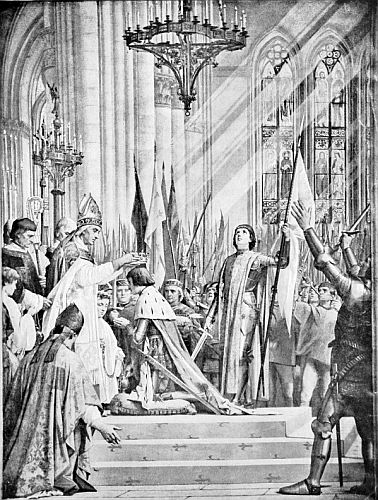
THE CORONATION OF CHARLES VII. AT RHEIMS.
(From the painting by J. E. Lenepveu in the Pantheon, Paris.)

JOAN OF ARC STORMING THE “BULWARK” (ORLEANS).
(From the painting by J. E. Lenepveu.)
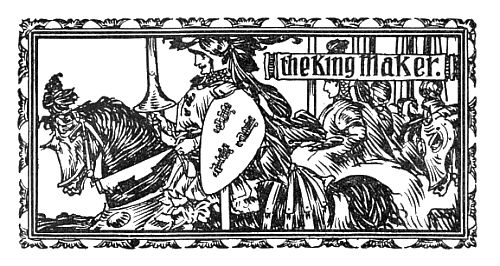
“Heard ye the din of battle bray,
Lance to lance, and horse to horse?
Long years of havoc urge their destined course,
And through the kindred, squadrons mow their way.”
 GREAT noble now rides by on a magnificent coal-black
steed. At once your eye is attracted by
him, and you feel that here is a Paladin worthy of
the pen of poet and romancer. Mark his great stature;
his vast width and depth of chest; his high forehead; his
black, curling hair fretted from the temples by the friction
of his helmet; his handsome oval face; his bold features;
and his massive jaw, which speaks only too plainly of his
masterful nature and inflexible determination. You can
readily believe that he is the idol of thousands of his
countrymen, and “a setter up and plucker down” of kings.
GREAT noble now rides by on a magnificent coal-black
steed. At once your eye is attracted by
him, and you feel that here is a Paladin worthy of
the pen of poet and romancer. Mark his great stature;
his vast width and depth of chest; his high forehead; his
black, curling hair fretted from the temples by the friction
of his helmet; his handsome oval face; his bold features;
and his massive jaw, which speaks only too plainly of his
masterful nature and inflexible determination. You can
readily believe that he is the idol of thousands of his
countrymen, and “a setter up and plucker down” of kings.
Who is this remarkable man? He is none other than Richard Neville, Earl of Warwick, the richest and most powerful noble in England. Thirty thousand men eat his bread daily at the tables of his various great castles; his retainers alone constitute an army, all clad in scarlet coats with the “ragged staff” worked on back and front. His boundless wealth, his profuse hospitality, his great family connections raise him head and shoulders above his peers. He is the premier noble of England, the arbiter of her destinies, and the “last of the barons.”
He lives in an age of battle, murder, and sudden death. His land is torn by the long and fierce quarrels of two great families which are selfishly and ruthlessly fighting for the crown. Henry the Sixth, a mild, merciful, long-suffering, pious man, weak of health and weak of purpose, a hater of strife and bloodshed and a lover of religion and learning, sits insecurely on the throne, bolstered thereon by his strong-willed, indomitable queen, Margaret of Anjou. He is the grandson of that Lancastrian king who thrust from the throne the grandson of Edward the Third. His hereditary right to the crown is inferior to that of Richard, Duke of York; but his family has now been in possession of the throne for more than half a century, and the brilliant victories of his father have made men proud of the Lancastrian lineage. But feeble son has succeeded valiant sire. France has been lost; there is no child to succeed him; and he is surrounded by ambitious, quarrelsome nobles, who make him a pawn in their selfish game. Already the great houses of the realm have taken sides, and are sporting either the red or the white rose. The citizens of London, the wealthy traders and craftsmen now rising into a powerful caste, throw in their lot with York, and the yeomen of the South and Midlands are for him too. And now, in the year 1453, the poor king goes mad, and York is made Protector of the realm. He quite expects to be king when Henry passes away.
But a new arrival comes on the scene to dash all his hopes and force him to the arbitrament of the sword. Queen Margaret bears a son, Henry recovers, and York is dismissed from his post. He appeals to his friend the great Warwick, and soon a large force rallies to his standard. The rival armies meet at the old town of St. Albans, but ere the fight begins York seeks the king and endeavours to make terms. But Henry, who is as clay in the hands of his implacable wife—“the foreign woman” as the English folk call her—is for the moment moulded into something resembling courage. “I will live and die this day in the quarrel,” he exclaims, and York is cavalierly dismissed. The royalists barricade the streets, and bid the foe come on. The great earl by skilful generalship breaks into the gardens behind the houses, and his archers gain the streets with trumpets blowing and the war-cry “A Warwick! a Warwick!” A tough street fight follows, but it is soon over. The king’s chief supporter is dead, and he himself is in the hands of York. The wars of the Roses have begun, and for more than thirty years the realm will be plunged in a civil war so ghastly and unrelenting that even now it marks the blackest page in our national history.
Not that the people generally will join in the strife. The family feuds of great nobles concern them but little; they merely desire peace and good government, that they may till their lands, labour in their workshops, buy and sell, and fill their exhausted purses without distraction. Right willingly would they let the sword rust in its scabbard and the unstrung bow hang idly on the wall. But the land is full of men who have made war their trade in France, and they are eager to be hired for any adventure that is going. These roving mercenaries, the gentry, and their hosts of retainers constitute the armies which will maintain the long and bitter contest. But despite the bloody duels of factious nobles, the business of the country is not interrupted. The judges go on circuit as of old, taking their commissions from whichever king is in the ascendant; and the peasant pauses in his hillside furrow and leans on the handles of his plough to view the nobles of the land dashing themselves to pieces in battle on the plain below. The war is a war of nobles, and not of the commonalty.
The wild northern levies triumph, and the king is recovered. Then Margaret arrays her prisoners, and sets up the little prince, her son, to judge them. “Fair son,” she cries, “what deaths shall they die?” and the lad forthwith orders their heads to be struck off. The wild, lawless host tarries eight days at St. Albans, and this delay enables Warwick to unite with the new Duke of York and reach London. The king and queen gain nothing from their victory. They are forced to march north, and the Londoners, glad to be saved from Margaret and her Border freebooters, welcome York’s heir, and sing:—
“He that could London forsake, we will no more to us take.”
They crown the young man at Westminster, and as Edward the Fourth he takes up the sceptre. It is Warwick who has made him king.
Now comes the story of a great quarrel and its dramatic sequel. Edward has fallen in love with beautiful Elizabeth Woodville, the daughter of a Red Rose father, and the widow of a Red Rose husband. He marries her secretly, and all the while Warwick is negotiating a foreign marriage for him with the French king’s sister. When Edward’s marriage to Elizabeth Woodville is announced, Warwick’s annoyance and disgust know no bounds. He dissembles, however, though day by day he grows angrier and angrier as he sees power slipping from him and passing to the “upstart” relatives of the new queen.
Edward, instigated by his new domestic circle, is bent on throwing off the Neville yoke. So he heaps honours, high offices, lands, and wealth on the Greys and the Woodvilles, and Warwick is furious. Such treatment he will not brook. He who has set up the king can pull him down again. So he seeks “false, fleeting, perjured Clarence,” who is now jealous of his brother, the king, and eager for a throne. Clarence marries Warwick’s daughter, and the strings of insurrection are vigorously pulled by the wily earl. Edward rouses himself at last and hastens northward, where his cannon soon put the rebels to flight, and their captured leader reveals Warwick’s plot to make Clarence king. At once the pair of conspirators flee to France.
Warwick and that crafty intriguer, Louis the Eleventh, now concoct a plan for driving their common enemy, King Edward, off the throne, and restoring Henry the Sixth. Queen Margaret at first indignantly refuses to accept the support of the man who has driven her into exile, and cast foul aspersions on her character; but Warwick goes on bended knee to her, and withdraws every charge. The queen keeps him in this humiliating position for a quarter of an hour, and then relents. She agrees that her son shall marry Warwick’s daughter, but only when he has restored Henry to his throne. Then the king-maker, who has broken so many solemn oaths, swears on a piece of the true cross to remain faithful to the Lancastrian cause. A fleet is fitted out, Warwick lands at Dartmouth, proclaims King Henry, and summons the national levies to his banner. As Edward lies in bed at Doncaster, two friends burst into his chamber and bid him rise and flee, for his foes are within an hour’s march. He flings on his clothes, and without armour or money rides at breakneck speed to Lynn, where he sets sail for Holland. Once more the king-maker has made and unmade a king.
The old king is clad in a robe of blue velvet, brought out of the Tower, set on horseback, and led to St. Paul’s amidst crowds of Londoners who shout “God save King Henry.” The poor old king knows full well that the proud noble who bears his train in the state procession is his and England’s master, and that he must do his bidding or return whence he came. Warwick has again triumphed, but his hold on power is far from secure. The Lancastrians have no desire for a puppet king whose strings are worked by their old enemy, and the Yorkists are busy preparing for the return of Edward. Next spring he appears in the Humber, and pushes on to London, where the gates are opened to him, and he secures the person of King Henry. Warwick is in battle-array to the north of Barnet, his forces “under a hedge-side.” Clarence, who has made peace with his brother, offers mediation; but Warwick, angry at his double faithlessness, contemptuously rejects his advances.
“Last scene of all, to end this strange, eventful history.” Raw, cold, and dismal dawns the morning on Easter Sunday in the year 1471. A heavy mist, which many a soldier ascribes to magical arts, rolls over the field and hides the opposing armies from each other. The battle begins, and men fight as in a dream, striking wildly at each other, and scarce distinguishing friend from foe. Now Warwick thinks the day is his; now Edward believes victory to be in his grasp. Then comes a lift of the cloud, and both generals perceive that their hopes are vain. For three hours the desperate fight rages; the bombards roar, and sword and arrow do their deadly work. Now deluded by the mist, the two wings of Warwick’s army are busy fighting each other, and the fatal cry “Treason! treason!” is heard on the field. Warwick’s men give way, his brother is slain, and there is only safety for the great earl in flight. He leaps on horseback and gallops to a neighbouring wood, from which there is no egress. He is followed and surrounded, and though he plies his great battle-axe fiercely he is overborne by superior numbers and slain. The king-maker will never make or unmake kings again.
“Now lies he there,
And none so poor to do him reverence.”
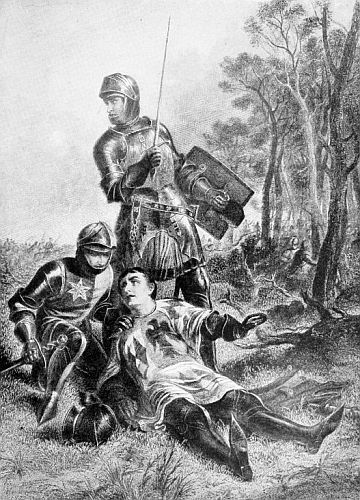
DEATH OF WARWICK.
(From the picture by T. A. Houston, R.S.A.)
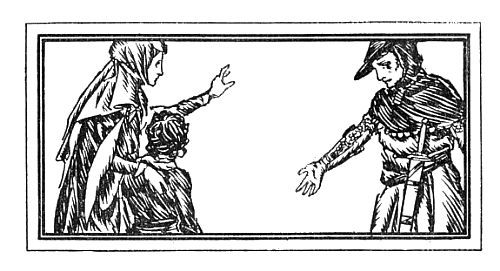
“Let us sit upon the ground
And tell sad stories of the death of kings.”
Now hand in hand two pathetic figures appear. They are victims marked for the slaughter; their tender age and innocence will not save them, for they stand between a bold, unscrupulous man and the throne. You have already made acquaintance with their father, the fourth Edward, he who owed all to the king-maker, whom he left dead on Barnet Field. But Edward has gone to his account, leaving his two young sons and their mother to the tender mercies of selfish, intriguing nobles, brutalized by a long course of civil war. As Protector of the realm, their father’s brother, Richard, Duke of Gloucester, aims at the throne, and his first step is to secure the custody of the two royal lads, who are now in the guardianship of their maternal uncle, Earl Rivers, and of Lord Richard Grey. The elder—a boy of thirteen—is seized and brought to London by his Uncle Richard, while the lad’s guardians are flung into prison. The false uncle treats his young charge with every show of loyal and submissive regard, and brings him in great state to London for his coronation. The wretched mother knows instinctively the fate in store for her offspring, and takes sanctuary at Westminster with her second son, the little Duke of York, a boy of eleven years of age. With fair and specious words a prince of the Church persuades the widow to surrender the lad, and forthwith he joins his brother in the Tower.
And now Gloucester ruthlessly hurries to the block those who by the ties of kindred and friendship are likely to befriend the boys, and ere long no man dares raise his voice against any of his bloodthirsty acts. He is a dictator—and dictators easily develop into kings. His minions offer him the crown, which, after a slight show of refusal, he accepts. Then with consummate skill he proceeds to bolster up the throne which his successful villainy has won. He is crowned with great pomp and ceremony, and soon after the little princes disappear. What becomes of them is not clearly known, but gradually a rumour spreads that the unnatural uncle has done them to death. His crime profits him little; a great wave of pity for the untimely fate of the unhappy boys swells up in the land, and men recoil in horror from a murderer king. Two years later avenging justice smites him; he lies dead on the battlefield, and another fills his throne.
Sir Thomas More, writing twenty-eight years after Richard’s death, tells the story of the crime, and there is no good reason to dispute its substantial accuracy. He tells us that the king plotted the death of the young princes while making a holiday progress through the country. From Gloucester he dispatched one of his pages to Sir Robert Brackenbury, the governor of the Tower, commanding him to make away with the lads quietly and speedily. Brackenbury indignantly refused the office of assassin, but a more facile tool was found in Sir James Tyrell, who had already stained his hands in secret crime. The princes were confined in the Portcullis Tower, under the constant supervision of four keepers, their personal attendant being a fellow known as Black Will or Will Slaughter.
Richard roused Tyrell from his bed at midnight, and sent him to the Tower with an order commanding Brackenbury to give up the keys of the fortress. “Then,” says Sir Thomas More, “Sir James Tyrell desired that the princes should be murdered in bed, to the execution whereof he appropriated Miles Forest, one of their keepers, a fellow flesh-bred in murder, and to him joined John Dighton, his own horse-keeper, a big, broad, square knave. The young king had certainly a clear apprehension of his fate, for he was heard sighingly to say, ‘I would mine uncle would let me have my life, though he taketh my crown.’ After which time the prince never tied his points nor anything attended to himself, but that young babe, his brother, lingered in thought and heaviness till the traitorous deed delivered them from their wretchedness.
“All their other attendants being removed from them, and the harmless children in bed, these men came into their chamber, and suddenly lapping them in the clothes smothered and stifled them till thoroughly dead. Then laying out their bodies on the bed, they fetched Sir James to see them, who caused the murderers to bury them at the stairfoot, deep in the ground, under a heap of stones. Then rode Sir James in great haste to King Richard, and showed him the manner of the murder, who gave him great thanks.”
More than two centuries later the skeletons of two young lads were found under a staircase leading to the chapel in the White Tower. In all probability they were the mortal remains of the unhappy princes.
On the eve of the battle which resulted in the overthrow and death of the murderer king, Shakespeare depicts him as visited by the ghosts of the many whom he has foully slain. The spirits of the murdered boys appear hand in hand:—
“Dream on thy cousins smothered in the Tower:
Let us be lead within thy breast, Richard,
And weigh thee down to ruin, shame, and death.
Thy nephews’ souls bid thee despair and die!”
And thus do they hearten the avenger, whose forces are even now marshalled on Bosworth Field:—
“Sleep, Richmond, sleep in peace, and wake in joy;
Good angels guard thee from the boar’s annoy!
Live, and beget a happy race of kings.”
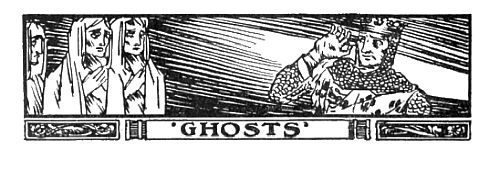
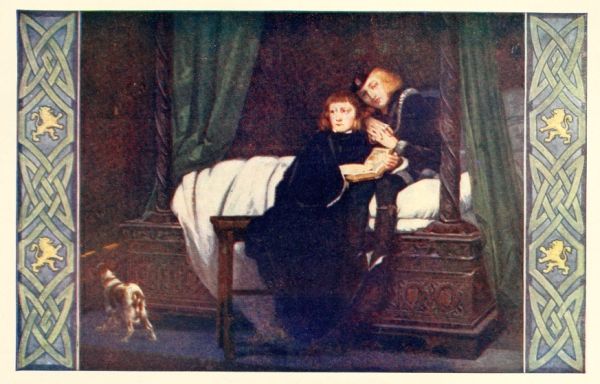
The Little Princes in the Tower.
(From the picture by Paul Delaroche.)
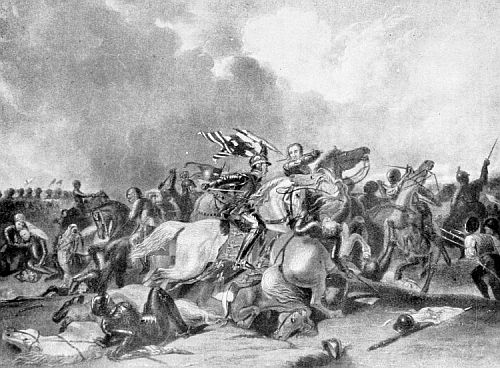
RICHARD III. AT THE BATTLE OF BOSWORTH.
(From the picture by A. Cooper. By permission of Messrs. Henry Graves and Co.)
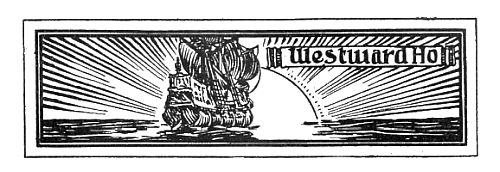
“The white man landed;—need the rest be told?
The New World stretched its dusk hand to the Old;
Each was to each a marvel, and the tie
Of wonder warmed to better sympathy.”
 OW the procession halts, while a momentous scene is
enacted before our eyes. We are in the old seaport
of Bristol, on a May morning in the year 1497,
treading the rough cobbles of the quay whereat the good
ship Matthew and her consort lie. Stout, staunch vessels
they are, fitted out and provisioned for the most adventurous
voyage ever undertaken by Bristol ships. The royal blazon
glistens on their mainsails, the flag of England flies from
their mastheads. Some of the boldest and most skilful
mariners in the land are on board, busy making everything
ship-shape, “Bristol fashion,” for the voyage which is to
begin to-day. Now you see a procession approaching.
The Lord Mayor in his robes of state, with his chain of
office about his neck, leads the way, and behind him troop
the city fathers; then comes the bishop, with his attendant
train of priests; and behind them, the observed of all
observers, you see a father and his three sons. They are
John, Lewis, Sebastian, and Santius Cabot—the father a
citizen of Venice, the sons men of Bristol. The old city is
saying farewell to them to-day, and the lusty cheers that
greet them as they traverse the narrow streets show how
deeply every Bristol man is interested in their enterprise.
What is this enterprise? Whither are they bound?
OW the procession halts, while a momentous scene is
enacted before our eyes. We are in the old seaport
of Bristol, on a May morning in the year 1497,
treading the rough cobbles of the quay whereat the good
ship Matthew and her consort lie. Stout, staunch vessels
they are, fitted out and provisioned for the most adventurous
voyage ever undertaken by Bristol ships. The royal blazon
glistens on their mainsails, the flag of England flies from
their mastheads. Some of the boldest and most skilful
mariners in the land are on board, busy making everything
ship-shape, “Bristol fashion,” for the voyage which is to
begin to-day. Now you see a procession approaching.
The Lord Mayor in his robes of state, with his chain of
office about his neck, leads the way, and behind him troop
the city fathers; then comes the bishop, with his attendant
train of priests; and behind them, the observed of all
observers, you see a father and his three sons. They are
John, Lewis, Sebastian, and Santius Cabot—the father a
citizen of Venice, the sons men of Bristol. The old city is
saying farewell to them to-day, and the lusty cheers that
greet them as they traverse the narrow streets show how
deeply every Bristol man is interested in their enterprise.
What is this enterprise? Whither are they bound?
Any urchin in the streets will tell you. “Why, master, have you not heard of the Genoese seaman, Christopher Columbus?—he who five years ago set sail from Palos in three ships, and sailed to the west’ard across the ocean, seeking a new sea-road to far-off India and Cathay. Do you not know that he lighted on marvellous new lands, which he seized in the name of Spain, and then returned home to tell the wondrous news? There’s gold by the bucketful across the Western Ocean, and we Bristol folks mean to have our share of it. So we have fitted out the Matthew and the other ship which you see yonder, and this very day John Cabot and his sons are to set sail. Would that I could sail with them too!” Many an English lad, in many a seaport, echoes his wish.
“Westward! westward! westward!
The sea sang in his head,
At morn in the busy harbour,
At nightfall on his bed.
“Westward! westward! westward!
Over the line of breakers,
Out of the distance dim,
For ever the foam-white fingers,
Beckoning, beckoning him.”
And now the procession halts on the quay, and the mariners kneel while the bishop with uplifted hand blesses them and their enterprise. John Cabot, he with the brown face and the close-cropped white hair, proudly unfolds the scroll which he carries, and begins to read his royal commission:——
“Henry, by the grace of God, King of England and France, and Lord of Ireland, to all to whom these presents shall come, Greeting:
“Be it knowen that we haue giuen and granted, and by these presents do giue and grant, for VS and our heires, to our well beloued Iohn Cabot, citizen of Venice, to Lewis, Sebastian, and Santius, sonnes of the sayd Iohn, and to the heires of them and euery of them, and their deputies, full and free authority, leaue and power, to saile to all parts, countreys, and seas of the East, of the West, and of the North, under our banners and ensignes, with fiue ships of what quantity or burden soever they may be, and as many manners or men as they will haue with them in the sayd ships, upon their owne proper costs and charges to seeke out, discouer and finde, whatsoeuer isles, countreys, regions or prouinces, of the heathens and infidels, whatsoeuer they be, and in what part of the world soeuer they be, which before this time haue been unknowen to all Christians.”
So the letters-patent of his gracious Majesty King Henry the Seventh run. The reading is finished. The last farewells are taken. The wives and children of the adventurous mariners weep aloud. The Lord Mayor clasps John Cabot warmly by the hand, and the captain goes on board. Deafening cheers are raised as the hawsers are cast off and the good ships are warped out. Now you see them threading the deep gorge of the Avon. Anon they will be out on the heaving waters of the Bristol Channel; then sail will be made, and in the golden sunset glow they will fade away into the unknown.
For months there will be sad hearts in many a humble Bristol home, and white-faced women will haunt the quay, eagerly questioning incoming sailors for news of their husbands and sons who have sailed with the Cabots. Then one glad day the blazoned sails, torn and worn with tempestuous winds and the rough usage of the sea, appear again in the Avon, and all England rings with the story of the marvellous voyage. The Bristol bells ring out merry peals; the city fathers feast the returning adventurers in the Council chamber; and every lad in the good old city holds his head high because of the new fame that Bristowe men have won. What visits are paid to the Matthew and her consort! The Church of St. Mary Redcliffe is thronged with eager citizens gaping at the whale’s rib which Sebastian Cabot has deposited there in memory of his voyage.
Here is one of the heroes of the expedition. Let us buttonhole him and bid him spin his yarn. Like the true sailor that he is, he readily consents. “Marry, sirs, ’twas a long and dull voyage outward; but the winds were fair, and in two moons we reached a sea with monstrous great lumps of ice floating about like fairy castles. And mark ye, the sun set not, and there was daylight all the clock round. On the twenty-fourth day of June we sighted land. Prima Vista the captain called it, that being the Latin lingo, so I’m told, for ‘first seen.’ ’Twas an island, thick covered with woods, lying out from the mainland. We went ashore right speedily, and now there’s a bit of England seven hundred leagues to the west’ard across the great ocean.
“The men of that land are savages dressed in skins of beasts. They carry bows and arrows, wooden clubs and slings; and fine hunters they be, every man of them. Their land is barren, and no fruits grow, but there are big white bears in plenty and stags that would make two of ours. Off the island the sea swarms with fish, some as much as an ell long, and sea-wolves, such as ye may see now and then in Bristol Channel.
“The birds are black-hawks and partridges and eagles. When we left the isle we coasted a dreary shore for three hundred leagues, and ’tis my belief, comrades, that we have discovered a rich, new continent, with mines of copper and wonders untold. We sail again next year, and when we come back—if God wills—I’ll tell ye more about it. And now come along with me and see the three savages that the captain has brought home with him to show the king.”
There will be no lack of adventurers now to dare the Western Ocean. Ship after ship will push across the “black waters,” and every year will bring the New World into closer touch with the Old. Pass on, ye great pilots of Bristowe! Your flag is struck, your sails are furled, your ship is beached, but your work is done. In centuries to come the vast continent which ye have revealed shall be peopled by a great race, largely sprung from British loins, and speaking the brave English tongue. “Westward the star of Empire takes its way,” and ye are the first of our seamen to follow the star!
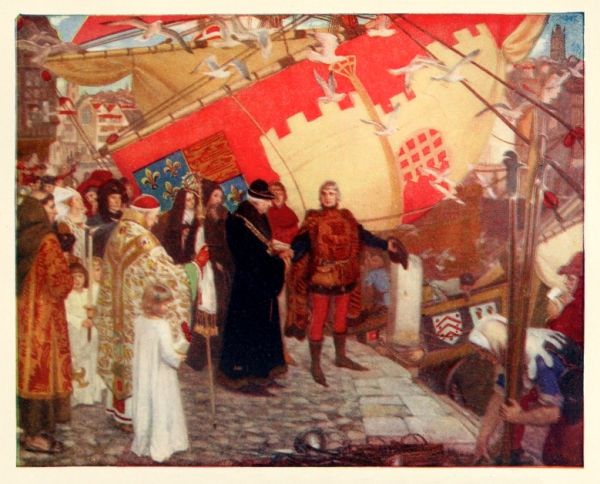
The Departure of John and Sebastian Cabot on the First Voyage of Discovery, 1497.
(From the picture by Ernest Board. By permission of the Bristol Corporation and the Artist.)
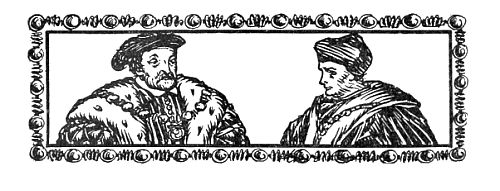
“I charge thee, fling away ambition;
By that sin fell the angels.”
A stately procession now files by, headed by shaven and tonsured priests carrying silver crosses. Behind them a bareheaded noble carries the Great Seal of England, and another a cardinal’s hat on a cushion. Now you hear gentlemen ushers shout, “Make way for my lord’s grace!” and a splendid figure stalks past you with the air of a king. He wears the scarlet robe of a cardinal, with a tippet of fine sable and a gold chain about his neck, while on his feet are shoes of gold studded with jewels. In his hand he carries an orange-skin with a scented sponge in the midst. This he sniffs from time to time, lest he should catch some infection from the crowd that throngs his path. Behind him two great pillars of silver and a gilt mace are borne, and so he proceeds through Westminster Hall to the seat of justice. At his coming, suitors kneel to present their petitions and beg his favour. Anon he will devote himself diligently to the business of his high office, and will spare neither high nor low, but will judge all who come before him according to their merits and deserts.
No man in the kingdom, not even the king, lives in such splendour and magnificence. His palace is always filled with noblemen, gentlemen, and ambassadors from foreign countries, and his banquets and entertainments are the wonder of the age. Bluff King Hal and he are boon companions, and ofttimes you may see the monarch lean lovingly on the shoulder of his splendid chancellor. Sometimes he will visit his palace, and the cardinal will spare neither money nor ingenuity to divert the king.
A writer of the time tells us that “the banquets were set forth, with masks and mummeries, in so gorgeous a sort and costly manner that it was a heaven to behold. I have seen the king suddenly come in thither in a mask, with a dozen of other maskers, all in garments like shepherds, having sixteen torch-bearers, besides their drums. Ye shall understand what joy and delight the cardinal had to see his prince and sovereign lord in his house so nobly entertained and pleased.”
Who is this favoured mortal? He is Thomas Wolsey, the son of a wealthy wool-merchant of Ipswich. By his great ability and his zeal in the king’s service, he has raised himself from a comparatively humble position to be the envy of the greatest nobles in the land. “He is the person,” writes the Venetian ambassador, “who rules both the king and the kingdom. He is very handsome, learned, extremely eloquent, of vast ability, and indefatigable. He alone transacts all the business that occupies all the magistrates, offices, and councils of Venice. He has the reputation of being extremely just. He favours the people exceedingly, and especially the poor, hearing their suits and making the lawyers plead gratis for them.” But if he has friends among the poor, his pomp and pride have made him hosts of enemies among the proud and rich. The old nobles hate him, and would fain bring his haughty head to the dust. Nevertheless, even his enemies are forced to admit that he is the ablest statesman of his time, and the chief prop of the kingdom.
Truly, he treads all the ways of glory, and sounds all the depths and shoals of honour; but the knell of his greatness is soon to toll. The sun will no longer usher forth his honours, or gild again the noble troops that wait upon his smiles. Even now a woman’s bright eyes are weaning Henry from him, and soon he will be fain to say—
“The king has gone beyond me; all my glories
In that one woman I have lost for ever.”
Listen to the story of his fall.
Never king came to his throne more blessed by nature, fortune, and circumstance than the eighth Henry. Nature had fashioned him as the handsomest and ablest monarch in Christendom. “He was tall and well proportioned . . . his complexion very fair and bright, with auburn hair combed straight and short in the French fashion, and a round face that would become a pretty woman.” But there was no effeminacy about him. He was devoted to tennis and extremely fond of jousting and hunting—“never taking his diversion without tiring eight or ten horses.” Nor was there a more accomplished king living. He spoke good French, Latin, and Spanish; he was a musician and an author, and even as a boy his ability and address most favourably impressed the great scholar Erasmus. With all these gifts and graces, Henry began his reign with the highest promise; but as the years went by he steadily changed for the worse. His unbridled self-will grew upon him until he became a cold-hearted despot, who made his whim the law of the land, and ruthlessly sent to the scaffold all on whom his displeasure fell. From the first he was absolute master of the realm, and could say, L’état, c’est moi! Nevertheless, he was always careful to make his acts legal by getting Parliament to endorse them. He greatly valued his popularity with the people, and his ministers had to bear the blame of all his unpopular acts.
During the later years of Henry the Seventh’s reign, Arthur, the heir to the throne, had been married to Catherine, the daughter of Ferdinand and Isabella of Spain. Arthur died young, and the miserly old king, unwilling to part with Catherine’s rich dowry, proposed to marry her to her brother-in-law, Henry, who was six years her junior. Such an alliance was against the law of the Church, but a dispensation was readily obtained, and shortly after his accession Henry married her. For many years they lived happily together. “The king adores her, and her Highness him,” wrote her confessor, and never had any man a more faithful helpmeet. She was a fair-haired, gentle, pious woman, of a lively and gracious disposition, but not beautiful. As she grew older her health failed, and she became prematurely old and lost much of her attraction. All her children died except one—the Princess Mary. After eighteen years of married life Henry fell violently in love with Anne Boleyn, one of the queen’s maids of honour.
“Madame Anne,” wrote an eye-witness, “is not one of the handsomest women in the world. She is of middling stature and swarthy complexion, and has nothing but the king’s great love, and her eyes, which are black and beautiful.” She was, however, bright and lively, and had “wonderful long hair.” Soon Henry pretended to have scruples about the lawfulness of his marriage with his brother’s widow, and he persuaded himself that the death of his children was a visitation of God for his sin. Further, he argued that a son was necessary in the interests of his kingdom, for hitherto the rule of women had always provoked civil war. The real fact of the matter was that the selfish, self-willed king wanted to cast off Catherine in favour of a new, young wife. Before long Henry asked Pope Clement to declare that his marriage was null and void from the beginning.
Wolsey, as the Pope’s legate in England, was the natural channel of communication between the king and the Pope. Wolsey could not believe that Henry desired a dissolution of his marriage tie in order to contract an alliance with a giddy, insignificant lady of the court. Rather, he assumed, Henry was contemplating a union with some lady of the royal house of France, and this fell in with his pet scheme for securing the friendship of that powerful state. Believing this, he used his influence with the Pope. But the wearer of the triple crown was then in a parlous state. He was in the power of Charles the Fifth, nephew of Queen Catherine, and that monarch was determined that his aunt should not be divorced. At the same time, Clement was an ally of Henry’s, and was naturally anxious to assist him. In his dilemma the Pope sought to gain time, and therefore appointed Wolsey and the Italian Cardinal Campeggio to inquire into the case. In June 1529 the two cardinals opened their court in the great hall of the Black Friars’ Monastery in London. Catherine refused to plead, but knelt at the feet of her husband and made a touching appeal to him to spare her the indignity and injustice of divorce.
“Heaven witness,
I have been to you a true and humble wife,
At all times to your will conformable;
Ever in fear to kindle your dislike,
Yea, subject to your countenance, glad or sorry
As I saw it inclined.”
She appealed to the Pope himself; then rising, bowed to the king, and refused to face the court again. The trial dragged on, and Henry became impatient and demanded speedy judgment.
Meanwhile Clement had made a treaty with the Emperor, and was no longer solicitous to retain the goodwill of the English king. He therefore revoked the commission, and ordered the cause to be transferred to Rome for a new trial. Henry, baffled and beaten, was furious, and Anne Boleyn skilfully fanned the flame of his wrath. She suggested that Wolsey had bungled the matter, and forthwith his doom was sealed. He was dismissed from his office as chancellor, and brought to trial for breaking an old law which forbade appeals to Rome. Wolsey said truthfully that he had only appealed to the Pope at the king’s request. Henry, however, denied that he had sanctioned the proceeding, and Wolsey, to the joy of his enemies, was found guilty. All his property was seized, and after he had made an abject submission, he was ordered to withdraw to his diocese of York.
Here he flung himself with all his old energy into his work as archbishop, and soon won the affection of the north-country folk. But he hungered and thirsted for his former greatness, and made the serious error of communicating with the ambassadors of the French king and the Emperor. When Henry heard of it his anger blazed forth once more. This was treason and nothing less, and Wolsey’s arrest was immediately ordered. Early in November he began his journey southward under an armed guard. Sick and heart-broken, with his health undermined, he travelled as far as Leicester, where at his coming the abbot of the place met him with the light of many torches and received him with great reverence. “Father abbot,” said he, “I am come to lay my bones among you.” Truer words were never spoken. A few days later he died, lamenting with his failing breath—
“Had I but served my God with half the zeal
I served my king, He would not in my age
Have left me naked to mine enemies.”
So died the victim of a headstrong, selfish sovereign, who remorselessly flung away even the most devoted of his servants as soon as they had ceased to be useful to him.
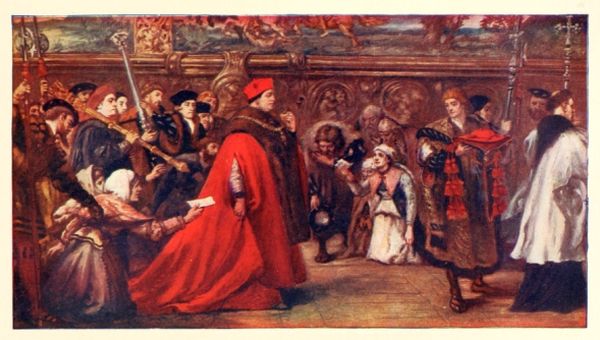
Cardinal Wolsey on his Way to Westminster Hall.
(From the picture by Sir John Gilbert, R.A. in the Guildhall Art Gallery, London.)
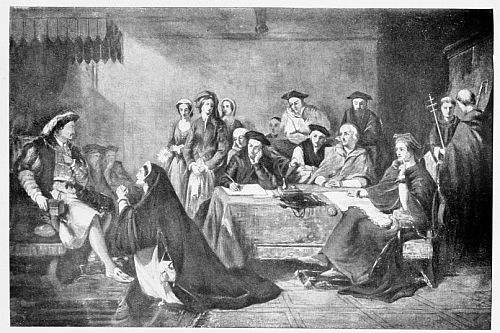
TRIAL OF QUEEN CATHERINE.
(From the picture by Henry O’Neill, A.R.A. By permission of the Art Gallery Committee of the Corporation of Birmingham.)
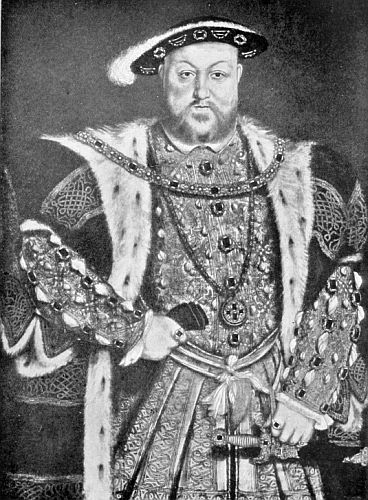
PORTRAIT OF HENRY VIII.
(By Hans Holbein the Younger. From the Royal Gallery at Windsor.)
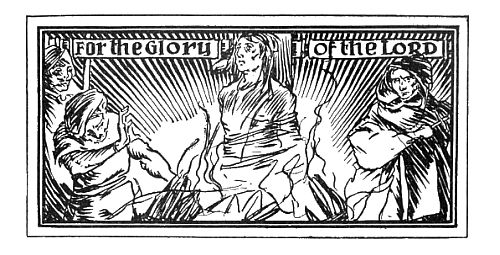
“The old order changeth, yielding place to new,
And God fulfils Himself in many ways.”
There is a pause in our pageantry. While the next scene is preparing, let the story of the intervening period be briefly told. Twenty-eight years, long and fateful, have come and gone since Wolsey died of a broken heart, and in the interval a new England with a new destiny and a new faith has arisen. The years that have sped have been marked by religious upheaval, and by an extraordinary outburst of persecuting zeal. The fires of Smithfield have blazed, and the thumb-screw and the rack have done their fiendish work “for the glory of the Lord.” Henry in his rage against the Pope has swept away the monasteries, sent the monks adrift, and plundered them of their lands and riches. Year by year the doctrines of Church reformers have gained ground, and ere Henry’s long reign of terror and crime draws to a close, Protestantism is a powerful force in England. His son, Edward the Sixth, a precocious, consumptive lad of ten, succeeds, and then the reformers gain the upper hand. A new Prayer Book “in the vulgar tongue, understanded of the people at large,” is issued, and the Reformation is hurried on with undue speed. There is a ruthless and irreverent destruction of images, pictures, and stained glass in the churches, and many pious persons, otherwise favourable to the “new worship,” are shocked into opposition. To secure the triumph of Protestantism, Edward is persuaded on his deathbed to make a will excluding his Catholic sister Mary from the throne, and naming Lady Jane Grey as his successor.
The young king dies in his sixteenth year, and three days later Queen Jane is proclaimed. Not a hat is tossed in the air, not a cheer is raised. London declares for Mary; the nobles and gentry flock to her. The poor “eleven days’ queen”—young, innocent, and beautiful—is utterly deserted. She vanishes into the Tower, and her head pays the penalty of her father-in-law’s ambition.
Mary is now queen, and she sets herself immediately to undo the work of the Reformation and to restore England to the power of the Pope. She makes the fatal mistake of marrying Philip of Spain, whose horrible outrages on the Dutch have made him an object of terror and loathing in England. Soon he deserts her, and the miserable queen, racked by painful disease, throws her whole heart into a frenzied attempt to stamp out Protestantism in her realm. Martyrs perish at the stake, and the nation is horrified at the queen’s cruelty. And yet one cannot but be sorry for the wretched woman. In feeble health, miserable, and soured by the desertion of her husband, filled with anxious fears for the future of her kingdom, and conscious of the hatred of her people, she honestly believes that she is doing the will of Heaven in burning and torturing those of her subjects who do not see eye to eye with her in matters of religion. Every week her people grow more and more discontented; every week her health and spirits grow worse.
At length the climax is reached. Her husband drags her into war with France, and in the struggle “the chief jewel of the realm”—Calais—is lost. For two hundred years it has been in English hands, and its possession has meant the command of the “narrow seas.” Now England is without a foot of soil on French ground, and Englishmen grow bitterly angry at the thought. Mary has enough national spirit to understand the magnitude of the disaster. “When I am dead,” she cries, “you will find ‘Calais’ written on my heart!”
Ten months later, on the eve of a great national revolt, the miserable Mary dies, conscious that she has been a hopeless, helpless failure. She has striven to re-establish Romanism in the land, but has only succeeded in ringing its death-knell. Protestantism is again in the ascendant. While Mary’s obsequies are preparing, a great burst of joy sweeps over the country, for Elizabeth, her Protestant sister, is now queen.
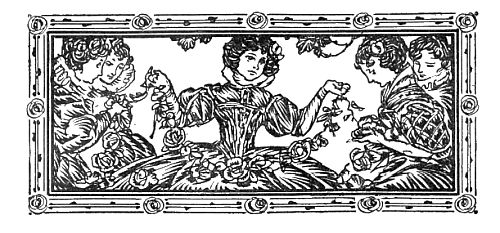
“And from the top of all my trust
Mishap hath thrown me in the dust.”
 DARK and murderous scene now awaits your eyes.
It is about seven o’clock on a Saturday evening in
March 1566. A beautiful queen is supping with
her friends in the inner boudoir of the ancient Palace of
Holyrood. Some eightscore armed men stealthily enter the
courtyard and close the gates behind them. Within the
supper-chamber only one person is cognizant of the foul
deed which is even now preparing—and he is the queen’s
husband! The queen herself is blithe and gay, according to
her wont. She strives to rally her husband, who sits by her
side; but he is full of drink and jealousy. But a swarthy
Italian present responds to every sally with nimble wit and
easy grace. Mary smiles upon him, for he alone in that
gloomy palace reminds her of the light-hearted merriment
and the brilliant frivolity of her dearly-loved France. And
as she smiles the queen’s husband scowls darkly, and ever
and anon glances furtively towards a door behind the arras.
DARK and murderous scene now awaits your eyes.
It is about seven o’clock on a Saturday evening in
March 1566. A beautiful queen is supping with
her friends in the inner boudoir of the ancient Palace of
Holyrood. Some eightscore armed men stealthily enter the
courtyard and close the gates behind them. Within the
supper-chamber only one person is cognizant of the foul
deed which is even now preparing—and he is the queen’s
husband! The queen herself is blithe and gay, according to
her wont. She strives to rally her husband, who sits by her
side; but he is full of drink and jealousy. But a swarthy
Italian present responds to every sally with nimble wit and
easy grace. Mary smiles upon him, for he alone in that
gloomy palace reminds her of the light-hearted merriment
and the brilliant frivolity of her dearly-loved France. And
as she smiles the queen’s husband scowls darkly, and ever
and anon glances furtively towards a door behind the arras.
Suddenly the arras is pushed aside, and a man in armour, his face corpse-like in its pallor, steps into the room, and behind him you see three others. The queen, cool and fearless, rises and demands the meaning of this intrusion. The Italian knows its meaning full well; he has long been bitterly hated by the nobles, and now he fears that his hour has come. He cowers for protection behind the queen, who confronts the armed men without a tremor. “What do ye here, my Lord Ruthven?” she cries, and the intruder roughly replies that he comes to drag the Italian from the queen’s chamber, where he has been overlong.
In a flash the queen perceives a plot, and turning to her wretched husband demands if he knows anything of this enterprise. The ready lie comes to his lips, and he says that he knows nothing of it. “Go,” cries the queen to Ruthven, and points to the door. But he moves not, and bids the accomplice who has disowned him, “Take the queen, your wife and sovereign, to you.” But the royal dastard stands dazed, and wists not what to do; while the Italian, with his drawn dagger in his trembling hand, clings to the queen’s gown, crying, “Save me! save me!” Now one of the guests strives to seize Ruthven, who draws his sword and cries fiercely, “Lay no hands on me, for I will not be handled!”
Then the chamber is filled with armed men, the table and chairs are overthrown, the lights are extinguished save one, and a wild rush is made for the victim. Ruthven flings the queen into the arms of her husband, and the shrieking Italian is dragged from the room with curses and threats and blows. You hear his screams grow fainter and fainter, as his foes plunge their daggers into him. Now all is silent, and the queen’s favourite lies dead with fifty-six wounds in his body. Her husband’s dagger is sticking in the breast of the corpse in testimony of his consent to the deed!
The ghastly scene which you have just witnessed serves to introduce the moving tragedy of Mary Queen of Scots. She was born in the hour of calamity, and conflict, contention, sorrow, and disaster dogged her footsteps from the cradle to the grave. Her heart-broken father, James the Fifth, had turned his face to the wall when her birth was announced. Ere she was christened he was dead, and Scotland was torn with the strife of contending factions. Scotland’s weakness was England’s opportunity, and Henry the Eighth lost no time in proposing his delicate little son, afterwards Edward the Fifth, for the hand of the five-year-old queen. The Scots refused the match, and an English army marched north and sacked Leith and Edinburgh. The invasion was “too much for a wooing and too little for a conquest.”
Four years later an English army again made an attempt to compel the Scots to marry their queen to young Edward. At Pinkie there was a great slaughter, but it was all in vain. The little queen was hurried to France, where she grew up with her four Maries at the gay court of King Henry the Second, and became far more French than Scottish. As she advanced in years, her grace and beauty, her esprit and her accomplishments, were the talk of France, and at sixteen she wedded the Dauphin, a sickly weakling, who only survived his marriage a little more than a year. At the age of nineteen Mary was a widow, about to set sail for her northern kingdom.
She was now the most charming princess of her time, fond of music, dancing, laughter, and gaiety, yet eager for risk and adventure, and always rejoicing in the clash of arms. Often she wished she were a man “to know what life it was to lie all night in the fields, or to walk on the causeway with a jack and knapsack, a Glasgow buckler, and a broadsword.” In statecraft she was the equal of Queen Elizabeth, and in person and charm she far exceeded her royal kinswoman. Her beauty, grace, and easy cordiality won the hearts of all with whom she came in contact.
She left France most reluctantly, and as long as the shores of that gay, joyous land remained in sight she riveted her gaze on them. As they gradually faded from her sight she sighed, and said again and again, “Adieu, France! I shall never see thee more!” She arrived at Leith unexpectedly on a dismal day of thick fog and incessant rain. Never was a more unpropitious home-coming. She had returned to a stern, poor, unruly kingdom, which had adopted Reformation doctrines with remarkable zeal and austerity. The guiding spirit of the time was John Knox, the most implacable and fearless Reformer who ever lived. Well indeed did he deserve the eulogy spoken at his graveside, “Here lyeth a man who in his life never feared the face of man.” The Covenant had been signed, the authority of the Pope had been thrown off, and Protestantism had taken deep root in the land. Mary was a strong Romanist, and she meant to restore her kingdom to the old faith. In this she failed utterly, for almost the whole of her people were bitterly opposed to Romanism in any shape or form.
While in France, Mary and her husband had assumed the style and title of King and Queen of England, and Elizabeth was naturally aggrieved. Now Mary offered to give up her claim if Elizabeth would recognize her as heir to the English throne. The Scottish queen said that she asked for nothing more than her due. Should Elizabeth—the Virgin Queen—die without children, Mary would be heir to her throne by right of birth, though her claim had been barred by Henry the Eighth. Elizabeth, however, flatly refused to make any such agreement.
For a time Mary was popular with her subjects, but soon the heather was on fire. All sorts of suitors aspired to her hand, and the rival factions were eager to marry her to a Catholic or a Protestant, according to the character of their respective beliefs. At length, however, she decided to marry Henry Stewart, Lord Darnley, “a long lad . . . beardless and lady-faced,” and only nineteen years of age. He was a Roman Catholic like herself.
The inevitable rising took place, but it was ineffective, and for a while the Protestant cause was undone and Mary triumphed. Meanwhile the queen had discovered that her youthful husband was vain, spiteful, foolish, untrustworthy, and drunken. He was eager for the “crown matrimonial,” and yearned to rule in her name; but Mary consistently refused his request, and Darnley believed that her Italian secretary, David Riccio, was at the back of her refusal. Some of the nobles were bitterly jealous of the foreigner, who was supposed to sway the queen’s counsels, and with these malcontents Darnley came to an understanding. The result you have witnessed in the savage scene with which this chapter opened.
Riccio was dead, and Mary, maddened with rage at the night’s work, determined to have her revenge. Within a year Darnley was murdered in the lonely house of “Kirk of Field,” which stood on the site of the present University of Edinburgh. No one knew exactly how Darnley had perished, though thousands heard the roar of the explosion which blew up the house in which he was lying. His murderer was unknown, though anonymous placards on the walls of the Tolbooth accused the Earl of Bothwell of the foul deed. This earl was a masterful, bold, and vicious man, with whom Mary had fallen over head and ears in love. He was the very antithesis of Darnley with his “heart of wax,” and Mary needed a strong arm to lean upon. So flinging every prudential consideration to the winds, she gave her whole heart to the dangerous and showy man who was accused of murdering her husband. Bothwell was tried for the crime, but the trial was a mere mockery, and the accused rode to the court of justice on Darnley’s favourite steed. No witnesses were called, and the jury, composed of Bothwell’s partisans, triumphantly acquitted him.
Bothwell had already been divorced, and now he was free to marry the queen. The ceremony took place in the presence-chamber at Holyrood, and when the news leaked out men’s hearts were hot with shame and indignation. For a brief time Mary and her new husband seemed happy, but Bothwell’s fierce and brutal nature soon revealed itself. There were angry quarrels between the pair, and on one occasion Mary called for a knife with which to kill herself.
Ere long a rebellion broke out, and the insurgents marched to battle beneath a banner painted with the figure of a murdered king with an infant prince kneeling beside the body, crying, “Judge and avenge my cause, O God.” At Carberry Hill, on the longest day of the year 1567, Bothwell offered to decide the contest by single combat, but this the queen would not allow. Her forces melted away. Bothwell fled, and she was a captive in the hands of an exasperated people. A month later she was rowed across Loch Leven to the castle which still stands upon its little island. Here she was imprisoned, and here she was forced to abdicate the throne in favour of her infant son James. The Earl of Moray, her half-brother, was named regent, and the Protestant party was once more supreme.
Within a year Mary was free again. She found a knight-errant in the person of “pretty George Douglas,” younger brother of the Laird of Loch Leven. He fell deeply in love with the deposed queen, and ere long he had planned her escape. The story goes that when all was ready Douglas sent Mary a signal in the shape of a pearl fashioned like a pear. The key of the castle was obtained by the ruse of Willie Douglas, a page boy. It was the custom of the governor of the castle to have the key of the great gate placed on the table beside him when at supper. The page, who served at table, placed a plate before the governor, and at the same time dropped a napkin on the key, and then lifted key and handkerchief together. He slipped out to the queen, who was waiting for him. They gained the gate unperceived, locked it behind them, and threw the key into the water. The lad put Mary and her companion, a little maid of ten, into a boat, cast off, and plied his oars manfully. The queen waved a white veil to and fro, and at the signal George Douglas rose up from the reeds by the side of the lake and hurried to the village, from which he soon afterwards returned with a troop of armed men and some led horses. By the time the boat touched the shore the horsemen were waiting for the queen, and in a few minutes she was galloping southwards towards the ferry across the Forth. On the way she was joined by another troop of horse. That night she slept in Niddrie Castle, and next day reached Hamilton in safety.
The news of her escape spread like wildfire through the land, and speedily many of the barons and nobility flocked to her with offers of support and service. Before long she had five or six thousand men about her, while the regent, who was at Glasgow, mustered some four thousand. With this force, inferior as it was, he decided on an immediate battle. As the queen advanced from Hamilton towards Dumbarton, where she proposed to take ship for France, she had to pass through a narrow lane leading up to the hill on which the village of Langside stands. Moray posted his main battle on Langside Hill, and stationed his hagbutters or matchlock men along the hedges on both sides of the lane and amongst the cottages of the village. The queen took her station on an eminence half a mile distant and watched the battle which now began. She saw her troops charge up the hill and endeavour to force the passage of the lane. She saw them roll back under the heavy fire of the hagbutters, and then make a second attempt to storm the village. This, too, was unsuccessful, and soon she saw Moray’s pikemen and his Highlanders sweeping down on her friends with the utmost fury. With a cry of anguish she saw them break before the flashing claymores of the yelling Macfarlanes, and betake themselves to headlong flight. All was over, and the miserable queen put spurs to her horse and galloped away. She tried to reach Dumbarton, but she was too late. So hot was the pursuit that she was obliged to gallop for the wilds of the south-west. On and on she rode, and never halted until she reached Sanquhar, where she drank a bowl of milk at a cottage door. Then her wearied horse was urged on again until she reached the remote and lonely Abbey of Dundrennan, on the Solway, sixty miles from the field of battle.
On Sunday afternoon, May 16, 1568, she made the fatal mistake of her life. She determined to throw herself upon the generosity of Elizabeth, and no argument of her attendants could make her change her purpose. That reckless decision practically signed her death-warrant. She crossed the Solway and arrived at Workington. The next day she was brought by Richard Lowther to Cockermouth, and thence to Carlisle Castle, where she arrived in great distress and mean attire, and by the instructions of Elizabeth’s council was detained as a prisoner.
Elizabeth was by no means pleased at the turn which events had taken. Mary was a most embarrassing guest. Many of Elizabeth’s Catholic subjects regarded the Queen of Scots as the rightful sovereign of England, and now this dangerous rival was within her kingdom. Obviously, Mary could not be permitted to go to and fro unrestrained, gathering her adherents about her, the centre of a movement which might hurl Elizabeth from the throne. Equally obviously, Elizabeth could not send the refugee back to Scotland, where the scaffold or a life-long imprisonment awaited her. It would similarly be the height of folly to permit her to return to France and there raise an army to subdue the Protestants of the kingdom which had rejected her. Elizabeth was in a dilemma, and for the moment she saw no way out of it. Meanwhile, she wrote to Mary that she would be careful of “her life and honour,” and regretted that she could not receive her as a royal guest until she had been acquitted of the hideous crime charged against her. She would be the gladdest in the world to see her Grace well purged of this crime, that thereby she might aid her fully and amply to regain her throne.
At length, after much discussion and negotiation, a trial was agreed upon, and three sets of commissioners—one set for Elizabeth, one for Mary, and one for the confederate Scottish lords—were appointed to inquire into the complaints which the Scottish queen brought against those who had risen in arms against her, seized her, and imprisoned her, forced her to abdicate, and crowned her infant son. The conference began at York and ended at London. The Regent Moray appeared before the commissioners, and, as a last resort, produced a silver casket containing letters which were alleged to be written by Mary to Bothwell. These letters, if their genuineness could be proved, clearly showed her to be the accomplice of Bothwell in the murder of her husband. Mary constantly declared that the casket letters were forgeries, and to this day no man can positively say that she did not speak the truth. Mary demanded that the letters should be shown to her, but most unfairly her demand was refused. Then she indignantly broke off the conference, and the commissioners reported that nothing dishonourable had been proved against Moray and his friends, and nothing against Mary that could lead Elizabeth to take any evil opinion of her good sister. Nevertheless, Mary remained a prisoner in England, while Moray returned to Scotland and resumed his regency.
And now began Mary’s long captivity of nineteen years. She was moved about from castle to castle, and at first was permitted as much liberty as was consistent with the safe custody of her person. We read that she had a stud of sixteen horses, and frequently went hunting. She amused herself with needlework, in which she was very skilful, and kept dogs, turtle doves, and Barbary fowls. She practised her religion with great devotion, and she did not fail to charm all who came in contact with her by her gracious condescension.
But all the while she was ceaselessly plotting and intriguing, not only with Elizabeth’s disaffected subjects, but with her French friends, the King of Spain, and the Pope. Elizabeth’s life was in hourly danger, and her councillors constantly warned her that Mary was a terrible menace to her safety. In 1569 news arrived that the Pope was about to depose Elizabeth, and declare Mary Queen of England. Almost immediately there was a great rising of the Catholics of the north. The Earls of Northumberland and Westmorland marched into Durham, and mass was once more said in the cathedral. The insurgents, however, received but little support, and some of the leaders perished on the scaffold. Next year the long expected Bull of Deposition arrived. While most of the Catholics remained loyal, some of the more violent schemed to depose and even murder Elizabeth.
One of the plots, known as the “Ridolfi Plot” from the name of an Italian banker who played an important part in it, was headed by the Duke of Norfolk, an ambitious noble of thirty-two, who undertook to seize Elizabeth and marry Mary, who had now obtained a divorce from Bothwell. Norfolk was the leader of the English Catholics, and had the support of many noblemen in the northern counties. Some of his papers, however, fell into the hands of Burleigh, and the whole plot was exposed. Norfolk, who said truly that nothing done for Mary ever prospered, paid the penalty with his head on Tower Hill. Both Houses of Parliament now petitioned that the Queen of Scots should share his fate, but Elizabeth replied that “she could not put to death the bird that had fled to her for succour from the hawk.” Henceforth Mary was more strictly confined.
At length in 1583 another great plot was unmasked. France and Spain were to unite in an invasion of England, the English Catholics were to rise, Elizabeth was to be murdered, and Mary was to ascend the throne. Six desperate fanatics undertook to dispatch the English queen by steel or poison as a service pleasing to Heaven. Mary was in the plot up to the eyes. She had corresponded with Anthony Babington, a vain fool who was the chief agent in the plot, and had accepted his offer to assassinate Elizabeth. In extenuation it must be said that she was now desperate. She felt no compunction in lending her support to the murderous project, for she had the wrongs of a lifetime to revenge, and she knew that she would ultimately come to the scaffold if Elizabeth were permitted to live. Walsingham knew every move of the plot, and encouraged it to develop until he had sufficient evidence to bring Mary to trial on the capital charge.
She was arrested at a neighbouring seat, whither she had been allowed to go on the pretext of a stag-hunt, and was there detained until her papers had been secured. Then she was removed to Fotheringhay Castle and brought to trial. Mary faced the court with great tact and dignity, and defended herself with the utmost skill. She totally denied all knowledge of the Babington plot; but her case was hopeless, both because the court had what it considered sufficient evidence of her complicity, and because it was considered necessary for political purposes that she should be found guilty.
On October 25, 1586, the commissioners reported that she had contrived “divers matters tending to the hurt, death, and destruction of the Queen of England.” Therefore both Houses of Parliament again petitioned for Mary’s speedy execution. Elizabeth replied that she was unwilling to shed the blood of that wicked woman, the Queen of Scots, though she had so often sought her life. She wished that she and Mary were two milkmaids with pails upon their arms, and then she would forgive her all her wrongs. As for her own life, she had no desire on her own account to preserve it. She had nothing left worth living for; but for her people she could endure much. She was most reluctant to sign the death-warrant, and endeavoured to evade the painful task by all sorts of shifts and devices, even going so far as to make the cowardly suggestion that Mary’s guardians should act upon their own responsibility. At length she put her name to the document, and her councillors hurried on the execution lest their mistress should change her mind.
The Earl of Shrewsbury, who had been Mary’s guardian for nineteen years, broke the news to her. She heard her fate with the utmost calmness, saying that she was content and even happy that she was so soon to be freed from so many miseries and afflictions, and rejoicing that God had given her grace to die for the honour of His name and for His Church. Finally she asked when she was to suffer. “To-morrow morning at eight o’clock,” was the reply.
Let us not linger over the painful scene of her execution. She laid her head upon the block with calm fortitude, the axe descended, and the long tragedy of her life was over. She sinned grievously, but she suffered greatly, and she will never lack champions who will stoutly maintain even to the crack of doom that she was more sinned against than sinning.
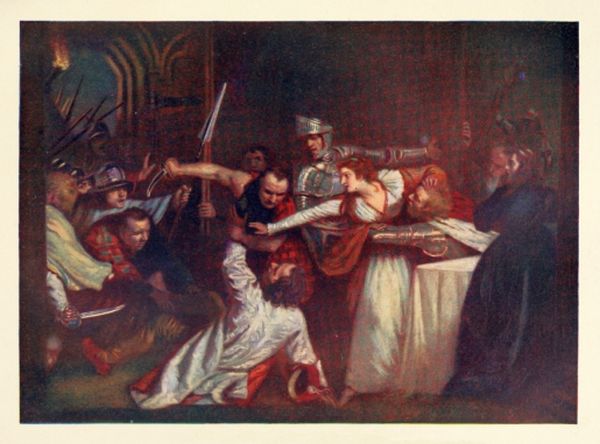
The Murder of Rizzio.
(From the picture by John Opie, R.A., in the Art Gallery of the Corporation of London.)
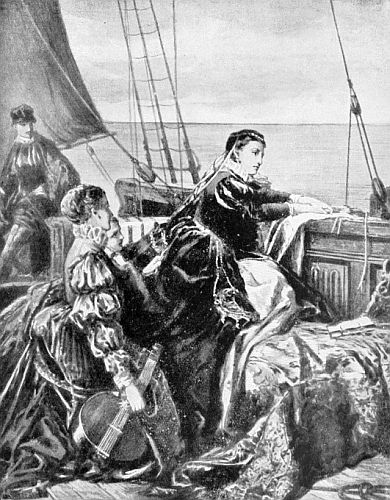
AT SEA. “FAREWELL, FRANCE!”
(From the picture by Robert Herdman, R.S.A.)
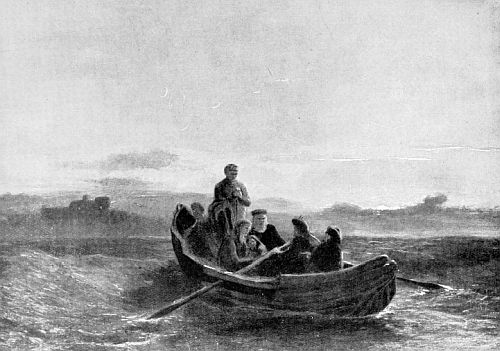
ESCAPE OF MARY QUEEN OF SCOTS FROM LOCH LEVEN CASTLE.
(From the picture by Thomas Danby, R.A., in Bethnal Green Museum.)
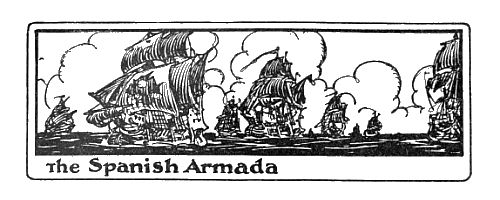
“Attend, all ye who list to hear our noble England’s praise;
I tell of the thrice famous deeds she wrought in ancient days,
When the great fleet invincible against her bore in vain
The richest spoils of Mexico, the stoutest hearts of Spain.”
 T is the afternoon of July 19, in the year of grace
1588. You are gazing at the terraced bowling-green
of the Pelican Inn that looks down upon the blue
waters of Plymouth Sound. A group of admirals and captains
is gathered on the closely-shaven lawn, men of mark
every one of them, and sea-dogs all. They are waiting, “as
lions in their lair wait for the passing of a herd of deer.”
T is the afternoon of July 19, in the year of grace
1588. You are gazing at the terraced bowling-green
of the Pelican Inn that looks down upon the blue
waters of Plymouth Sound. A group of admirals and captains
is gathered on the closely-shaven lawn, men of mark
every one of them, and sea-dogs all. They are waiting, “as
lions in their lair wait for the passing of a herd of deer.”
“See those five talking earnestly in the centre of a ring which longs to overhear and yet is too respectful to approach close. Those soft, long eyes and pointed chin you recognize already; they are Walter Raleigh’s. The fair young man in the flame-coloured doublet, whose arm is round Raleigh’s neck, is Lord Sheffield. Opposite them stands, by the side of Sir Richard Grenville, a man as stately as he, Lord Sheffield’s uncle, the Lord Charles Howard of Effingham, Lord High Admiral of England; next to them is his son-in-law, Sir Robert Southwell, captain of the Elizabeth Jonas. But who is that short, sturdy, plainly-dressed man who stands with legs a little apart and hands behind his back, looking up with keen gray eyes into the face of each speaker? His cap is in his hands, so you can see the bullet head of crisp brown hair and the wrinkled forehead, as well as the high cheek-bones, the short square face, the broad temples, the thick lips, which are yet as firm as granite—a coarse, plebeian stamp of man. Yet the whole figure and attitude are that of boundless determination, self-possession, energy; and when at last he speaks a few blunt words, all eyes are turned respectfully upon him—for his name is Francis Drake.
“A burly, grizzled elder, in greasy, sea-stained garments contrasting oddly with the huge gold chain about his neck, waddles up, as if he had been born, and had lived ever since, in a gale of wind at sea. The upper half of his sharp, dogged visage seems of brick-red leather, the lower of badger’s fur; and as he claps Drake on the back, and, with a broad Devon twang, shouts, ‘Be you a-coming to drink your wine, Francis Drake, or be you not?—saving your presence, my lord!’ the Lord High Admiral only laughs, and bids Drake go and drink his wine with John Hawkins, admiral of the port.”
As they lift their long-necked Dutch glasses a rough-bearded old sea-dog bursts in upon them and cries to the Lord Admiral,—
“My lord! My lord! They are coming! I saw them off the Lizard last night.”
“Who, my good sir?”
“The Armada, your worship—the Spaniard! You’ll find them here before nightfall, my lord.”
“Then we must haste,” observes the Lord High Admiral; and turning to Drake, he says, “I must command the help of your counsel, vice-admiral.”
“And it’s this, my good lord,” replies Drake, who has taken up a bowl and is now aiming it at the jack: “they’ll come soon enough for us to show them sport, and yet slow enough for us to be ready; so let no man hurry himself. And as example is better than precept, here goes.” So saying he aims his bowl. Hawkins follows suit, and the game is played to a finish.
“There, vice-admiral,” cries the veteran, “you’re beaten, and that’s the rubber. Pay up three dollars, old high-flyer, and go and earn more, like an honest adventurer.”
“Well,” says Drake, pulling out his purse, “we’ll walk down now and see about these young hotheads. As I live, they are setting to tow the ships out already!—breaking the men’s backs overnight to make them fight the lustier in the morning! Well, well, they haven’t sailed round the world, John Hawkins.”
And John Hawkins, with a hearty “bye-bye” to the bystanders, waddles off with the remark, “We’re going to blow the Dons up now in earnest.”
“Night sank upon the dusky beach and o’er the purple sea;
Such night in England ne’er has been, nor e’er again shall be!
From Eddystone to Berwick bounds, from Lynn to Milford Bay,
That time of slumber was as bright and busy as the day.”
Meanwhile the lordly fleet of Spain, swelling in white clouds of sail to the heavens, speeds on towards the shores of our threatened land.
Why, you ask, is the Spaniard bent on invading England?
Who does not know something of the exploits of the sea-dogs—how they harried King Philip’s territories in America, and how no treasure ship put out from the ports save in fear and trembling? Philip, the most powerful monarch of Europe, and the champion of the Pope, had been hard hit by Drake and his fellows. He saw clearly that unless England were crushed he could not retain his empire in the New World. Further, his Flemish subjects were in desperate revolt against him, and English troops had now joined them. How he hated England! She should bite the dust, and he would stake the whole strength of his kingdom, the wealth of the two Indies, the flower of Spanish chivalry on the enterprise. It was a Crusade—nothing less. The Pope had excommunicated the heretic Elizabeth, and the martyred Queen of Scots had bequeathed England to him on the scaffold. Holy Church would fight for him, and victory was already assured. So every dockyard in Spain rang with the hammers of shipwrights, and all Latin Christendom sent him volunteers. The sea was covered with vessels freighted with arms and provisions streaming to the mouth of the Tagus. Cadiz harbour was thronged with transports, provision ships, powder vessels—a hundred sail of them—many of a thousand tons and over, loading with stores for the Armada.
Drake begged Elizabeth to let him fit out a fleet and sail along the coast of Spain to see what was going on. Very reluctantly she consented, but ere his vessels were hull down a courier galloped into Plymouth with orders that under no condition was he to enter a Spanish port or haven. The courier arrived too late—Drake, knowing the mind of his mistress, had sailed, and recall was impossible. In five days he was at Cape St. Vincent, and a day later he saw before him the forest of masts in the harbour of Cadiz. In dashed Drake, with a fair wind and flood tide, past the batteries, which hurled a storm of shot and shell at him. He did not pause to reply, but pushed on, seized and sank the guardship, took possession of the Spanish shipping, and looted everything of the slightest service to him. Then he set the hulls on fire, cut the cables, and left them blazing beneath the walls of the town. He had, in his own pleasant phrase, “singed the King of Spain’s beard.” He had delayed the Armada for a whole year, and had spoiled his Catholic Majesty to the tune of a million ducats, without losing a boat or a man!
Home came Drake, begging the queen to let him play the same game on the Tagus, where fifty great galleons, the main strength of the fighting naval force of Spain, were assembled. But the queen would not consent; she would provoke the King of Spain no further. Negotiations for peace had begun, and must not be interrupted.
In the spring of the next year the Armada was ready, and the whole Spanish nation, smarting under the indignity of Drake’s exploit, was burning to revenge itself on England. It consisted of one hundred and thirty vessels, half of them being galleons of the largest size. The ships were manned by eight thousand sailors, and overcrowded with twenty thousand soldiers, besides slaves, servants, and priests. Every noble family in Spain sent a son to fight for the holy cause. The ships, however, were ill-found and ill-provisioned, and were commanded by a modest gentleman who confessed that he was no seaman, that he hardly knew a mast from an anchor, and that when he ventured out in a boat he was always seasick. To meet this vast fleet England had but thirty-four ships in the royal navy, but almost every seaport and many rich merchants and noblemen fitted out craft to fight the Spaniard. Their crews numbered eighteen thousand men, all good seamen, and their commanders were sea-dogs all.
The Spanish Lord High Admiral—the Duke of Medina Sidonia—received his orders directly from Philip. He was to fight no battle, but was to haste with all speed to the North Foreland and there communicate with the Duke of Parma, who was in the Netherlands with thirty thousand men waiting to cross. The army would be landed, and England would be at his feet! So much for instructions. On May 14, 1588, the Armada dropped down the Tagus, and as the galleons came out the blustering north wind met them, and day by day they drifted to leeward until they were off Cape St. Vincent. The wind changed at last, and the ships steered northward again, their crews in a terrible state owing to the stinking water and the putrid pork, fish, and bread which fraudulent contractors had foisted on them. The ships were obliged to put into Corunna, with crews too weak to man the yards, and ready to desert in shoals.
At last the Armada got under way again, and the old seaman who burst in upon the admirals and captains on the Pelican bowling-green told a true tale: the Armada was coming without a doubt. Badly, indeed, was the English fleet prepared to meet them. Elizabeth’s niggardly soul would not permit her to provide sufficient stores and provisions for the fleet. The English sailors were ill-clothed and ill-provided in every way, but they did not complain. They tightened their belts and prayed for the speedy coming of the enemy. Their prayer was soon to be answered.
The Armada was now in the Channel, sailing crescent-wise. As it passed by, out went the Plymouth fleet, hanging on to its rear like grim death. The English guns were far more powerful than those of the Spaniards, and they poured in broadsides at a safe distance with deadly effect. Further, they could fire five shots to the Dons’ one. Every broadside told, and the effect of the shot and splinters on the overcrowded Spanish ships was terrible.
So the Armada pursued its way, and Howard “plucked out its feathers one by one.” For a week the running fight was kept up. During the first few days the English were badly hampered by want of powder and provisions, but now that danger was imminent there was no lack of ammunition and stores. Off Calais the fleets faced each other, and a long day’s battle was fought. On the night of Sunday, July 28, a memorable council of war was held in the Ark’s main cabin, attended by Howard, Drake, Seymour, Hawkins, Martin Frobisher, and others. The conference was short, for there was no time to lose. Eight useless vessels were immediately coated with pitch—hulls, spars, and rigging. Pitch was poured on the decks and over the sides, and men were told off to steer them. The night was dark as the grave; a faint westerly wind was curling the waters; and towards midnight the look-outs on the Spanish galleons saw several phantom-like vessels bearing down on them.
Suddenly the ships broke into a blaze from water-line to truck, and lighted up the scene like noonday. The Spaniards lost their heads, and in their panic they slipped their cables and put to sea, uncertain which way to steer. Drake and Hawkins now bore down upon them, pouring in cataracts of round shot. The decks of the Spanish ships were like slaughter-houses. The Spanish shot flew high over the low hulls of the enemy, while every English broadside found its billet. Not until his magazines were empty and his last cartridge was fired did Drake draw off.
Then a gale sprang up and the Dons were forced to steer up the North Sea. The English closely followed them, and “the Lord sent His wind and scattered them.” Of the proud fleet which left Spain for the conquest of the heretic isle only fifty-three shattered vessels returned to Spain. Thousands of Spanish corpses strewed the shores of the Orkneys, the Western Isles, and the Atlantic coast of Ireland. Scarcely a noble family in Spain but mourned a relative slain or drowned.
Thus England and English liberty were saved. All honour to you, noble sea-dogs! May Britain never lack sons of your breed! To you we owe freedom, literature, commerce, and empire, and above all the mastery of that
“Kingdom none can take,
The realm of the circling sea.”
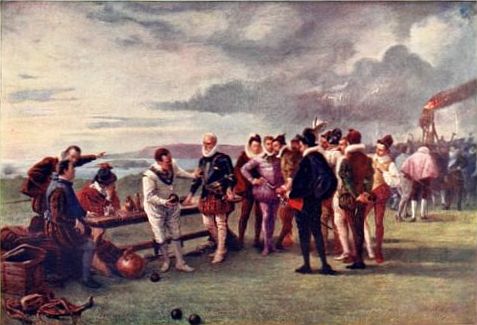
The Armada in Sight.
(From the Picture by Seymour Lucas, R.A. By permission of Mr. Arthur Lucas.)
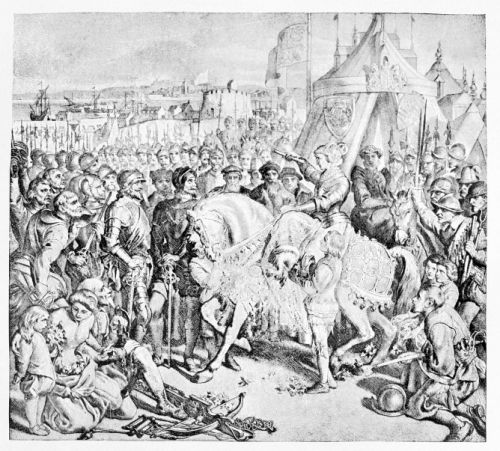
QUEEN ELIZABETH AT TILBURY FORT.
(From the picture by Daniel Maclise, R.A. By permission of the Council of the Art Union of London.)
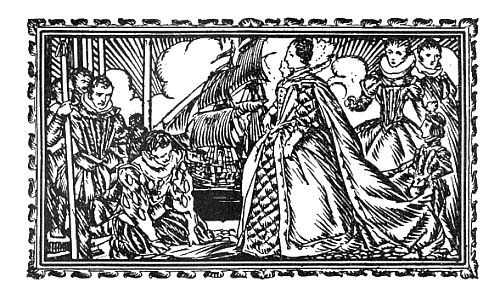
“For ’tis the sunrise now of zeal,
And faith and hope are in their prime
In great Eliza’s golden time.”
Once more Queen Elizabeth figures in our pageant. She is passing to her barge amidst a crowd of courtiers, who buzz round her like bees seeking the honey of her smile. Amongst the spectators of her progress you observe a young man, comely of person, handsome of face, and gallant of bearing. Suddenly her Majesty pauses; the ground is miry, and she hesitates to soil her dainty shoes. In a moment the young man has pulled off his rich plush cloak and has thrown it upon the ground for the queen to walk upon. She is flattered by the attention; she smiles graciously on the young man and says, “You have this day spoiled a gay mantle in our behalf. We thank you for your service, though the manner of offering it was unusual and something bold.”
“In a sovereign’s need,” he replies, “it is each liegeman’s duty to be bold.”
“That is well said,” the queen remarks, and at a bound the young man springs into her royal favour. It was afterwards said that the spoiling of his cloak gained him a good many suits.
The young man whose introduction to the queen you have just witnessed is Walter Raleigh, a Devonshire gentleman who has already seen much warlike service, and has shown himself to be possessed of many qualities besides personal bravery and prowess in battle. In sooth he is one of the most heroic and brilliant men of that brilliant and heroic age—explorer, soldier, sailor, poet, prose writer, and true-hearted gentleman—“a spirit without spot,” as Shelley finely calls him. Let us learn something of his career.
Raleigh was not yet thirty when he first attracted the attention of Elizabeth. He was then a tall, well-built man with thick, dark hair, a bright complexion, and an expression full of life. His dress was always magnificent, and he had the faculty of displaying himself and his capacities to the best possible advantage. His speech was bold and plausible; he was fearless and dashing, a man of a stout heart, a sound head, and a strong right hand. Now that Elizabeth had admitted him to her favour, she speedily raised him from the position of a poor gentleman adventurer to one of the most wealthy of her courtiers. He was knighted in 1584, and subsequently sat in Parliament for Devonshire.
Soon, however, he wearied of a life of luxury and busy idleness at the court, and arranged with his half-brother, Sir Humphrey Gilbert, to join him in his projected voyage to Newfoundland. But Elizabeth positively forbade him to go, and reluctantly he bowed to the royal command. Gilbert never returned from Newfoundland. On the homeward voyage he stuck to his little, unseaworthy vessel, the Squirrel, and declined to take his passage on board the Golden Hind, the larger vessel which convoyed him. To all arguments he had but one reply, “I will not forsake my little company, with whom I have passed through so many storms and perils.” When the ships were to the north of the Azores terrible seas arose, and the Squirrel was well-nigh swamped. Through all the foul weather Sir Humphrey, gallant gentleman that he was, sat on deck, calm and unmoved, reading a book. When they besought him to board the Golden Hind he said, “We are as near to heaven by sea as by land.” During the night of Monday, September 9, 1583, the watchers on the Golden Hind suddenly missed the lights of the Squirrel. She had gone down with all her crew.
Raleigh applied for the patent which Sir Humphrey, his half-brother, had held, and was accorded the royal permission to discover unknown lands, take possession of them in the queen’s name, and hold them to his own profit for six years. At once he fitted out an expedition, which coasted northward from Florida and took possession of Roanoke Island, within the lagoons of what is now North Carolina. His captains returned with a glowing account of the “good land” which they had discovered, and Raleigh took immediate steps to colonize it. He called it Virginia, in honour of the Virgin Queen.
Accordingly, in the year 1585, he sent out Sir Richard Grenville with one hundred and eight men, and on Roanoke Island a little colony was established. Ralph Lane was left in charge of the party, and Grenville sailed for home, hoping for the best but fearing the worst. Unhappily the wrong sort of men had been sent out—soft-handed gentlemen who could not dig, and were ashamed to beg. Before long there were bitter quarrels in the little hive between the drones and the workers, food ran short, and the colonists were on the verge of starvation.
In the next year Drake touched at Roanoke after his attack on Cartagena, and seeing what a helpless, shiftless crew the colonists were, he carried them all back to England save fifteen. The colony had thus proved a costly failure, but the experiment was notable, because it was the first attempt to found a greater Britain beyond the seas. He who writes the history of British expansion must never forget to give Raleigh a foremost place in the roll of Empire-makers.
One of the immediate results of the voyage was the introduction into this country of the potato and the tobacco plant. Raleigh grew potatoes in his garden at Youghal, and thus gave Ireland the staple food of her peasantry. According to an old story, he was the first man to smoke tobacco in England. It is said that his servant, seeing volumes of smoke issuing from his mouth, concluded that he was on fire, and promptly poured a bucket of water over him, thus effectually putting out his pipe.
A second attempt to found a colony on Roanoke Island failed, and Raleigh was terribly disappointed. He could do no more; so in 1589, the year after he helped to repel the Armada, he disposed of his rights to a company of merchants, who made no attempt to found a new colony on the ruins of the old. Thus the sixteenth century came to an end, and England had no colony of any kind in America.
In the year 1592 Raleigh fell into disgrace with his royal mistress. She discovered that the man she had delighted to honour and enrich had actually dared to love one of her maids of honour. An excuse was speedily found by the jealous queen for sending Raleigh and his lady-love, Elizabeth Throgmorton, to the Tower. At length, however, the queen relented and restored Raleigh to liberty, but forbade him the court. The lovers were married and settled at Sherborne, where Raleigh busied himself in erecting a magnificent mansion and laying out its grounds with great taste.
About this time he made acquaintance with the Spanish legend of the fabulous wealth of El Dorado, the city of Manoa, in South America. The story fascinated his romantic nature, and he could not rest until he had attempted its discovery. Yielding to his wife’s entreaties, he refrained from going in search of it himself, and sent his tried and trusty servant, Jacob Whiddon, in his stead. Whiddon returned without having discovered anything, and Raleigh now essayed the adventure himself. With a fleet of five ships he sailed in February 1595, and in the next month arrived at the island of Trinidad. He seized the capital and captured the governor, who confirmed the stories of the richness and wonder of Manoa, and told him of its remarkable inhabitants, the dog-headed men “whose heads do grow beneath their shoulders.”
Early in April Raleigh started on the quest with a little flotilla of five boats, a hundred men, and provisions for a month. He entered the Orinoco, but found the labour of rowing against the vast and powerful stream most exhausting. Sometimes his boats did not progress a stone’s-throw in an hour. After struggling onwards for nearly four hundred miles he was obliged to own himself beaten. He brought back with him some pieces of quartz showing grains of gold and the earliest specimens of mahogany ever seen in this country. Subsequently he attacked several Spanish settlements and then returned to England, where his enemies declared that the story of his river voyage was an invention. As a matter of fact, Guiana is rich in gold, and more than one famous mine has been worked in the country which Raleigh endeavoured to explore.
Raleigh lived peacefully at home for nearly two years, and then played a brilliant part in Drake’s daring attack on Cadiz. He commanded the Warspite, the leading ship, and though severely wounded, landed with his men for the storming of the town. His gallantry won him the queen’s forgiveness, and once more he was a familiar figure about the court. Under Essex he commanded a ship in the fleet which sailed for Flores, in the Azores, to lie in wait for Spanish treasure galleons. His disobedience of orders in his capture of Fayal earned for him the enmity of Essex, who now became one of his bitterest enemies. Essex, however, came to the block, but not before he had done Raleigh considerable mischief.
Queen Elizabeth died in 1603, and James the Sixth of Scotland became James the First of England. There were plots to prevent his accession and to put Lady Arabella Stewart, an Englishwoman of the royal house, on the throne. The cowardly Lord Cobham was at the head of the Main Plot, and when arrested he made a lying confession implicating Raleigh, who was tried and found guilty of compassing the death of the king, of endeavouring to set Arabella Stewart on the throne, of receiving bribes from the court of Spain, and of seeking to deliver the country into the hands of its enemy. Raleigh’s execution was ordered, and he wrote a touching farewell to his wife; but on the eve of the fatal day he was reprieved and committed to the Tower with the death sentence hanging over his head. For about twelve years he remained a prisoner. He was treated leniently, and given apartments in the Bloody Tower, where he lived with his wife and son and his attendants. Frequently the young Prince Henry visited him, and the lad grew fond of his gallant and brilliant friend. “No man but my father,” he once said, “would keep such a bird in a cage.”
Raleigh now busied himself in a variety of occupations: he designed a model of a ship, he condensed fresh water from salt, he compounded drugs, he began his “History of the World,” and wrote verses and political pamphlets. About the year 1610 he revived his old project for discovering Manoa. Twenty years had now passed since he had returned from Guiana, but during his long solitude in the Tower his mind returned again and again to the fabulous riches of El Dorado, and he devised plan after plan for securing its wealth. He now made a proposition to certain lords of the Council, and they listened to it. “If I bring them not to a mountain covered with gold and silver ore,” he wrote, “let the commander have commission to cut off my head there.” All he stipulated for was that if half a ton of precious ore should be brought home he should have a free pardon. At length the king was persuaded to agree to the proposal, and in March 1617 the order for his release was signed.
Raleigh and his wife adventured all they had in fitting out the expedition. Ere it sailed the Spanish ambassador intervened. He protested loudly that Guiana belonged to Spain, and that Raleigh’s expedition proposed an invasion of Spanish territory, and was simply a cloak for piracy on a gigantic scale. The ambassador believed that Raleigh had his eye on the Mexican Plate fleet, and as after events proved, he was right. James warned Raleigh that he was not to fight the Spaniards, and on this understanding he was permitted to sail.
Misfortune dogged him from the outset. Foul winds and storms drove him back, and afterwards scattered his fleet and sank one of his vessels. He had difficulty in getting water at the Canaries, and a hurricane drove him from the Cape Verde Islands. For forty days he lay in the doldrums, while his men fell a prey to scurvy and fever and grew mutinous. At length, when the remnant of his ten ships arrived off the mouth of the Orinoco, Raleigh was prostrate with fever, and his men had lost all hope of success. But his courageous spirit was equal to the occasion. “We can make the adventure,” he cried; “and if we perish, it shall be no honour to England or gain to his Majesty to lose one hundred as valiant men as England hath in it.”
While he remained off the mouth of the river, his lieutenant, Thomas Keymis, with five ships and four hundred men, undertook the great quest. For three weeks they battled against the mighty current, but when they approached the proposed landing-place they found a Spanish settlement blocking their path. This they stormed and burnt, Raleigh’s son being killed in the attack. Though the settlement was captured, the Spaniards were still in the woods, and Keymis, having done all that man could do, was forced to retreat. Raleigh met him with a bitter reproach——“You have undone me by your obstinacy.” Keymis said not a word, but betook himself to his cabin, where he ran a dagger through his heart.
Raleigh was now desperate. He proposed to go himself in search of the mine, but his men would not follow him. Then he suggested the capture of the Mexican Plate fleet; but they refused, saying that, even if they succeeded, the king would hang them when they got home. There was no help for it, so Raleigh was obliged to return to England. With angry reproaches to his “rabble of idle rascals,” he set sail, knowing well the fate which awaited him.
In June 1618 he was back at Plymouth, and was at once arrested. James was courting the favour of his “dear brother of Spain,” and the Spanish ambassador had obtained a promise from him that, “if Raleigh returned loaded with gold acquired by an attack on the subjects of the King of Spain, he would surrender it all, and would give up the authors of the crime to be hanged in the public square of Madrid.” Now the Spaniard claimed his victim, and James actually proposed to keep his word; but he dared not do so, for England now regarded Raleigh as a champion of English interests against Spanish tyranny. He was thereupon brought to trial. In the course of it the Attorney-General said, “Sir Walter Raleigh hath been as a star at which the world hath gazed; but stars may fall—nay, they must fall when they trouble the sphere where they abide.” There was a legal difficulty in the way: Raleigh was under sentence of death, and therefore could not be legally tried. The easiest way out of the difficulty was to order his execution on the old charge of treason. This was done. As Raleigh returned to his prison he remarked, “The world itself is but a larger prison, out of which some are daily selected for execution.”
On October 19, 1618, he was brought to the scaffold, which had been erected in Old Palace Yard. He met his fate cheerfully, and jested pleasantly even on the way to the block. He addressed the crowd in a well-known speech, thanking God heartily that He had brought him to die in the light, and not left him to perish obscurely in the dark prison of the Tower. He denied all accusations of treason, and defended himself against other charges. When he had finished he said, “And now I have a long journey to go, and must take my leave.” As he laid his head on the block the executioner bade him turn his head to the east. “What matter,” he answered, “how the head lies, so that the heart be right?” These noble words had hardly fallen from his lips when the axe descended.
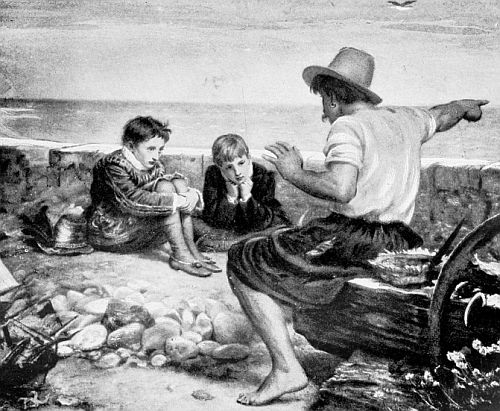
THE BOYHOOD OF SIR WALTER RALEIGH.
(From the picture by Sir J. E. Millais, Bart., P.R.A., in the National Gallery of British Art.)
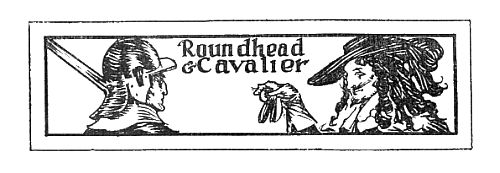
“He nothing common did or mean
Upon that memorable scene,
But with his keener eye
The axe’s edge did try;
Nor called the gods with vulgar spite
To vindicate his helpless right,
But bowed his comely head
Down, as upon a bed.”
 HE incident you are now to witness is without a
parallel in the history of our land. The scene
opens in Westminster Hall, the vast building erected
for the judicial courts of the realm by William the Second.
There is a troop of horse in the courtyard, and armed men
guard the doors. Now a procession enters, and as the doors
open to admit it you hear loud shouts of “Justice! justice!”
from the mob in the courtyard. At the head of the procession
are officers bearing the mace and the sword of state;
behind them, in black robes, you see John Bradshaw, and
with him a number of members of Parliament. He takes
his seat on a chair of crimson velvet, and his companions
range themselves to the right and left of him. The sword
and the mace are placed on the table at which the clerk sits,
and the doors are flung open. At once a tumultuous crowd
rushes in, eager to witness the dread ceremony. They
struggle for places, and the hall rings with their shouts.
At length order is restored, and the clerk reads the Act of
Parliament constituting the court. Then the roll of judges
is called over. Out of one hundred and thirty-five on the
list only sixty-nine answer to their names.
HE incident you are now to witness is without a
parallel in the history of our land. The scene
opens in Westminster Hall, the vast building erected
for the judicial courts of the realm by William the Second.
There is a troop of horse in the courtyard, and armed men
guard the doors. Now a procession enters, and as the doors
open to admit it you hear loud shouts of “Justice! justice!”
from the mob in the courtyard. At the head of the procession
are officers bearing the mace and the sword of state;
behind them, in black robes, you see John Bradshaw, and
with him a number of members of Parliament. He takes
his seat on a chair of crimson velvet, and his companions
range themselves to the right and left of him. The sword
and the mace are placed on the table at which the clerk sits,
and the doors are flung open. At once a tumultuous crowd
rushes in, eager to witness the dread ceremony. They
struggle for places, and the hall rings with their shouts.
At length order is restored, and the clerk reads the Act of
Parliament constituting the court. Then the roll of judges
is called over. Out of one hundred and thirty-five on the
list only sixty-nine answer to their names.
“Mr. Sergeant,” says the president, “bring in the prisoner.”
There is a deep hush, and you hear the tramp of armed men and the clank of scabbards on the pavement. A guard of thirty-two officers leads the prisoner to a chair of crimson velvet at the bar. Now you see him clearly; he is none other than Charles Stuart, King of England.
Look at him well. He is tall, dark, and handsome, with a long, fine face, large black eyes, thick eyebrows, a pointed beard, and black, curly hair streaked with silver. His whole aspect is noble, dignified, and refined. He is a chaste, temperate man, devout at prayers, a good father, and a fond husband, a lover of music and painting. Nevertheless he is faithless by nature, and addicted to dark and crooked ways. Seldom or never is he straightforward in his dealings. He is firmly convinced that between him and his subjects there can be no agreement which will bind him, and he holds that whether he keeps a promise or breaks it is a matter for him to decide, and for him alone. He has inherited his father’s beliefs in the doctrines of the Divine right and the absolute power of kings, and he has pushed these doctrines to such utmost extremes that he has plunged the nation into civil war, and in the contest has irretrievably ruined himself.
He is not a clever man, and he is incurably obstinate. He cannot understand the great movements which have been going on around him. He has never been able to perceive that the time has gone by when men will allow the king to be a tyrant, and permit him to override both the law and the will of the people. For eleven years he has ruled the land without a Parliament, aided by subservient ministers, who have been very geniuses of tyranny, and have goaded and maddened the people by all sorts of illegal expedients. These ministers have gone to the block, and he has been powerless to save them. One of them has died with the ominous words on his lips, “Put not your trust in princes.”
Charles has endeavoured to make himself absolute alike in Church and State. The Puritans, who are now very strong, have been the especial object of his hatred. They have been tormented, fined, whipped, pilloried, and imprisoned. His wife is a Roman Catholic princess, whose intrigues have still further brought him into bad odour, and he has showed such favour to those of her faith that the Puritans bitterly denounce him. Many earnest men of less fanatical mind have long ago come to the conclusion that unless he is removed all freedom will be banished from the land.
Fifteen years ago John Hampden refused to pay an illegal tax, and though he was heavily fined, his resistance thrilled all England and made him “the argument of all tongues.” The patience of the Scots also broke down, and they indignantly refused to permit the king to alter their mode of worship. In the churchyard of Greyfriars, Edinburgh, they signed their bond of resistance with blood and tears. Charles would gladly have chastised them, but his soldiers were unwilling to fight and his treasury was empty. In this plight he was forced to call a Parliament, which was full of opponents, who were determined to grant no supplies until the causes of all grievances were pulled up by the roots. But when this Parliament had done much good work for liberty, the members split on religious questions, and Charles, profiting by their dissensions, was safe for a time.
Suddenly terrible news arrived from Ireland. The native Irish, who were Roman Catholics to a man, had attacked the Protestant English colonists, and had slaughtered five thousand of them with horrible cruelty. The leader of the Irish had showed his followers a letter purporting to come from the king and encouraging him to the massacre. The letter had the royal seal attached to it, and looked genuine, but it was a forgery. The English Puritans, however, were now ready to think the worst of Charles, and they firmly believed that he had instigated the Irish to slaughter their fellow-countrymen and his own subjects. When Parliament reassembled, the Puritan leaders drew up a long list of all the illegal acts which the king had done, and issued it as a manifesto to the nation. Tact and conciliation might have worked wonders at this time, but Charles was in no mood for pacific measures. His wife urged him to go to Parliament and seize the five Puritan leaders. “Pull the rascals out by the ears,” she cried, and in fatal hour Charles took her advice. He went down to Westminster at the head of five hundred men, and entered the House only to discover that “the birds had flown.” The five members had escaped to the city, and the king was foiled and humiliated. He left the House amidst low mutterings of fierce discontent and loud cries of “Privilege! privilege!” The London militia rose in arms to protect the five members, and war could no longer be avoided.
In April 1642 the king rode to Hull, where there was a large magazine of arms and gunpowder, and demanded admittance. The gates were shut in his face, and the governor declared that he would only take orders from Parliament. This was the first act of war.
On the stormy evening of August 22 the king raised his standard at Nottingham, and when it was blown down there were many who saw in the occurrence an evil omen. Then began a series of miserable years, during which father fought against son and brother against brother. The fortune of war at first favoured the king; but the tide turned, and the forces of the Parliament gradually gained the upper hand. It was inevitable that they should win: London and the most populous and wealthy part of the country were with them; the great military genius, Cromwell, rose amongst them; and a deep, religious fervour inspired them.
For three years the land rang with the tumult of battle, but on one June day in the year 1645 the crisis arrived. The Parliamentary horsemen scattered the Cavaliers of the king like chaff before the wind, and they were never dangerous again. The king fled from the field, and in his captured baggage the victors found damning proof of his intrigues with the French and the Irish, and proposals that foreign armies should come over and subdue his revolting subjects.
The king’s cause was now desperate, and he rode to the camp of the Scots, who had come to the assistance of the English Parliament, and yielded himself to them. The Scots were glad to have him, and were ready to restore him to his throne if he would promise to support Presbyterianism in Scotland and make the Church of England a Presbyterian Church. Charles indignantly refused to make the Church which he loved so well the price of his freedom, and the Scots handed him over to the Parliament. At this time the Parliament was divided in opinion. The Presbyterians, who were the stronger party and had the custody of the king, were eager for peace, so they offered to set Charles on his throne again if he would agree to their demands, which included the abolition of bishops in the English Church. Charles had sworn that he would never sacrifice his crown or his Church even to save his life, and he kept his word. But for months he would not give a straightforward answer. He tried every sort of shift and trick to gain time, and in doing so disgusted many of those who would gladly have been his friends.
Now the army, which was largely composed of Independents, took matters into its own hands. It seized the king, marched to London, expelled the members of Parliament opposed to it, and so obtained a majority. But even the stern men who had overthrown the king on the field of battle were ready to offer him terms which he might easily have accepted. He refused them, because he was still hopeful of regaining his throne without making terms. It was an evil hour when he rejected the final olive branch. When a Royalist rising took place in Scotland, and a second and quite unnecessary civil war broke out in England, the army felt that the end of his tether had come. They hopelessly crushed the royal forces in less than three months, and the king’s doom was sealed. The Independent remnant of Parliament passed a Bill for bringing him to trial, and appointed a High Court of Justice for the purpose.
Now you know why Charles faces a court of his subjects in Westminster Hall. Now you know why the members keep their hats on their heads, and refuse to show him honour. To them he is a malefactor, a “man of blood.” He is now sitting in his chair waiting for the proceedings to begin. Bradshaw rises and says:—
“Charles Stuart, King of England, the Commons of England assembled in Parliament, taking notice of the effusion of blood in the land, which is fixed on you as the author of it, and whereof you are guilty, have resolved to bring you to a trial and judgment, and for this cause the tribunal is erected. The charges will now be read by the Solicitor-General.”
As the Solicitor-General rises to speak, the king touches him with his cane on the shoulder and cries “Silence!” The head of the king’s cane falls off! It is a ghastly portent, and the king himself shows a momentary sign of emotion. Then the Solicitor-General reads out a long indictment, and concludes by demanding that justice be done upon the king as a tyrant, traitor, and murderer. At these words Charles laughs in the face of the court.
Usually he hesitates in his speech, but to-day he is very fluent. He refuses to plead before such a court. He tells his judges that they are an illegal meeting appointed by a mere remnant of the House of Commons. Again and again he declares that they have no authority to sit in judgment on him.
Then Bradshaw cries, “Take away the prisoner. The court adjourns to Monday next.” The escort marches up, and the king rises to depart with them. As he does so his eye falls on the sword placed on the table. “I do not fear that,” he says, pointing to it with his cane. Then he is led forth, and the populace greet him with mingled cries of “Justice! justice!” and “God save the king!” “God save your Majesty!”
On Monday the court sits again, and the king makes the same protest. On Tuesday the same scene is enacted, and meanwhile popular sympathy for the royal prisoner is growing rapidly. The shouts of “Justice!” and “Execution!” are now only raised by the soldiers. The crowd cries “God save the king!” whenever it can do so with impunity. As the hours pass by the same cry is heard amongst the troops. A soldier of the guard who has dared to say to the king, “Sire, God bless you!” is struck by his officer. “Methinks,” says Charles, “the punishment exceeds the offence.”
On Wednesday and Thursday the court meets to hear evidence, and then retires to consider its verdict. On the 27th, at noon, it assembles again, and all men notice that Bradshaw wears a red robe in place of the customary black. As the roll of judges is called over there is no response to the name of Fairfax. Suddenly the silence is broken by the voice of his wife in the gallery, “He has too much wit to be here.” The king enters, and loud shouts of “Justice!” “Execution!” are raised by the soldiers, but the crowd is silent.
The president harangues the prisoner; but when he speaks of the crimes charged against him in the name of the people of England, he is cut short by the voice which has answered to the name of Fairfax, “Where are they or their consents? Oliver Cromwell is a traitor!”
Excitement and confusion break out for a space, but the cry of “Justice! execution!” is again raised. The king, almost beside himself, passionately cries, “Hear me! hear me!” but he is not permitted to speak. Then Bradshaw delivers a long and solemn address, the clerk reads the sentence, and the judges stand in their places to signify their assent. The king again tries to speak, but being considered dead in law is not permitted to do so. He is led away, and as he leaves the hall the soldiers on the stairs puff smoke in his face and hurl the grossest insults at him. But outside the mob shouts, “God save your Majesty!” “God deliver your Majesty from the hands of your enemies!” The soldiers retort with cries of “Justice!” “Execution!” and the king, who has now regained his serenity, observes, “Poor souls! for a piece of money they would do so to their commanders.”
The condemned king is lodged in St. James’s Palace, where he is allowed to take a last fond farewell of his weeping children. He takes the little boy on his knee, and says, “My dear heart, they will soon cut off thy father’s head. Mark, child, what I say: they will cut off my head, and perhaps make thee king; but thou must not be king so long as thy brothers Charles and James live. I charge thee, do not be made a king by them.” To which the child replies amidst its tears, “I will be torn in pieces first.” The children are removed, and the king spends the few remaining hours in prayer with his good friend Bishop Juxon. On January 30, between two and three in the afternoon, he is led by armed men through the leafless avenues of St. James’s Park to his palace of Whitehall, before which a scaffold draped with black has been erected. All marvel at the calm dignity which he displays.
The scaffold is hedged round with soldiers, and the headsman stands beside the block. The king, with head erect, steps through an opening in the wall of the banqueting hall on to the scaffold. He addresses himself to the bystanders, and in the last words he utters he shows clearly that he has not abandoned his fatal theory of kingship. Then he turns to the good Juxon, who says, “There is but one stage more, sire; it is full of trouble and anguish, but it is a very short one, and it will carry you a great way—from earth to heaven!” “I go,” returns the king, “from a corruptible to an incorruptible crown, where I shall have no trouble to fear.” Then with a mysterious admonition—“Remember!”—he lays his head on the block. The axe falls, and a deep groan of pity and horror goes up from the people.
A blood-red line has been ruled across the page of our national history—the Old Rule has gone; the New Rule has yet to appear.
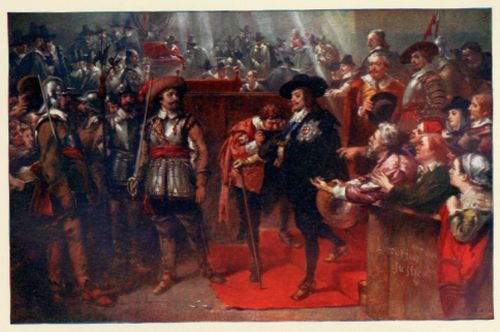
Charles I. leaving Westminster Hall after his Trial.
(From the picture by Sir John Gilbert, R.A., in the Mappin Art Gallery, Sheffield. By permission of the Corporation of Sheffield.)
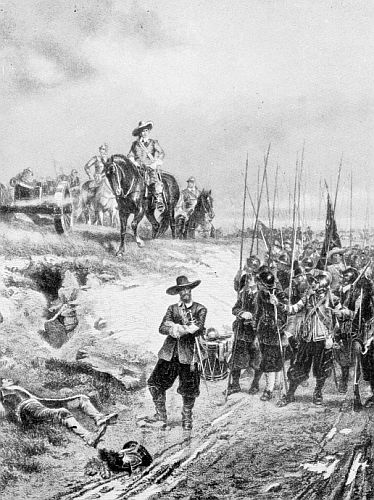
CROMWELL AT MARSTON MOOR.
(From the picture by Ernest Crofts, A.R.A.)

“Cromwell, our chief of men, who through a cloud
Not of war only, but detractions rude,
Guided by faith and matchless fortitude.”
Six years have come and gone since the execution of Charles the First, and England has had no king in the interval. The great, strong man, Oliver Cromwell, who by his military genius has overthrown the king and made the army supreme, has crushed all opposition by the weight of his iron hand. At the head of his buff-coated Ironsides—men with psalms on their lips and ruth in their hearts—he has stamped the very life out of Ireland, and by a happy accident, which he believes to be an interposition of Providence, he has reduced Scotland to impotence. Now he is master of three kingdoms, and only the remnant of an old Parliament stands in his way. The “Rump,” as it is contemptuously called, refuses to dissolve, so Cromwell strides into the House and, after roundly rating the members, stamps on the floor. At the signal armed men enter and proceed to drive out the occupants of the chamber. The Speaker refuses to leave the chair, and tries to speak, but his voice is drowned in the uproar. Then one of Cromwell’s friends offers to lend him a hand to come down, and the Speaker, yielding to force, does so. Pointing to the mace, the symbol of the authority of the House of Commons, Cromwell cries, “What shall we do with this bauble? Here, take it away!” and a soldier removes it. Then he locks the door and strides away with the key in his pocket, while a wag chalks up on the building, “This house to let.”
Six weeks later he summons another Parliament, and finds it composed of fanatics and doctrinaires who are passionate admirers of his, but propose to overturn every established custom. Under the leadership of “Praise-God Barebone” it actually suggests that the law of England shall be superseded in favour of the law of Moses! The members quarrel fiercely, and at last give up to the Lord-General the powers which they have received from him. The Council of State begs him to become Lord Protector, with rights and duties which differ very little from those of a king, and he accepts the proffered honour. Nine months elapse, and another Parliament is called; but it is a hindrance to the Lord Protector’s schemes, and is dissolved. Another takes its place, and offers to make Cromwell king. He refuses, for the name of king is loathsome to him, and he is already king in all but name. Then this Parliament goes the way of the others, and Cromwell never calls another.
You see him now an even more absolute ruler than “martyred Charles:” he is a despot, but with a difference. Whatever his detractors may say of him, this cannot be disputed, that never was the sceptre of England wielded by a more vigorous or sagacious hand. His protectorship, compared with any preceding age, or with several ages succeeding it, was an era of toleration, justice, and law. Weakened though she was by the Civil Wars, England rose to respect and greatness abroad, and foreign tyrants and persecutors trembled at her name. “We always reckon,” said a Royalist bishop, “those eight years of the usurpation as a time of great peace and prosperity.” Trade and commerce increased, and the land grew wealthy and great; yet all the while Cromwell was bitterly hated, and his life was always in peril. He wore mail beneath his clothes, and slept in a different room almost every night. Despite his ever-present danger, he went his way fearlessly, though expecting a pistol-shot from every dark corner.
Now let us witness a scene which shows Cromwell at his best. You see before you the interior of a room in the palace of Whitehall. Seated carelessly on a table is the Lord Protector. He is a man of massive build, with a “figure of sufficient impressiveness: not lovely to the man-milliner species, nor pretending to be so.” A massive “head so shaped as you might see in it a storehouse and shop of a vast treasury of natural parts. . . . On the whole, a right noble lion-face and hero-face; and to me royal enough.” He is careless in his dress, utterly indifferent to externals, and wholly without affectation. He is the man who warned Lely, when painting his picture, to put in all the roughnesses, pimples, and warts of his countenance, or he would not pay a farthing for the work. Hard, stern, implacable in warfare, he is nevertheless simple, loving, and pure in his private life, sincerely and ardently religious, and convinced to the bottom of his soul that he is a chosen instrument “to do God’s people some good.” True, he owes his power to the sword; but he wields that power so well, and stoops to so little that is mean or base, that future generations will have good cause to rejoice that the guidance of the state was for a brief space of years entrusted to him.
At the other end of the table sits John Milton, that inspired poet of whom Wordsworth wrote:——
“His soul was like a star, and dwelt apart;
So didst thou travel on life’s common way
In cheerful godliness.”
Look at his noble face, which reflects in its every expression the splendid mind with which he is gifted and the noble thoughts which flit through it. No man ever served the Muses with such exquisite devotion. He comes to his desk as a knight to his vigil, believing that no man can worthily write of great things unless his life is worthily lived. He loves virtue with all the passion of his nature——
“She can teach ye how to climb
Higher than the sphery chime.”
And now he is engaged on a task which enlists all his sympathy, and sends a throb of righteous indignation through his veins.
He is Latin Secretary to the Council, and it is his task to Latinize all communications to foreign states. Cromwell has heard that in the valleys of Piedmont the Waldenses, a body of dogged Puritans, are being persecuted by the Duke of Savoy, who is harrying them with savage cruelty, and has already slain thousands of them. Cromwell is greatly moved by the news, and his anger breaks forth in a torrent of inconsequent words. The upshot, however, is clear to Milton: France shall receive those attentions which have made the English fleet the terror of the Mediterranean, unless an immediate end is put to the persecution. Milton has already written the most sublime of all his sonnets on this subject:——
“Avenge, O Lord! Thy slaughtered saints, whose bones
Lie scattered on the Alpine mountains cold;
Even them who kept Thy truth so pure of old,
When all our fathers worshipped stocks and stones,
Forget not; in Thy book record their groans
Who were Thy sheep, and in their ancient fold
Slain by the bloody Piedmontese that rolled
Mother with infant down the rocks. Their moans
The vales redoubled to the hills, and they
To heaven. Their martyred blood and ashes sow
O’er all the Italian fields, where still doth sway
The triple Tyrant; that from these may grow
A hundredfold, who, having learned Thy way,
Early may fly the Babylonian woe.”
Cromwell has already sent £2,000 out of his own purse to the sufferers. Now he dictates his stern message, and Milton translates it into resounding Latin of such force and fervour that Cardinal Mazarin dare not ignore its purport. The Duke of Savoy and the cardinal may gnash their teeth with rage, but, with the whole power of France at their command, they dare not again lift a finger against the Waldenses while Cromwell lives. No incident in the whole history of the Commonwealth reveals more clearly the salutary fear which the name of Cromwell excites on the Continent.
But his days are numbered. In three short years he will go hence, and in two years more a Stuart will sit on the throne, and at his coming England will be “reduced to a nullity”—aye, and worse, to reproach and shame. Worn out with constant anxiety, the death of a favourite daughter brings him speedily to the valley of the shadow. “I would be willing to live,” murmurs the dying man, “to be further serviceable to God and His people; but my work is done.” He lies on his deathbed while a great storm rages over England. In the morning calm succeeds tempest, and on the anniversary of his great victories at Dunbar and Worcester he breathes his last. They bury him in Westminster Abbey, amidst the kings; but his bones are not long to rest in that hallowed fane. The Stuart king, to his everlasting shame, will tear the unoffending body from its coffin and gibbet it in unavailing contempt. But ages to come will do him tardy justice, and men will come to honour his memory even while they lift their hats and pray, “God save the king!”
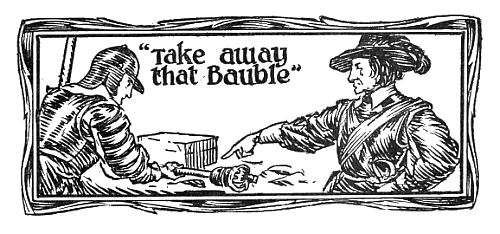
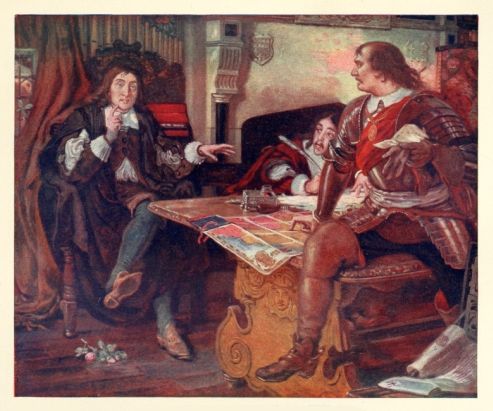
Cromwell dictating Dispatches to Milton.
(From the picture by Ford Madox Brown, in the Manchester Art Gallery. By permission of the Manchester Corporation.)
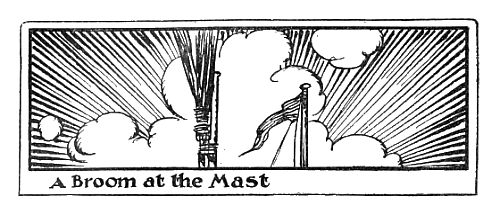
“Where Blake and mighty Nelson fell
Your manly hearts shall glow,
As ye sweep through the deep,
While the stormy winds do blow,
While the battle rages loud and long,
And the stormy winds do blow.”
An admiral sits writing at a table in the cabin of his dismasted flagship, the Triumph. He is a short, squat, ungainly man, but within that unprepossessing exterior there is one of the most heroic and purely patriotic souls that ever existed. His heavy face is clouded by deep depression. He is a beaten man, and he is even now inditing the frank and ungarnished story of his defeat to the Lords of the Council. “Your honours,” he writes, “I hope it will not be unreasonable for me to desire your honours that you would think of giving me, your unworthy servant, a discharge from this employment so far too great for me, that so I may be freed from that burden of spirit which lies upon me, arising from the sense of my own insufficiency.” He finishes his task, signs it “Robert Blake, Admiral,” strews the sand upon the wet ink, folds the missive, and dispatches it.
What is the meaning of this scene? You see a man of the sublimest courage and the most ardent patriotism humiliated and vexed with himself because he has failed to achieve the impossible. A little more than a month ago he met the Dutch fleet, and fought a furious battle which raged until nightfall, when the foe, too severely handled to continue the struggle, drew off and sailed for home. “Nothing in this to be ashamed of,” you will say; but you do not yet know the whole story.
After the victory—for such it was—the Commonwealth, feeling secure, dispersed the fleet either on various detached services or to refit, and left Blake with only thirty-seven ships to guard the Channel. The Dutchmen, on the other hand, flung themselves heart and soul into the work of preparing a fleet which should speedily cancel their reverse and restore that great prestige which they then enjoyed as the first of maritime nations. Yesterday this fleet of eighty ships of war, convoying three hundred merchantmen, appeared off the Goodwins, standing to the southward, and evidently about to force the strait in defiance of its guardian. As the vast and well-equipped fleet of the Dutchmen hove in sight Blake called a hasty council of war, and announced his determination of attacking it with the wholly inadequate forces at his command. It was a venture rash almost to the verge of madness, but Blake could not sit still and see the proudly defiant foe go by without attempting to chastise it. Twice before he had met the Dutchman and belaboured him; he would do so again.
In the battle which followed, the wind blew Blake’s leading ships into the midst of the enemy. A stout fight was stubbornly maintained against tremendous odds; but the Dutchmen were overwhelmingly strong, and by evening two English ships had been captured, one had been burnt, another had blown up, and the remainder, under cover of the darkness, had staggered into Dover for safety. And now the Channel is full of Dutch ships, and their admiral, in the arrogance of victory, has hoisted a broom at his masthead to signify that he has swept the narrow seas clean! No wonder Blake is sick at heart; no wonder he writes himself down failure, and begs to be relieved of his command. But to-morrow he will be himself again. The Council will refuse to supersede him; they will cheer him with tokens of their confidence; they will immediately set about repairing their errors, and will speedily give him a fleet adequate to the work which they expect him to do. They know full well the splendid courage and the unswerving fidelity of their admiral, and they repudiate the “insufficiency” which, with the modesty of the truly brave, he ascribes to himself.
And now, before we relate the story of his subsequent exploits, let us learn something of his earlier career. As a young Oxford scholar he coveted a fellowship, but his appearance offended the artistic eye of the warden of his college and he was passed over. When the Civil War broke out he was forty-three years of age, and his sentiments were strongly republican. Joining the Parliamentary army, he was entrusted with the defence of a post at Bristol, which was then besieged by the Royalists. The town was yielded by the governor after a feeble resistance, but Blake resolutely held on to his post for twenty-four hours after the capitulation was signed. He was compelled to yield, and narrowly escaped hanging; but the eye of the Parliament was now upon him, and before long he found himself entrusted with the defence of Taunton town.
The place was wholly without defences. It had no forts, no walls, and only a meagre garrison of eighty men. Nevertheless, it was a most important strategic post, situated at a point on which all the main roads converged, and Blake saw that it must be defended at all costs. He worked like a Trojan, and inspired his men to similar efforts. Roads were barricaded, breastworks were thrown up, guns were mounted, houses loopholed, and the Royalists, unable to carry it by storm, were forced to invest it and wait for famine to do its deadly work. The little garrison grew terribly hungry, but Blake was as blithe as a lad on a holiday escapade. When only one pig remained, he had it driven about the town and whipped from time to time, so that its squeals might delude the besiegers into the belief that he still possessed a whole herd of porkers. When the Royalist captain sent in a ragged messenger to treat for terms, Blake dismissed him with a new suit of clothes! Taunton never yielded. After the battle of Naseby the siege was raised, and Blake emerged from his heap of ruins a man of mark. He had delayed a whole army in the west, and had enabled the Parliamentary army in the Midlands to win the decisive battle of the Civil War.
When the second Civil War broke out, part of the fleet declared for the king, and, under Prince Rupert, the “mad Cavalier,” was giving much trouble. A fleet was fitted out to meet this new danger, and, somewhat inexplicably, Blake was chosen as one of the generals-at-sea. Probably Cromwell thought that the man who could defend Taunton town could defend anything. Blake knew little more about naval matters than the Duke of Medina Sidonia; but he was a born sailor, and before long he was a master of seamanship in all its intricacies. Rupert was a most difficult man to catch; but Blake cornered him at last, and at Cartagena drove his ships ashore and set fire to them. For this exploit Blake received the grateful thanks of Parliament and a sum of one thousand pounds.
Blake had now to meet a much more powerful foe than Rupert. The Dutch and the English, old allies against Spain, were now at daggers drawn. Ill-feeling between the two nations had been long rife; now it came to a head. Holland swarmed with Royalist exiles, and the Government showed them much friendship. A Commonwealth envoy was murdered, and the Dutch Government would give no satisfaction for the outrage. Further, and beyond all, the two nations were rivals in trade, and the Dutch were going ahead every day. The bulk of the carrying trade of the world was in their hands; they waxed fat and kicked. The heads of the Commonwealth knew that war with Holland would be popular, and in spite of Cromwell’s opposition they proceeded to provoke it. A Navigation Act was passed, aimed directly at Dutch trade. Henceforth no goods were to be imported into England unless they came in English ships or in those of the country which produced them. This hit the Dutch hard, and war began.
Under Van Tromp, a genuine son of the Vikings, who had risen from cabin-boy to admiral, the Dutch sent to sea a magnificent fleet of one hundred sail, which the raw English navy could scarcely hope to beat. The first shot was fired off Dover in May 1652, and you already know something of the course of events up to that bitter day in November of the same year, when Blake was beaten by a largely superior force of the enemy, and wrote despairingly to the Council of State to suggest that he should be retired on account of his “insufficiency.” You know, too, what their answer was. They were true to their promise, and by the middle of February 1653 Blake was provided with more than seventy sail, ready to renew the contest.
He had not long to wait for a chance of retrieving his credit. Tromp, with ninety ships, was returning with the home-coming fleet from the Indies, and Blake was scouring the Channel looking for him. On Friday, February 18, Blake sighted him; but Tromp took him at a disadvantage, and he had to bear the brunt of the fighting with his single division of twelve ships, the remaining divisions under Penn and Monk being then at a considerable distance from the scene of the battle.
The battle raged fiercely round the Triumph, and Blake was in the utmost peril. He himself was severely wounded, and large numbers of his men fell around him. Four ships were captured, and the end seemed near, when Penn and Monk arrived. At once the fight assumed a different complexion, and the captured ships were retaken before nightfall suspended the battle. Neither side could yet claim the victory, and the loss of both, though very great, was fairly equal. In the night Tromp slipped off; but he was followed, and the battle was resumed. The “four days’ battle” ended on Sunday the 20th. Five Dutch ships had been sunk and four captured, as well as some thirty or forty merchant vessels. Tromp, however, got the remainder away safely by dint of clever seamanship. The Dutch had been beaten, but they were by no means dismayed, and immediately began to make preparations for a renewal of the struggle.
While Blake was making a slow recovery from his wound news arrived that the Dutch were again at sea. Before, however, he could reach the fleet a great battle had been fought. He and his squadron did not arrive till late in the afternoon, but their coming turned the victory into a rout. Tromp’s vessel was boarded; but to save her from falling into the hands of his foes, he blew her up, and by a miracle saved both himself and his ship. Another English victory followed, in which the gallant Tromp was killed, and then the war was brought to a close. Holland paid a war indemnity, and agreed that the English were masters of the sea. Henceforth the Dutch might only pass through the Strait of Dover by the kind permission of England. Blake and Monk received the thanks of Parliament, gold medals, and gold chains valued at £300. A few weeks’ rest restored Blake to health so far as to enable him to return to the fleet, and all was ready for his next exploit.
Cromwell, now dictator, turned his attention to Spain, which was the most dangerous trade rival of the English Puritans in America. Accordingly, in 1654, he sent out two fleets, one to the Mediterranean under Blake, the other to the West Indies under Penn and Venables. Blake had a general commission to protect British commerce, and this he interpreted as permission to attack the Barbary pirates, who levied blackmail on all the commerce of Europe passing their shores. Scores of luckless merchantmen bound for the Levant were boarded and rifled, and their crews carried off as slaves. Possibly the compilers of the English Church Litany had the sufferings of thousands of their fellow-countrymen in mind when they wrote, “That it may please Thee to show Thy pity upon all prisoners and captives.” Blake ran into the harbour of Tunis in spite of fleet, castles, moles, batteries, and musketeers, and in a few hours nine vessels of the pirate fleet were in flames, and he was outward bound, congratulating himself on a good work well done. This gallant exploit made the British name a terror in the Mediterranean. He now visited the chief ports of the western Mediterranean “to show his flag” and everywhere he was received with fear and trembling.
He returned to England in October 1655, but spent little time ashore, for the Protector had now a daring task to set him. Penn and Venables had failed miserably in the West Indies, and British arms had suffered a discreditable reverse. Cromwell was not the man to overlook failures of this sort. He promptly sent the quarrelsome officers to the Tower, and dispatched Blake to the Spanish Main to do the work properly. In a preliminary cruise off the Spanish coast he captured several Plate ships, and in 1657 he set sail for Santa Cruz, in Teneriffe, where he accomplished his last and most brilliant feat. Within the horseshoe-shaped harbour, belted with forts mounting the heaviest artillery then known, lay sixteen great galleons, all well armed. The Spaniards boasted that within that death-trap their treasure-ships were absolutely safe. The historian of the time wrote truly: “All men who knew the place concluded that no sober men, with whatever courage soever endued, would ever undertake it.”
Blake discovered that the six largest galleons were drawn up in line, commanding the entrance to the harbour, and that behind them were the other ships. When he learnt this he might have repeated Cromwell’s exulting cry at Dunbar, “The Lord hath delivered them into my hands.” If he ran in with a fair wind and a flowing tide beneath the walls of the great fort at the entrance, little harm could come to him, for its great guns could not readily be depressed so as to stay his progress. Further, the massing of the largest galleons at the harbour mouth covered the fire of the ships behind, and prevented several of the forts from firing lest they should injure friend and foe alike.
To make a long story short, Blake dashed into the harbour, attacked at the very closest quarters, and before evening had burnt, blown up, or sunk every Spanish ship in it. Then, under cover of the dense masses of smoke blowing seaward, the British ships crept out into safety, with not above fifty men slain outright and one hundred and twenty wounded. Nothing so daring or so brilliant had ever been accomplished before, not even by Drake when he “singed the King of Spain’s beard.” The sea-power of Spain was absolutely annihilated, and England rang with the praises of the man who had done it.
A public thanksgiving was held, and the Protector wrote to the victorious admiral: “We cannot but take notice how eminently it hath pleased God to make use of you in this service, assisting you with wisdom in the conduct and courage in the execution; and have sent you a small jewel”—his own portrait set in gold and diamonds—“as a testimony of our own and the Parliament’s good acceptance of your courage in this action.”
Blake now sailed for home, and his countrymen eagerly waited his coming. Alas, he was never to tread the shores of his native land again, never to see the fields and hedgerows, the hills and moorlands of his dear-loved West Country. Worn out by the fatigues and anxieties of warfare, he grew feebler day by day, and constantly asked if the shores of England were in sight. When at last the look-out at the masthead cried “Land O!” Blake was a dying man. He called his captains to him and bade them farewell. Then just as his ship entered Plymouth Sound he breathed his last.
In what lay the great glory and inspiration of Blake’s life? Not so much in his brilliant achievements, not so much in the care and forethought which he exhibited, as in his chivalrous character and splendid patriotism. His men loved him and honoured him because his honour and honesty of purpose were unimpeachable, and because he had no trace of self-seeking in his character. His first and only thought was for the honour and glory of his land. He was a British sailor—nothing more and nothing less. To him was entrusted the sacred jewel of the national honour, and never was it placed in cleaner or more zealous hands. “It is not for us,” he once declared, “to mend state affairs, but to keep foreigners from fooling us.” This was the watchword of his life, and this was his fame.
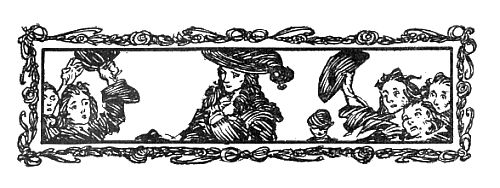
“Who comes with rapture greeted, and caressed
With frantic love,—his kingdom to regain?”
 T is the 29th of May, 1660, and London is a gala city.
The streets are hung with tapestry; flags and banners
wave from the housetops; the citizens in their best
attire throng the streets; the mayor, aldermen, and the gilds
in all their bravery of ceremonial robes and gold chains
hie them to the city gates; every balcony is full of lords and
ladies clad in the sumptuous trappings of state; drums roll,
trumpets sound, and bells clash from the steeples. The
guns of the Tower roar out a welcome, and loud cries
of “The king! the king!” are heard. His procession
approaches “with a triumph of twenty thousand horse and
foot, brandishing their swords and shouting with inexpressible
joy.” Now you see him sitting his horse with easy
grace, and bowing calmly as he responds to the acclamations
of the crowd. He is tall and graceful, his countenance somewhat
swarthy and forbidding. He smiles as maidens strew
flowers in his way and men cheer until they can cheer no
more. “It must be my own fault,” he says, “that I have
not come back sooner, for I find nobody who does not tell
me that he has always longed for my return.”
T is the 29th of May, 1660, and London is a gala city.
The streets are hung with tapestry; flags and banners
wave from the housetops; the citizens in their best
attire throng the streets; the mayor, aldermen, and the gilds
in all their bravery of ceremonial robes and gold chains
hie them to the city gates; every balcony is full of lords and
ladies clad in the sumptuous trappings of state; drums roll,
trumpets sound, and bells clash from the steeples. The
guns of the Tower roar out a welcome, and loud cries
of “The king! the king!” are heard. His procession
approaches “with a triumph of twenty thousand horse and
foot, brandishing their swords and shouting with inexpressible
joy.” Now you see him sitting his horse with easy
grace, and bowing calmly as he responds to the acclamations
of the crowd. He is tall and graceful, his countenance somewhat
swarthy and forbidding. He smiles as maidens strew
flowers in his way and men cheer until they can cheer no
more. “It must be my own fault,” he says, “that I have
not come back sooner, for I find nobody who does not tell
me that he has always longed for my return.”
He passes on to Whitehall and takes possession of the palace from which his father stepped on to the scaffold. Courtiers and sycophants, and honest men with tears in their eyes, crowd the presence-chamber to kiss his hands and wish him a long and happy reign, while the citizens outside give themselves up to unrestrained joy. A special Lord Mayor’s show is paraded as part of the festivities, and several of the pageants represent scenes from the life of the king who has just come into his own again.
Look at this device now passing on a great wheeled platform. It is a scene in Boscobel Wood. In the midst is a spreading oak, and high in the branches you see a figure representing Charles hiding from the Commonwealth soldiers, who are searching for him below. This incident actually happened just nine years ago, after the “crowning mercy” of Worcester, when Cromwell thoroughly routed the Royalists and the young prince was a hunted fugitive. Another scene in the show represents him riding towards safety as the servant of faithful Jane Lane, who sits behind him trembling with anxiety. The fugitive is now receiving the obeisance of a gay, glittering throng in the palace of his sires. As he does so he recalls the shifts and subterfuges, the hairbreadth escapes, the privations and perils of those dark days, and bitterly contrasts the glorious present with the long years of his shabby and penurious exile.
And now he is crowned and anointed king—hailed with enthusiasm by the very men who overthrew his father and consented unto his death. How has this wondrous change come about? Cromwell built his power on the sand, and with his last breath it fell to pieces like a house of cards. His son Richard, an easy-going country squire devoted to hawking, hunting, and horse-racing, hated the greatness which was thrust upon him, and within a year laid down his office. Then “Honest George” Monk, in command of the army in Scotland, saw that the hour had arrived when his countrymen were eager for steady and lawful government in place of the harsh and uncertain rule of the sword. He marched south, and the Londoners hailed him with wild shouts of delight. Like the Israelites of old time they cried, “Give us a king to reign over us,” and Charles was invited to return and claim his birthright.
The monarchy has been restored, and what manner of man is he who sets up the throne anew? Nature has given him excellent parts and a good temper; he has polite and engaging manners and a unique experience of the world; but otherwise he is utterly selfish and utterly ungrateful, “without desire of renown and without sensibility to reproach.” He is a cynic; he has absolutely no faith in human nature; he believes that every man has his price; and he values his kingship precisely for the amount of selfish indulgence which it can afford him. The father who was sent to the block was an angel of light compared with the son who has now been recalled to fill the empty throne. Forthwith he tramples all that is good as well as all that is harsh and unlovely in Puritanism under foot. He sets the nation a shameless example of licence and frivolity, and his subjects are not slow to imitate it. His court is filled with every kind of open wickedness; religion is scoffed at; morality, honour, steadfastness, and justice are fit subjects for the ribald jests of reckless roysterers. The pendulum has swung to the other extreme with a vengeance. Never before has national virtue been at so low an ebb.
The reign of Charles was one long reaction in Church, State, and national life. The efficiency of old Noll’s day became a thing of the past. The king wasted huge sums of money on his follies and vices, and the services were shamefully starved. Only fourteen years ago the Dutch were forced to acknowledge England as mistress of the seas; and now they entered the Thames, destroyed Sheerness, sailed up the Medway to Chatham, and burnt eight men of war, while the navy, paralyzed by corruption and mismanagement, was powerless to chastise them. At this humiliation the anger of the nation knew no bounds. “Then at length tardy justice was done to the memory of Oliver. Everywhere men magnified his valour, genius, and patriotism. Everywhere it was remembered how, when he ruled, all foreign powers had trembled at the name of England; how the States General, now so haughty, had crouched at his feet; and how, when it was known that he was no more, Amsterdam was lighted up as for a great deliverance, and children ran along the canals shouting for joy that the devil was dead! Even Royalists exclaimed that the State could be saved only by calling the old soldiers of the Commonwealth to arms. . . . Tilbury Fort, the place where Elizabeth had, with manly spirit, hurled foul scorn at Parma and Spain, was insulted by the invaders. The roar of foreign guns was heard, for the first and last time, by the citizens of London.”
While this ignominious war was raging, London suffered two disasters of such a terrible character that men openly spoke of them as the well-deserved scourges of Almighty God. Turn to the diary of Samuel Pepys, the Admiralty clerk who so faithfully mirrored the loose, careless life of the time, and read the entry of July 7, 1665: “This day, much against my will, I did in Drury Lane see two or three houses marked with a red cross upon the doors and ‘Lord, have mercy upon us’ writ there, which was a sad sight to me, being the first of the kind that to my remembrance I ever saw.” The Great Plague had arrived. Those who were stricken with the disease began to shiver; then they had headaches and were light-headed. On the third or fourth day they fainted suddenly, and spots broke out on the breast. As soon as these appeared, all hope was gone; the poor victim was dead within an hour.
As we follow Pepys’s pages we see alarm spreading, the clergy taking flight to the country, the stoppage of all work and trading, grass growing in the deserted streets, the bells tolling all day long, searchers going about to discover infected houses, dreaded death-carts rumbling over the stones to the mournful cry of “Bring out your dead;” then the last scene of all—the carts shooting their contents into huge pits dug at St. Martin’s in the Fields and at Mile-End. It is a terrible picture, and we shudder as we realize it.
All infected houses become prisons, with watchers at the doors so that none might come out or go in. Pepys tells us that a complaint was brought against a man for taking a child from an infected house, and the case was inquired into by the magistrates. They discovered that the child was the little daughter of a saddler. All his other children had died of the plague, and the saddler and his wife were shut up in their house, never expecting to leave it alive. They had one only wish in their despair, and that was to save the life of their little girl. At last they managed to communicate with a friend, who promised to take her away from London. The child was handed down from the window stark naked, and the friend, having dressed it in fresh clothes, took it to Greenwich, where, when the story was known, it was permitted to remain.
In all, the death-roll of that terrible year reached nearly 100,000, or about one-fifth of the total population. The worst time of all was in the first fortnight of September, when the deaths were over a thousand a day. As the summer passed, and the cold, high winds of winter blew, the plague gradually passed away.
Scarcely, however, had the dead-cart ceased to go its rounds when fire laid well-nigh the whole city in ruins. It broke out at one o’clock on Sunday morning, September 2, 1666, at the house of a baker in Pudding Lane, not far from the Monument which now commemorates the visitation. Most of the city was then built of wood, and as a high wind was blowing at the time the flames spread rapidly. The citizens could do nothing to stop the fire, and before long the city from the Tower to the Temple, and from the river to Smithfield, was one sheet of flame. A great terror seized the people, but as soon as they recovered from their fright they endeavoured to save what they could from the flames. Five, ten, and even fifty pounds were given for a cart, and the barges and boats on the river were laden to the gunwale with fugitives and their belongings. The fields round London were full of furniture and of people camping out amidst the pitiful remnants of property which they had saved. On Monday night the streets were as light as noonday, and the flames had reached St. Paul’s.
John Evelyn tells us in his diary that the stones flew like bombs, melting lead ran down the streets in streams, and the very pavements were red hot. “God grant,” says he, “my eyes may never behold the like. I now saw about ten thousand houses all in one flame. The noise and cracking and thunder of the flames, the shrieking of women and children, the hurry of the people, the fall of towers, houses, and churches, was like an awful storm. The air was so hot that at last men were not able to approach the fire, and were forced to stand still and let the flames burn on, which they did for nearly two miles in length and one in breadth. The clouds of smoke were dismal, and reached nearly fifty-six miles in length. London was, but is no more!”
At last the fire was checked by blowing up a number of houses with gunpowder. The wind fell, and on Wednesday morning the fire ceased, “as it were by a command from Heaven.” It began at Pudding Lane, and it ended at Pie Corner in Giltspur Street. Actually 13,000 houses and 89 churches were burnt down, but only fourteen persons were killed. Every dwelling and building over an area of 436 acres was destroyed. The fire, however, was a blessing in disguise, for it swept away the foul courts and alleys and destroyed the plague germs lingering in the soil. Wider and more open streets were built, and new and stately churches arose. The genius of Sir Christopher Wren was afforded a unique opportunity. He re-created St. Paul’s, his chief monument, and erected fifty-four churches, each with its own special features, yet all in harmony with the great mother-church of the city.
The restoration of Charles was a triumph for the Church of England, and marked the downfall of that religious toleration which Cromwell had established. At the instigation of Clarendon, the only man of real zeal and probity about the king, the Cavalier Parliament passed a series of spiteful Acts against the Puritans, or Nonconformists, as they may now be called. Henceforth all mayors, aldermen, councillors, and other borough officers must renounce the Solemn League and Covenant, deny the lawfulness of taking up arms against the king, and receive the sacrament according to the rites of the Church of England. This harsh and unfair Act was a great blow to the Nonconformists, and it practically drove them out of local government. They were next excluded from the Church by the Act of Uniformity; and then the expelled ministers began to form congregations outside the pale. But a new Act of Parliament forbidding the holding of all religious services except those of the Church of England, under pain of fine and imprisonment, was speedily passed to keep them forcibly within the fold. This shocking law actually made family worship a crime if more than five persons not belonging to the family were present. Then came another Act which forbade ministers expelled under the Act of Uniformity from teaching in a school or living within five miles of a city or corporate town. Thus the Church system which Laud had lost his head in trying to establish in the reign of Charles the First became the law of the land by the will of the people in the reign of his indifferent and cynical son.
The author of these cruel Acts was not long to sit high in the king’s favour. He was a grave, ponderous man, with the utmost scorn for the idle triflers and wicked spendthrifts amongst whom the king wasted his days. Frequently he took Charles to task for his misdemeanours, and by his importunity goaded him into keeping his promises. “He often said it was the making those promises which had brought the king home, and the keeping of them must keep him at home.” The king’s friends hated the solemn, long-winded Polonius, and one of them used to whisper in Charles’s ear, “There goes your schoolmaster.”
After the second Dutch War, in which England was covered with disgrace, Clarendon was a convenient scapegoat, and Charles dismissed him without a shade of regret and no single mark of gratitude for the long and faithful service which the deposed chancellor had rendered him both in exile and after the Restoration. Clarendon’s fall was the signal for great rejoicing amongst the shameless crew which surrounded the king. As he left Whitehall, disgraced and abandoned, a courtier assured Charles “that this was the first time he could ever call him King of England, being freed from this great man.”
And now, “freed from this great man,” Charles began to descend deeper and deeper into the mire. He formed a ministry of his friends, and laid deep plans for ruling as an absolute king, but without running any undue risks. Hitherto he had laughed at religion; now, when sick and serious, he turned to the Church of Rome, and desired to re-establish it in his land, but again without running undue risks. On one principle and one principle alone Charles was absolutely fixed—he would never go on his travels again. Then he perpetrated his last and foullest piece of infamy—he sold himself to Lewis of France for a miserable £200,000 a year. Henceforth he was the pensioner of the French king and a secret traitor to his own subjects.
No king so absolute as Charles when suddenly he was stricken with apoplexy. On his deathbed he was openly received into the Roman Catholic Church, to which he had long secretly belonged. He lingered until Friday, February 6, 1685. As the morning light began to peep through the windows he apologized to those who had watched him through the night for all the trouble which he had caused them. “He had been,” he said, “a most unconscionable time dying, but he hoped they would excuse it.”
So passes Charles. One of his friends had previously suggested this epitaph:—
“Here lies our sovereign lord the king,
Whose word no man relies on;
Who never said a foolish thing,
And never did a wise one.”
There was, however, another and a better side to Charles’s character. He frequented the society of the most learned men of his time, founded the Royal Society, and attended its meetings. He had undeniable talents and a taste for arts and sciences, but his talents only served to bring into high relief his grovelling vices and sordid treasons.
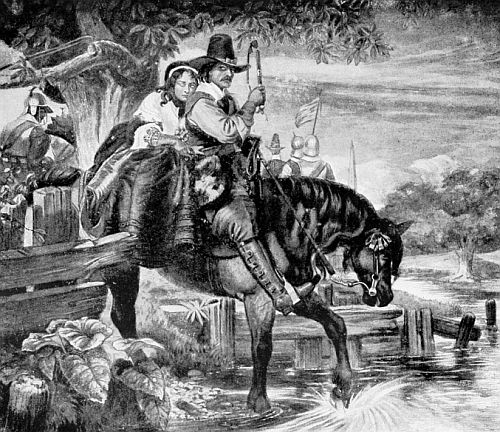
JANE LANE HELPING PRINCE CHARLES TO ESCAPE.
(From the fresco by C. W. Cope, R.A., in the Houses of Parliament.)
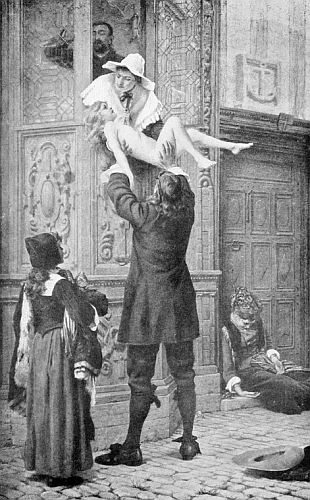
RESCUED FROM THE PLAGUE, LONDON, 1665.
(From the picture by Frank W. W. Topham, R.I. By permission of the Artist.)
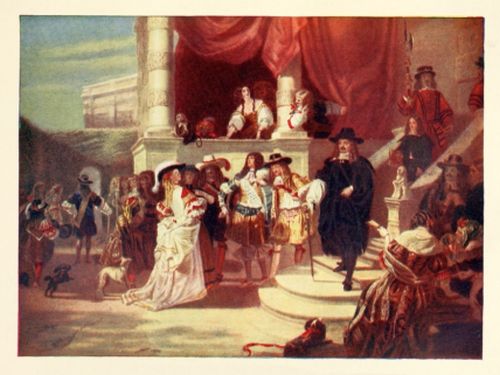
The Fall of Clarendon.
(From the picture by E. M. Ward, R.A., in the National Gallery of British Art.)

“Step by step, and word by word: who is ruled may read,
Suffer not the old kings—for we know the breed.”
Once more the scene is laid in Whitehall. James, the brother of Charles, is king, and he is now about to grant an audience to a nephew who has unsuccessfully rebelled against him and lies under sentence of death. Look at the king’s face. You see at once that he is a slow, narrow man, singularly obstinate, harsh, and implacable. His heart is as hard as the marble chimney-pieces of his own palace. He never forgets and he never forgives an injury. As you glance at his hard, cruel face you feel that he will be deaf to every cry of mercy and relentless to every touch of pity. Now the door of an antechamber is thrown open and the Duke of Monmouth, a handsome man, pale as death, is ushered in. His arms are bound behind him with a silken cord. At once he throws himself on the ground, and in an agony of weeping crawls to the king’s feet. He begs—oh, how passionately he begs—for life, only life—life at any price. In frenzied tones he beseeches his uncle to show him mercy for the sake of the late king, his father. If he is spared, he will never, never offend again.
“I am sorry for you,” says the king in icy tones, “but you have brought all this upon yourself. You have called yourself king, you have raised rebellion, and foully aspersed me in your Declaration. Your treasons are black and many. There is no hope of pardon for you this side the grave.”
At once the wretched prisoner cries out that he signed the Declaration without reading it; that it was the work of a villain.
“Do you expect me to believe,” says James with contempt, “that you set your hand to a paper of such moment without knowing what it contained?”
Now Monmouth makes his final and most abject appeal. He who has been the champion of Protestantism, and has called men to arms against a Catholic king, now offers to be reconciled with the Church of Rome! The king, always eager to make converts, immediately offers his spiritual assistance, but not a word does he say of pardon or respite.
“Is there no hope?” asks Monmouth.
The king turns away in silence, and the prisoner rises from his knees. The bitterness of death is past; his craven weakness has gone; he leaves the room with a firm step. In the Tower he takes farewell of his children and of the brave wife who has reclaimed him from a life of vice. Then he goes to the block, and his head is hacked off by an executioner whose nerve has failed him.
Let the story of the ill-starred rising be told. Monmouth was the son of King Charles and Lucy Walters, the daughter of a Welsh Royalist. In his thirty-first year he was probably the most popular man in England, extremely handsome, and gifted with the most charming manners. His father had conferred all possible honours on him, and as there was a movement to exclude his Roman Catholic uncle James from the succession he had come to regard himself as heir to the throne. He had proved himself no mean soldier on battlefields in the Netherlands and in Scotland, where he had shown mercy to the vanquished. He neglected no opportunity of making himself popular with the people. “He stood godfather to the children of the peasantry, mingled in every rustic sport, wrestled, played at quarter-staff, and won foot races in his boots against fleet runners in shoes.”
His great claim, however, to the sympathy of the people was his staunch Protestantism. As a matter of fact, he had no settled religious opinions. His private life was bad, and his Protestantism was but a means to an end. He had taken part in a reckless plot towards the close of his father’s reign, and had been obliged to take refuge in the Netherlands, with a sentence of death hanging over his head. On his deathbed, when Charles blessed his children, his eldest and best-loved son was an exile and a wanderer. The dying king never mentioned his name.
James began his reign by promising to “preserve the government both in Church and State as by law established.” There was no opposition to him; men were ready to rely upon “the word of a king who was never worse than his word.” They remembered his good work at the Admiralty and praised his personal courage, while they hated and feared his religion. Really, James was a stronger and better man than Charles; but while the late king was witty, gracious, good-natured, and easy-going, James was dull, suspicious, sullen, and silent. A contemporary said, “Charles could have been a great king if he would, and James would have been a great king if he could.” While Charles cared nothing for religion, and would risk nothing for the Church which he favoured, James was a zealous Roman Catholic, and was prepared to risk his crown for the sake of his Church.
The Protestantism of the nation was soon alarmed. The king openly heard mass, and a week or two later the rites of the Church of Rome, after an interval of a hundred and twenty-seven years, were once more performed at Westminster. Then came a proclamation suspending the penal laws against Nonconformists, and thousands of prisoners, including the author of “The Pilgrim’s Progress,” were released. Parliament showed no anger; it was packed with the king’s friends. They granted James a most liberal income, which almost made him independent of further Parliamentary grants.
Meanwhile, Monmouth in Holland was busy hatching a plot to oust James and secure the throne for himself. His fellow-conspirator was Archibald Campbell, Earl of Argyll, the leader of the Covenanters who had suffered persecutions many and sore during the last reign. Two years after the Restoration Episcopacy had been re-established in Scotland, and more than three hundred ministers had given up their livings rather than conform. Severe fines were inflicted on all who dared to abstain from public worship in the parish churches, and troopers rode about the country cursing and swearing, harrying and plundering, wounding and killing to their hearts’ content. Many of the ejected ministers continued to preach in the open air, and their flocks, greatly daring, attended their secret ministrations. “Conventicles” increased daily in number. With a Bible in one hand and a sword in the other, the blue-bonneted Covenanters gathered on lonely hillsides for worship, while scouts kept watch for the coming of the dreaded troopers. Persecution at last drove them to arms. After a victory at Drumclog, they were utterly defeated at Bothwell Bridge, and a terribly cruel time of shooting and hanging, torture and transportation set in.
Argyll’s father had been leader of the Covenanters in the days of Charles the First, and after the Restoration he lost his head. The son, Monmouth’s fellow-conspirator, refused to take the oath of the Scottish Test Act without adding a statement that thereby he was not precluded from trying to amend both Church and State. For this he was brought to trial, and on evidence that would not hang a dog condemned to death. Fortunately, however, he escaped in disguise, and found a refuge in Amsterdam, where the leading English and Scottish exiles were assembled. Though there was not much sympathy between Monmouth and Argyll, they joined hands, and arranged that the great MacCallum More should rouse his clansmen and head a rising in Scotland. This was to be promptly followed by Monmouth’s descent on England.
The Scottish expedition was doomed to failure from the first, because it was commanded, not by a single general, but by a committee, which disputed and quarrelled on every possible occasion. The expedition reached Campbeltown, on the coast of Kintyre, and here Argyll issued a proclamation declaring that King James had murdered King Charles, and that Monmouth was the rightful king. His clansmen flocked to him; but the Lowland leaders despised them, and endeavoured to raise the Cameronians of Ayrshire, who showed not the slightest disposition to take up arms. Soon the committee was at loggerheads, and all was confusion and despondency. Food ran short, and the Highlanders deserted in hundreds. Argyll now yielded to the committeemen, who urged him to march into the Lowlands. Ere a battle could be fought his army had melted away, and his only safety lay in flight.
Argyll disguised himself as a peasant, and pretended to be the guide of Major Fullarton. The friends journeyed through Renfrewshire until they reached the junction of the Black Cart and the White Cart. Here they found that the only practicable ford was held by a party of militia. The travellers were challenged, their answers were evasive, and an attempt was made to seize the supposed guide. He broke loose and sprang into the water, where for a short time he held his own against five assailants. His pistols, however, had been wetted and were useless. Struck down with a broadsword, he was easily overcome, and his captors learnt to their dismay that the champion of the Protestant religion, the heir of a great and honoured name in Scotland, was in their hands.
On June 20, 1685, Argyll was dragged through the streets of Edinburgh bareheaded, his hands tied behind his back, guards surrounding him, and the hangman walking in front. Up the Canongate and the High Street he passed, and when the castle was reached he was put in irons and informed that he had but a few days to live. No new trial was necessary; he was to be executed on his old sentence. He heard his fate with majestic resignation, for he did not fear death. Torture was threatened, but the threat did not move him, and not a word would he say to betray a friend. He composed his own epitaph, and spent the short remaining hours in devotion.
On the very day on which he was to die he dined well, and according to his wont, lay down for a short slumber after the meal. A Lord of the Council who came with a message insisted on seeing him. He was told that the earl was asleep, but could not believe that such was the case. The door of the cell was softly opened, “and there lay Argyll on his bed, sleeping in his irons the placid sleep of infancy.” In his last hour he wrote a most loving and cheering letter to his wife, and at the call of his jailers mounted the scaffold with undaunted courage. He made a short speech to the people, declaring that he died “not only a Protestant, but with a heart-hatred of Popery, of Prelacy, and of all superstition.” He then embraced his friends, gave them tokens of remembrance, prayed a few moments, and the axe fell.
Now, having seen a noble man pay the price of failure, let us turn to the progress of Monmouth. On the morning of June 11, 1685, a week before the capture of Argyll, three ships appeared off the little port of Lyme Regis, in Dorsetshire. The inhabitants from the cliffs saw eighty well-armed men land on the shore, kneel down, and pray for a blessing on their venture. Then they saw a gallant figure draw his sword and lead his men over the cliffs into the little town. His name and the character of his mission were soon known, and there was great excitement in the place. The fishermen flocked to him shouting, “A Monmouth! a Monmouth! the Protestant religion!” Meanwhile a blue flag had been set up in the market-place, and now Monmouth’s Declaration was read. It was full of wild charges against James, and accused him of burning London and poisoning the late king, his brother. James was denounced as a tyrant, murderer, and usurper. Monmouth said that he had come as captain-general of the English Protestants in arms against tyranny and Popery.
The news of his coming spread like wildfire through the West Country. Many of the people were Dissenters, who had suffered all kinds of petty persecution, and they hailed the advent of Monmouth with the utmost eagerness. They remembered how he had endeared himself to them when he made his progress through the country five years before, and they rushed to his banner with alacrity. By the time he reached Exeter nearly all Devonshire had flocked to him, and nine hundred young men in white uniform marched before him into the city. Recruits came in by hundreds daily; there were not enough clerks to take down their names. Arming and drilling went on all day, and everything promised well.
On June 18, Monmouth reached the pleasant and prosperous town of Taunton, which gave him a right royal welcome. The children of the men who had helped Blake to hold out against the Cavaliers now welcomed Monmouth with unrestrained joy. Every door and window was adorned with wreaths of flowers, and no man appeared in the streets without the badge of the popular cause in his hat. Damsels of the best families in the town wove colours for the rebels. One flag in particular was embroidered with the royal arms, and was offered to Monmouth by a party of school-girls. Their school-mistress presented the duke with a small Bible of great price. He took it with a show of reverence. “I come,” he said, “to defend the truths contained in this book, and to seal them, if it must be so, with my blood.”
Now let us hasten on to the final scene. It is Sunday morning, July 5, 1685, and “King” Monmouth is standing on the lofty tower of Bridgwater parish church, looking out over an expanse of fertile and well-wooded country, with the Mendip Hills to the north-east and the Quantocks to the south-west. He turns his eyes anxiously towards the south-east, where there is a wide extent of dreary morass known as Sedgemoor. In the villages round the moor the royal troops are encamped, and are rapidly drinking themselves drunk with Somerset cider. Monmouth is in a despondent mood; his heart has failed him, and he has already meditated flight. The trainbands of the surrounding counties and the life-guards of the king are closing in upon him in overwhelming force, and if victory is to be secured a battle must be fought without delay. He forthwith determines to march that very night, under cover of the darkness, and fall on the surprised enemy before dawn.
As the clock strikes eleven, Monmouth and his men march out of Taunton, the moon shining brightly and the northern streamers flashing in the sky. By one o’clock his half-armed rabble is on the moor, where the marsh-fog lies so thick that nothing can be seen fifty paces away. Between him and the enemy are three broad ditches or rhines full of mud and water. Monmouth knows of two of these ditches, and has planned the advance so as to cross them by the causeways. He is, however, ignorant of the third, and when his army reaches its brink it is powerless to cross and attack the king’s troops, only a few paces away. A random pistol-shot has already aroused the Royalists; their drums beat to arms, and the cavalry and foot, scrambling into order, advance towards the rhine which separates them from the enemy. “For whom are you?” shouts an officer of foot-guards. “For the king,” is the reply from the rebel ranks. “For which king?” is then demanded. The answer is a loud shout of “King Monmouth! God be with us!” The royal troops fire; the rebel horsemen flee, and the drivers of the ammunition wagons hasten after them with the powder and ball.
Now the sun rises and the battle begins in earnest. It resolves itself into two rows of men firing at each other across a broad ditch of inky water. The Somersetshire rustics fight like veterans, but all in vain. The unequal contest is soon decided, and Monmouth, seeing that all hope has gone, turns and runs away. His deserted followers, however, make a gallant stand, but their scythes and pitchforks are useless against the swords of the king’s troopers. The arrival of the artillery brings the engagement to a speedy close. The rebel battalions waver, break, and flee, the Mendip miners alone remaining to stain the marshy ground with their blood. More than one thousand of the rebels lie dead on the field. The last battle has been fought on English ground.
But what of Monmouth? He did not draw rein until he reached Chedzoy, where he stopped a moment to mount a fresh horse and hide his blue ribbon and his George. He rode on all day towards the south-east, hoping to gain the New Forest, where he might lurk in the cabins of deer-stealers until an opportunity arrived to escape to the Continent. The night was passed in the open air; in the morning he and his companions found themselves ringed in by their foes. Monmouth changed clothes with a peasant and betook himself into a field, partly of rye, pease, and oats, partly overgrown with furze and brambles.
A woman reported that she had seen two strangers enter the field, and soldiers, stimulated by the offer of £5,000 for the capture of the duke, were told off to watch the fences while dogs were turned out among the bushes. At nightfall no capture had been made. The fugitives lay close behind a thick hedge; thirty times they ventured to look out, and thirty times they saw an armed sentinel watching for them. At sunrise the search began again, and not a yard of the field went unexamined. At length a gaunt figure in a shepherd’s dress was discovered in a dry ditch. In his pockets were some raw pease, a watch, a purse of gold, and the George which he had received from the hands of his father in the days when he was the spoiled darling of the court.
The wretched man was conveyed to London in a state of abject terror. He begged for an interview with his uncle, and what happened at that interview you already know. The scene with which this chapter opened was the sequel to his capture, the painful episode which preceded his execution.
“Woe to the vanquished!” James now wreaked such a vengeance on Monmouth’s poor, deluded followers that his name has become a byword of inhuman cruelty. A brutal soldier named Kirke was sent down to the west with his “lambs,” and the savage sport began. You may still see at Taunton the house in which he lodged. It was formerly an inn, and on its signpost he hanged scores of peasants, while his drums struck up and his trumpets sounded “so that they should have music to their dancing!” “My lord,” said the Bishop of Bath and Wells to Lord Feversham, who was equally ferocious, “this is murder, not law; the battle being over, these poor wretches should be tried.”
Then came Judge Jeffreys, a drunken, foul-mouthed, degraded wretch, with a forehead of brass and lungs of leather. Nothing more revolting than his so-called trials have ever disgraced our annals. He roared, he bullied, he blasphemed, he laughed, joked, and swore until men believed him to be drunk from morning till night. So he was—drunk with blood. When the “Bloody Assize” was concluded, Jeffreys openly boasted that he had hanged more traitors than all the Chief-justices since the Conquest. “At every spot where two roads met, and every market-place, on the green of every large village which had furnished Monmouth with soldiers, ironed corpses clattering in the wind, or heads and quarters stuck on poles, poisoned the air and made the traveller sick with horror. In many parishes the peasantry could not assemble in the house of God without seeing the ghastly face of a neighbour grinning at them over the porch.”
Perhaps the most infamous sentence of this ermined fiend was that on Alice Lisle, the widow of a man who had been one of the regicides, and had filled high posts under the Commonwealth. Her crime was that she had sheltered two fugitives from Sedgemoor. She was old and deaf; she had no counsel to defend her; and she pleaded that what she had done was simply an act of common charity. So innocent and devoid of offence did she seem that the jury were inclined to acquit her. Jeffreys turned on them with the utmost fury, and at length they brought in a craven verdict of “guilty.” “Gentlemen,” said he, “in your place I would find her guilty were she my own mother.” It was the only word of truth which fell from his lips during the trial. Then he condemned her to be burnt alive that very afternoon.
Appeals for mercy came to him on all hands and from all classes. He consented to postpone the execution for five days, during which ladies of high rank interceded with James for the poor old lady, but all in vain. The only mercy wrung from the pitiless king was to forgo the burning in favour of hanging. She went to her death with serene courage, and good men and women held up their hands in horror throughout the length and breadth of the land. Elizabeth Gaunt, a pious and charitable Baptist, was actually burnt alive at Tyburn on a like charge.
The judicial murders reached in all three hundred and twenty; the number of persons transported as slaves to the West Indies was eight hundred and forty-one. The poor wretches destined to the plantations were distributed into gangs and bestowed on courtiers, who made huge sums by this traffic in the flesh and blood of their fellow subjects. The Chief-justice traded largely in pardons, and managed to accumulate a fortune in this way. No wonder the popular name for the estate which he bought with the money was Aceldama, “the field of blood.” The ladies of the queen’s household were specially prominent in this odious work of selling pardons. The little girls who had presented the banner to Monmouth became the portion of the queen’s maids of honour. Two of them died in prison, and the rest were only released upon payment of a heavy ransom.
And now James stands triumphant; his throne seems unassailable. He is at the height of his power and prosperity, and Jeffreys is his Lord Chancellor; yet already the writing appears on the wall, and the day of his doom is fast approaching. His terrible vengeance in the west has sent a thrill of horror through the whole country, and has made men loathe his very name.
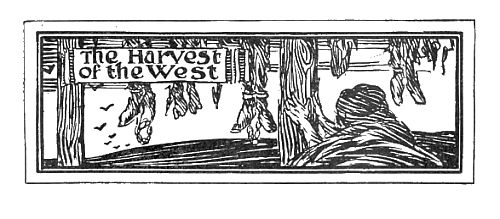
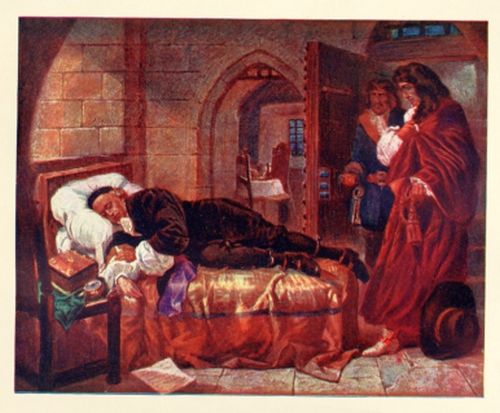
The Last Sleep of Argyll.
(From the fresco by E. M. Ward., in Westminster Palace.)
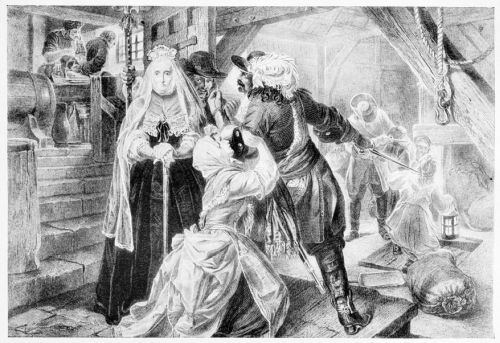
The Arrest of Alice Lisle.
(From the picture by E. M. Ward, R.A.)
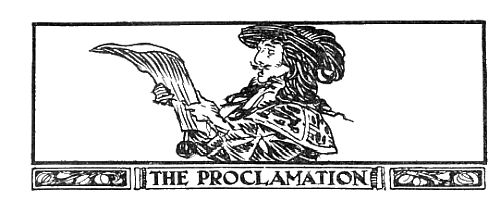
“I am constant as the northern star,
Of whose true-fixed and resting quality
There is no fellow in the firmament.”
 PRINCE now passes by on horseback. He is small,
almost diminutive, but by no means insignificant.
His figure is slender and apparently feeble, but few
men have borne such hardships and sustained such reverses
of fortune as he. His forehead is ample, his nose aquiline,
his eye bright and keen, his lips thin and compressed,
his cheek pale and deeply furrowed by the marks of sickness
and care. His whole aspect is pensive, severe, almost
morose. At a glance you judge him to be neither a happy
nor a good-humoured man. His bearing is simple; he
cares nothing for pomp and parade, and he has no particular
desire for popularity; yet there is an unmistakable
dignity in his presence, and you feel as you gaze upon him
that here is a man of high spirit and of great intellectual
power, of constant and lofty soul, of unshaken courage and
calm fortitude.
PRINCE now passes by on horseback. He is small,
almost diminutive, but by no means insignificant.
His figure is slender and apparently feeble, but few
men have borne such hardships and sustained such reverses
of fortune as he. His forehead is ample, his nose aquiline,
his eye bright and keen, his lips thin and compressed,
his cheek pale and deeply furrowed by the marks of sickness
and care. His whole aspect is pensive, severe, almost
morose. At a glance you judge him to be neither a happy
nor a good-humoured man. His bearing is simple; he
cares nothing for pomp and parade, and he has no particular
desire for popularity; yet there is an unmistakable
dignity in his presence, and you feel as you gaze upon him
that here is a man of high spirit and of great intellectual
power, of constant and lofty soul, of unshaken courage and
calm fortitude.
This is William of Orange, the man whom the exasperated English people called upon to invade their country in order to preserve their liberties and the Protestant faith. He accepted the invitation, and without striking a blow marched from Torbay to London, where he and his wife became King and Queen of Great Britain and Ireland.
You are once more standing outside Whitehall. It is the thirteenth day of February, in the year of grace 1689. All London is agog with excitement. Trumpets sound and kettledrums roll as the Garter King of Arms in tabard and plumed hat rides up to the gates, followed by officials carrying the maces of the two Houses of Parliament, the Lord Chancellor and the Speaker, the chief officers of state, and a long train of coaches filled with noblemen and gentlemen. Then in loud, clear tones he proclaims the Prince and Princess of Orange King and Queen of England, and charges all Englishmen to bear, from that moment, true allegiance to the new sovereigns. He concludes by praying that God, who has already wrought a signal deliverance for Church and nation, will bless William and Mary with a long and happy reign.
Loud cheers break forth, and the procession re-forms and winds its way along the Strand to Temple Bar. The streets, the balconies, the very housetops are crowded with gazers, and all the steeples from the Abbey to the Tower ring out a joyous peal. The proclamation is repeated at Temple Bar and in front of the Royal Exchange, amidst the shouts of citizens and the din of trumpets.
In the evening every window from Whitechapel to Piccadilly is illuminated. The state rooms of the palace are thrown open, and are filled with a brilliant company of courtiers eager to see and to do homage to their new sovereigns. The features of the Prince of Orange are familiar to them from his portraits, but now for the first time most of them see him in the flesh. They cannot fail to note, even in this scene of gaiety, his cold, reserved manner and his lack of kingly grace. The new queen, however, charms all beholders. She is beautiful, winning, and gracious, with a good heart, an excellent disposition, and an affection for her sullen husband which nothing can daunt. It is clear from the first that Mary’s popularity will be great, and that William, though he may be respected, will never be loved by his new subjects.
Look at yonder graybeard gazing up at the gay lights glittering in the windows. He has seen many changes in his sixty-five years of life, and he cannot but reflect on the strange vicissitudes through which the Stuart kings, now barred for ever from the British throne, have passed. Listen to him as he talks to the youth at his side. “My lad,” he says, “I remember well the Scotchman James the First feasting in this very hall, and expounding to his son Charles and the courtiers in right learned language the pestilent principles of what he called ‘statecraft’ and the divine right of kings to rule and to suspend the laws of the land at their will and pleasure. Right well did young Charles learn the lesson, and perchance we should blame his father and not him for all that happened. He held by the hateful doctrines which he had sucked in as a youth, like the obstinate man that he was, and ruthlessly destroyed our liberties till we were forced to take up arms and fight him for seven long, miserable years. I got this wound, that makes me go lame, at Naseby, the last great battle of the war. That was forty-three years ago save three months. I mind well seeing King Charles step through a hole in yonder wall on to the black-draped scaffold and lay his head on the block. It was a pitiful sight. I did not hold with killing him, mark you, but perchance it was better so.
“Then came the Commonwealth and the days of ‘Old Noll.’ It was not a ‘Merrie England’ in his time, I warrant you. There were no Maypoles and no Bartholomew fairs in his day; it was almost a sin to eat a mince pie. You young fellows would think yourselves hardly done by if those times were to return. But we were a strong nation then, my lad. Foreigners feared us, the Dutchmen had to eat humble pie, and money flowed right merrily into our coffers. It was a harsh and cheerless time, no doubt, and there was no liberty to speak of, but trade was brisk, and this land has never seen such good prosperous days since.
“When Cromwell died—the night after the great storm—and his son Dick couldn’t be bothered with business of state, we sent across the sea for Charles’s son, and I remember well the joy with which these fickle folk greeted him as he rode into London on Oak-apple Day. But, my lad, I blush with shame to think of the foreign wickedness he brought with him, of the way he squandered the public money and ‘made Israel to sin.’ Not to my dying day shall I forget standing in the Strand—the very year in which you were born—and hearing the Dutch guns roaring in the Thames. It was a bitter disgrace; we all felt it, and we all longed for Blake and Old Noll again to send the Dutchman to the right about in double-quick time. Aye, and the second Charles did worse than that; he sold himself and us to the French king for a dirty pension, and plotted to overturn the Church and rob us of our liberties. But, thank God! he went to his own place before he had time to do his worst. And then came his brother, James the Second. Well, you know all about him. Two short months ago he lay within these very walls. Now they say he’s with the French king, and here’s his son-in-law standing in his shoes. The Dutchman is welcome, lad; he is the saviour of the country, and he has secured our liberties. Please God, under him the old days of good government and prosperity shall come back again.”
The liberties of the land were indeed secured, for no future British king would dare to tread the path which the Stuarts had trod to their destruction. William and Mary now ruled in England by virtue of a solemn contract made between themselves and their subjects. Before the crown was offered to them they were required to assent to the Declaration of Rights, which branded as illegal all the arrogant pretensions of the Stuarts. This Declaration asserted anew the national liberties, and is the third great charter of British liberty.


The Prince of Orange landing at Torbay.
(From the picture by J. M. W. Turner, R.A. in the National Gallery.)
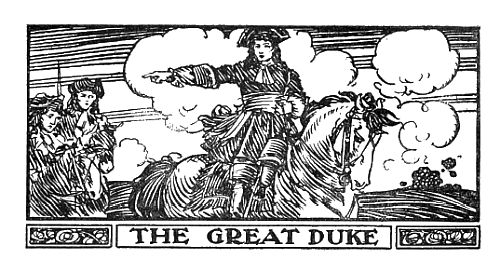
“If I lose mine honour,
I lose myself.”
Who comes hither? A soldier of commanding stature and strikingly handsome face; dignified, yet winning in manner; blessed, it would seem, with all possible gifts and graces. He is John Churchill, Duke of Marlborough, Prince of the Holy Roman Empire—one of the greatest military geniuses who ever lived, the victor of one of the decisive battles of the world, the man who overthrew the vast fabric of power which Lewis the Fourteenth had erected, the general who never fought a battle that he did not win and never besieged a place that he did not take! But do not be dazzled by his noble appearance and his military glory. His genius is transcendent, his courage is of the highest order, his personal graces are remarkable, yet he goes down to posterity as one of the greatest and meanest of mankind. Treacherous, ungrateful, sordid, and miserly, he is despicable as a man though unrivalled as a diplomatist and glorious as a soldier.
William the Third died before his work was done. The long duel between him and Lewis was only at its opening stages when he passed away, after a life of stubborn resistance to his invincible foe. His mantle fell on the shoulders of John Churchill, and he it was who finished the task which William did not live long enough to accomplish. Churchill was the son of a Devonshire cavalier, and early became a man of fashion and pleasure at the court of Charles the Second. At seventeen years of age he was an ensign in the army, and at twenty-two the colonel of an English regiment in the service of France. By this time the “handsome Englishman,” as Marshal Turenne dubbed him, had already shown the qualities of a great soldier. When an advance post was given up to the enemy, Turenne actually wagered a supper that Marlborough would recover it with half the number of men who had abandoned it, and the wager was won. He was absolutely fearless, bold and adventurous, cool and unruffled in temper, calm and far-seeing in judgment, and capable of enduring all sorts of fatigue.
Thanks to the friendship of the Duke of York, afterwards James the Second, to whose fortunes he attached himself, he was raised to the peerage. At the time of Monmouth’s rising he was major-general of the forces, and the victory at Sedgemoor was largely due to his coolness and resource in rallying the royal troops when thrown into confusion by the night attack of the rebels.
Marlborough owed much of his rapid promotion to his wife. In 1678 he married a penniless beauty of the court named Sarah Jennings. She was a lady of violent temper and a most domineering disposition, but she also possessed a strange power of winning and retaining affection. Marlborough’s love for his wife “ran like a thread of gold through the dark web of his career.” He hated letter-writing, chiefly because his spelling was so bad, yet in the midst of his marches and sieges, and even from the battlefield itself, he constantly wrote his wife letters breathing the most passionate devotion.
When Marlborough wooed and won Sarah Jennings, she was the bosom friend and constant companion of the Princess Anne, whom she had known from girlhood. Soon she obtained complete mastery over the weak and feeble nature of the princess, who became a mere puppet in her hands. The friends laid aside all the formalities of rank in their intercourse; Anne was Mrs. Morley, and the duchess Mrs. Freeman. Anne saw with her favourite’s eyes, heard with her ears, and spoke with her tongue. If she attempted to show one spark of independence, she was immediately crushed and deafened by the violent reproaches of the woman who was nominally her servant but really her tyrant. Anne’s husband, Prince George of Denmark, did not count. He was considered the most harmless and stupid man in the three kingdoms. “I have tried him drunk,” said Charles the Second, “and I have tried him sober, and there is nothing in him.”
Counting upon his wife’s complete control of the princess, Marlborough soon began to plot against William. His plan was to take advantage of the king’s unpopularity and drive him from the throne in favour of Anne. The plot was discovered, and William, usually calm and cool, was roused to the utmost indignation. “Were I and my Lord Marlborough private persons,” he cried, “the sword would have to settle between us.” At once the earl was stripped of his offices, and his wife was driven from St. James’s. Anne, however, refused to be parted from her friend, and left the court with her. Then Marlborough opened a treacherous correspondence with the deposed king at St. Germains. He basely revealed the plan of William’s intended expedition to Brest, expressed his deep sorrow at having deserted his rightful sovereign, and obtained a written promise of pardon. The attack on Brest was a complete failure; the enemy, thanks to Marlborough, was forewarned and forearmed, and more than a thousand Englishmen were slain. This piece of foul treachery is the blackest stain on Marlborough’s character.
Queen Mary died childless in 1694, and Anne became the acknowledged heiress to the throne. William was obliged to recall her to court, and with her returned the Marlboroughs, who were reluctantly received into favour once more. William hated the earl’s baseness and treachery, but he was obliged to recognize his splendid gifts, and to declare that he, of all men, was the fittest to carry on the great work of checking the ambition of Lewis. Marlborough was therefore sent to Flanders at the head of the army, and had only just taken command when William met with the accident which was the immediate cause of his death.
The succession of Anne practically made the Marlboroughs King and Queen of England. Three days later Marlborough was appointed captain-general of the British forces at home and abroad, and was entrusted with the entire direction of the war. Offices and gifts were showered upon his wife, and the ministers were chosen from his friends and adherents. Most of these men had been in treasonable correspondence with James; but now, in accordance with the loose notions of honour prevalent at the time, they abandoned him, and for their own selfish ends determined to keep Anne on the throne, secure the Protestant succession, and proceed with the war.
Great Britain, Holland, Austria, and most of the smaller states of Germany were soon leagued in arms against France, and in 1703 Lewis found armies arrayed against him in the Spanish Netherlands, in South Germany, in North Italy, and Spain. Marlborough was in command of the allied British, Dutch, and Germans in the Netherlands. Though he had not yet displayed his superb military genius, he had already exhibited his unrivalled powers of conciliating the jarring elements which formed his army. In North Italy the Austrian forces were under Prince Eugene of Savoy, a man of extraordinary courage and talent, who was worshipped by his soldiers, and still lives as a hero in song. No two such generals had ever commanded armies against Lewis before.
The beginning of the war was uneventful. Marlborough, however, managed to capture a number of fortresses along the line of the Meuse, and by doing so cut off the French from the Lower Rhine and made the invasion of Holland impossible. For the rest, the campaign was indecisive. On his return to England he was created Duke of Marlborough, the title by which he is best known.
Marlborough was now on the threshold of his great career. He was fifty-four years old, and was about to win victories at an age when the work of most men is done. Like his predecessor William, he owed little to early training and much to his natural abilities. The keynote of his greatness as a general was the vigour and audacity of his plans. His greatest obstacle was the slowness and timidity of the Dutch, who refused again and again to co-operate in the brilliant movements which he suggested. Calm and unruffled, patient and tactful, he composed all the differences of his allies, and proved himself even greater in the council chamber than on the battlefield.
Lewis now began a campaign on a scale of grandeur which was only equalled by Napoleon himself. He sent the flower of his army into Bavaria, where the local troops joined them. Then the army of the Danube, in massed and irresistible might, began its march on Vienna. Marlborough saw that Austria was bound to be conquered unless prompt action was taken, so, early in 1704, he made a dash for the Danube. To do this he had to march right across Germany from the Lower Rhine, while Prince Eugene had to cross the Alps from Italy. Both undertakings were full of difficulty, but the difficulties were overcome. By his boldness and secrecy he completely deceived his enemy, and not until he had crossed the Neckar and united his forces with those of Eugene was his real object revealed.
Marlborough was bound to fight a battle speedily, though his chances of success were doubtful, and the consequences of defeat fatal. If Lewis won, beyond all doubt “a universal despotic dominion would be established over the bodies, a cruel spiritual thraldom over the minds of men.” France and Spain, united in a close family alliance, would prove irresistible. Protestantism would be destroyed, a despotism worse than that of the Roman Empire would be set up, and the British race would be arrested in its mission to overspread the earth. Marlborough was not unaware of the consequences of defeat. “I know the danger,” he said, “yet a battle is absolutely necessary; and I rely on the bravery and discipline of the troops, which will make amends for our disadvantages.”
On August 13, 1704, the armies faced each other. The enemy, numbering fifty-six thousand men, was posted in a strong position, with the Nebel, a marshy stream, in front, hill country on the left, and the Danube on the right. A short distance from the great river stood the village of Blenheim, which had been strongly defended by a palisade and trench, and was occupied by Marshal Tallard’s infantry. At sunrise the allies were in motion, but their movements were covered by a thick haze, and not until the allied right and centre were nearly within cannon-shot of the enemy was Tallard aware of their approach. Eugene, with twenty thousand men, marched through broken and wooded country towards the Nebel, which had to be crossed before he could attack the Bavarians opposed to him. Not until midday did his troops cross the stream, and when they faced the enemy they were so weary that they could do little more than hold their own.
While Eugene was struggling on the right, the remainder of the allies were inactive. During this interval, Marlborough ordered divine service to be performed by the chaplains at the head of each regiment, for with all his faults he was sincerely religious. Then he rode along the lines and found officers and men in the highest spirits, waiting impatiently for the signal to attack. At length an aide-de-camp galloped up from the right with the welcome news that Eugene was across the stream. At once a strong brigade of infantry under Lord Cutts was sent to assault the village of Blenheim, and Marlborough himself led the main body down the eastward slope of the valley of the Nebel, and crossed the stream.
Brigadier Rose led the British infantry to the assault of Blenheim under a shower of grape and musketry. He ordered his men to reserve their fire until he struck his sword against the palisades. The troops advanced with great steadiness, but they were repulsed with severe loss; and Marlborough, finding how strongly Blenheim was held, gave up the attempt to capture it, and bent all his energies to breaking through the centre. The ground which he had to traverse was very swampy; but he constructed something like an artificial roadway, and late in the afternoon, despite artillery fire and cavalry charges, he crossed the blood-stained stream with eight thousand horsemen. The infantry were then brought across to “hold up” the French troops in Blenheim.
Marlborough chiefly relied on his cavalry, and by means of this arm Blenheim was won. Leading two furious charges in person, he completely broke the squadrons of the enemy. They discharged their carbines, wheeled round, and spurred from the field, leaving the infantry to be ridden down by the victorious allies. Marlborough then drove the French southward to the Danube, where they were obliged to drown or yield. The troops in Blenheim, after several gallant but unsuccessful attempts to cut their way out, laid down their arms. The French army was almost entirely destroyed. About twelve thousand men were killed and fourteen thousand taken prisoners; all the cannon, a vast number of colours and standards, tents and equipages, were captured; and the French general and twelve hundred officers of rank were in the hands of the conqueror.
“It was a famous victory.” Austria was saved, the French were driven out of Germany, and the Elector of Bavaria was forced to make peace. The moral effect of the battle, however, was still greater. For half a century the French had been considered invincible; now the spell was broken, and the prestige of France had vanished. For the rest of the war Lewis had to act on the defensive, and “Malbrook” became a name of fear to every child in France. The British nation in gratitude presented Marlborough with £500,000, with which to purchase the manor of Woodstock, and erect a house which should be named after the battle. Blenheim Palace still remains one of the most magnificent of England’s “stately homes,” and a not unworthy monument to Marlborough’s great military genius.
Next year Marlborough began to attack the great line of fortifications which then extended almost from Antwerp to Namur. He proposed to fight a decisive action near to the field of Waterloo, but was prevented from doing so by the persistent opposition of the Dutch. At the end of 1705 the position of affairs was “as you were.” Next year, however, Marlborough again covered himself with glory by destroying a French army at Ramillies. The effect of the victory was enormous. The French garrisons were panic-stricken, and place after place fell. “It really looks more like a dream than the truth,” wrote Marlborough. Before long he was master of the whole of Belgium. Prince Eugene also fared well in Italy, where lie drove the French troops across the Alps. Austrian and British troops also entered Spain, where they met with a stubborn resistance and made but little progress.
In 1708 Marlborough and Eugene won another great victory at Oudenarde. The French generals would not act together, and consequently their troops were thrown into disorder. A long, running fight on the heights of Oudenarde followed, and the French right wing was cut to pieces. The remainder of the army, flying back to France, was pursued, and the fortress of Lille was captured. Lewis begged for peace; but the allies offered him terms which he could not accept, and so, much against his will, the war went on.
Next year (1709) Marlborough fought his last battle, and again defeated the French at Malplaquet, in what he called a “very murdering battle.” The French position was very strong, with a narrow front protected on both sides by thick woods and heavy batteries. Nevertheless, after a series of desperate assaults, he met with his usual success, though his victory was dearly bought with a great sacrifice of life. Marlborough was deeply affected by the horrors of the scene, and spoke with real feeling of his misery at seeing so many of his old comrades killed. The British nation was now weary of the war, and ready to bring it to a close. Peace was signed at Utrecht in 1713.
Long before the treaty was signed, Marlborough, once the darling of the nation, was in dire disgrace. He had gone into the war as a Tory, but during its continuance had allied himself with the Whigs, and by 1708 the ministry almost entirely consisted of men of his new party. Anne was at heart a Tory, and she greatly disliked the change. Indeed, she only agreed to the appointment of the Whig leader, Lord Sunderland, because Marlborough threatened to resign and the duchess fiercely upbraided her for daring to have inclinations of her own. Anne was now tired of the Marlboroughs, and was only waiting for an opportunity to throw off their yoke. A Mrs. Masham, cousin of the duchess, had contrived to usurp the position of “Mrs. Freeman,” and she now encouraged the queen to rebel. A bitter quarrel broke out between the queen and the duchess on the occasion of the “Te Deum” for the victory of Oudenarde. The duchess had selected certain jewels for the queen to wear, but Anne rejected them, whereupon there was a furious scene. Violent quarrels and angry letters followed, but peace was patched up for a time, though the end was fast drawing near.
In 1710 a clergyman, named Dr. Sacheverell, in the course of a dull, foolish sermon at St. Paul’s, preached the old Tory doctrine of the divine right of kings. Very injudiciously, and against Marlborough’s advice, the Whig ministers determined to prosecute him for the sermon. The trial resolved itself into a great struggle between the two parties, and Sacheverell became a martyr. The nation generally supported him, and a storm of hatred arose against the Whigs. Thereupon the queen dismissed them from office, restored the Tories, sent “Mrs. Freeman” about her business, and removed Marlborough from his command. It is said that he actually went on his knees to the queen and begged her to let him retain the gold key which was the symbol of his office. There was a final interview between the queen and the duchess, at which the latter shed floods of tears, but could not shake Anne’s new-found determination. All was over, and “Mrs. Freeman” set about removing the brass locks from her apartments in the palace, and giving orders for the removal of the marble mantel-pieces and other fixtures.
The Tories, headed by Henry St. John, Viscount Bolingbroke, a subtle traitor in secret correspondence with the “old Pretender,” now wreaked their vengeance on Marlborough. He was charged with embezzling public money, and the charge was only too true, though it is but fair to say that sums of money thus obtained were generally regarded as the customary perquisites of his office. With all his greatness, Marlborough had a mean and miserable soul. It has been said that he was perhaps the only really great man who ever loved money for its own sake. He was actually accused of sending officers unnecessarily into the thick of the fight, so that he might fill his pocket by selling the commissions of those who fell.
Instead of answering his accusers he fled to the Continent, where he remained in voluntary exile until news reached him of Anne’s last illness. He landed at Dover on the day of her death. The new king, George the First, restored him to his command and his honours; but two years later he had a paralytic stroke, followed by another. His great physical strength, hardly tried by the fatigues of his many campaigns, and his brilliant intellect, broken down by the stress and anxieties of his labours and responsibilities, began to give way. He spent his declining days in riding, playing with his grandchildren, and keeping minute accounts of his most trifling expenditure. Even when old and infirm, it was said that he walked in order to save sixpence for a chair. He died on June 16, 1722, and was buried with great splendour in Westminster Abbey. So passes Marlborough. He leaves a stained memory, it is true, but let us not dwell upon his vices and failings. Let us rather remember how—
“Calm and serene, he drives the furious blast;
And pleased th’ Almighty’s orders to perform,
Rides in the whirlwind, and directs the storm.”
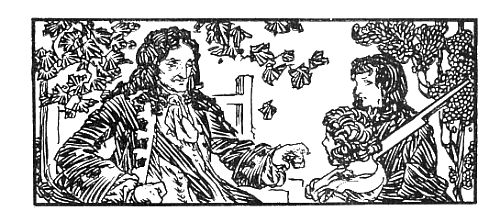
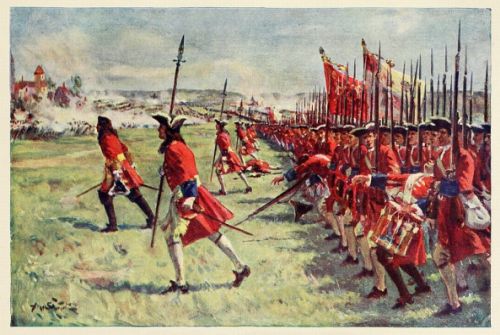
The British Assault on the Village of Blenheim.
(From the picture by Allan Stewart, specially painted for this book.)
Brigadier Rose led the British infantry to the assault under a shower of grape and musketry, and ordered them not to fire a shot until he struck his sword against the palisades. While the flower of the French troops were thus “held up” in the village, Marlborough broke the center with the allied cavalry.
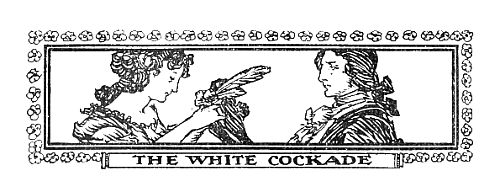
“Come weal, come woe, we’ll gather and go,
And live and die for Charlie.”
 HE scene shifts to the shores of a remote loch in the
Western Highlands of Scotland. Great, gloomy hills
rise from the water’s edge; the whole aspect of the
place is wild and solitary. At the head of the loch is a little
plain, from which a narrow, rocky glen runs far inland.
Not a soul is in sight; not a sound breaks the stillness.
Now you see a small company of men appear on the plain.
In the centre of them is a gallant young soldier, tall and
slim, with a high, broad forehead, a shapely nose, rich, dark-brown
eyes, and chestnut hair. He carries himself right
nobly, and you feel as you gaze upon him that here at
last is a real hero of romance. Full of hope and eager anticipation
he comes upon the scene; but as he waits, and
the minutes lengthen into hours, his light-hearted gaiety
gives place to dejection. The glen remains silent and deserted.
Those who have sworn to meet here have not
kept tryst. The young prince—for such he is—retires
with a sinking heart to the shelter of a barn. Suddenly
he hears the faint sound of distant bagpipes. His eyes
light up, he springs to his feet, and hastily quits his shelter.
His heart beats fast as he listens. Louder and louder
grows the sound of the pibroch, and now on the skyline
of yonder hill you see Lochiel with seven or eight
hundred Camerons. As soon as they sight the prince
they raise loud huzzas, which echo and re-echo from the
hills.
HE scene shifts to the shores of a remote loch in the
Western Highlands of Scotland. Great, gloomy hills
rise from the water’s edge; the whole aspect of the
place is wild and solitary. At the head of the loch is a little
plain, from which a narrow, rocky glen runs far inland.
Not a soul is in sight; not a sound breaks the stillness.
Now you see a small company of men appear on the plain.
In the centre of them is a gallant young soldier, tall and
slim, with a high, broad forehead, a shapely nose, rich, dark-brown
eyes, and chestnut hair. He carries himself right
nobly, and you feel as you gaze upon him that here at
last is a real hero of romance. Full of hope and eager anticipation
he comes upon the scene; but as he waits, and
the minutes lengthen into hours, his light-hearted gaiety
gives place to dejection. The glen remains silent and deserted.
Those who have sworn to meet here have not
kept tryst. The young prince—for such he is—retires
with a sinking heart to the shelter of a barn. Suddenly
he hears the faint sound of distant bagpipes. His eyes
light up, he springs to his feet, and hastily quits his shelter.
His heart beats fast as he listens. Louder and louder
grows the sound of the pibroch, and now on the skyline
of yonder hill you see Lochiel with seven or eight
hundred Camerons. As soon as they sight the prince
they raise loud huzzas, which echo and re-echo from the
hills.
The clansmen form up, and the feeble old Marquis of Tullibardine, supported by a man on each side, proudly unfurls a royal standard. As its white, blue, and red folds lift upon the wind, cheer after cheer is raised, and the greatest enthusiasm prevails. A commission of regency is read, and the prince, baring his head, makes a brief but gallant speech. “I knew,” he says, “that I should find in Scotland brave gentlemen, fired with the noble example of their predecessors, and jealous of their own and their country’s honour, to join me in so glorious an enterprise. For my own part I do not doubt of bringing the affair to a happy issue.” The cheers which greet the prince’s speech have scarcely died away before the Macdonalds, to the number of three hundred, arrive. Others follow, and before the camp fires are lighted fifteen hundred men have sworn to follow the prince to the death.
Who is this prince, and why has he invaded this remote and desolate part of Scotland? He is Prince Charles Edward Stuart, the grandson of James the Second, the son of the “old Pretender,” a gay, light-hearted, active, robust, adventurous young man of twenty-five, who since boyhood has cherished the hope of winning back the throne of his fathers. There has already been one attempt, but it was a dismal failure. Fifty-seven years ago his grandfather fled from the kingdom, and William and Mary began to reign in his stead. Then followed his aunt, Queen Anne; and at her death the Tories very nearly made his father king. The activity of the Whigs foiled them just in the nick of time, and the King of Hanover, “a wee German lairdie,” who claimed descent through his mother from James the First, was brought over and crowned. Now his son, the second George, was King of Great Britain and Ireland.
A fierce continental war was now raging, and Britain was foolish enough to take a hand in it. To the exiled court, then established in Rome, England’s embarrassment was the Jacobites’ opportunity, and our young hero, “bonnie Prince Charlie,” saw that he must shoot his bolt now or never. To his father he said, “I go in search of three crowns, which I doubt not but to have the honour and happiness of laying at your Majesty’s feet. If I fail in the attempt, your next sight of me shall be in my coffin.” “Heaven forbid,” replied James, “that all the crowns in the world should rob me of my son.”
Some months of delay elapsed, and then an expedition was fitted out; but the winds and waves, never kindly disposed to the Stuarts, drove it back. Weary of waiting for further French assistance, Prince Charlie determined to stake all on a desperate venture. “I will go to Scotland,” he said to Lord George Murray, one of the wisest and most trusted of his advisers, “if I take with me only a single footman.” His equipment makes us smile. He was about to challenge the might of Britain with a few hundred muskets, some broadswords, twenty small field-guns, a war-chest of £4,000, and a barrel or two of brandy. The whole story would be a farce had not the splendid spirit of young Charles lifted it into a romance. Sailing from Nantes with a little privateer and a fast brig called the Doutelle, he soon lost the privateer, which was driven back to harbour by a British ship. The Doutelle, however, skirted the eastern shores of Scotland, rounded the tempestuous north, sailed amidst the islands of the west, and landed him with seven followers at Eriskay, a little island of the Hebrides, on July 25, 1745.
Let us picture the scene. The French frigate lies off the little rocky isle, and the prince is eager to go ashore. During the brief voyage he has exercised that extraordinary personal magnetism with which he is endowed, and every man on board is his willing slave. No one, not even Napoleon, ever possessed so much of that strange attraction which can capture the imagination of men and women, and make them leave home, kindred, and friends in order to throw themselves into a perilous and ruinous cause. As the needle points to the pole, so do all men’s hearts turn to him, whether in sunshine or in storm, in defeat or in victory. As the French frigate comes to her anchorage an eagle hovers over the ship. “Sire,” says old Tullibardine, “the king of birds has come to welcome your royal highness.”
A few hours later Charles trod the soil of Scotland for the first time. The day was wet and stormy, and the opening of the campaign was most inauspicious. Next day a neighbouring chief, Macdonald of Boisdale, was sent for. He came “over the water to Charlie,” but bluntly advised the prince to return home. With that readiness of speech which marked him, the prince replied, “I am come home, sir, and I will entertain no notion of returning to that place from whence I came. I am persuaded that my faithful Highlanders will stand by me.” He refused to be rebuffed, and forthwith crossed in the French ship to the coast of Inverness, where he summoned the gallant Lochiel and other leading chiefs to meet him. And now his fate seemed to rest on the goodwill of a single man. Lochiel had already denounced Charles’s invasion as a rash and desperate undertaking, and he was in no mood to join the prince. Other leading men shook their heads, though Charles pleaded his cause with all the earnestness of despair, pacing up and down the deck, and pouring forth a torrent of eloquent words.
As he did so he espied a young Highlander listening attentively with flushed cheeks and sparkling eyes. Here was a kindred spirit. The prince suddenly turned to him and said, “You, at least, will not forsake me.” “I will follow you to the death,” said the lad. “I would follow you to the death, even were there no other to draw a sword in your cause.” The lad’s speech had an excellent effect on his hearers. Their Highland pride was touched, their Highland chivalry was aroused. Most of them flung their caution to the winds and eagerly embraced his cause. Lochiel, however, had yet to be persuaded, and Charles, tired of pleading, tried reproach. “In a few days,” he said, “with the few friends that I have, I will erect the royal standard and proclaim to the people of Britain that Charles Stuart is come to claim the crown of his ancestors, and to win it or perish in the attempt. Lochiel can stay at home and learn from the newspapers the fate of his prince.” This was more than Lochiel could bear. “No,” he cried; “I’ll share the fate of my prince, come what may.” Forthwith arrangements were made for the meeting at Glenfinnan. You have already witnessed the gathering of the clansmen and the unfurling of the royal standard.
On the very day that the prince’s banner first waved in the northern breeze, Sir John Cope, the commander of the royal forces in Scotland, moved towards the Highlands with three thousand men, mainly raw recruits, for well-nigh the whole British army was overseas in Flanders. Cope was a dull man of the stock-and-pipeclay school, and a thoroughly incompetent general. His object was to relieve the small garrisons of royal troops stationed at Fort William and Fort Augustus. When, however, he reached the rocky steeps of Corry Arrack he found the clansmen in possession of the pass. Rumours were rife that every zigzag path was commanded by big guns, and that every rock concealed an armed Highlander. Turning aside, he marched towards Inverness, and thus left the southern road open.
With banners flying, bagpipes skirling, and drums beating, the Highland host, shaggy and unkempt as their own cattle, with a meagre equipment and a strange assortment of weapons, pushed on towards Perth. The prince rode at their head, and every day he grew in favour with his followers. His frank, manly air and his gallant bearing knit him to them with “hooks of steel,” and their spirits rose with every mile they marched. Opposition melted away before him. Leaving Perth, he marched on Stirling. The castle sent a few ineffective shots towards him as he crossed the Forth and proceeded towards Edinburgh. On the 17th September he was in possession of the Scottish capital without striking a blow.
Forthwith “King James the Eighth” was proclaimed at the Mercat Cross by the heralds in all their finery, and the prince took up his abode in Holyrood Palace, where balls and banquets and other brilliant festivities were held. The time, however, was not suitable for such scenes of gaiety. Cope had embarked his troops at Inverness, and had sailed south for Dunbar, where he had landed his forces. He was now ready to march on Edinburgh, and Charles determined to give him battle at once. On the night of the 20th he led his army along the ridge of high ground towards Inveresk, where he expected to meet the enemy. It was wise to keep to the high ground, for, as one of his captains said, “Even a haggis could charge down hill.” As the troops moved off Charles drew his sword and said, “Gentlemen, I have flung away the scabbard.” At Prestonpans Cope’s army was discovered on the narrow plain between the hills and the sea. A deep morass lay between the two hosts, and Cope prided himself that his position was secure. Both armies slept on the field, and through the night watched each other. The prince lay amongst his men with a bundle of pease-sticks for a pillow.
During the night a local gentleman, who knew every inch of the ground, remembered that a path led from the height through the morass and round the left wing of the enemy. The prince was roused and told the good news, and immediately the order was given to advance. In deep silence the march was commenced, Lochiel leading the way. The stars shone brightly overhead, but as the men advanced the mist gathered and concealed their movements. So, unseen, they threaded the narrow path, their soft brogues making no sound. The path had been left unguarded, and the Highlanders gained the plain, and were beginning to form when the mist lifted and disclosed them to their foes. Cope’s men were taken by surprise. The Highlanders charged furiously, and in six minutes the battle was lost and won. Cope’s army was in flight, and Charles had captured his cannon and baggage and seventeen hundred prisoners.
For six weeks after his victory Charles lay in Edinburgh, holding councils and drilling his troops by day, and dancing gaily by night in the oaken gallery of Holyrood, where his kinswoman, the unhappy Mary Queen of Scots, had held her court. Not until the last days of October did he begin his march on England, in the full expectation that his easy conquest of Scotland would be repeated over the Border. No sign of the expected rising, however, met the invaders as they marched southward. The Highlanders began to desert, and his troops dwindled in number daily. A few recruits joined his standard at Preston, but it was already evident that his dream of an English rising was vain.
Throughout the long, disappointing march the prince was the life and soul of his army. His tact, his endurance, and unfailing good-humour endeared him more and more to his faithful followers. The farther his army marched south the colder was his reception, until by the time he reached Derby it was plain that he had come to the end of his tether. The Duke of Cumberland had an army at Lichfield; there was a second army in his rear; and a third on Finchley Common. The wiser of the Jacobite leaders now advised a retreat to Scotland. Charles, however, had not yet lost hope; all his talk at Derby was about the manner in which he should enter London, whether on foot or on horseback, in the Highland or in the Lowland dress. Lord George Murray pressed upon the prince the absolute necessity of returning to Scotland, and at length Charles was very reluctantly forced to give the order to retreat. Homeward in straggling, sullen groups the Highlanders retraced their steps, with the foe hard at their heels. Charles showed obvious signs of dejection, and constantly lingered behind his men. On the 20th December the Highland army stood once more on Scottish ground.
Eight days later Charles marched to Stirling at the head of the largest army which he had ever commanded. Leaving a small party to watch the castle, he hurried to Falkirk, where he met General Hawley, who was advancing to the relief of Stirling. Here again the young prince was victorious; but hardly had the smoke cleared away from the battlefield before quarrels broke out amongst the Highland leaders, and Charles was forced to retreat. The Highlanders, laden with booty, returned to their homes, and Charles pushed on to Inverness, followed by the Duke of Cumberland with a strong force of Royalist troops. Cumberland encamped at Nairn, nine miles from the moor of Culloden, on which the remains of Charles’s army lay.
They were ill-prepared for battle. The war-chest was empty, food was scarce, and the men were worn out with fatigue and privation. Lord George Murray proposed a night attack on the royal army, and suggested the 15th April as the most suitable date, because it was Cumberland’s birthday, and sure to be an occasion for revelry in the English camp. Charles agreed to the proposal, and the march began; but so fatigued and hungry were his men that no less than fifty halts had to be called in eight miles. At two in the morning, the time fixed for the attack, the Highlanders were still four miles from the English camp. Cumberland’s men had already aroused themselves, and the Jacobite host had to plod back wearily to Culloden once more.
The final hour had come. Cumberland advanced with his 10,000 troops, fresh, ardent, well-fed, and well-equipped, and the battle was decided before it was begun. At a distance of a third of a mile his guns opened fire, making blood-red lanes through the Jacobite regiments. They stood their ground with wonderful courage; but they were obliged to give way, and as dusk settled over the moor the cause of the Stuarts was lost for ever.
Then came the grim sequel. “Butcher” Cumberland took such a cruel vengeance on the defeated foe that he well deserves his nickname. Several Scottish lords were beheaded, and measures were taken to prevent a similar rising in future. The tartan and kilt were proscribed articles of dress, the clan system was broken up, and military roads opened the Highlands to the rapid march of troops.
Meanwhile “bonnie Prince Charlie” was a fugitive, with a price of £30,000 on his head. For months he encountered hairbreadth escapes and perils by land and sea. His life was made up of days of hiding in the heather, and nights of hunger, cold, fatigue, and anxiety in dim mountain caves. Yet, though his whereabouts were known to scores of people who might easily have earned the money and a pardon into the bargain, no one betrayed him, no one revealed his hiding-place. Men and women at the risk of their lives befriended him, and ultimately, by the aid of those whom he had brought to ruin and to the verge of the scaffold, he managed to escape.
History reveals no more splendid example of unswerving loyalty. The whole story of Prince Charlie’s wanderings is one of the proudest traditions of the land of mountain and of glen. As a memorial of his gallant but hopeless attempt to overthrow King George the Second we have those spirited and tender Jacobite songs which have become an imperishable part of our literature. They are a monument not so much to the young man whom they commemorate as to the race which saw in him its best and most inspiring ideals.
Before we say farewell to Prince Charlie, the story of a woman’s superb heroism and devotion must be told. When Charles was hiding in the heather in South Uist, and the redcoats were within a couple of miles of him, a young lady, named Flora Macdonald, was introduced to him. She had lately come from Skye to visit her brother in South Uist, and Charles’s faithful henchman, O’Neil, had heard of her and of her friendship for the Stuart cause. He met her secretly, and begged her to convey the prince to her mother’s house in Skye, where he might be safe until he could be got away to France. The plan was most difficult and daring, for Flora’s chief was then with Cumberland, and her stepfather was an officer in the Skye militia, and was at that instant scouring South Uist for the fugitive. Nevertheless Flora undertook the task, and O’Neil made her known to the prince. O’Neil proposed that Flora should obtain a pass from her stepfather for herself and her maid, Betty Burke, to go and visit her mother in Skye. Flora’s stepfather was a Jacobite at heart, and he furnished her with the passports. Betty Burke was none other than the prince, who was now to don petticoats and follow Flora as her servant. The prince made but a poor maid; he walked with such manly strides that his disguise only served to attract attention. Further, he could not manage his skirts; at one time they trailed in the mud, at another time he held them above his knees. However, the boat was reached in safety, and “over the sea to Skye” went Charlie. The night was stormy, but Flora slept, and the prince watched over her and sang songs to hearten the crew. In the morning they only just managed to escape the boats of the enemy.
While the prince hid in the heather, Flora went to the house of a friend, Lady Margaret Macdonald, and arrived at a sadly ill-timed moment, for the militia were in the neighbourhood and their officer was in the house. Nevertheless, arrangements were made, and Macdonald of Kingsburgh undertook to get the prince to Portree. The night was spent at Macdonald’s house, and next day Charles managed to get to Portree, where he doffed his petticoats. Here he hid for some time in a cave, and here, too, he said good-bye to his brave preserver. He kissed her and said, “For all that has happened, I hope, madam, we shall meet at St. James’s yet.” He called her “our lady,” and his last thought was for her. Thus he parted from the courageous woman who had ventured all for his sake. From this moment she fades out of history, but her place amongst the heroines is assured for ever.
Months of flitting to and fro, of lurking in the heather and hiding in caves and ruined huts, followed, and at last news came to him that two French vessels were off the coast. Losing no time, he started off for the very spot where fourteen months before he had landed so full of hope. The ships were riding at anchor, a boat moored to a rock awaited him. The prince jumped in, and in a few moments was climbing the sides of the vessel, safe at last. And here we leave him while his ship is rocking on the wave, and the stern men upon whom he has brought such sorrow and suffering wave him a last farewell amidst their streaming tears. We will not dwell upon the later years of his life—years of misery and degradation, when the once gay, kind, brave, and loyal prince sank into a fierce, shabby, homeless, and almost friendless adventurer. For many years he moved about like a shadow, finding his way more than once to England. Giving way to drink, he sank deeper and deeper into the mire. Let us not dwell upon the sad scenes of his later life. Let us think of him in his best moments, as the man who ennobled the Highland race for all time by calling forth a devotion, loyalty, and love the fame of which can never die.

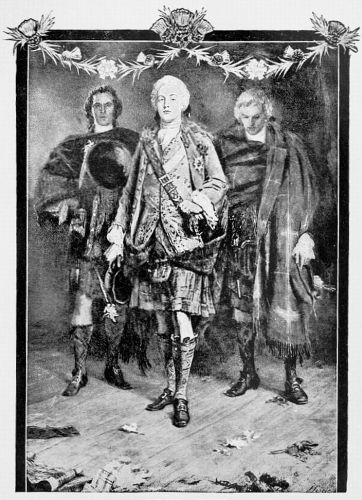
BONNIE PRINCE CHARLIE.
(From the painting by John Pettie, R.A.)
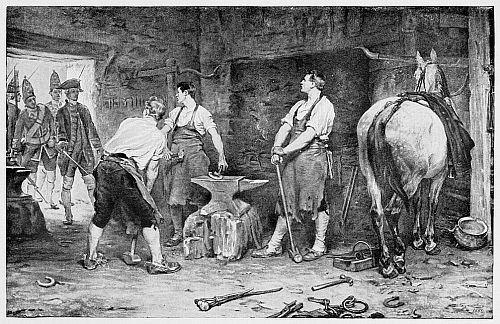
AFTER CULLODEN: ROYALIST SOLDIERS SEARCHING FOR JACOBITE FUGITIVES.
(From the picture by John Seymour Lucas, R.A., in the Tate Gallery. By permission of Messrs. Frost and Reed.)
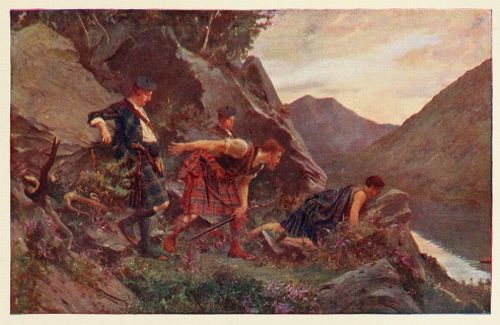
A Royal Fugitive.
(From the picture by Allan Stewart. Exhibited in the Royal Academy, 1907.)

“War, disguised as commerce, came;
Britain, carrying sword and flame,
Won an empire.”
 OU are now permitted to peep into the citadel of
Arcot, the old capital of the Carnatic. Its walls are
ruinous, its ramparts unfitted for guns, its battlements
too low to protect soldiers. The town is in the
hands of four thousand native troops, assisted by one hundred
and fifty Frenchmen. Within the fort there are but
a hundred and twenty Europeans and two hundred Sepoys.
Their stock of provisions is very low. At the request of
the Sepoys the Europeans take the rice, while the faithful
natives contrive to keep body and soul together on the
water in which it has been boiled. The defenders are daily
diminishing in number from starvation, disease, and the
musketry fire of the enemy, but there is no talk of surrender.
You judge that their leader must be a man of no common
courage and resolution, and you are right. Within yonder
room their young English captain is placidly sleeping, though
he knows that the enemy is about to assault his feeble post.
OU are now permitted to peep into the citadel of
Arcot, the old capital of the Carnatic. Its walls are
ruinous, its ramparts unfitted for guns, its battlements
too low to protect soldiers. The town is in the
hands of four thousand native troops, assisted by one hundred
and fifty Frenchmen. Within the fort there are but
a hundred and twenty Europeans and two hundred Sepoys.
Their stock of provisions is very low. At the request of
the Sepoys the Europeans take the rice, while the faithful
natives contrive to keep body and soul together on the
water in which it has been boiled. The defenders are daily
diminishing in number from starvation, disease, and the
musketry fire of the enemy, but there is no talk of surrender.
You judge that their leader must be a man of no common
courage and resolution, and you are right. Within yonder
room their young English captain is placidly sleeping, though
he knows that the enemy is about to assault his feeble post.
Already he has been offered honourable terms and a bribe of money if he will but yield. He has rejected both with the utmost scorn and defiance, though he knows full well that the capture of the fort means the death of every man in it. In haughty tones the young Englishman has told the prince who commands the besieging army that his father is a usurper, that his forces are a mere rabble, and that he will do well to think twice before he sends such poltroons against English soldiers. It is now the 14th day of November, and on the 30th of August last he and his little army marched through a violent storm of thunder and rain, and captured the fort without striking a blow. He has already held out for seventy-five days, hoping hourly for relief. But he has not been inactive. Time after time he and his little band have sallied forth and inflicted considerable damage on the besiegers. The artillery of the enemy has already made much havoc; two great breaches gape in the walls. Every attempt to storm them has failed. Now the enemy is in overwhelming force, and to-day an assault is to be made; yet the commander of the post lies calmly sleeping, though a touch on the shoulder will awaken him and bring him on to the walls to direct the defence. He has made all arrangements; he has done all that man can do. Now he is recruiting his exhausted strength for the critical struggle that awaits him.
To-day is the most solemn festival in the Mohammedan calendar, a day on which the followers of Mohammed believe that he who falls in fight against the infidel will enter at once into Paradise. The religious enthusiasm of the besiegers is almost a frenzy, and they have further increased their madness by a free use of the intoxicating drug which they call bhang. They are ready to go to death with eager joy; no man of them will flinch from the most dangerous duty; all are zealous for the privilege of sacrificing their lives.
Suddenly you hear the discharge of three bombs. It is the signal for the attack. Our young Englishman is awake now, and you get your first glimpse of him. One glance at his face convinces you that he is a warrior of warriors, that there is not a particle of fear in his whole composition, that he is a born leader of men. His Sepoys positively worship him. They believe him to be more than mortal. Whatever he commands they obey. Their devotion to him exceeds that of the Tenth Legion to Cæsar and of the Old Guard to Napoleon.
Such is Robert Clive, a young man of twenty-five, who left his Shropshire home as the scapegrace of the family. In his home at Styche and in the grammar school of Market Drayton he acquired a most unenviable reputation—always in mischief, ready to use his fists on the slightest provocation, an idle, worthless dunce. In desperation his father packed him off to India as a book-keeper; but he has exchanged the pen for the sword, and has now found his vocation. It is he who suggested this desperate enterprise, and to-day he is about to lay the foundations of his great fame.
The attack has begun. A vast multitude of besiegers is beneath the walls carrying ladders, while against the four points where the fort is weakest—the two gates and the two breaches—organized and simultaneous attacks are preparing. Huge elephants, with their foreheads armed with iron plates, are driven forward, and you expect that the gates will be smashed to matchwood by the impact of these living battering-rams. But watch! Now you see Clive directing his men to pour their fire into the elephants. They do so, and the huge beasts, stung by the bullets, turn round and trample under foot the dense masses of men behind them. The enemy has been hoist with his own petard.
There is a wild rush into the north-west breach, which is blocked with yelling natives. Suddenly you hear a volley, and down go scores of the assailants. Clive has dug trenches behind the breaches, and his men are in them pouring a murderous fire on the living, struggling mass that swarms through the gap in the wall. As soon as the guns are discharged they are handed to the rear-rank men to be loaded, and others charged and primed are received in exchange. Three field-pieces now open fire, and every shot tells. After three desperate onsets the enemy is driven back.
Meanwhile the south-west breach is attacked. Water fills one part of the ditch which protects it, and on this the foe has launched a raft crowded with soldiers, who are urging it towards the shattered walls. The gunners at this post fire wildly and their aim is bad. Clive springs to the gun and works it himself. In three discharges he has cleared the raft and torn it asunder. Many of its occupants are drowning in the ditch, the remainder are swimming back to the bank.
The fight has now lasted an hour, and four hundred of the assailants are dead. The grand attack has failed. There is firing during the night, but when day breaks the besiegers are nowhere to be seen. They have hurriedly abandoned the town, leaving their artillery and ammunition behind them.
At once India rings with the praises of Clive. Reinforced, he proceeds upon his victorious career, and the natives tremble at his name. Within the next three years, by his marvellous energy and skill, he will establish British supremacy in India.
Now we must hark back in order to understand the meaning of the struggle which we have just witnessed. The East India Company, in whose service Clive had enlisted, was established as far back as the days of Queen Elizabeth. It was founded for trade, and it attended closely to business. When Clive arrived in India its territory consisted of a few square miles of land, for which rent was paid to native rajas. Its troops were scarcely sufficient to man the ill-constructed forts which had been erected at Madras, Bombay, Calcutta, and a few other places to protect the warehouses. Most of the soldiers in the service of the Company were natives, and were neither furnished with European weapons nor disciplined according to European methods. The white servants of the Company were simply traders, whose business it was to make advances to manufacturers, ship cargoes, and in other ways push the business interests of their employers. Most of the younger clerks, of whom Clive was one, were miserably paid, while the older ones enriched themselves by trading on their own account.
A French East India Company had also been founded, but at the outset it met with much less success than the English Company. At the close of the seventeenth century it possessed little more than the small town of Pondicherry, which still remains in French hands. At this time the Moguls, the descendants of the Mohammedan conquerors of Northern India, dominated the land; but a few years later their power fell to pieces, and India was splintered into little independent kingdoms. The land was given over to civil war; every nawab, or governor, quarrelled and fought with his neighbours. The feebleness of the native rulers and the disturbed state of the country positively invited the European traders, both English and French, to conquest. Hitherto they had been merely competitors for commerce; soon they were to become rivals for dominion.
Such was the condition of affairs when Clive sailed for India. He was very homesick and depressed during the long voyage round the Cape, and when he arrived he had spent all his money and contracted some debts. He was stationed at Fort George, Madras, where he was wretchedly lodged and badly paid, and engaged in duties ill-suited to his daring, ardent nature. On more than one occasion he got into scrapes and received reprimands. Twice he attempted suicide, and twice the pistol which he snapped at his own head failed to go off. “It appears I am destined for something,” he said, and, as you already know, his prophecy proved true. In the year of his arrival in India (1744) war was declared by Britain against France, and the struggle in Europe led to the long fight for supremacy in India.
Dupleix, the French Governor of Pondicherry, was a man of great ambition, and he now conceived the idea of founding a great French empire in India. Himself an able soldier, he made two most important discoveries. First, he observed that the native armies could not stand against men disciplined in the European fashion; and, secondly, he perceived that the natives could be brought under European discipline by European officers. Forthwith he began to enlist Sepoys, or native soldiers, and to arm and discipline them after the French manner. With these Sepoys he intended to intervene in the disputes of the native rulers, and by taking first this side, and then that, gradually win India for France.
A French expedition appeared before Madras, captured Fort George, and seized the contents of the warehouses as prize of war. Some of the servants of the Company, including Clive, were paraded through the streets of Pondicherry in triumphal procession, and treated with great indignity. Clive, in the disguise of a Mohammedan, managed to escape from the town by night and make his way to Fort St. David, a small British settlement one hundred miles south of Madras. Here he begged an ensign’s commission in the service of the Company, and at twenty-one entered upon his military career.
He took part in Admiral Boscawen’s unsuccessful siege of Pondicherry, where he distinguished himself, and in his twenty-fifth year was promoted to be a captain. Shortly after the failure at Pondicherry peace was proclaimed. Nevertheless, there was but a short cessation of hostilities in India; for though British and French were supposed to have sheathed the sword, a great struggle for power was about to begin both in India and in America. Before long there was open war, which at first went greatly in favour of France.
Dupleix, continuing his rapid and brilliant career, had intervened in the affairs of the two great native states of Hyderabad and the Carnatic, and had managed to get his own candidates placed on the thrones of both these states. Thus he was practically master of South India. Civil war, however, continued in the Carnatic, where the French nominee was besieging Trichinopoly, the last stronghold of his rival. Trichinopoly was about to fall, and its fall would mean the complete supremacy of the French in India. At the critical moment Clive persuaded the Governor of Madras to entrust him with a small force to attack Arcot, the capital of the nawab whom Dupleix was supporting. By doing so, he hoped to draw off the nawab’s forces from the siege of Trichinopoly. You already know how splendidly he defended Arcot, and how he forced the enemy to raise the siege. By 1753 he had completely undone the work of Dupleix.
Worn out by anxiety and fatigue, he now returned to England. He had gone out ten years before, a friendless, wayward boy; he now returned, at the age of twenty-eight, to find himself greeted as one of Britain’s most famous soldiers. Naturally, his father and mother and the other members of his family were overjoyed to learn that naughty, idle Bobby had developed into a famous man, the theme of all tongues, honoured and praised by the greatest in the land. The East India Company thanked him for his services in the warmest terms, and offered him a sword set with diamonds. This he refused to accept unless a similar one was given to his friend and commander Lawrence. With his prize-money Clive helped to pay off some of his father’s debts, and to redeem the family estate.
In 1755 Clive returned to India. He had only just arrived when terrible news reached him. Suraj-ud-Dowlah, the Nawab of Bengal, a fiend in human shape, whose amusement as a child was to torture beasts and birds, and his pastime as a man to watch the sufferings of his fellow-creatures, had attacked the British settlement at Calcutta, and had seized one hundred and forty-six Europeans. These he thrust into a chamber known as the “Black Hole.” It was eighteen feet by fourteen, and its cubical content was twenty feet square. When ordered to enter the cell the prisoners imagined that the soldiers were joking, and as the nawab had promised them their lives they laughed aloud at the absurdity of the idea that they could possibly exist during the stifling heat of a Bengal June night in such a confined space. They discovered their error when they were driven in at the point of the sword. The windows were small and barred, and soon the air was poisonous. The horrors that followed are almost too terrible to recount. The poor creatures cried for mercy, they strove to break in the door, they offered large bribes to their jailers; but all to no purpose. Nothing could be done without the nawab’s orders, and he was asleep and could not be awaked. Many went mad; they trampled each other down, and fought like wild beasts for places at the windows. The murderers outside mocked at their agonies, holding lights to the bars, and shouting with laughter as they beheld the struggles of their victims. When day broke and the doors were opened only twenty-three ghastly figures staggered out into the sunlight. A hundred and twenty-three corpses were flung promiscuously into a pit dug for the purpose.
The rage and anger of the British in India can well be imagined. Clive hastened to Bengal to avenge the awful outrage. He had nine hundred Europeans and fifteen hundred Sepoys with which to oppose Suraj-ud-Dowlah’s huge army. After a short, sharp fight the enemy fled in confusion, leaving baggage, guns, and cattle in the hands of the victors. This battle of Plassey, fought on June 23, 1757, secured for the British the province of Bengal, the richest and most populous province of India.
The battle, however, was not won without grave treachery. Prior to the battle Clive learned that Mir Jaffier, Suraj-ud-Dowlah’s chief commander, had formed a plot against his master. He managed to get into communication with the disaffected general through the agency of one Omichand, a wily, unscrupulous Bengali merchant. This man held the thread of the whole plot in his hands; one word whispered by him in the ear of Suraj-ud-Dowlah would have meant the lives of all the conspirators. Omichand claimed £300,000 sterling as the price of his secrecy and assistance, and insisted that an article regarding his claims should be inserted in the treaty between Clive and Mir Jaffier. Clive now descended to conduct for which he cannot be defended, though excuses may be made. He knew he had to do with a villain, and he determined to defeat him by his own knavish acts. Two treaties were drawn up—the one, on white paper, was real; the other, on red paper, was a sham. The red paper contained the promise to pay Omichand’s demand; there was no mention of it in the white paper. Clive now added his signature, and forged that of Admiral Watson to the red paper, which was handed to Omichand. The treaty to which Mir Jaffier agreed was on the white paper.
When Suraj-ud-Dowlah was overcome, Mir Jaffier received the throne of Bengal as his reward. According to the terms of the treaty, he granted territorial and other rights to the East India Company, and gave Clive a gift of £200,000. “It is now time,” said Clive, “to undeceive Omichand.” Turning to the man, Clive’s interpreter said, “Omichand, the red treaty is a trick. You are to have nothing.” Omichand fell back insensible, and afterwards relapsed into a state of idiocy. Soon after, Mir Jaffier was besieged by the eldest son of the Great Mogul; but Clive marched to his relief, and the besiegers melted away. Then Mir Jaffier in gratitude made over to Clive the yearly rent, amounting to £30,000, which the British paid for the lands which they occupied about Calcutta. Probably Clive was justified in accepting this present, but it gave his enemies a powerful handle against him. In 1760 Clive returned to England, and was everywhere greeted as a “heaven-born general.” He became member of Parliament for Shrewsbury, and received an Irish peerage. His fortune, acquired by spoils, presents, and grants, actually yielded him £40,000 a year.
In 1765 he returned to India as governor-general, and set himself the task of purifying the administration of the Company. The officials and military commanders received very small salaries; but these they turned into fortunes by “shaking the pagoda tree”—that is, by blackmail, extortion, and corruption of all kinds. Clive attempted to stop these practices, and though his reforms were bitterly opposed, he left the Company’s service much purer than he found it. In the process he raised up a host of enemies, who in 1767, when he finally returned to England in shattered health, brought about his impeachment for corrupt practices, especially with reference to the Omichand affair and the present from Mir Jaffier. During the Parliamentary inquiry, Clive, when confronted by hostile evidence, remarked, “Mr. Chairman, at this moment I stand astonished at my own moderation!” The House of Commons evaded a decision on his conduct by passing a resolution that Lord Clive “had rendered great and meritorious services to his country.” He was acquitted, but the acquittal was really a vote of censure. Clive, broken in health, keenly sensitive to the disgrace of the verdict, and enfeebled in mind by the use of opium, felt the disgrace keenly. During one of the fits of deep depression to which he was subject, he ended his life by his own hand (November 1774).
Thus perished, in his forty-ninth year, the great Clive. His faults were many, but his merits outweighed them, and he must always stand high in the roll of British empire-makers. “Our island has scarcely ever produced a man more truly great either in arms or in council.” Let this be his epitaph.
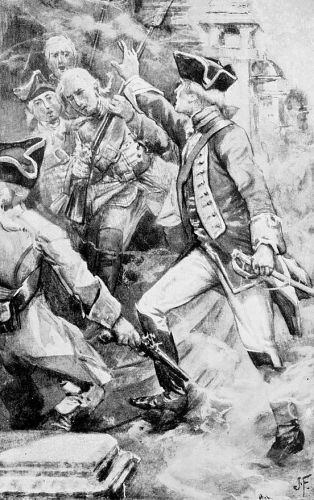
Clive at Bay.
The natives of India believed that Clive bore a charmed life. On one occasion, when he was resting along with several of his men, a party of Frenchmen fired into the room which he occupied, killing the man next to him. Clive rushed out, and finding himself confronted by six Frenchmen, loudly ordered them to lay down their arms as they were surrounded. The native allies of the French fled, and the assailants themselves took refuge in a temple. Next day they surrendered.
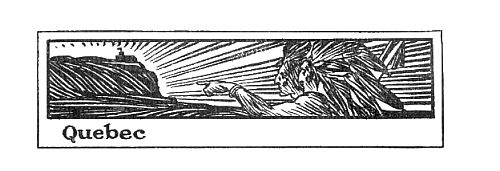
“Wolfe, where’er he fought,
Put so much of his heart into his act
That his example had a magnet’s force,
And all were swift to follow whom all loved.”
Once more you see a young soldier advancing. He is a hero of heroes, yet never was the soul of a hero enshrined in a more unhero-like frame. His features are homely, his hair is fiery-red, his shoulders are narrow, and his limbs are veritable spindle-shanks. But look at his eyes, and you will instantly forget his plain features and his rickety body. They are bright, searching, brimful of intelligence and vivacity, and speak eloquently of the indomitable spirit within. This is James Wolfe, the man who gave us Canada—“eldest daughter of the Empire”—that vast land of fertile prairie, dense forest, widespreading pasture, rich mines, unrivalled waterways, fine cities, and, above all, of a sturdy nation, heart-warm towards the mother-country, and eager to give her tangible proofs of kinship and affection. Wolfe gave Canada to the Empire at the price of his heart’s blood. In one “crowded hour of glorious life” he gave us the heritage of this majestic land, already the greatest and most prosperous of all British lands beyond the seas, and yearly advancing towards a mighty destiny.
James Wolfe was a soldier from his youth. His father was an officer of distinction; his mother a woman of great sweetness and charm, deeply beloved by her two sons, of whom James was the elder. He was born on June 2, 1727, at Westerham in Kent. Of his brief boyhood’s days we know little—indeed, there are but meagre details of his whole life. We know, however, that he was a delicate, sensitive, highly-strung boy, who inherited his mother’s frailty though not her beauty. We know, too, that he saw little of his father, who was almost constantly absent from home on active service. Nevertheless, he was tenderly and judiciously reared by his devoted mother.
When a mere schoolboy—a little over fifteen years of age—he became an ensign, and carried the colours in one of his Majesty’s regiments. From the beginning of his career he set himself to study the art of war, and at sixteen he was adjutant of his regiment, then serving in Flanders. He discharged his duties with great intelligence, and very early demonstrated his capacity for leading men. Even though an adjutant, he had not lost his schoolboy tastes, for we find him writing to his mother warmly thanking her for a plum-cake which she had sent him.
At twenty-one he had seen seven campaigns, and was a major. He had been present at the victories of Dettingen and Culloden, and it is said that on the latter battlefield he proved the nobility of his nature by refusing to shoot a wounded Highlander when ordered to do so by “Butcher” Cumberland. It is also said that he recommended the enlistment of Highlanders as soldiers in the British army. This may or may not be true, but it is certain that the Highland regiments first began to win their great renown under his command.
At thirty years of age he had acquired the reputation of a capable, active, zealous officer, but so far he had given little indication of the great fame which was soon to be his. In 1758 he first crossed the Atlantic; and here we may interrupt the narrative in order to explain the condition of affairs at that time in America. By the middle of the eighteenth century the British had established themselves in thirteen colonies along the Atlantic coast from Florida to Nova Scotia. The French had chosen Quebec as their capital, and had occupied Acadia (now the provinces of Nova Scotia and New Brunswick) and the valley of the St. Lawrence from the Atlantic to the Great Lakes. A new England and a new France had thus grown up in the New World.
New England grew rapidly in population and wealth. New France also prospered, though in a lesser degree. Its progress was hindered by constant warfare with the Indians, by the trading enterprise of the British, and by the interference of the home government. The two white races constantly advanced their frontiers, and their outposts drew nearer and nearer to each other every year. Border strife between the rival nations soon became frequent. In 1690, for example, the British settlers invaded New France to revenge themselves for the plunder of certain frontier stations. The invaders were driven back, but for years afterwards the French and the British kept up an irregular warfare. During the War of the Spanish Succession a powerful British fleet which was protecting the colonies seized that part of Acadia now known as Nova Scotia.
Though Britain had colonized the whole Atlantic seaboard from Florida to Nova Scotia, her territories had not advanced inland beyond the great barrier of the Alleghany Mountains. France, in addition to Canada, possessed the colony of Louisiana at the mouth of the Mississippi. She claimed that Louisiana stretched to the head-waters of the Mississippi and its tributary the Ohio. Had this claim been allowed, the British seaboard colonies would have been shut in on the west, and prevented from extending to the rich plains of the interior. Already the British needed elbow-room, for they numbered some 2,000,000, while the French in all the vast territory which they claimed could only muster 180,000.
The French now proposed to link Louisiana with Canada by a chain of forts along the Mississippi and the Ohio. The three northern links in the chain were Fort Ticonderoga, at the end of Lake Champlain; Fort Niagara, near the great falls; and Fort Duquesne, on the Ohio River, where the great manufacturing town of Pittsburg now stands. The first and last of these forts were close to the English back settlements, which were constantly ravaged by Indians in the pay of France. In 1754, while Britain was ringing with the fame of Clive fresh from his great defence of Arcot, a party of Virginian militia made a dash at Fort Duquesne under the leadership of George Washington, soon to be the greatest name in American history. The attack, however, was unsuccessful. This was the beginning of the great struggle between the French and the British for the possession of North America.
Next year General Braddock, who had been sent out to be commander-in-chief in America, marched against the French at the head of 2,200 British regulars and American settlers. He cut his way through almost impenetrable forest, but when eight miles from the fort fell into an ambuscade. The Indians and French were hidden in bushes and behind trees, and they poured volley after volley into the British ranks. The settlers wished to fight in the Indian fashion, and take cover behind the trees; but Braddock thought this mode of warfare cowardly, and so they fought in the open until so many of the British were killed that a retreat had to be sounded. Soon the retreat became a flight, and but for Washington and his Virginians, Braddock’s little army would probably have been cut off to a man. The consequences of this defeat were terrible. The French let loose the Indians on the outlying British settlements, and the woods rang with the screams of tortured victims. For a time France was supreme on the American continent.
In 1758 the British outlook was black indeed, and at home men trembled in hourly expectation of a French invasion. England was in a very bad way indeed; but the hour found the man, and that man was William Pitt. He sketched out a bold plan of campaign in America. Simultaneous attacks were to be made on Fort Ticonderoga and Fort Niagara, and on Quebec, the key to New France. Pitt looked around for a general after his own heart. He found him in James Wolfe, a young soldier with the daring, skill, and determination to accomplish what the great statesman planned. Merit and merit alone decided Pitt’s choice, and a better choice was never made.
Wolfe had just returned from the capture of the chief fort in Acadia, where as brigadier under General Amherst he had covered himself with glory, and had earned the proud title of “hero of Louisbourg.” When Pitt offered the command of the new expedition to Wolfe he jumped at the chance. “Mr. Pitt,” he said, “may dispose of my slight carcass as he pleases.” The Duke of Newcastle, then Prime Minister, was shocked at Pitt’s choice. He told the king that Wolfe was mad. “Mad is he?” said George; “then I hope he will bite some others of my generals.”
On February 17, 1759, Wolfe sailed for Canada with a strong fleet and 9,000 troops. During the voyage he suffered tortures from sea-sickness. In May he was in the harbour of Louisbourg, and on the sixteenth of June he weighed anchor for Quebec, the troops cheering and the officers drinking this toast, “British colours on every French fort, port, and garrison in America.”
Quebec, the most historic spot in all the New World, has not inaptly been called the Gibraltar of America. It stands on the nose of a rocky peninsula shaped like a bull’s head and facing eastward. On the south and east sides it rises by steep cliffs to a rocky summit. On south, east, and north it is defended by rivers: to the south flows the great St. Lawrence River, which expands on the east into a broad basin upon which the navies of the world might ride; while on the north the peninsula is protected by the estuary of the river St. Charles. The town itself consists of two parts—a lower town, which huddles by the water side, and an upper town, which climbs the cliffs. High on the summit is the grim and frowning citadel. Let us ascend to this historic fortress and gaze in admiration on the scene which unfolds itself. The lower town, with its steep streets, its old gabled houses, its public buildings, and numerous churches with their tin-covered cupolas and minarets, rises sharply from the water’s edge. Opposite to us, on the other side of the river, is Point Levis, and to the east is the beautiful Isle of Orleans. On our left, across the basin, is the Montmorency River, which hurls itself over a precipice to mingle its waters with those of the great river. To our right extend the famous Plains of Abraham, now purchased and preserved as a national park consecrated to great historical memories. Such is the Quebec of to-day. In the year 1759 it presented a much ruder aspect, though it was then lively and important, and had been made almost impregnable by walls, bastions, and fortified gates.
Within this city Vaudreuil, its bombastic, corrupt governor, and his gang of unscrupulous officials kept up a feeble imitation of the luxurious court of France. They robbed the king, their master, and they robbed the Canadians committed to their protection. “Are the walls of Quebec made of gold?” asked Lewis when official after official returned to France bloated with wealth. New France was honeycombed with peculation and fraud, and there was but one honest, incorruptible man amongst the greedy horde. He was Lewis Joseph, Marquis of Montcalm, a soldier of unblemished repute and no mean scholar. His life was one long struggle with the governor, who thwarted him in every possible way, and arrogated to himself all the credit and honour which his noble colleague managed to win.
Montcalm had early news of Wolfe’s errand, and he hastily collected every able-bodied man and every boy who could hold a gun within the walls of the town. “Never,” said he, “was Canada in a state so critical and full of peril.” Quebec was already strong by nature, and Montcalm proceeded to make it stronger still by art. Redoubts, batteries, and lines of entrenchment were thrown up along the lofty, curving shores from the St. Charles River to the Montmorency, and a boom of logs and hulks mounted with cannon barricaded the former river. Fourteen thousand men lined the earthworks, and one or two thousand more manned the guns of the fortress. When Wolfe arrived on the 21st of June, Quebec was well-nigh impregnable.
Wolfe landed his men on the Isle of Orleans, and soon realized the desperate character of the task which he had undertaken. To take Quebec seemed impossible. The cliffs to his left were edged with palisades and capped with redoubts, while on his right was a far-extended line of entrenchments, ending at the foaming cataract of Montmorency. There seemed to be no chink in the wall of defence. For weeks Wolfe lay inactive, wearing himself to a shadow in the attempt to find a weak spot against which he might hurl his army.
He seized Point Levis, and from it bombarded the city, only a mile away. Fierce as his fire was, it did nothing to help him to capture the place. At length, tired of inactivity, he attempted on the 31st of July to gain a footing on the north shore of the St. Lawrence by landing his men at the Montmorency Falls and climbing to the plateau above. In this he was successful; but though his guns now played on the flank of Montcalm’s entrenchments, the city of his desire was as far off as ever. “You may demolish the town,” said the bearer of a flag of truce, “but you shall never get inside it.” “I will take Quebec,” replied Wolfe, “if I stay here until November.”
A frontal attack on the Beauport Heights was a complete failure, and Wolfe lost more than two hundred men. He was now almost worn out. His pale face and tall, lean form were no more seen going to and fro amongst his soldiers. He lay dangerously ill, and his life was almost despaired of. He felt his failure intensely, especially as news now arrived that the attacks on Ticonderoga and Niagara had been successful. Meanwhile the British fleet had accomplished a great feat. Despite a furious cannonade from the guns of Quebec, ship after ship had managed to sail up the river past the forts, and now were able to threaten the city from a position which the French believed to be unattainable by the enemy.
On the 20th of August the young general was about again, and was diligently searching the steep, rocky shore above Quebec for a possible landing-place. At last, about three miles from the city, at a place now called Wolfe’s Cove, he discovered a goat track that wound up the wooded precipice for two hundred and fifty feet above the St. Lawrence. A French guard was stationed at the top, but Wolfe thought it could easily be surprised. Had he known that the captain in charge had gained a reputation for cowardice, and had allowed his men to go home to dig up their potatoes, his hopes would have been higher. At any rate he was now resolved to climb the Heights of Abraham and meet Montcalm’s army at the very gates of Quebec.
Now let us pass on to the fateful night of September 13, 1759. Under cover of the darkness the British flotilla of boats moved silently with muffled oars towards the landing-place. Wolfe, who was in the leading boat, began in a low whisper to recite the beautiful lines of Gray’s “Elegy.” He came to the noble verse—
“The boast of heraldry, the pomp of power,
And all that beauty, all that wealth e’er gave,
Await alike the inevitable hour;
The paths of glory lead but to the grave.”
“Now, gentlemen,” he said, “I would rather have written those lines than take Quebec.”
The boats drifted on in death-like silence. Suddenly, as the tide bore them inshore and the mighty wall of rock loomed above them, they were sharply challenged by a sentry. “Qui vive?” he cried. A Highland officer replied in good French, “La France.” “Of what regiment?” demanded the sentry. “The Queen’s,” answered the Highlander, and the sentry was satisfied. A sigh of relief escaped from the commander, and the boats glided on. Presently another sentry challenged, but he too was deceived. In a few moments more the boats lightly ran aground in a little cove. The men disembarked silently and scrambled up the wooded precipice on their hands and knees. The French guard at the top was captured, and loud British huzzas proclaimed that at last a footing had been gained on the coveted spot. Before the day broke Wolfe had marshalled his men on the Heights of Abraham, and in the gray dawn they saw the city almost within their grasp. When they became visible, Montcalm was greatly alarmed. “This is a serious business,” he said. Bugles and mounted messengers called in his troops. To save the citadel he was obliged to abandon his entrenchments and give fight in the open.
The battle that followed was singularly brief in duration, yet it settled the fate of Canada. The French advanced, firing rapidly; but the British reserved their fire until the enemy was within close range. Then a fearful hail of bullets sped from their muskets. The French wavered, and as the British reloaded and advanced, they turned and fled. Wolfe was wounded in the wrist as he led the charge, but he wrapped a handkerchief about the wound and pushed on. Soon after another bullet struck him in the breast. “Don’t let my men see me drop,” he said as they carried him to the rear. Here he lay, his eyes glazed, and his life fast ebbing away. Suddenly one of the little group about him cried, “They run; see, they run!” The dying man roused himself as though from sleep. “Who run?” he asked. “The enemy, sir,” was the reply; “they give way everywhere.” The dying flame of life flickered up for a moment, and he gave a clear, emphatic order for cutting off the retreat. This done, he turned on his side, murmuring, “Now God be praised, I die happy.” Wolfe was dead.
His gallant foe, Montcalm, was also stricken down in the fight. “How long have I to live?” he asked of his surgeon. “Twelve hours, more or less,” was the reply. “So much the better,” said the dying man; “I shall not live to see the surrender of Quebec.” Before passing away, he wrote to the British commander beseeching him to show mercy to the townsfolk. “Do not let them perceive,” he said, “that they have changed masters. Be their protector, as I have been their father.” It is to Britain’s honour that she has observed this dying request of a great and good man with scrupulous care. The French Canadian of to-day would be the first to say that under the Union Jack he retains his faith and language, his old laws and cherished institutions, and that under British rule his liberty has been enlarged and his prosperity established.
On September 18, 1759, the British flag was hoisted on the citadel of Quebec. At home the news was received with rapturous joy. “The whole nation rose up and felt itself the stronger for Wolfe’s victory.” The scattered remnants of the French fell back on Montreal, and in the next autumn they were surrounded and forced to surrender. The victory of the British was complete; the destiny of Canada was fixed for ever.
A tribute to the joint memory of the two leaders who in death were not divided now stands in the public gardens of Quebec, and on the battlefield is a simple obelisk with the plain inscription, “Here died Wolfe, victorious.”
And here we leave James Wolfe “alone with his glory.” He died, as he wished to die, a soldier’s death, and he leaves to future ages a noble example of high honour, strict integrity, and noble devotion to duty.
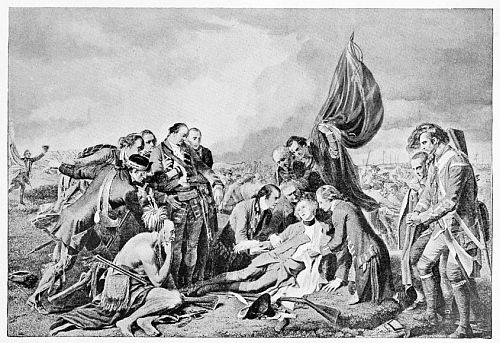
DEATH OF WOLFE.
(From the picture by Benjamin West, P.R.A.)
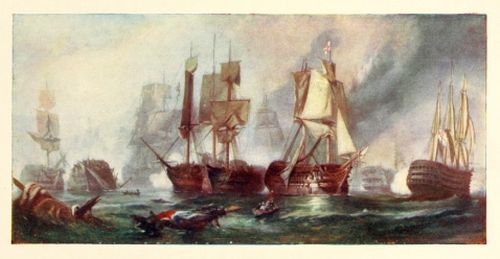
The Battle of Trafalgar, and the Victory of Lord Nelson over the French and Spanish Fleets, October 21, 1805.
(From the picture by Clarkson Stanfield, R.A., in the National Gallery of British Art.)
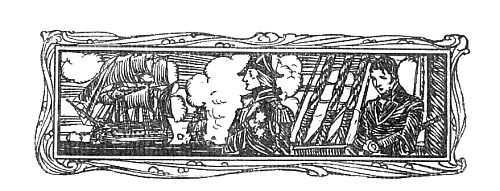
“Admirals all, for England’s sake,
Honour be yours, and fame!
And honour, as long as waves shall break,
To Nelson’s peerless fame.”
 T is a gray, melancholy spring day in the year 1771.
You are at Chatham, looking on to the deck of his
Majesty’s ship Raisonnable, commanded by Captain
Maurice Suckling. The sixty-four is not yet ready for
sea; her chief officers are not yet aboard. On the quay
you see a thin, delicate-looking lad of twelve years of age
dressed in a “middy’s” uniform. The wind bites shrewdly;
the lad shivers in his thin jacket, and there is something
like a tear in his eye. This morning his father left him
in London to make the best of his way to Chatham and
there join his ship. He has wandered about, friendless and
alone, for hours; he is hungry, footsore, and weary, and he
cannot discover the vessel to which he is posted. You feel
sorry for the lonely little fellow, but his troubles are now
over. A kindly officer accosts him, and brings him on
board. The lad’s eyes gleam as he gazes on the ship which
is to be his home. He glances down at the almond-white
decks; he looks around at grinning lines of black cannon;
he turns his eyes aloft to the symmetrical fabric of spars
and sails and rigging. It is a wonder-world of delight.
There is fascination everywhere—in the red muzzles of the
guns, in their white tompions, in the petticoat trousers and
long pigtails of the sailors. His young eyes, brilliant with
intellect, dart hither and thither; he is astonished and
delighted by all the novel sights which he sees.
T is a gray, melancholy spring day in the year 1771.
You are at Chatham, looking on to the deck of his
Majesty’s ship Raisonnable, commanded by Captain
Maurice Suckling. The sixty-four is not yet ready for
sea; her chief officers are not yet aboard. On the quay
you see a thin, delicate-looking lad of twelve years of age
dressed in a “middy’s” uniform. The wind bites shrewdly;
the lad shivers in his thin jacket, and there is something
like a tear in his eye. This morning his father left him
in London to make the best of his way to Chatham and
there join his ship. He has wandered about, friendless and
alone, for hours; he is hungry, footsore, and weary, and he
cannot discover the vessel to which he is posted. You feel
sorry for the lonely little fellow, but his troubles are now
over. A kindly officer accosts him, and brings him on
board. The lad’s eyes gleam as he gazes on the ship which
is to be his home. He glances down at the almond-white
decks; he looks around at grinning lines of black cannon;
he turns his eyes aloft to the symmetrical fabric of spars
and sails and rigging. It is a wonder-world of delight.
There is fascination everywhere—in the red muzzles of the
guns, in their white tompions, in the petticoat trousers and
long pigtails of the sailors. His young eyes, brilliant with
intellect, dart hither and thither; he is astonished and
delighted by all the novel sights which he sees.
This frail weakling is Horatio Nelson, the proudest name in the naval annals of his land. He is to develop into the “unique sailor,” the great hero of his race, the man whose statue is decked with laurel and whose fame is eagerly commemorated year by year, though well-nigh a century has elapsed since he passed away.
Horatio Nelson was born in the year before Wolfe captured Quebec. He was the son of a plain country parson with a quiver full of children and a modest income. The future hero first saw the light in the pleasant rectory of Burnham Thorpe, Norfolk. At nine years of age his mother died, and the weak, sickly lad grew up under the care of his grandmother. There was nothing remarkable about the boy’s school days, though many stories are told of his mischievous exploits, his fearlessness, and his high sense of honour. The best-known story relates that as a little boy he strayed from the house on a birds’-nesting excursion, and was absent so long that his grandmother grew alarmed and sent out servants to look for him. At length young Horatio was discovered sitting placidly by the side of a stream which he could not cross. When brought back his grandmother said, “I wonder that you were not driven home by hunger and fear.” “Fear! grandma,” said the boy. “Fear! what is that? I never saw it!” Truly the boy was father to the man. To the end of his life he never saw fear or knew what it meant.
You already know that at twelve years of age Nelson began his naval career as a midshipman on board his uncle’s ship, the Raisonnable. At twenty-one he was a captain in the Royal Navy—“the merest boy of a captain,” as Prince William, afterwards William the Fourth, described him. Nevertheless, there was no better seaman or more gallant officer in the service.
Now let us pass on to the year 1789, when Nelson was thirty-one years of age, and was regarded by those who knew him best as one of the finest commanders in the service. In this year that huge upheaval known as the French Revolution took place. For centuries the kings and nobles of France had grossly mismanaged the country and had bitterly oppressed the people. The State was well-nigh bankrupt, and the land was full of starving and despairing men. In July of this fateful year Paris rose, the Bastille, or State prison, was stormed, the prisoners were released, and the garrison slain. All over the country the peasants revolted, murdered the nobles, and burned their castles. The king was powerless to interfere, and the National Assembly, which had now seized the reins of power, passed laws sweeping away the privileges of the nobles and the rights of the Church. Before long the king and his family tried to escape from the country, but they were brought back and treated as prisoners. Meanwhile large numbers of the nobles had sought refuge abroad, and were urging foreign governments to declare war on France. When the German sovereigns threatened invasion, the French declared war against Austria and Prussia.
Now we must introduce the most dominant figure of the modern world—Napoleon Bonaparte. He was born in Corsica in the year which saw the American colonists beginning to rise against the British Government. In the first year of American independence he was a “gentleman cadet” in the military school at Paris. Here he was chiefly noteworthy as a silent, haughty lad, full of self-love and of great ambition. He was studious and very fond of mathematics and geography, but his abilities were not striking. None of his teachers prophesied for him the astonishing genius which he afterwards displayed. When Nelson was twenty-seven years of age, Napoleon became a lieutenant of artillery. He was a zealous republican, and was placed in command of the artillery which was to besiege the naval port of Toulon, then in possession of the British, who had been called in by the royalist inhabitants of the town. Napoleon conducted the siege with such skill that the British were forced to evacuate the place, not, however, without burning the French fleet which lay in the harbour and destroying the arsenal.
At this juncture Nelson was detailed to besiege certain coast towns of the island of Corsica. He captured Bastia and Calvi, but at the latter place he lost the sight of an eye. A period of dangerous and exhausting service followed. Napoleon was now in command of the army of Italy, and was at the beginning of his extraordinary career. He was marching along the narrow coast-road of the Riviera, and Nelson’s task was to harass his shoreward march. Scarcely a day passed without a skirmish of some kind with a battery, a gunboat, or an armed cruiser. Nelson’s force, however, was inadequate, and Napoleon accomplished his purpose. His victories in Italy were extraordinary, and speedily he was acclaimed on all hands as the greatest general of the republic. As he rose in fame and influence new vistas opened before him, and he soon perceived that the highest office in the State was his to grasp. Next he advanced into Austria itself, and carried all before him. When he was within eighty miles of Vienna the emperor begged for peace, and obtained it at the price of Belgium and Lombardy. Prussia now deserted the allies, and Holland and Spain had already purchased peace by promising the republic the use of their navies. Great Britain was in a state of “splendid isolation,” and all eyes turned to the fleet as the only hope of succour. The banks stopped cash payments, alarm was at its height, and Consols fell to fifty-one. Great Britain had her back to the wall.
Before long, however, the British fleet had its first great success. On February 14, 1797—that glorious St. Valentine’s Day—Admiral Jervis won a splendid victory over the Spanish fleet off Cape St. Vincent. In that confused scene of roaring cannon, rolling clouds of smoke, crash of falling spars, shrieks of the wounded, and stormy huzzas of the half-naked sailors wrestling at the guns, Nelson stands out as the conspicuous figure of the day. At one time he was engaging nine Spanish ships. A little later he was abreast of the San Josef, pouring in such a murderous fire that speedily she was unmanageable. The San Nicolas drifted on to the San Josef, and Nelson manœuvred to foul the San Nicolas. He hooked his sprit-sail yard into her rigging, and then boarded. The ship yielded, but at this moment a fierce fire of musketry was opened from the San Josef—only a jump away. Instantly Nelson and his men sprang aboard the San Josef, and as they did so a Spanish officer called out that the ship had surrendered. Thus on the deck of a Spanish man-of-war, which he had boarded across the deck of another then in his possession, Nelson received the swords of the vanquished Spaniards. Already he was the darling of his sailors and a source of pride to the nation.
In a daring but unsuccessful attack on Cadiz he lost an arm, and sank into a state of deep depression, thinking that he had become a burden on his friends and useless to his country. For a time our little one-armed, one-eyed hero retired to a quiet country home; but on April 1, 1798, he was afloat in command of a fleet scouring the Mediterranean with orders to seek the French fleet, and use his best endeavours to take, sink, burn, and destroy it. After a long and anxious quest he at last discovered it anchored in Aboukir Bay. “We are moored in such a manner,” wrote the French admiral, “as to bid defiance to a force more than double our own.” How vain the boast was will shortly appear. The French ships were anchored in single file along the shore, with three miles of shoal water between them and the land, and the admiral believed that no man-of-war could possibly get to the shoreward of him. He had actually piled up his mess gear on the shoreward side of his ships, thus rendering the guns on that side unworkable. As the British fleet drew near, under a press of sail, during the afternoon of August 1, Nelson observed that the enemy’s ships were moored five hundred yards apart, so as to permit them to swing at anchor. Instantly he perceived that where the enemy’s ship could swing there was room enough for one of his squadron to anchor. The French were trapped, and Nelson cried, “Before this time to-morrow I shall have gained a peerage or Westminster Abbey!”
Five ships with men in the chains, heaving the leads, now bore down, rounded the bows of the leading vessel, and got inshore of the French fleet. The rest of Nelson’s ships took up their stations on the seaward side, and at half-past six, just as the sun was setting, the action began. In twelve minutes the leading ship of the enemy was dismasted, and almost at the same instant the third ship of the line suffered the same fate. Black night came on at seven, and only the flash of guns, crimsoning the heavens, lit up the darkness. At half-past eight the fourth and fifth ships of the enemy’s line surrendered. At ten minutes past nine the flagship, the Orient, caught fire. She lay between two British ships, and was almost cut in halves by shot. Her gallant admiral lay dying on the deck, and every moment the flames raged higher.
The burning of the Orient was the most terribly grand spectacle ever seen in naval warfare. Her magazine was full of powder, and an explosion was inevitable. Such, however, was the heroism of her crew that while the lower decks were in flames, her men continued to work the guns on the upper deck. Huge forked flames and living sheets of fire leapt up as though from the heart of a volcano. She had ceased to fire now, and the remnants of her crew crawled out on the spars like flies. The flames lit up the scene so vividly that even the Arabs could be seen on the shore. At a quarter past eleven she blew up with a thunderous roar, and the battle of the Nile was over. All that remained was to render the victory complete. By three in the morning two ships alone of that proud French fleet had escaped. Next morning Nelson, with a deep wound on his forehead, called the fleet to return public thanksgiving to Almighty God for the most decisive victory that has ever blessed British arms at sea. The number of the enemy taken, drowned, burnt, and missing was 5,225. On the English side 218 were killed and 677 wounded.
Napoleon was at this time in Egypt, which he proceeded to conquer as the first step towards striking at India. The disaster at Aboukir Bay cooped him up in the East. He crossed the desert into Syria, and drove the Turks out of the southern part of the land. Before the walls of Acre, however, his victorious march was checked. The Turks within, and a British fleet under Sir Sidney Smith outside, completely baffled him. In later years Napoleon said, “That man made me miss my destiny.” But for Sir Sidney Smith, Napoleon would have been Emperor of the East. As it was, he was forced to raise the siege of Acre and retire into Egypt, where news reached him that the French armies had suffered some reverses. He left his army in Egypt to get home as best it might, and returned to France, where his friends arranged a revolution. On December 24, 1797, a new French constitution was proclaimed, and shortly afterwards Napoleon became First Consul. He took up his abode in the Tuileries, and was now on the direct highroad to the lofty position which he meant to attain.
Napoleon had pledged his word to save France from her host of enemies, and in May 1800 he took the field once more. Crossing the Great St. Bernard Pass, never before traversed by a large army, he succeeded in planting himself in the rear of the Austrians, and at the battle of Marengo achieved a brilliant victory. Later in the year the French general, Moreau, crushed another Austrian army at Hohenlinden, and then Austria sued for peace.
The Tsar Paul had already abandoned the allies, and now confessed to great admiration for Napoleon, who proceeded to form a league for the purpose of subduing Britain by striking at her trade. He persuaded the northern powers—Russia, Denmark, and Sweden—to mass their fleets and close all their ports against British ships. This was a deep-laid scheme, but it was doomed to failure.
On March 12, 1801, Nelson left Yarmouth Roads as second in command to Sir Hyde Parker, a man of unflinching bravery but of no original ideas. The fleet which these admirals commanded was detailed to destroy the ships of the allies which lay at Copenhagen, backed by formidable batteries. Parker was irresolute as to the route to be taken through the dangerous channels that led to the town. “Let it be by the Sound, by the Belt, or anyhow,” cried Nelson, “only lose not an hour.” We cannot stay to recount the progress of the terrible battle that followed. When twenty of the enemy’s ships were almost destroyed, Nelson offered a truce, which was gladly accepted, and
“All amidst her wrecks and her gore,
Proud Denmark blest our chief
That he gave her wounds relief;
And the sounds of joy and grief
Filled the shore.”
In the very height of the engagement, Parker, greatly alarmed for the safety of his fleet, battered furiously by incessant broadsides, made the signal to retreat. Nelson’s attention was drawn to it. “What does it mean?” asked a colonel of marines standing by. “Why, to leave off action,” said Nelson; “but hang me if I do! You know,” he went on, “I have only one eye. I have a right to be blind sometimes.” Putting his telescope to his blind eye, he exclaimed, “I really do not see the signal.” So he nailed his colours to the mast, and in the midst of the most terrible cannonade to which a British fleet has ever been subjected, Nelson’s signal for “Close action” streamed high aloft, as clear to every man’s sight as a star in the sky.
Napoleon had thus failed in his attack on the obstinate islanders, and he was now ready for a breathing-space in which to recruit his armies and build a navy powerful enough to beat Britain. Accordingly peace was signed, and Great Britain restored all the colonial conquests which she had made during the war, except Ceylon and Trinidad. This was all she gained from a struggle which had cost her thousands of lives, and had added two hundred and seventy millions to the National Debt.
Before the ink was dry on the treaty, Napoleon was busy planning the establishment of a vast colonial empire, and aiming at the downfall of the one power which thwarted him at every turn. The English press bitterly attacked him, coarse and insulting caricatures of him were constantly appearing, and French exiles in England frequently plotted against him. He now demanded the suppression of the hostile newspapers and the expulsion of the plotters, but the British Government refused. Every day the relations between the two countries grew more and more strained, and the breaking-point was not far off.
On May 12, 1803, war was again declared. Napoleon speedily forced Spain to join him, and then began preparations for an invasion of Great Britain. One hundred thousand men were marched to Boulogne, and every road by which the soldiers passed bore the signpost, “To England.” A huge flotilla of flat-bottomed boats was collected, and exercises in embarking and disembarking went on within sight of the white cliffs of Dover. “The Channel,” said Napoleon, “is but a ditch, and any one can cross it who has but the courage to try.” He meant to put his courage to the test as soon as the Channel was clear of the British fleet. From June 1803 to September 1805 his men were waiting the word of command to cross. It was never given.
The prospect of invasion roused every patriotic man in Great Britain. Volunteers flocked to the standards, and soon, out of a nation of fifteen million souls, including the people of Ireland who were not allowed to volunteer, 300,000 men were in arms, besides 120,000 regular troops and 78,000 militia. The dockyards worked night and day, and before the end of the year one hundred and sixty-six new vessels had been added to the fleet. The fortresses were strengthened, martello towers were erected along the coast, and every possible preparation was made. Nevertheless the year 1803 was one of alarm and terror. Next year Napoleon attained the summit of his ambition—he crowned himself Emperor of the French.
Still the projected invasion hung fire, and now Napoleon devised a plan for securing the six hours’ command of the Channel on which the success of his enterprise depended. His fleet was then in the harbour of Toulon, which was being watched by a British fleet, with Nelson in chief command for the first time. Napoleon ordered his ships to slip out of harbour and sail for the West Indies, in order to decoy Nelson away from Europe. Arrived at the West Indies, the French fleet was to put about and return with all speed for Brest, where an attack was to be made on the British squadron blockading that port while Nelson was far away. The defeat of the British squadron at Brest would clear the Channel, and then the grand invasion was to take place.
The plan nearly succeeded. Villeneuve, the French admiral, did slip out of Toulon. Nelson was deceived, and went off on a false scent. When, however, news arrived that the French fleet had sailed for the West Indies, Nelson dashed after it in hot pursuit, and went half-way round the world and back again before he caught it up. Villeneuve had thirty-five days’ start, but Nelson arrived at Gibraltar on the return voyage only three days after the French fleet sighted Cape Finisterre. Here it found a British squadron under Admiral Calder. An indecisive battle took place; and though the result was considered in England as a failure, and almost a disgrace, it ended the grand invasion scheme. Villeneuve was obliged to put into Ferrol to refit, and, meanwhile, Nelson had arrived. Napoleon’s plan had failed, and Britain could breathe freely once more.
In disgust, Napoleon broke up his camp at Boulogne, and rapidly marched his army across France into Germany, where he met the Austrians and Russians, who had formed a new league against him. Now began a series of triumphs which laid the Austrian empire open to the invaders. While Napoleon was rejoicing in his victories, terrible news reached him. The greatest sea-fight in the history of the world had been fought, and the combined fleets of France and Spain were no more. The beginning of the end had arrived for the “terror of Europe.”
Villeneuve, with thirty-three Franco-Spanish vessels, lay in Cadiz harbour, and outside was Nelson with twenty-seven British ships. The French admiral had been stung to the quick by a bitter, taunting letter from the emperor, accusing him of cowardice. To vindicate his courage, Villeneuve gave the order to put to sea. On the morning of October 20, 1805, the fleets came in sight of each other.
“The sun never rose on a grander and more impressive ocean-picture. As the courses and hulls of the hindmost of the British vessels floated up the sea-line, the blue girdle of the deep became a field of ships; giant structures bristling with guns, canvas swelling in clouds to the heavens from their tall sides black with grim and formidable defences, crowds of sailors motionless in expectation, quarter-decks glittering with uniforms, and stillness everywhere, broken only by the creaming wash of the bow-surge as it was shouldered off into yeast by the towering battleships.”
At daybreak, after a night clouded with the presentiment that he would die on the morrow, Nelson arrayed himself in his full admiral’s uniform, and came on deck blazing with orders. Watching the fleet of the enemy forming line of battle, he exclaimed several times, “I’ll give them such a dressing as they never had before.” He advanced in two columns, intending to crash into the enemy’s line, thus breaking it and destroying the ships in the centre before those on the wings could come to their relief. Undoubtedly there was a plan of attack, though modern critics have questioned the fact. The battle perhaps looked like a “heroic scramble,” but behind the apparent confusion there was a subtle, daring, and unexpected plan.
Just before the battle began Nelson went to his cabin, and there on his knees wrote a beautiful and touching prayer. Coming on deck again, he ordered that signal to be made which is his greatest bequest to his country—a signal which stirs the pulses of every true Briton even after the lapse of a century. High above the Victory’s deck flew the colours, and as the words, England expects every man to do his duty, were interpreted, a great huzza rose from the fleet. “Now,” said Nelson, “I can do no more. We must trust to the great Disposer of all events and to the justice of our cause.”
The British ships now bore down, Collingwood in the Royal Sovereign being the first to engage. He was twenty minutes in the midst of a furious cannonade before he received support. The whole British fleet now came into action, but not near enough for Nelson, and he signalled, “Engage the enemy more closely,” and set the example by dashing into the enemy’s line. Seven or eight of the weathermost ships immediately opened a terrific fire on him. So fierce was it that for a few minutes the Victory made no reply. Her mizzen top-mast went over the side, her wheel was knocked away, and a double-headed shot killed eight marines at one stroke. Amidst this hail of death the hero moved with the utmost indifference. As a splinter tore the buckle from his shoe he remarked smilingly to his captain, “This is too warm work, Hardy, to last long.” But now the gallant old ship got to work, and with a broadside that disabled her immediate enemy, drove into the Redoutable so closely that the muzzles of the Victory’s guns touched the enemy’s side.
At half-past one, when Nelson was walking the deck, a musket-shot from the Redoutable mizzen-top struck him, and he fell with his face to the deck. “They have done for me at last, Hardy,” he exclaimed. “I hope not,” answered the captain. “Yes,” said Nelson; “my backbone is shot through.” They bore him to the cockpit, and on the way he drew a handkerchief over his face that his sailors might not see him and be discouraged. The gloomy cockpit was a shambles, resounding with the groans of anguished men. Dr. Beatty flew to his side. “Ah, Mr. Beatty,” said Nelson, “you can do nothing for me. I have but a short time to live; my back is shot through.” And so it was. The decorations with which he had adorned himself were too good a mark for the French sharpshooters.
The hero lay a-dying while the storm of crashing artillery continued to rage. High above the thunder came the huzzas of his seamen as ship after ship of the enemy struck. The dying man turned and smiled. “Will no one bring Hardy to me?” he asked, but the captain could not be spared. All the beauty, the magnanimity, and tenderness of Nelson’s disposition shone out in those dying hours. At last Hardy came. “Well, Hardy, how goes the day with us?” “Very well, my lord,” was the reply; “we have got twelve or fourteen of the enemy’s ships.” “I hope,” said Nelson anxiously, “that none of our ships have struck.” “No fear of that, my lord,” replied Hardy. And now the surgeon tearfully told him that his life was done. “God be praised,” he whispered. “Now I am satisfied. Thank God I have done my duty!” Nelson was dead.
As his breath floated away, the cannonading ceased, and Trafalgar was won. Of the French and Spanish fleet that rose and fell upon the waves on that October morning all that remained was a huddle of hulks rolling helplessly in the trough of the sea, with the British colours flying on the stumps of the wreckage, and a trail of beaten ships staggering portwards for safety. Nelson had not spent his life’s blood in vain. He had ensured his land a century’s command of the sea, during which time she spread her empire far and wide, and developed her commerce to an extraordinary degree.
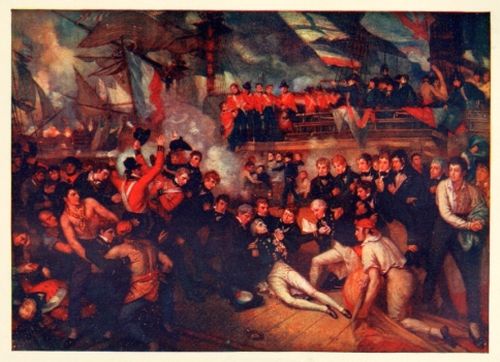
The Death of Nelson.
(By Benjamin West, P.R.A. By permission of the Corporation of Liverpool.)
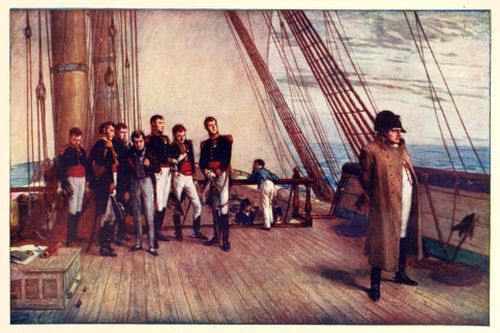
Napoleon on Board the “Bellerophon.”
(From the picture by W. Q. Orchardson, R.A., in the National Gallery of British Art. By permission of the Berlin Photographic Co.)
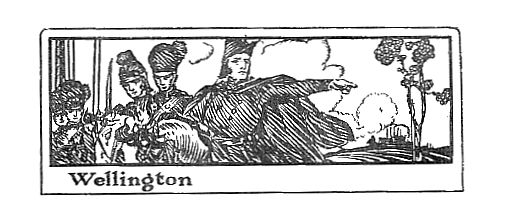
“Lead out the pageant: sad and slow,
As fits an universal woe,
Let the long long procession go,
And let the sorrowing crowd about it grow,
And let the mournful martial music blow:
The last great Englishman is low.”
 T is a bleak November day in the year 1852. Vast
multitudes, most of them in the garb of mourning,
throng the streets of London, and stand for hours waiting
for a great funeral procession to pass by. The muffled
bells of the churches are tolling a knell, cannon are booming
their last farewells, buildings are draped with black, the
flags fly at half-mast, and all business is suspended. Now
you see the long procession approaching, soldiers with
reversed arms leading the way, and marching with slow,
reluctant step to the roll of drums and the solemn wail of
the “Dead March.” Behind them come men representing
all the rank, talent, and dignity of Great Britain, as well as
the distinguished mourners which foreign sovereigns have
sent to represent them on the solemn occasion. Many
of the older spectators barely stifle their sobs as a riderless
steed is led by, with reversed jack-boots in the stirrups.
He who has bestridden this war-charger was well known
to them. They remember all his greatness in the past;
they recall him as a familiar figure in the streets and in
Parliament. But, hush! here is the towering car upon
which lies all that remains of him. Every head is bared,
and in deep, solemn silence the sad pageant passes.
T is a bleak November day in the year 1852. Vast
multitudes, most of them in the garb of mourning,
throng the streets of London, and stand for hours waiting
for a great funeral procession to pass by. The muffled
bells of the churches are tolling a knell, cannon are booming
their last farewells, buildings are draped with black, the
flags fly at half-mast, and all business is suspended. Now
you see the long procession approaching, soldiers with
reversed arms leading the way, and marching with slow,
reluctant step to the roll of drums and the solemn wail of
the “Dead March.” Behind them come men representing
all the rank, talent, and dignity of Great Britain, as well as
the distinguished mourners which foreign sovereigns have
sent to represent them on the solemn occasion. Many
of the older spectators barely stifle their sobs as a riderless
steed is led by, with reversed jack-boots in the stirrups.
He who has bestridden this war-charger was well known
to them. They remember all his greatness in the past;
they recall him as a familiar figure in the streets and in
Parliament. But, hush! here is the towering car upon
which lies all that remains of him. Every head is bared,
and in deep, solemn silence the sad pageant passes.
“All is over and done:
Render thanks to the Giver,
England, for thy son.
Let the bell be toll’d.
Render thanks to the Giver,
And render him to the mould.
Under the cross of gold
That shines over city and river,
There he shall rest for ever,
Among the wise and the bold.”
Side by side with that Mighty Seaman, “saviour of the silver-coasted isle,” they bury the Great Duke “to the noise of the mourning of a mighty nation.”
Who was this Great Duke, and why does “sorrow darken hamlet and hall” at his passing? Let the story of his life and fame be told.
Arthur Wellesley, afterwards Duke of Wellington, was born in 1769, less than four months before Napoleon. His father was the Earl of Mornington, an Irish peer, and Dublin still shows the house, 24 Upper Merrion Street, where he was born. In 1787, when eighteen years of age, Wellesley became an ensign in the army, but was at first quite undistinguished, and was, indeed, considered dull, idle, and rather frivolous. Not until 1793, when he was appointed to the command of his regiment, did he show that he had found the vocation in which he was to win such renown.
In 1798 his eldest brother sailed for India as governor-general, and Arthur Wellesley accompanied him. Soon afterwards he was given a military command, and speedily proved himself a most active and successful general. In 1805 Wellesley was back in England, and for the next few years he was employed in various capacities. During the year after his return he became a member of Parliament, and was frequently consulted on military matters by the ministry of the day.
The little kingdom of Portugal was almost the last European nation which refused to join Napoleon. He therefore overran the country and entered Lisbon. The king was deposed, and Joseph, Napoleon’s brother, was placed on the throne. Thus the whole Iberian Peninsula passed into Napoleon’s power. These high-handed proceedings roused the nations to another struggle against him. An insurrection broke out in Spain and Portugal, which even Napoleon could not stamp out. The British Government eagerly seized the opportunity of waging a land-war with Napoleon. Arms and money were sent to the Spaniards, and on August 1, 1808, an army was landed in Portugal. Wellesley was given the command of a force of some 9,000 men, and was instructed to assist either the Spaniards or the Portuguese at his discretion. He sailed on the 12th of July, and, landing his men, moved towards Lisbon. This was a bold step, for the French general, Junot, had been in occupation of the Portuguese capital since November.
On the 21st of August he defeated Junot on the hillside at Vimiera, and Lisbon would have been captured and the whole French army destroyed had Wellesley been permitted to pursue. A superior officer, however, had now arrived, and Wellesley was no longer first in command. Nevertheless, so decisive was the fight that Junot offered to leave Portugal altogether, provided he and his troops were permitted to return unmolested to France. This offer was accepted, greatly to the annoyance of the British people, who were sorely disappointed that the whole French army had not been captured.
Wellesley and his superior officer were recalled and tried for not capturing Lisbon. The latter was deprived of his command; the former was sent back to Portugal. And now Wellington began that long, dogged struggle known as the Peninsular War, a six years’ contest in which he displayed wonderful generalship, foresight, and tenacity, and finally drove the French out of Spain and captured Toulouse. Before it was over he had been raised to the peerage, and as Viscount Wellington was universally regarded as Britain’s greatest soldier.
In the fourth year of Wellington’s struggle in Spain the Tsar Alexander, tired of submitting to Napoleon’s mastery, defiantly opened his ports to trade with Britain. Napoleon thereupon declared war on him, and marched a vast army of 600,000 men into Russia. A miserable, crushed remnant of 20,000 men was all that struggled back to Germany. This terrible blow led to a general rising of European powers against Napoleon. Russia, Prussia, Austria, and Sweden allied their forces, and Napoleon found himself beset on all sides, and with no army to meet his foes.
After the first outburst of dismay, France rallied to him as of old, and gave him the new army for which he asked. The terrible waste of life during the stormy years since the Revolution had pressed heavily on his people, and now half-grown lads of seventeen were called to the standards. They came willingly, and once more the old enthusiasm prevailed. Within six months Napoleon had 200,000 men ready to meet the Russians and Prussians on the Elbe. Twice he smote the allies, and forced them to seek an armistice. Then the fortune of war abandoned him, and at Leipzig, in what the Germans call “the battle of the nations,” he was defeated and forced to retreat to France.
By this time success had crowned Wellington’s efforts in Spain. He had made satisfactory soldiers of the Portuguese, and the Spaniards had greatly improved. While Napoleon was marching into Russia, Wellington had stormed Ciudad Rodrigo and Badajoz, and had won a great battle at Salamanca, where he “beat 40,000 men in forty minutes.” This battle was his masterpiece. “There was no mistake,” he said; “everything went as it ought, and there never was an army so beaten in so short a time.”
Then Wellington took Madrid, which had been four years in the hands of the enemy; but as the French massed their forces against him, he had to retire towards the Portuguese border. In 1813 he attacked the French at Vittoria, routed them, cut off their retreat, and drove them back across the Pyrenees with the loss of every cannon and wagon which they possessed. While the allies were swarming into France, Wellington, with 100,000 veteran troops, stood ready to fall upon her.
The end now rapidly approached. Napoleon struggled heroically with the remnant of the army which had been defeated at Leipzig, but in vain. Time after time he checked the invaders; but numbers triumphed at last, and the allies entered Paris on March 31, 1814, where the fickle populace received them with shouts of joy.
Napoleon was now sent to the little Italian island of Elba, where he played at being king for eight or nine months. All the time he was watching affairs in France very closely and was biding his time. In 1814 ambassadors from nearly all the Powers assembled at Vienna to settle the affairs of Europe. There were constant wrangles, and at one time the tension was so acute that war seemed likely to break out again. Suddenly, on March 7, 1815, a messenger arrived with news that immediately ended their quarrels and, in the face of a new and alarming danger, brought them shoulder to shoulder. The Tsar said to Wellington, who was one of the commissioners, “It is for you to save Europe.” What had happened?
Napoleon had landed in France, and was making a triumphant progress towards Paris. The Bourbon Government, which had been installed by the Powers, melted away like snow before the summer sun. Everywhere Napoleon’s old soldiers donned the cockade and flocked to his standards. Whole regiments deserted; the wonderful fascination which the emperor exercised upon his followers once more asserted itself. Marshal Ney, who had promised King Lewis to bring back the invader in an iron cage, fell a victim to the charm of his old chief as soon as he met him. Lewis and his friends fled the country, and Napoleon once more occupied the Tuileries. During the next hundred days he displayed all his old energy and daring. By the 13th of June he had nearly 200,000 men available for war.
Meanwhile the Powers had not been idle. They bound themselves to raise a million armed men, and never to rest from their labours until Napoleon was finally crushed. In a few months an overwhelming force of allies would be marshalled. In the meantime, the only troops available were those of the British and Prussian armies, now in Belgium, and commanded by Wellington and Blücher respectively.
Now let us pay a visit to the most renowned battlefield in all the world, the field on which the destinies of Europe were changed and the great Emperor of the French was hurled from a throne to a prison and a grave. We are in the village of Waterloo, eleven miles south of Brussels, the capital of Belgium. Leaving Waterloo, we traverse a road bordered on both sides by houses, and after having walked a couple of miles we arrive at the village of Mont St. Jean. Here two roads meet, both of which cross the battlefield.
Now we push on beyond the cross-roads to an obelisk in memory of the Germans who fell in the battle. A quarter of a mile to the right rises the mound of the Belgian Lion. It is two hundred feet in height, and was thrown up on the spot where the Prince of Orange was wounded in the battle. Surmounting it is a lion made out of the metal of captured French cannon. We ascend the mound, and facing south find ourselves in the best position to survey the battlefield. Unfortunately, the levels of the ground have been much altered by the earth removed to form the mound. Still from our coign of vantage we may get a good general idea of the position occupied by both armies on June 18, 1815.
We are now on the ridge of a long chain of low hills with gentle slopes. On this ridge Wellington extended his first line of troops. The ridge, as you will observe, is narrow, so that the second line was enabled to occupy a sheltered position on the sloping ground behind us. One mile distant, across a shallow valley, is another line of hills. These were occupied by the French. Now notice a farmhouse on the main road to our left. This is La Haye Sainte, which was occupied by German troops, and protected the allied centre. Follow the road across the battlefield, and you will come to the farm of La Belle Alliance. During the greater part of the battle Napoleon took up his station a little to the right of this house, where a French monument now stands. Were you to push on along this road for seven or eight miles you would come to Quatre Bras (“four arms”), from which place two roads lead to the river Sambre.
Now look along the road to our right front and observe the chateau of Hougoumont, which was an old ruined place even in 1815. This building, which still bears traces of the fearful scenes that took place about it, was on the right of the allied line, and formed the key to the position. Hougoumont was strengthened by Wellington, and though continually assaulted was never captured. Had Napoleon once gained possession of it, the battle would probably have had quite a different ending. Now that we have surveyed the chief points of interest on the field, let us turn to the battle itself.
By the beginning of June Napoleon had concentrated one hundred and twenty thousand men on the Sambre at Charleroi, ready to advance when he should arrive to take command. Wellington’s army was scattered in various places from Nivelles westward, while Blücher’s was extended from the same place eastward. Wellington’s plan was to unite his forces with those of Blücher at Quatre Bras, and block Napoleon’s advance. Napoleon, however, was determined to prevent the allied generals from uniting their forces. His plan was to fall upon them before they could concentrate, and defeat them piecemeal.
When Blücher reached Ligny, with eighty thousand men, Napoleon met him, and a desperate battle ensued in which the Prussian general suffered terrible loss, but, still undefeated, retreated in good order on Wavre, so that he might join Wellington at Waterloo, according to a previous arrangement which he had made with Wellington. Napoleon thought that the Prussians were retreating on the Rhine, and detached thirty-three thousand men under Grouchy to hang on their rear. Grouchy missed the Prussians, and his troops took no part in the great battle.
On the same day Ney, with twenty thousand men, appeared before Quatre Bras, where only ten thousand British and an equal force of Belgians had been able to assemble. The Belgians fled before the French cavalry, but the British infantry kept up a dogged resistance while corps after corps was hurried up. At the close of the day Ney saw that he was outnumbered, and withdrew, while Wellington retreated to the line of heights upon which we are now gazing.
Napoleon now pushed on to measure swords with Wellington in person for the first time. On Sunday morning, the 18th of June, the two armies faced each other. As Napoleon looked across the valley and saw the British redcoats on the rising ground opposite, he cried, “I have them.” He had good reason to believe that he would win. His forces numbered between seventy and eighty thousand men, and he was superior both in guns and in cavalry to his foes. Wellington had about sixty-seven thousand men; but his British troops were mainly raw recruits, and the rest of his forces were very mixed, and included the Belgians who had already fled before the French cavalry.
The preceding night had been wet and stormy, and when morning broke Napoleon considered the ground too heavy for cavalry. He therefore delayed the opening of the battle until between eleven and twelve in the forenoon. This delay was fatal. Time was most important to both commanders. Napoleon knew well that he must beat Wellington before Blücher could join him; Wellington, on the other hand, was determined to hold his ground to the last man, so as to give the Prussians time to come up in force and settle the issue of the day.
The battle began with a fierce attack on Hougoumont; but it was held right manfully by the British Guards, and though the French won the gardens and orchards, they could not drive the defenders from the buildings. Then Napoleon sent his heavy columns against the British left, but they were utterly routed. His third effort was against the British centre, which he tried to break by heavy artillery fire and furious cavalry charges.
The British formed square, and, though assailed for five hours, held fast. They seemed, said an onlooker, “rooted” to the earth. Every attempt to pierce them failed, until even the British privates saw the uselessness of the attempt, and cried, as Napoleon’s squadrons charged them, “Here come those fools again.” Every attempt to take the ridge was repulsed with terrible slaughter. At last, in the thick of the fighting, the cannon of the advancing Prussians were heard, and Napoleon made one last desperate effort to break the British line.
La Haye Sainte was captured about six in the evening, and Napoleon’s cannon were now so near that Wellington’s centre was in dire danger. Blücher was rapidly drawing near, and already he was threatening the French right and rear. Like a desperate gambler, Napoleon now staked all on a charge of the Old Guard. A little after seven he gave the word, and six thousand of his veterans, led by Marshal Ney, were hurled at the long-tried British. As the French rushed up the slope, the British Guards, who had been lying down behind the top of the ridge, sprang to their feet and poured a volley into the enemy. Their columns wavered, and our soldiers charged with the bayonet, hurling the enemy down the hill in utter confusion. Soon after eight o’clock the Prussians made their appearance on the scene, and speedily Napoleon found himself assailed on his flank by forty thousand men.
At this juncture, “on the ridge, near the Guards, his figure standing out amidst the smoke against the bright north-eastern sky, Wellington was seen to raise his hat with a noble gesture—the signal for the wasted line of heroes to sweep like a dark wave from their covered positions, and roll out their lines and columns over the plains. With a pealing cheer the whole line advanced just as the sun was sinking.” In vain the French Guards rallied, only to be swept away by the fierce British charges. When darkness fell, the whole French army was in flight. The Prussians went in hot pursuit, and before long the proud French army of the morning was almost annihilated. Wellington and Blücher had lost twenty-two thousand men. The French loss will never be known.
The battle was decisive; the long struggle was at an end; and Napoleon’s star had set. He put spurs to his horse, and rode hard through the midsummer night to escape capture. Fearing death at the hands of the Prussians, he surrendered himself to the captain of the British man-of-war Bellerophon. The British Government banished him to the lonely isle of St. Helena, where he languished in captivity until his death in 1821.
But what of the victor of Waterloo—
“Foremost captain of his time,
Rich in saving common sense,
And, as the greatest only are,
In his simplicity sublime.”
He was no callous victor, regarding his men merely as pawns in the great game. When he learnt the death-roll of the battle he burst into tears. Scarcely one of those who had fought side by side with him in the Peninsula remained to share the joy of victory. To the end of his days he was an ardent advocate of peace. “Only those who have seen it,” he said, “can possibly know how terrible war is.” The nation’s gratitude flowed out to him as a river; the meanest intelligence could appreciate the overwhelming importance of the victory which he had won. Never did such vast issues rest on a single battle; never did Britain stand so high among the nations as after Waterloo. All possible honours were heaped upon him. He received the thanks of both Houses of Parliament and a vote of £200,000 wherewith to purchase the estate of Strathfieldsaye; while foreign nations vied with each other in awarding him gifts and titles.
He was but forty-six years of age when the crowning victory of his life was accomplished, and for the next quarter of a century he was rightly regarded as one of the pillars of the State. In 1828 he became Prime Minister; but though wise, moderate, and inspired by a high sense of duty, he did not prove himself a great statesman. At one time he was actually the subject of the nation’s wrath; but as the years went by he recovered all his old popularity, and that without striving in the least to regain it.
He died in his eighty-third year, and you already know how this “last great Englishman” was borne to his grave amidst sorrowing crowds. And here, side by side with Nelson, we leave him—the two great captains of the British race, who teach to all future times that the “path of duty” is “the way to glory.”
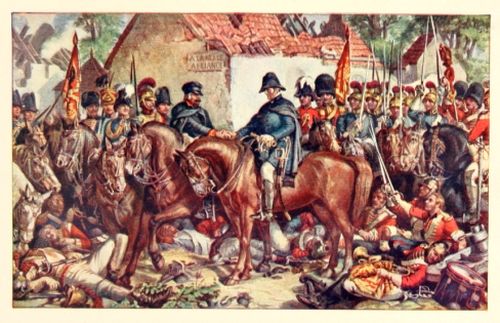
The Meeting of Wellington and Blücher after the Battle of Waterloo.
(From the fresco by Daniel Maclise, R.A., in the Houses of Parliament.)
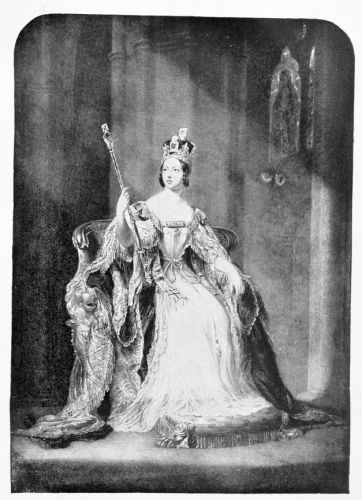
QUEEN VICTORIA IN HER CORONATION ROBES.
(From the picture by Sir George Hayter in the Royal Collection.)
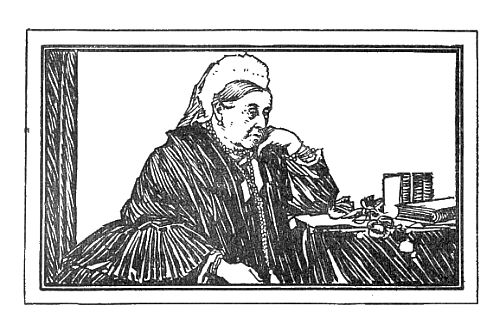
“Their thoughts shall be my thoughts, their aims my aim,
Their free-lent loyalty my right divine;
Mine will I make their triumphs, mine their fame,
Their sorrows mine.”
 T is five o’clock on a June morning in the year 1837.
London is not yet awake, nevertheless four high officers
of state are knocking lustily and ringing loudly at the
outer gate of Kensington Palace. They have come straight
from the deathbed of William the Fourth, and they have
news of the highest importance for the young princess who
resides within. But at this early hour of the day the whole
palace is wrapped in slumber, and the knocking and ringing
have to be repeated many times before the drowsy porter
is awakened. You see him rubbing his eyes and reluctantly
throwing open the gate. Now the little party, which
includes the Primate and the Lord High Chamberlain,
enters the courtyard, and another long wait follows. At
length the distinguished visitors are admitted to a lower
room of the palace, and there they seem to be quite forgotten.
They ring the bell, and when it is answered the
Lord High Chamberlain requests that the attendant of the
Princess Victoria be sent to inform her Royal Highness that
high officials of state desire an audience on business of the
utmost importance.
T is five o’clock on a June morning in the year 1837.
London is not yet awake, nevertheless four high officers
of state are knocking lustily and ringing loudly at the
outer gate of Kensington Palace. They have come straight
from the deathbed of William the Fourth, and they have
news of the highest importance for the young princess who
resides within. But at this early hour of the day the whole
palace is wrapped in slumber, and the knocking and ringing
have to be repeated many times before the drowsy porter
is awakened. You see him rubbing his eyes and reluctantly
throwing open the gate. Now the little party, which
includes the Primate and the Lord High Chamberlain,
enters the courtyard, and another long wait follows. At
length the distinguished visitors are admitted to a lower
room of the palace, and there they seem to be quite forgotten.
They ring the bell, and when it is answered the
Lord High Chamberlain requests that the attendant of the
Princess Victoria be sent to inform her Royal Highness that
high officials of state desire an audience on business of the
utmost importance.
There is another long delay, and again the bell is rung, this time with pardonable impatience. The attendant of the princess is summoned, and she declares that her royal charge is in such a sweet sleep that she cannot venture to disturb her. “We are come on business of state to the Queen,” says the Lord High Chamberlain, “and even her sleep must give way to that.”
A few minutes later the door opens again, and a young girl of eighteen, fresh as a newly-opened rosebud, enters the room. She has not waited to dress. Her hair falls loose upon her shoulders; she has hurriedly thrown a shawl round herself, and thrust her feet into slippers. There are tears in her eyes as she learns that her uncle the king is dead and that she is queen!
At once she turns to the archbishop, and with simple, unaffected piety says, “Pray for me!” All kneel together, and the venerable prelate supplicates the Most High, who ruleth over the kingdoms of men, to give the young sovereign an understanding heart to judge so great a people.
Thus Victoria, before she is out of her teens, takes up the arduous and exacting duties of her high office. Read the letters which she wrote in those early days to her relatives and statesmen, and you will marvel at the clear judgment, the strong will, and the sound common sense of the girl-queen. Her reign opens in times of national distress and political unrest, and below a certain social level there is no sentiment of loyalty to the Crown. But all this will suffer a wondrous change in the years that are to come. Prosperity hitherto undreamed of will bless the land, and year by year freedom will slowly broaden down from precedent to precedent; and through all the changes and chances of national life Victoria will play her part with a courage, steadfastness, and rectitude that will evoke universal approbation and passionate loyalty. The time will come when she will be the idol of her people, and the richest jewel in her crown will be a nation’s love.
“And ever when mid-June’s musk roses blow
Our race will celebrate Victoria’s name,
And even England’s greatness gain a glow
From her pure fame!”
You are in London on the twenty-second day of June in the year 1897, and again it is in festal array. The whole nation is making holiday to rejoice in the completion of sixty years of peace and prosperity under the beneficent sway of a dearly-loved queen. Ten years ago great public thanksgivings signalized her jubilee; now that she has occupied the throne longer than any of her predecessors, and has reigned for more years than any other monarch known to history, the nation’s delight and gratitude know no bounds.
You are standing in a favoured position gazing on the front of St. Paul’s Cathedral. Afar off you hear the dull roar of cheering. The queen is making her progress through the capital of her vast Empire. She rides in state to-day amidst evidences of almost filial loyalty, and her eyes are wet with tears of love and gratitude as she perceives how dear she is to the hearts of her people. On the steps of the cathedral are the City Fathers, the Colonial Premiers, and a white-robed throng of bishops, priests, and choristers, the aged Archbishop of Canterbury at their head. The noise of cheering grows louder and louder, a troop of Household Cavalry clatters by, and you hear the loud cry, “The Queen! The Queen!” Every head is bared as the state carriage with its eight horses appears; the huzzas that go up from thousands of throats almost deafen you.
And now the carriage halts, and the old archbishop offers simple and fervent thanks to Almighty God for the signal mercies vouchsafed through such long years to Victoria and her people. Then, as a climax, the whole concourse bursts into the strains of “God save the Queen.” Never has the National Anthem been so heartily sung, never before has it been so little of a demonstration and so much of a prayer. There is no lip-service here: Victoria’s throne is in the hearts of her people; she is theirs, and they are hers.
Look at this little, old lady, whom all men, from duke to crossing-sweeper, are to-day hailing as their pride and joy. Look at her, and strive to realize the splendour of the great office which she has filled so long and so worthily. She is the sovereign lady of a dominion so wide in extent and so rich in resources that nothing like it has ever been seen before in the history of the world. Glance at the colonial procession which is even now wending its way through the streets, and you will marvel at the world-wide character of her sway. Here you see men of British race, dwellers in the most distant parts of the earth, all come from afar to grace their queen’s pageant, and all bearing themselves proudly in the eyes of their kinsfolk “at home.” Here, too, you see numerous foreign subjects of the queen, men of almost every variety of colour, creed, and language, equally proud to do her honour, equally ready to praise her beneficent sway.
It is almost impossible for the aged monarch on this red-letter day of her life not to reflect on the wonderful changes which have transformed the world since that June morning sixty years ago when they waked her out of sleep and told her that she was queen. The vast Empire, for example, which has been so vividly brought before the minds of the British people to-day is very largely the creation of her reign. In extent it has nearly doubled itself since she came to the throne, and now covers almost one-fifth of the globe. In 1837 the colonial population was under 4,000,000. Now, excluding India, more than 18,000,000 of colonists are subject to her. India under her sway has doubled its native population, and to-day one-fifth of all the people on earth acknowledge her as their sovereign.
The railways which have brought tens of thousands of visitors rapidly and cheaply to town were only in their infancy when she rode through London to her coronation, the steamships which have carried her brave colonials across countless leagues of sea were unknown. The electric telegraph, which is even now flashing the news of her pageant through thousands of miles of wire and cable to every part of the civilized world, was then but a toy. The penny post, which to-night will convey tens of thousands of letters to every town in the land and to most parts of her wide Empire, did not exist. There were no omnibuses, no tramcars, no district railways, no “twopenny tubes,” no motor cars. To-night London will blaze with electric lights. What a contrast to the flickering oil lamps of her childhood!
And what a vast improvement has taken place in the condition of her people! She reflects that there is still plenty of poverty and misery in her land, but not a tithe of that which existed when she came to the throne. Wages are far better, food is far cheaper, housing has greatly improved, and men are kings to what they were. The barbarous old criminal laws have been abolished; work-people are no longer the helots of their masters; education is universal, and as free as air and sunlight; and every householder has a voice in the government of his country. She casts her mind back over sixty years, and rejoices that all things have worked together for this great good, and that the result is a proud, self-respecting, orderly, and deeply-patriotic people.
Truly in retrospect her reign appears one long, triumphal march; yet there have been reverses, checks, and disasters in plenty, though shame never. War has been waged in almost every quarter of the globe, and plentiful laurels have been won. Her thoughts revert for a moment to the great struggle in the Crimea, which took place forty-three years ago, and to the splendid British courage and endurance there displayed. “Alma,” “Balaclava,” “Inkerman,” “Sevastopol”—what heroic memories these names recall to her! And then she remembers the terrible period of anxiety which followed, when the Sepoys rose, and India almost fell from our grasp. “Delhi,” “Lucknow,” “Cawnpore”—what anguish and heroism these names import! As for the rest of her wars, she rejoices to know that they have been, for the most part, punitive expeditions against savage neighbours and revolting tribesmen. How fervently she prays that peace at home and abroad may ever be the lot of her people!
The great day draws to a brilliant close, and from end to end of the Empire runs her gracious message of gratitude:—
“From my heart I thank my beloved people. May God bless them!”
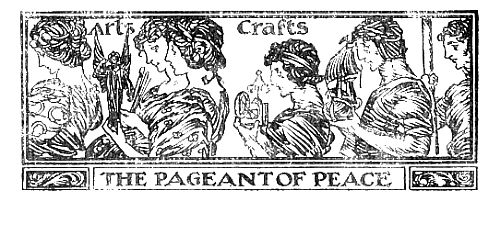
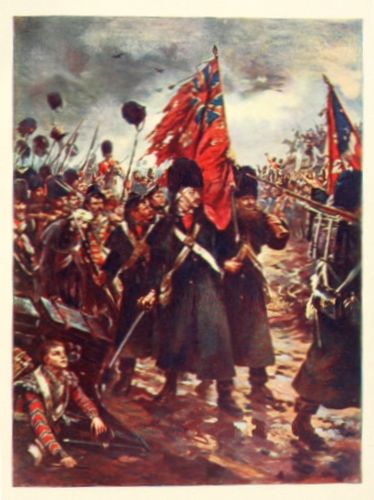
Saving the Colours: An Incident of the Battle of Inkermann.
(From the picture by Robert Gibb, R.S.A. By permission of Mr. Bruce-Low.)
In the neighbourhood of the Sandbag Battery the British Guards were surrounded by a strong Russian force, through which they cut their way, with the colours carried high as a rallying point. The moment selected for representation is that when the Guards are first entering their own lines.
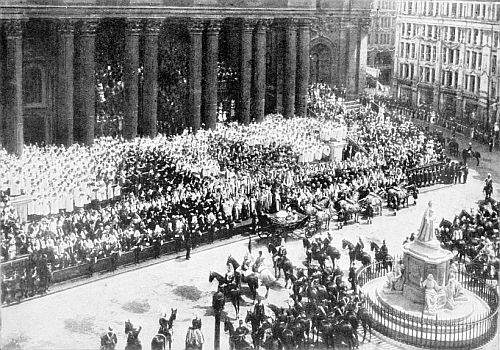
Queen Victoria at St. Paul’s.
(An Incident of the Diamond Jubilee. From a photograph.)
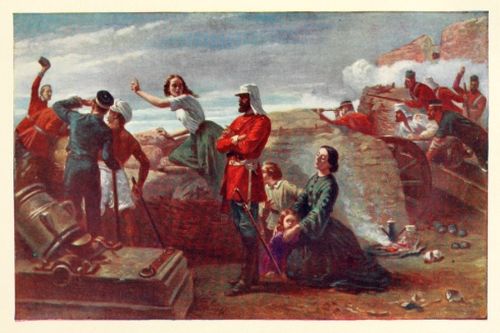
Jessie’s Dream.
(From the picture by F. Goodall, R.A., in the Mappin Art Gallery. By permission of the Corporation of Sheffield.)
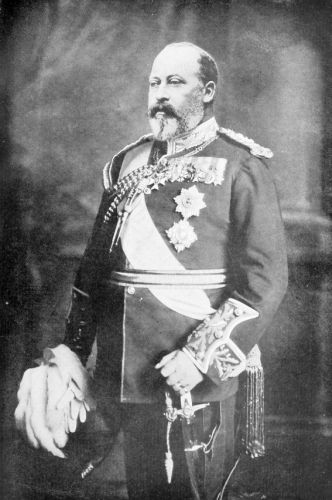
Edward VII., King of Great Britain and Ireland and of the British Dominions beyond the Seas, Emperor of India.
 ND now let our pageant draw to a close with the
figure of our present gracious and genial king. Long
may he reign! He has laid his subjects under
a deep debt of gratitude. Every inch a constitutional
king, he has been by no means a mere figurehead of state,
but a real and potent factor in the affairs of his land. His
watchword has been Peace, and in its service he has won
notable victories. It has been his great glory to bring the
nations of Europe into closer friendship with this country
than they have ever been before.
ND now let our pageant draw to a close with the
figure of our present gracious and genial king. Long
may he reign! He has laid his subjects under
a deep debt of gratitude. Every inch a constitutional
king, he has been by no means a mere figurehead of state,
but a real and potent factor in the affairs of his land. His
watchword has been Peace, and in its service he has won
notable victories. It has been his great glory to bring the
nations of Europe into closer friendship with this country
than they have ever been before.
Let us present Edward the Peacemaker in a characteristic scene. For two years seven months and nineteen days the British nation has been engaged in a desperate struggle with the Boers of the Transvaal Republic and Orange Free State, and the resources of the British Empire have been strained to the utmost. Then, one blessed May day, peace is signed at Pretoria, and with a great sigh of relief the British nation learns that the war is at an end.
Three of the Boer generals, Botha, De la Key, and De Wet, come to England to meet the King. They have no knowledge of sovereigns and courts, and they have no experience to guide them in the presence of royalty. But their misgivings are speedily dispelled, for as they step on the deck of the royal yacht, King Edward comes forward to greet them with an ease and urbanity that is all his own. In simple, homely phrases he says that he is glad to meet them; he tells them that they have been brave enemies, and now he hopes they are to be good friends. And the Boer generals respond no less heartily. They reply that they hope so too; that they are happy to see him recovered from his illness; that their people had heard of it with great regret, and are glad to know that the Lord has given him back his health.
Then they chat frankly and freely with him and the Queen—God bless her!—and thus he wins the hearts of these simple, brave men, who in the years to come shall be his loyal subjects, and shall add a new pillar of strength to the British Empire. As they leave the ship a friend asks, “And what are you going to tell our people about the King, Oom Koos?” “I shall tell them this: that I think that if we had sooner known the King, and the King us, many things might have been different.”
Here is a kingly triumph indeed! We raise our hats as this royal lover of Peace passes by, and from our grateful hearts send up the prayer:
“God save the King!”
TRANSCRIBER NOTES
Misspelled words and printer errors have been corrected. Where multiple spellings occur, majority use has been employed.
Punctuation has been maintained except where obvious printer errors occur.
Some illustrations were moved to facilitate page layout.
Corrections to text: —“. . . Easter Sunday in the year 1491.” was corrected to 1471 to reflect the actual date of the Earl of Warwick’s death in battle.
—“In the year 1788” was corrected to 1759 to reflect the year in which Wolfe sailed for Canada, arriving in Quebec in May that same year.
[The end of The Pageant of British History by Sir (James) Edward Parrott]
End of the Project Gutenberg EBook of The Pageant of British History, by
J. Edward Parrott
*** END OF THIS PROJECT GUTENBERG EBOOK THE PAGEANT OF BRITISH HISTORY ***
***** This file should be named 60524-h.htm or 60524-h.zip *****
This and all associated files of various formats will be found in:
http://www.gutenberg.org/6/0/5/2/60524/
Produced by Al Haines, Cindy Beyer & the online Distributed
Proofreaders Canada team at http://www.pgdpcanada.net
Updated editions will replace the previous one--the old editions will
be renamed.
Creating the works from print editions not protected by U.S. copyright
law means that no one owns a United States copyright in these works,
so the Foundation (and you!) can copy and distribute it in the United
States without permission and without paying copyright
royalties. Special rules, set forth in the General Terms of Use part
of this license, apply to copying and distributing Project
Gutenberg-tm electronic works to protect the PROJECT GUTENBERG-tm
concept and trademark. Project Gutenberg is a registered trademark,
and may not be used if you charge for the eBooks, unless you receive
specific permission. If you do not charge anything for copies of this
eBook, complying with the rules is very easy. You may use this eBook
for nearly any purpose such as creation of derivative works, reports,
performances and research. They may be modified and printed and given
away--you may do practically ANYTHING in the United States with eBooks
not protected by U.S. copyright law. Redistribution is subject to the
trademark license, especially commercial redistribution.
START: FULL LICENSE
THE FULL PROJECT GUTENBERG LICENSE
PLEASE READ THIS BEFORE YOU DISTRIBUTE OR USE THIS WORK
To protect the Project Gutenberg-tm mission of promoting the free
distribution of electronic works, by using or distributing this work
(or any other work associated in any way with the phrase "Project
Gutenberg"), you agree to comply with all the terms of the Full
Project Gutenberg-tm License available with this file or online at
www.gutenberg.org/license.
Section 1. General Terms of Use and Redistributing Project
Gutenberg-tm electronic works
1.A. By reading or using any part of this Project Gutenberg-tm
electronic work, you indicate that you have read, understand, agree to
and accept all the terms of this license and intellectual property
(trademark/copyright) agreement. If you do not agree to abide by all
the terms of this agreement, you must cease using and return or
destroy all copies of Project Gutenberg-tm electronic works in your
possession. If you paid a fee for obtaining a copy of or access to a
Project Gutenberg-tm electronic work and you do not agree to be bound
by the terms of this agreement, you may obtain a refund from the
person or entity to whom you paid the fee as set forth in paragraph
1.E.8.
1.B. "Project Gutenberg" is a registered trademark. It may only be
used on or associated in any way with an electronic work by people who
agree to be bound by the terms of this agreement. There are a few
things that you can do with most Project Gutenberg-tm electronic works
even without complying with the full terms of this agreement. See
paragraph 1.C below. There are a lot of things you can do with Project
Gutenberg-tm electronic works if you follow the terms of this
agreement and help preserve free future access to Project Gutenberg-tm
electronic works. See paragraph 1.E below.
1.C. The Project Gutenberg Literary Archive Foundation ("the
Foundation" or PGLAF), owns a compilation copyright in the collection
of Project Gutenberg-tm electronic works. Nearly all the individual
works in the collection are in the public domain in the United
States. If an individual work is unprotected by copyright law in the
United States and you are located in the United States, we do not
claim a right to prevent you from copying, distributing, performing,
displaying or creating derivative works based on the work as long as
all references to Project Gutenberg are removed. Of course, we hope
that you will support the Project Gutenberg-tm mission of promoting
free access to electronic works by freely sharing Project Gutenberg-tm
works in compliance with the terms of this agreement for keeping the
Project Gutenberg-tm name associated with the work. You can easily
comply with the terms of this agreement by keeping this work in the
same format with its attached full Project Gutenberg-tm License when
you share it without charge with others.
1.D. The copyright laws of the place where you are located also govern
what you can do with this work. Copyright laws in most countries are
in a constant state of change. If you are outside the United States,
check the laws of your country in addition to the terms of this
agreement before downloading, copying, displaying, performing,
distributing or creating derivative works based on this work or any
other Project Gutenberg-tm work. The Foundation makes no
representations concerning the copyright status of any work in any
country outside the United States.
1.E. Unless you have removed all references to Project Gutenberg:
1.E.1. The following sentence, with active links to, or other
immediate access to, the full Project Gutenberg-tm License must appear
prominently whenever any copy of a Project Gutenberg-tm work (any work
on which the phrase "Project Gutenberg" appears, or with which the
phrase "Project Gutenberg" is associated) is accessed, displayed,
performed, viewed, copied or distributed:
This eBook is for the use of anyone anywhere in the United States and
most other parts of the world at no cost and with almost no
restrictions whatsoever. You may copy it, give it away or re-use it
under the terms of the Project Gutenberg License included with this
eBook or online at www.gutenberg.org. If you are not located in the
United States, you'll have to check the laws of the country where you
are located before using this ebook.
1.E.2. If an individual Project Gutenberg-tm electronic work is
derived from texts not protected by U.S. copyright law (does not
contain a notice indicating that it is posted with permission of the
copyright holder), the work can be copied and distributed to anyone in
the United States without paying any fees or charges. If you are
redistributing or providing access to a work with the phrase "Project
Gutenberg" associated with or appearing on the work, you must comply
either with the requirements of paragraphs 1.E.1 through 1.E.7 or
obtain permission for the use of the work and the Project Gutenberg-tm
trademark as set forth in paragraphs 1.E.8 or 1.E.9.
1.E.3. If an individual Project Gutenberg-tm electronic work is posted
with the permission of the copyright holder, your use and distribution
must comply with both paragraphs 1.E.1 through 1.E.7 and any
additional terms imposed by the copyright holder. Additional terms
will be linked to the Project Gutenberg-tm License for all works
posted with the permission of the copyright holder found at the
beginning of this work.
1.E.4. Do not unlink or detach or remove the full Project Gutenberg-tm
License terms from this work, or any files containing a part of this
work or any other work associated with Project Gutenberg-tm.
1.E.5. Do not copy, display, perform, distribute or redistribute this
electronic work, or any part of this electronic work, without
prominently displaying the sentence set forth in paragraph 1.E.1 with
active links or immediate access to the full terms of the Project
Gutenberg-tm License.
1.E.6. You may convert to and distribute this work in any binary,
compressed, marked up, nonproprietary or proprietary form, including
any word processing or hypertext form. However, if you provide access
to or distribute copies of a Project Gutenberg-tm work in a format
other than "Plain Vanilla ASCII" or other format used in the official
version posted on the official Project Gutenberg-tm web site
(www.gutenberg.org), you must, at no additional cost, fee or expense
to the user, provide a copy, a means of exporting a copy, or a means
of obtaining a copy upon request, of the work in its original "Plain
Vanilla ASCII" or other form. Any alternate format must include the
full Project Gutenberg-tm License as specified in paragraph 1.E.1.
1.E.7. Do not charge a fee for access to, viewing, displaying,
performing, copying or distributing any Project Gutenberg-tm works
unless you comply with paragraph 1.E.8 or 1.E.9.
1.E.8. You may charge a reasonable fee for copies of or providing
access to or distributing Project Gutenberg-tm electronic works
provided that
* You pay a royalty fee of 20% of the gross profits you derive from
the use of Project Gutenberg-tm works calculated using the method
you already use to calculate your applicable taxes. The fee is owed
to the owner of the Project Gutenberg-tm trademark, but he has
agreed to donate royalties under this paragraph to the Project
Gutenberg Literary Archive Foundation. Royalty payments must be paid
within 60 days following each date on which you prepare (or are
legally required to prepare) your periodic tax returns. Royalty
payments should be clearly marked as such and sent to the Project
Gutenberg Literary Archive Foundation at the address specified in
Section 4, "Information about donations to the Project Gutenberg
Literary Archive Foundation."
* You provide a full refund of any money paid by a user who notifies
you in writing (or by e-mail) within 30 days of receipt that s/he
does not agree to the terms of the full Project Gutenberg-tm
License. You must require such a user to return or destroy all
copies of the works possessed in a physical medium and discontinue
all use of and all access to other copies of Project Gutenberg-tm
works.
* You provide, in accordance with paragraph 1.F.3, a full refund of
any money paid for a work or a replacement copy, if a defect in the
electronic work is discovered and reported to you within 90 days of
receipt of the work.
* You comply with all other terms of this agreement for free
distribution of Project Gutenberg-tm works.
1.E.9. If you wish to charge a fee or distribute a Project
Gutenberg-tm electronic work or group of works on different terms than
are set forth in this agreement, you must obtain permission in writing
from both the Project Gutenberg Literary Archive Foundation and The
Project Gutenberg Trademark LLC, the owner of the Project Gutenberg-tm
trademark. Contact the Foundation as set forth in Section 3 below.
1.F.
1.F.1. Project Gutenberg volunteers and employees expend considerable
effort to identify, do copyright research on, transcribe and proofread
works not protected by U.S. copyright law in creating the Project
Gutenberg-tm collection. Despite these efforts, Project Gutenberg-tm
electronic works, and the medium on which they may be stored, may
contain "Defects," such as, but not limited to, incomplete, inaccurate
or corrupt data, transcription errors, a copyright or other
intellectual property infringement, a defective or damaged disk or
other medium, a computer virus, or computer codes that damage or
cannot be read by your equipment.
1.F.2. LIMITED WARRANTY, DISCLAIMER OF DAMAGES - Except for the "Right
of Replacement or Refund" described in paragraph 1.F.3, the Project
Gutenberg Literary Archive Foundation, the owner of the Project
Gutenberg-tm trademark, and any other party distributing a Project
Gutenberg-tm electronic work under this agreement, disclaim all
liability to you for damages, costs and expenses, including legal
fees. YOU AGREE THAT YOU HAVE NO REMEDIES FOR NEGLIGENCE, STRICT
LIABILITY, BREACH OF WARRANTY OR BREACH OF CONTRACT EXCEPT THOSE
PROVIDED IN PARAGRAPH 1.F.3. YOU AGREE THAT THE FOUNDATION, THE
TRADEMARK OWNER, AND ANY DISTRIBUTOR UNDER THIS AGREEMENT WILL NOT BE
LIABLE TO YOU FOR ACTUAL, DIRECT, INDIRECT, CONSEQUENTIAL, PUNITIVE OR
INCIDENTAL DAMAGES EVEN IF YOU GIVE NOTICE OF THE POSSIBILITY OF SUCH
DAMAGE.
1.F.3. LIMITED RIGHT OF REPLACEMENT OR REFUND - If you discover a
defect in this electronic work within 90 days of receiving it, you can
receive a refund of the money (if any) you paid for it by sending a
written explanation to the person you received the work from. If you
received the work on a physical medium, you must return the medium
with your written explanation. The person or entity that provided you
with the defective work may elect to provide a replacement copy in
lieu of a refund. If you received the work electronically, the person
or entity providing it to you may choose to give you a second
opportunity to receive the work electronically in lieu of a refund. If
the second copy is also defective, you may demand a refund in writing
without further opportunities to fix the problem.
1.F.4. Except for the limited right of replacement or refund set forth
in paragraph 1.F.3, this work is provided to you 'AS-IS', WITH NO
OTHER WARRANTIES OF ANY KIND, EXPRESS OR IMPLIED, INCLUDING BUT NOT
LIMITED TO WARRANTIES OF MERCHANTABILITY OR FITNESS FOR ANY PURPOSE.
1.F.5. Some states do not allow disclaimers of certain implied
warranties or the exclusion or limitation of certain types of
damages. If any disclaimer or limitation set forth in this agreement
violates the law of the state applicable to this agreement, the
agreement shall be interpreted to make the maximum disclaimer or
limitation permitted by the applicable state law. The invalidity or
unenforceability of any provision of this agreement shall not void the
remaining provisions.
1.F.6. INDEMNITY - You agree to indemnify and hold the Foundation, the
trademark owner, any agent or employee of the Foundation, anyone
providing copies of Project Gutenberg-tm electronic works in
accordance with this agreement, and any volunteers associated with the
production, promotion and distribution of Project Gutenberg-tm
electronic works, harmless from all liability, costs and expenses,
including legal fees, that arise directly or indirectly from any of
the following which you do or cause to occur: (a) distribution of this
or any Project Gutenberg-tm work, (b) alteration, modification, or
additions or deletions to any Project Gutenberg-tm work, and (c) any
Defect you cause.
Section 2. Information about the Mission of Project Gutenberg-tm
Project Gutenberg-tm is synonymous with the free distribution of
electronic works in formats readable by the widest variety of
computers including obsolete, old, middle-aged and new computers. It
exists because of the efforts of hundreds of volunteers and donations
from people in all walks of life.
Volunteers and financial support to provide volunteers with the
assistance they need are critical to reaching Project Gutenberg-tm's
goals and ensuring that the Project Gutenberg-tm collection will
remain freely available for generations to come. In 2001, the Project
Gutenberg Literary Archive Foundation was created to provide a secure
and permanent future for Project Gutenberg-tm and future
generations. To learn more about the Project Gutenberg Literary
Archive Foundation and how your efforts and donations can help, see
Sections 3 and 4 and the Foundation information page at
www.gutenberg.org
Section 3. Information about the Project Gutenberg Literary Archive Foundation
The Project Gutenberg Literary Archive Foundation is a non profit
501(c)(3) educational corporation organized under the laws of the
state of Mississippi and granted tax exempt status by the Internal
Revenue Service. The Foundation's EIN or federal tax identification
number is 64-6221541. Contributions to the Project Gutenberg Literary
Archive Foundation are tax deductible to the full extent permitted by
U.S. federal laws and your state's laws.
The Foundation's principal office is in Fairbanks, Alaska, with the
mailing address: PO Box 750175, Fairbanks, AK 99775, but its
volunteers and employees are scattered throughout numerous
locations. Its business office is located at 809 North 1500 West, Salt
Lake City, UT 84116, (801) 596-1887. Email contact links and up to
date contact information can be found at the Foundation's web site and
official page at www.gutenberg.org/contact
For additional contact information:
Dr. Gregory B. Newby
Chief Executive and Director
gbnewby@pglaf.org
Section 4. Information about Donations to the Project Gutenberg
Literary Archive Foundation
Project Gutenberg-tm depends upon and cannot survive without wide
spread public support and donations to carry out its mission of
increasing the number of public domain and licensed works that can be
freely distributed in machine readable form accessible by the widest
array of equipment including outdated equipment. Many small donations
($1 to $5,000) are particularly important to maintaining tax exempt
status with the IRS.
The Foundation is committed to complying with the laws regulating
charities and charitable donations in all 50 states of the United
States. Compliance requirements are not uniform and it takes a
considerable effort, much paperwork and many fees to meet and keep up
with these requirements. We do not solicit donations in locations
where we have not received written confirmation of compliance. To SEND
DONATIONS or determine the status of compliance for any particular
state visit www.gutenberg.org/donate
While we cannot and do not solicit contributions from states where we
have not met the solicitation requirements, we know of no prohibition
against accepting unsolicited donations from donors in such states who
approach us with offers to donate.
International donations are gratefully accepted, but we cannot make
any statements concerning tax treatment of donations received from
outside the United States. U.S. laws alone swamp our small staff.
Please check the Project Gutenberg Web pages for current donation
methods and addresses. Donations are accepted in a number of other
ways including checks, online payments and credit card donations. To
donate, please visit: www.gutenberg.org/donate
Section 5. General Information About Project Gutenberg-tm electronic works.
Professor Michael S. Hart was the originator of the Project
Gutenberg-tm concept of a library of electronic works that could be
freely shared with anyone. For forty years, he produced and
distributed Project Gutenberg-tm eBooks with only a loose network of
volunteer support.
Project Gutenberg-tm eBooks are often created from several printed
editions, all of which are confirmed as not protected by copyright in
the U.S. unless a copyright notice is included. Thus, we do not
necessarily keep eBooks in compliance with any particular paper
edition.
Most people start at our Web site which has the main PG search
facility: www.gutenberg.org
This Web site includes information about Project Gutenberg-tm,
including how to make donations to the Project Gutenberg Literary
Archive Foundation, how to help produce our new eBooks, and how to
subscribe to our email newsletter to hear about new eBooks.